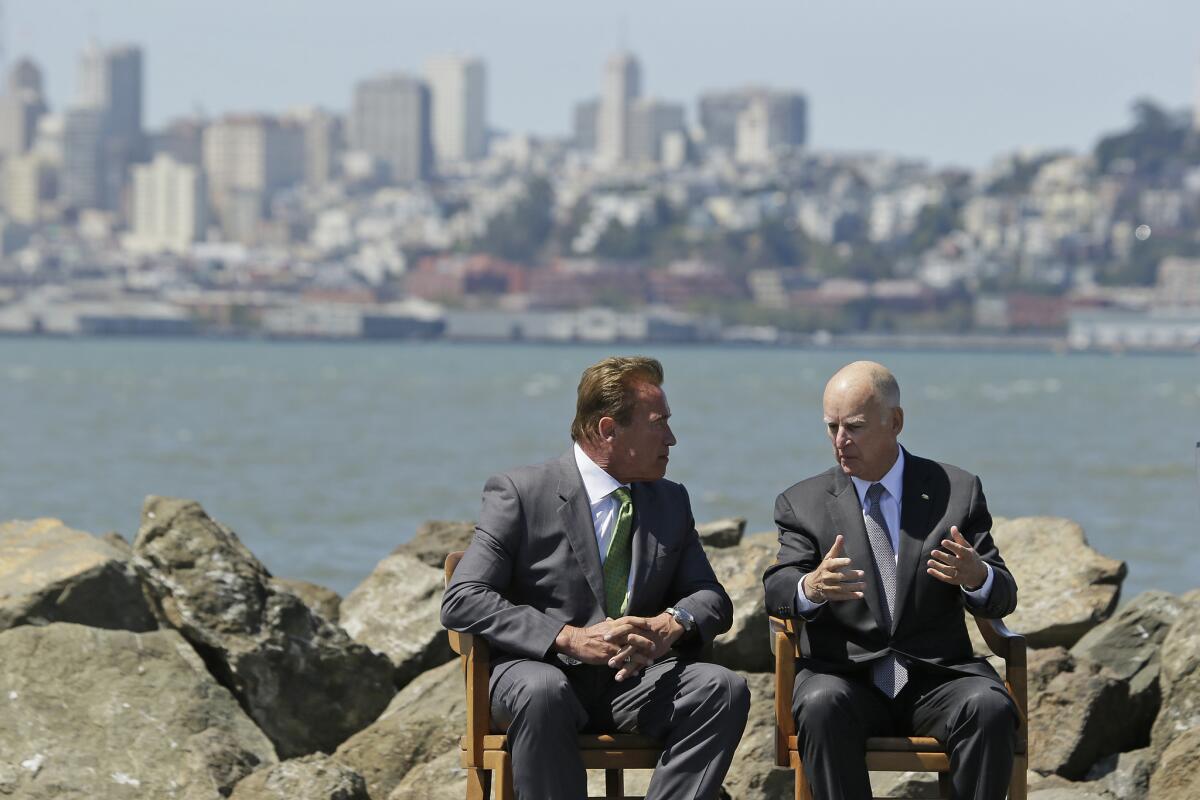State assemblywoman shelves legislation to make ‘stealthing’ punishable as rape in California
A state Assemblywoman has shelved her bill to make “stealthing,” or tampering with a condom during sex, a form of rape under California law, saying it did not have enough support to win approval this year.
In a statement, Assemblywoman Cristina Garcia (D-Bell Gardens) said she would commit to educating lawmakers on the issue and holding ongoing discussions to file a similar proposal next legislative session.
“I, and others, believe stealthing is a violation of informed consent, and sex without consent in California is rape,” said Garcia, who last year helped expand the legal definition of rape in the state.
The latest version of the bill would have made it a crime of felony sexual battery to remove or tamper with a condom during sex. It also went further, making it a felony to lie about being on birth control or another form of contraception other than a condom.
“Some of the amendments I was asked to make are simply inconsistent with my beliefs on this issue,” she said in her statement. “I don’t want the matter to die a legislative death, so I’ve opted to postpone hearings this year to address the concerns raised.”
Ritchie Valens, late rock star and local hero, gets a stretch of the 5 Freeway in the Valley named after him
A section of the 5 Freeway in the northeast San Fernando Valley will be named after rock ’n’ roll icon Ritchie Valens, who grew up in the area and had a stellar career before he died in a plane crash.
Valens, whose hits included “La Bamba,” “Come On, Let’s Go” and “Donna,” will have his name put up on signs along a stretch of the interstate between the 170 and 118 freeways that will be named the Ritchie Valens Memorial Highway.
The state Legislature gave final approval to the honor last week, and Assemblyman Raul Bocanegra (D-Pacoima), who authored the proposal, said Thursday that private funds are being raised, as required by state law, to pay for the signs.
“His music inspired and influenced a generation of Chicano artists in our community and throughout the world,” Bocanegra said. “It’s only fitting to name this segment of the I-5 after a Rock & Roll Hall of Famer who grew up right here in Pacoima.”
The honor was appreciated by the late star’s sister Connie Valens, who said in a statement released by the legislator’s office that the singer was “not only a rock ’n’ roll pioneer, but a role model for artists and youth all over the world.”
Gov. Jerry Brown lays out his plan for cap-and-trade spending
Gov. Jerry Brown unveiled on Thursday his plan for spending cap-and-trade revenue, prioritizing cleaner vehicles and improving air quality.
Roughly $1.5 billion, all generated by the sale of permits required to release greenhouse gases into the atmosphere, is available to be spent by the governor and lawmakers.
Brown wants the biggest chunk of the money, $607.5 million, to be used on financial incentives for cleaner cars, trucks, buses and farm vehicles.
Reducing pollution from transportation has been a stiff challenge for the state. Lawmakers have already proposed using even more cash than outlined in the governor’s proposal to help replace diesel engines.
The governor also suggested spending $350 million to improve air quality in polluted communities. The money would help implement Assembly Bill 617, a companion measure to Assembly Bill 398, which extended the cap-and-trade program until 2030.
Some of the money would help pay for monitoring criteria air pollutants and toxic contaminants, and more would be available to support plans devised by local regulators to reduce air pollution.
Another significant sum would be used to help take care of the state’s forests, including $200 million for fire prevention.
California soon will have an official state dinosaur — that is, if Gov. Jerry Brown gives his approval
Gov. Jerry Brown will attend economic conference in Russia next week
Gov. Jerry Brown is collecting more stamps on his passport this year.
After a trip to China in June, he’s jetting to Russia next week, his office announced. Brown will speak to international government and business leaders about the need to combat climate change at the Eastern Economic Forum in Vladivostok.
Brown said the forum on trade “isn’t just an occasion to promote investment, it’s an opportunity to strengthen our commitment to decarbonizing the economy.”
The governor is scheduled to arrive in Russia on Tuesday and return to California on Friday. On his way to the conference, he’s planning to stop in Alaska to meet with scientists and researchers studying climate change.
This won’t be Brown’s last international trip this year. He’s also attending the next United Nations conference on climate change in Bonn, Germany, in November.
California lawmaker’s proposal would pave way for supervised drug-injection sites to ‘get needles out of the playground’
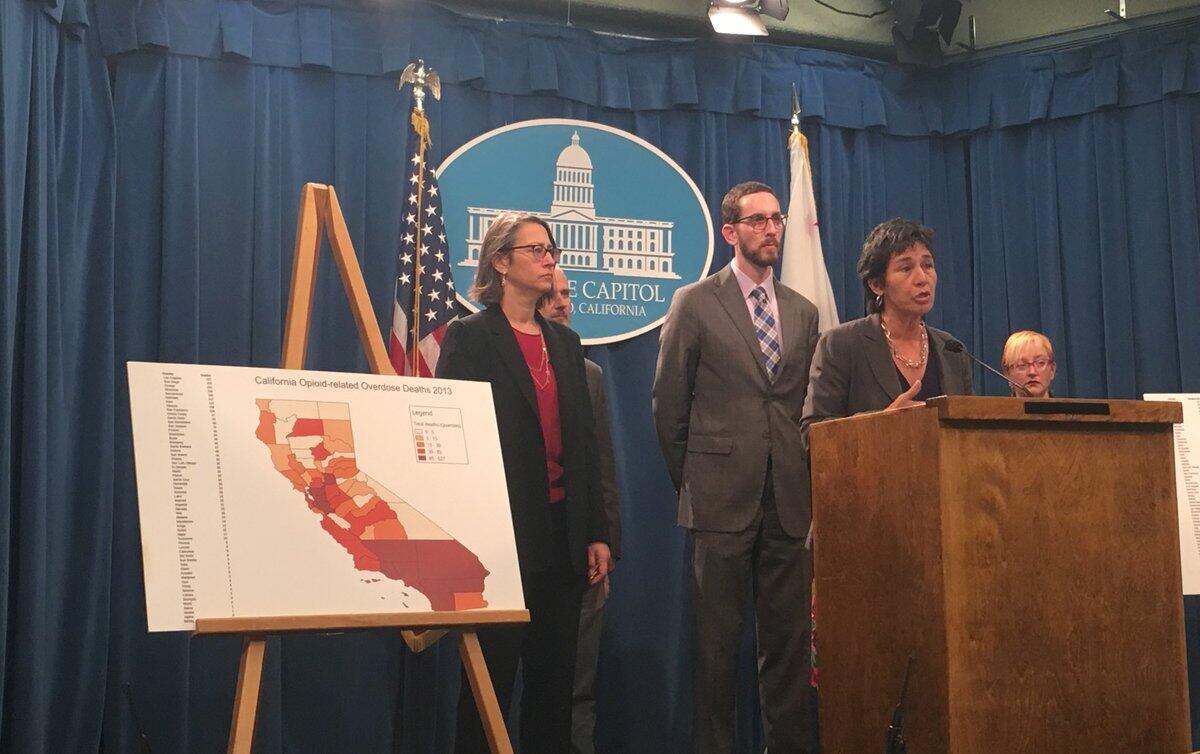
Supervised drug injection centers where users would be able to receive addiction treatment could be coming to California.
Legislation authored by Assemblyman Susan Eggman (D-Stockton) would allow eight counties — Alameda, Fresno, Humboldt, Los Angeles, Mendocino, San Francisco, San Joaquin and Santa Cruz — to pilot supervised drug injection centers by 2022.
The bill, which has passed the Assembly, is awaiting a vote in the state Senate.
“Let’s get needles out of the playground,” Eggman said at a Thursday press conference at the Capitol. “Let’s save some peoples’ lives and get people into treatment.”
There are no supervised injection centers in the U.S. Two safe-injection sites have been proposed in Washington state’s King County, and opponents have qualified a ballot initiative to allow voters to determine whether the centers should be banned. A handful of cities in Washington have already moved to ban safe-injection sites.
Senate Republicans have expressed concerns that Eggman’s bill would create “government-run drug dens” that support activity that violates federal law.
A coalition of Los Angeles-area law enforcement agencies including the California Narcotic Officers Assn., Peace Officers Assn. of Los Angeles County and the Los Angeles Police Protective League also opposes the legislation.
There were 2,375 opioid-related overdose deaths statewide in 2013, according to data from the California Department of Public Health.
“When we have an epidemic such as this ... It is time to do something different than we’ve been doing,” Eggman said.
Trump called him ‘my African American.’ But he condemns the president’s treatment of black America
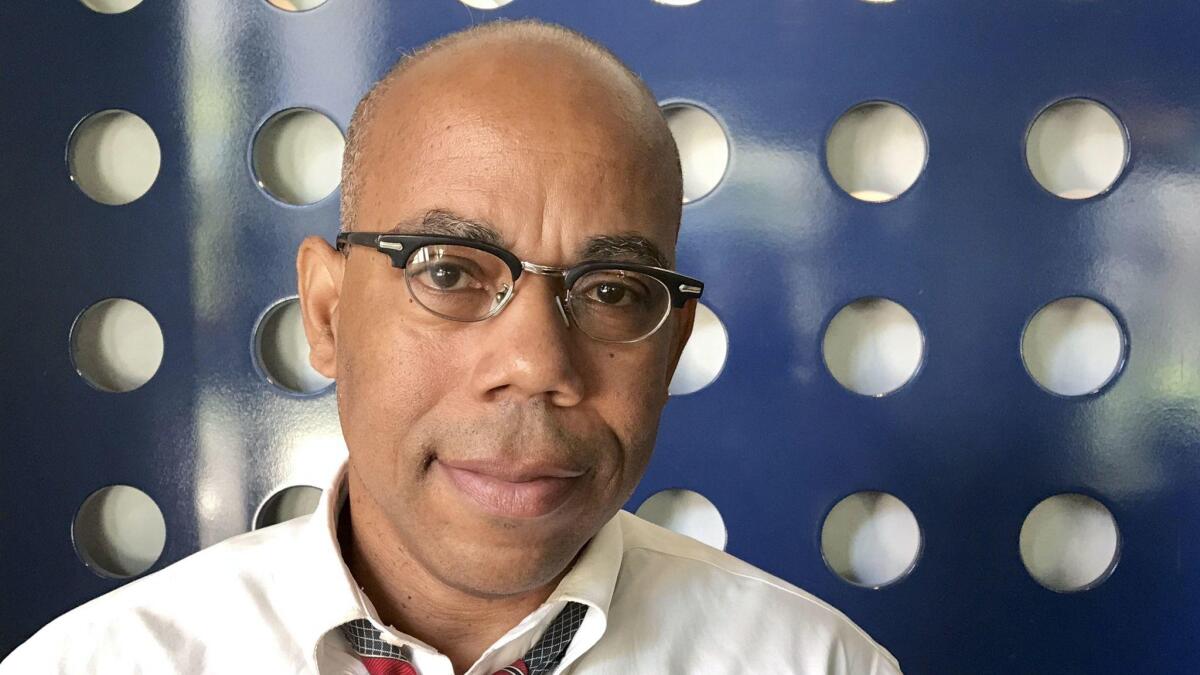
On the day that changed his life, Gregory Cheadle almost stayed in bed.
He was tired — he traveled a lot in his long-shot bid for Congress — but asked himself: How often does a candidate for president come to the far reaches of Northern California? And why pass up a crowd and the chance to hand out more fliers?
So Cheadle roused himself that June 2016 morning and secured a spot up close when Donald Trump swooped in for a rally at Redding’s municipal airport.
It was hot, the atmosphere was loose and Trump’s patter seeming more stand-up comedy than campaign spiel. He went into one of those sidelong digressions, about protesters and an African American — “great fan, great guy” — in the audience.
“Look at my African American over here!” he exclaimed. “Are you the greatest?”
Cheadle and those around him laughed; it was a hoot.
But many who saw that moment were not amused. They were angry and outraged. “My African American,” Trump said, as if Cheadle were his slave, and they turned their anger and outrage on Cheadle when he failed to respond in kind.
However, today Cheadle says he was unfairly portrayed and criticizes Trump’s promise to help the African American community as empty rhetoric.
State help for planned Clippers arena still possible, senator says
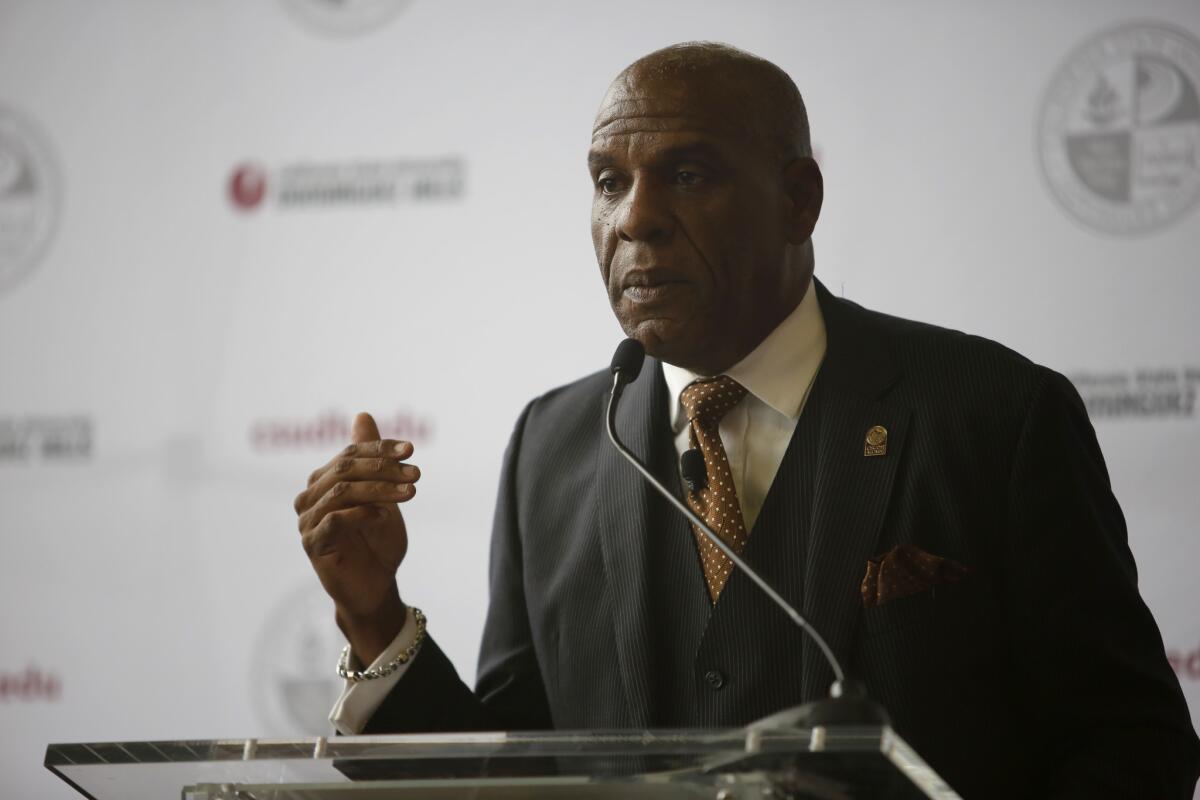
A proposal to fast-track a new arena in Inglewood for the Los Angeles Clippers remains on the table at the Capitol, said the state senator who represents the city.
“If it’s needed, we’re definitely going to introduce it,” said Sen. Steven Bradford (D-Gardena).
In recent years, state lawmakers have passed bills helping possible arenas and football stadiums up and down California. The measures have aimed, for the most part, to provide relief from potential lawsuits under the California Environmental Quality Act by speeding up court-decision deadlines or halting a judge’s ability to block construction, even if it found the project’s environmental review didn’t adequately study traffic problems or had other flaws.
Bradford has yet to formally propose a measure, but said his goal was to provide similar benefits to the planned Clippers arena. Currently, such projects can apply for speedier court review without special legislation. Bradford said he was weighing whether that process gave enough assistance to the Clippers.
“This is a major opportunity for the city of Inglewood, a city that has been written off for many years,” he said.
Bradford has until Sept. 12 to introduce the bill for passage before the Legislature adjourns for the year on Sept. 15.
Senate investigators may seek Rohrabacher testimony about his meeting with WikiLeaks founder Julian Assange
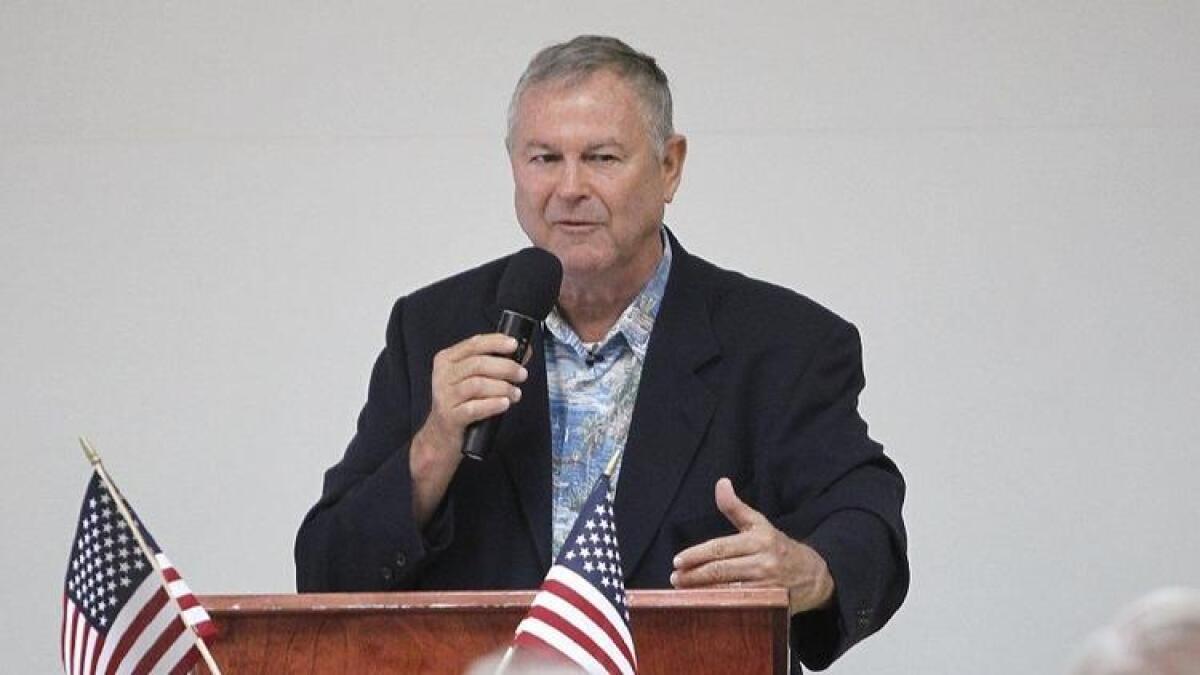
The Senate Select Committee on Intelligence might want to talk with Orange County Rep. Dana Rohrabacher about his meeting this month with WikiLeaks founder Julian Assange.
CNN reported Thursday that two sources confirmed that the committee members are deciding if they will call on Rohrabacher (R-Costa Mesa) to testify as part of its ongoing investigation into Russian attempts to influence the outcome of the 2016 election and what the Trump campaign might have known. It’s one of several congressional investigations into the issue.
In a statement to the Los Angeles Times last week, Rohrabacher said that during his meeting with Assange at the Ecuadorean embassy in London, the fugitive “emphatically stated that the Russians were not involved” in the theft of Democratic National Committee emails during the 2016 presidential campaign. The emails were published by WikiLeaks and put Democratic nominee Hillary Clinton on the defensive for much of the campaign. The belief of the majority of U.S. intelligence agencies is that Russia played a role in stealing and leaking the emails.
Rohrabacher said on Sean Hannity’s radio show earlier this week that a “rendezvous” is being set up with President Trump so the congressman can tell him more about what he learned from Assange.
Rohrabacher’s spokesman, Ken Grubbs, said “he’s not yet been contacted by the Senate Intel Committee, but will be happy to talk with them after he’s talked with President Trump.”
The House Democratic campaign arm jumped at the CNN report, with spokesman Tyler Law saying in a statement that Rohrabacher “has no business chairing the Foreign Affairs Subcommittee that oversees Russia.” They called on House Foreign Affairs Committee Chairman Ed Royce (R-Fullerton) to strip his colleague of his subcommittee post.
Democrats are hoping to oust Rohrabacher and Royce in 2018.
Royce has given Rohrabacher, and his at-times-outside-of-the-Republican-mainstream views toward Russia, a lot of leeway over the years. He has stepped in occasionally, including halting a planned hearing over the Russia sanctions that led the country to ban adoptions to the United States, and squashing Rohrabacher’s plans to visit Russia last spring as the House and Senate investigations heated up.
Rohrabacher’s interest in improving relations with Russia has been long-known in Congress, and the Republican has previously told The Times that he sees his continued role leading the House Foreign Affairs Subcommittee on Europe, Eurasia and Emerging Threats as proof his colleagues don’t demean his view.
“I have no complaints that my colleagues have in any way shut me out of consideration of what I’m saying or belittled me for taking a position that is clearly not the position of the vast majority of the establishment of our country,” he said in a February interview. “If they wanted to be unfair to me, all they would have to say is, ‘Well, we don’t like your point of view and this is an important job, you’re not going to be the chairman anymore,’ and that’s not happened.”
Revamped bill deems driving into a group of protesters an act of domestic terrorism
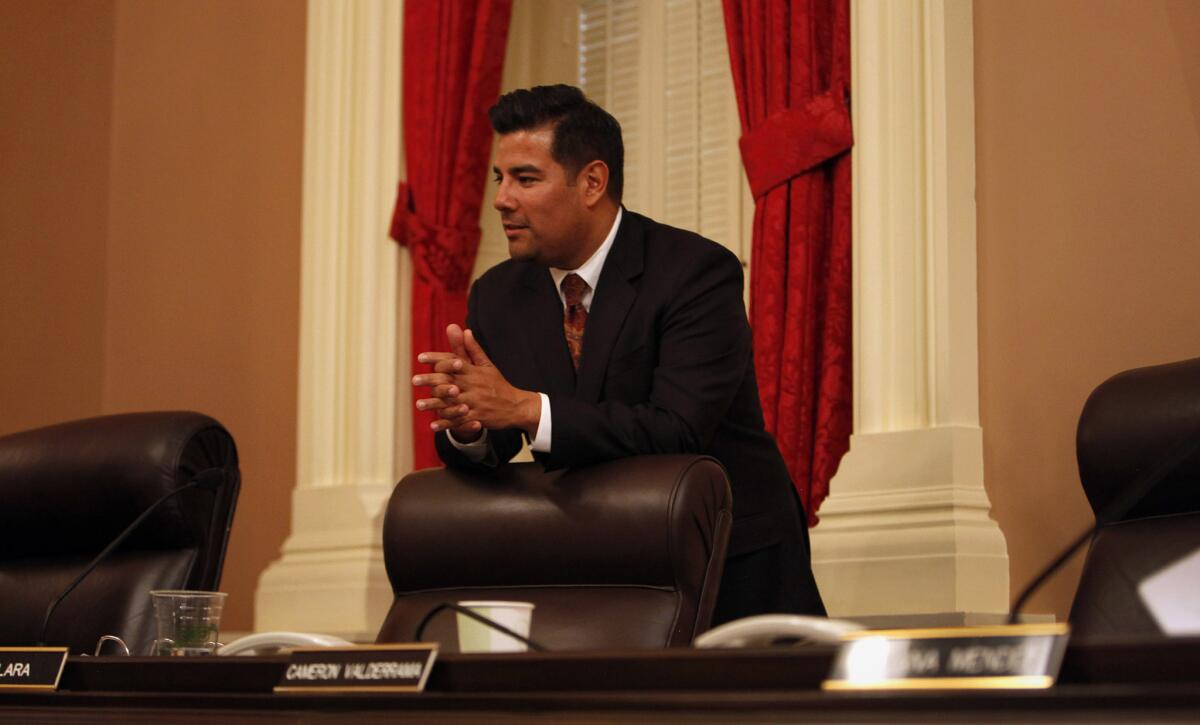
Driving into a group of protesters could be considered domestic terrorism in California.
A measure by Sen. Ricardo Lara (D-Bell Gardens) would consider the act an infringement on free speech and assembly.
Although it is already illegal to use a vehicle as a weapon, Lara said attacks against peaceful protesters need to be treated differently.
“California needs to be strong in defense of our constitutional rights and say there is no margin for error in a car vs. protester attack,” he said in a statement. “Unless we act now these kinds of attacks could become more common.”
The change is in response to the death of Heather Heyer in Charlottesville, Va. She was killed this month when a man drove his car into a group of counter-protesters demonstrating against white supremacy.
In the last year in other countries there have been a number of terrorist attacks using vehicles.
Anyone who uses a motor vehicle to kill or injure a group expressing a political position could face two to four years in state prison, according to the California bill.
If someone dies or is seriously injured, the driver could face life in prison without the possibility of parole or 25 years to life in state jail.
People who drive away from violence “in reasonable fear” and officers who use a motor vehicle “in a safe and reasonable manner” to direct crowds and respond to emergencies are exempt from charges under the proposal.
Lara’s bill is a late entrant in the legislative debate, quickly cobbled together two weeks before the year’s session ends.
Legislators in Florida, North Carolina, North Dakota, Rhode Island, Tennessee and Texas have introduced similar bills.
Voters could see a $4-billion bond measure on the 2018 ballot for water and parks upgrades, state Senate leader says
Sen. Kamala Harris plans to back Medicare-for-all legislation
Sen. Kamala Harris will co-sponsor a Medicare-for-all plan proposed by Sen. Bernie Sanders (I-Vt.), she told Californians at a town hall in Oakland on Wednesday.
The freshman Democratic senator from California has previously said she supports the concept of universal healthcare, but this is the first time she has explicitly said she would join Sanders when he files the bill. The House version of the measure, sponsored by Rep. John Conyers Jr. (D-Mich.), has 117 sponsors, including 27 California Democratic House members.
The idea of single-payer healthcare has grown in popularity among Democrats since the 2016 election, with some members of the so-called Sanders wing of the party urging Democrats to use support for it as a litmus test in 2018.
Such a program is unlikely to become law while Republicans control both chambers of Congress.
Sanders quickly jumped to thank Harris on Twitter on Wednesday.
California legislative leaders pitch big spending for water and parks improvements for the 2018 ballot
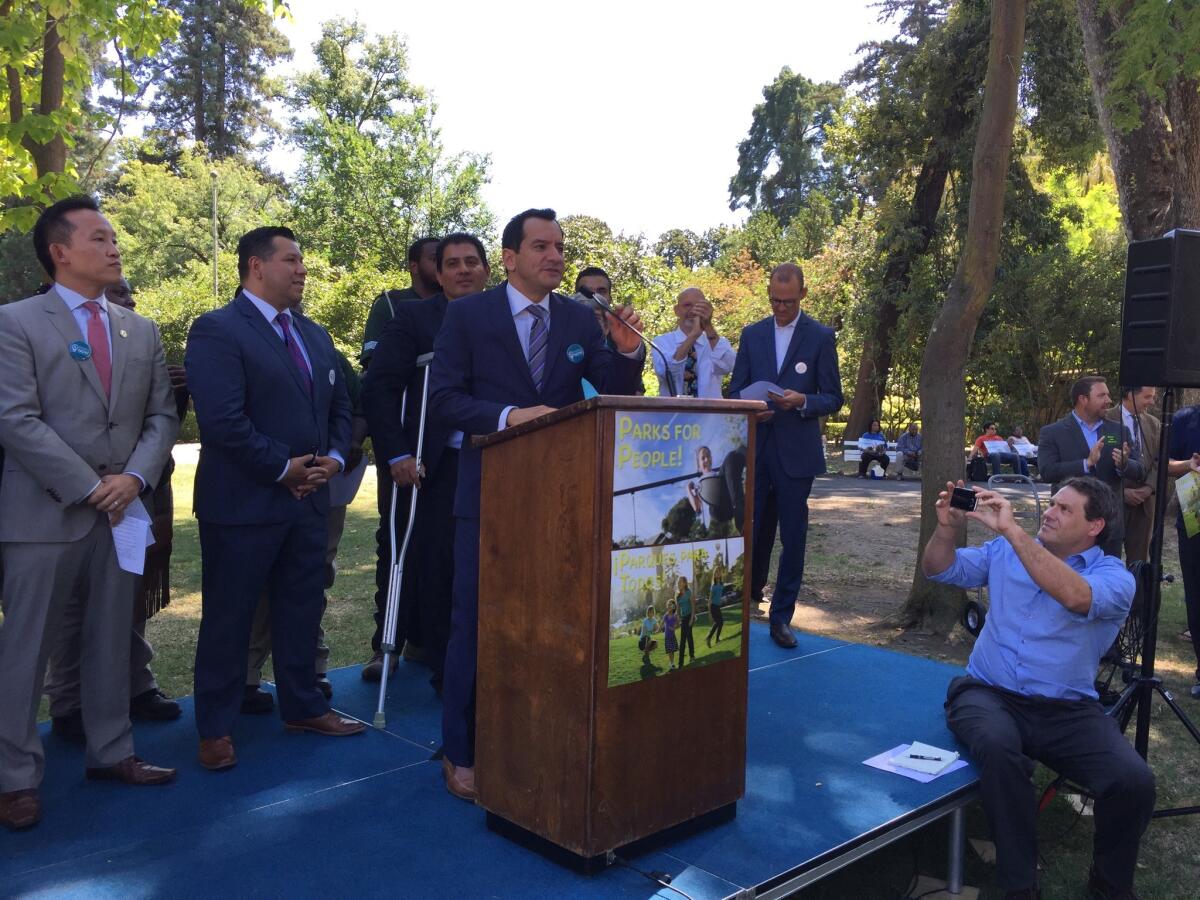
Top lawmakers promised Wednesday to put a bond measure on the 2018 statewide ballot to fund parks and water improvements.
“More parks is not just a wish, it’s not just a dream, it’s not just an ideal, it is a real need,” Assembly Speaker Anthony Rendon (D-Paramount) said at a rally outside the Capitol. “We see that all over the state.”
Rendon and Senate President Pro Tem Kevin de León (D-Los Angeles) said they’re negotiating details of a measure that, if approved by voters next year, would spend billions to build and maintain parks and water infrastructure. Gov. Jerry Brown also has agreed to support a water and parks bond.
Among the issues left to be worked out is how much the bond would raise. Earlier this week, Brown, Rendon and De León announced their support for a $4-billion bond to fund the construction of low-income housing and provide home loans for California veterans.
De León said spending on housing would be greater than water and parks.
“The housing bond, given the real need that’s out there, will be supreme,” De León said.
Two groups outside the Legislature also have pitched ballot initiatives for 2018 to fund water and parks improvements. Those measures, one backed principally by the Nature Conservancy, Environmental Defense Fund and similar groups and the other by other environmental and agriculture interests, would each authorize more than $7 billion in spending.
De León said negotiations involved trying to mollify those outside interests so they would abandon their efforts.
“We don’t want several ballot initiatives working at odds with each other, confusing the voters,” he said.
Eight California Republicans voted against Sandy aid. It’s not clear what they’ll do about Harvey
The Trump administration is expected to ask Congress for billions of dollars to address the disaster caused by Hurricane Harvey in Texas. But after congressional Republicans’ extremely public fight over an aid package for 2012’s Superstorm Sandy, attention is turning to GOP members who voted against it.
Eight Republicans currently in the California congressional delegation were among the 179 Republicans and one Democrat who voted against that bill.
Most of their offices did not return emails asking how the congressmen plan to vote on an expected, but not yet public, Harvey aid package.
Rep. Dana Rohrabacher’s spokesman, Ken Grubbs, said the Costa Mesa congressman’s vote would depend on what’s in the bill, including whether there is funding for non-emergency projects.
“He doesn’t want any boondoggly poison pills,” he said.
It took Congress more than 60 days to approve the $50.5-billion relief package to help Sandy’s victims rebuild in 2013. Republicans who voted against the bill said they opposed it because it was filled with unrelated, non-emergency projects. Others wanted the Sandy relief offset by cuts elsewhere in the federal budget.
At the time, Rep. Tom McClintock of Elk Grove said that “a tragedy like Hurricane Sandy shouldn’t be used for a grab-bag of spending.”
Los Angeles Times columnist Michael Hiltzik took a look Monday at the more than 20 members of the Texas congressional delegation who, along with their U.S. senators, voted against the Sandy relief bill, and whether East Coast Republicans might punish Texans in retaliation. (Some members from the areas affected by Sandy have hinted they don’t plan to do so.)
Here’s the breakdown of how the California Republicans who are still in Congress voted on Sandy relief:
- Rep. Doug LaMalfa of Richvale: No
- Rep. Tom McClintock of Elk Grove: No
- Rep. Paul Cook of Yucca Valley: No
- Rep. Jeff Denham of Turlock: Yes
- Rep. David Valadao of Hanford: Yes
- Rep. Devin Nunes of Tulare: Did not vote
- House Majority Leader Kevin McCarthy of Bakersfield: Yes
- Rep. Ed Royce of Fullerton: No
- Rep. Ken Calvert of Corona: No
- Rep. Dana Rohrabacher of Costa Mesa: No
- Rep. Darrell Issa of Vista: No
- Rep. Duncan Hunter of Alpine: No
Republican Reps. Steve Knight of Palmdale and Mimi Walters of Irvine were not yet elected to Congress when the vote was taken.
Several of the Republicans who voted against the Sandy bill represent areas Democrats are targeting in the 2018 election.
All the California Democrats who voted on the Sandy bill voted in favor of the aid. Reps. Jackie Speier of Hillsborough and Grace Napolitano of Norwalk did not vote.
Gavin Newsom says California’s next governor must do more than build upon Gov. Jerry Brown’s legacy
Lt. Gov. Gavin Newsom said Wednesday that California’s next governor must do more than simply build upon Gov. Jerry Brown’s legacy because of the massive economic transformation and uncertainty the state will face in coming years.
“There are certain trend lines that are not yet headlines that to me require a different kind of engagement,” Newsom said, pointing to demographic changes, worker skills shortages, debt and workers being displaced by automation. “Short-term-ism has got to be replaced with some long-term thinking on these issues. And the governor’s just been brilliant at solvency and triage and getting the state back on its feet, but the next governor, I think, is going to really need to lean in on these deeper, bigger issues.”
Newsom made the remarks in an interview with the Times after addressing a breakfast gathering of the Orange County Forum, which hosts conversations about public policy issues. During his speech, Newsom said the state and the nation are at critical points in their history because of the impending economic changes.
“Something big is happening here,” he said. “We’re at a hinge moment.”
Newsom said he is focusing on the threat of automation, which he said will replace millions of jobs for fast-food workers, cashiers and truck drivers. Newsom said the next governor must be prepared to confront what this means for the state’s workforce and education system, likely during another recession.
“This isn’t a time to be timid. I’m not running for governor to play in the margins. I have no interest in doing a little bit more, a little bit less,” he said. “What we need is leadership, not stewardship.”
Assembly Republicans want to close ‘loophole’ for local tax proposals written by citizen groups
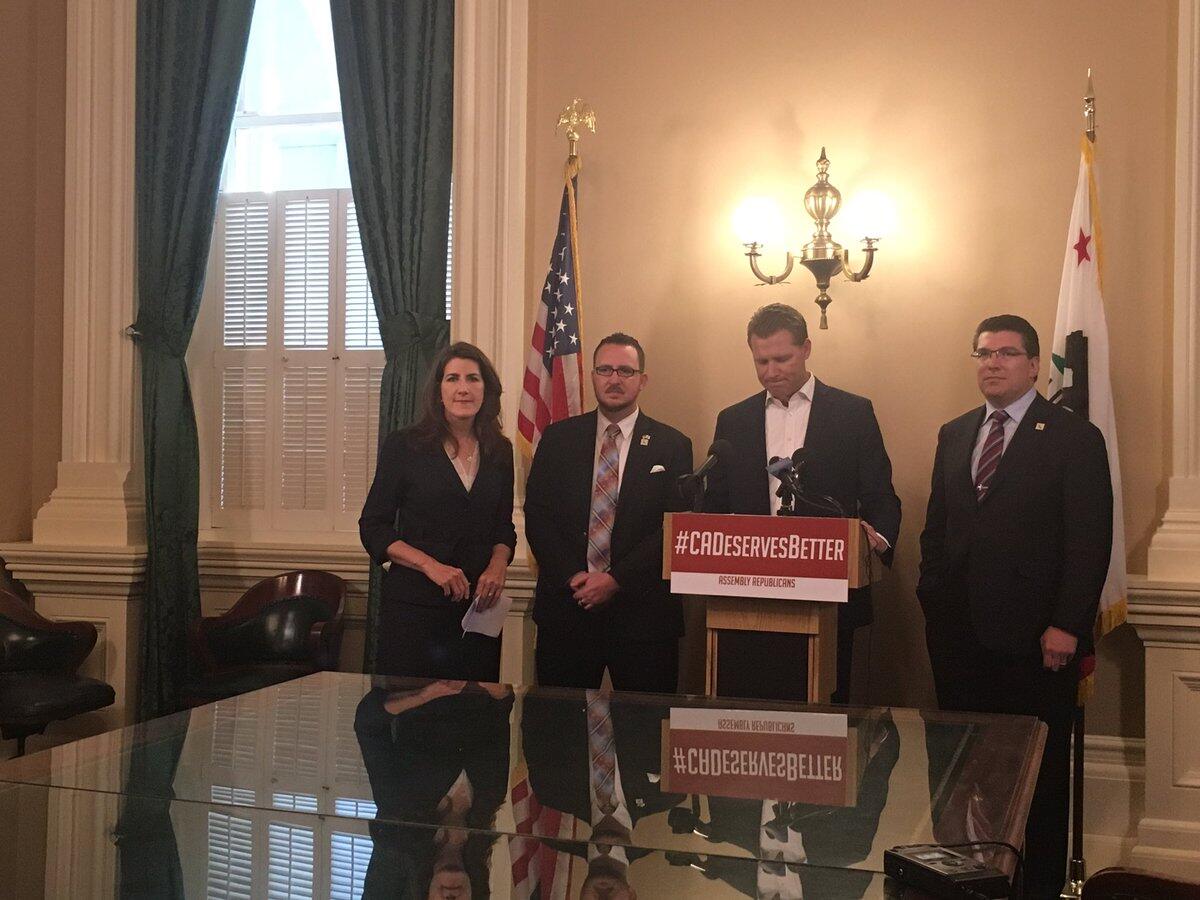
Assembly Republicans said Wednesday they will introduce a constitutional amendment that would close what they call a potential loophole making it easier to enact local tax measures.
The announcement comes on the heels of a California Supreme Court ruling on Monday that local ballot initiatives imposing new taxes for specific purposes may need only a simple majority of voters to approve.
The new proposal would prevent influential interest groups from using initiatives to pass “pet projects and programs,” Assembly Republican Leader Chad Mayes (R-Yucca Valley) said at a state Capitol news conference.
The effort would change the California Constitution to make clear that a supermajority of voters must approve any local tax increase that’s placed on the ballot by citizen groups.
Under California’s landmark tax law, Proposition 13, local taxes for specific needs are subject to approval by two-thirds of voters. A second ballot measure in 1996, Proposition 218, expanded voter approval to nearly all local taxes.
Mayes hopes the amendment, which must be placed on the ballot by the Legislature, will go before voters next June.
Keeping the supermajority requirement on local tax measures protects taxpayers, said Assemblywoman Catharine Baker (R-San Ramon), by forcing tax proponents to build a much broader consensus of voters.
“That two-thirds threshold that is so critical is difficult to reach,” she said. “But it works.”
Garcetti joins other California mayors in Sacramento to push state lawmakers to pass housing bills
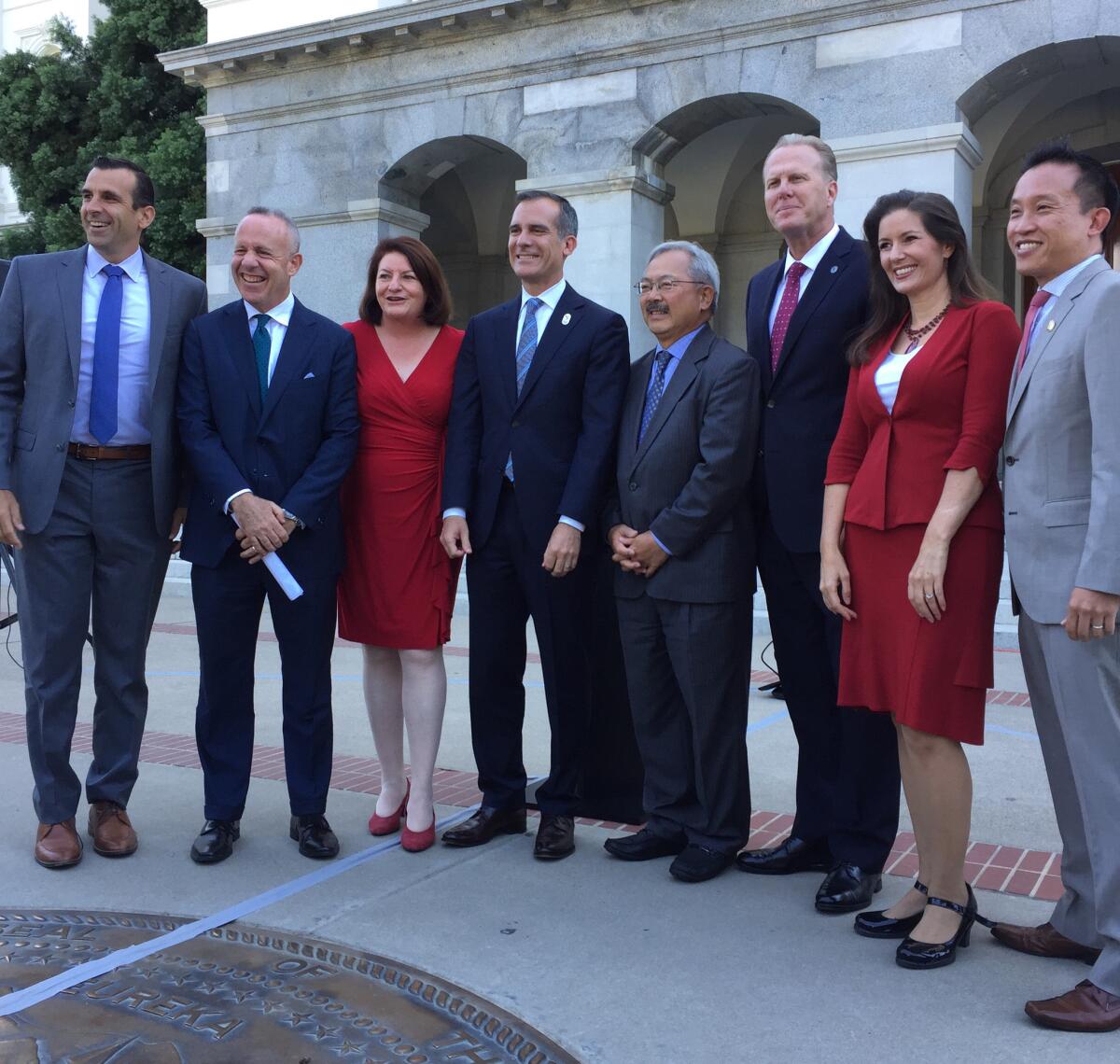
Los Angeles Mayor Eric Garcetti and mayors from other large cities in the state urged state lawmakers Wednesday morning to pass major legislation to address California’s housing problems.
“For us, the biggest problem we all face is our housing crisis,” Garcetti said at a news conference outside the Capitol. “Too many people can’t afford the housing that they’re in. And too many people aren’t in housing at all.”
Gov. Jerry Brown and top lawmakers are trying to finalize a package of legislation to increase funding to build low-income housing and ease local regulations on home building. Legislators could vote on a series of bills as early as this week, and face a Sept. 15 deadline before they depart for the year.
But among the major measures in play, Senate Bill 2, which would add a $75 fee on mortgage refinances and many other real estate transactions to fund low-income housing, is the most uncertain. It remains a few votes short of passage in the Assembly.
“That’s the one that we’re really going to have to go in there and lobby hard for,” Sacramento Mayor Darrell Steinberg said.
Garcetti said the group of mayors, which included Steinberg, San Diego Mayor Kevin Faulconer, San Jose Mayor Sam Liccardo, San Francisco Mayor Ed Lee, Oakland Mayor Libby Schaaf and Santa Ana Mayor Miguel Pulido, planned to meet Wednesday with Brown and other lawmakers to push for the housing bills.
Legislator proposes putting local races ahead of presidential elections on California ballot to boost participation
Concerned about low voter participation in local elections, state Sen. Anthony Portantino (D-La Cañada-Flintridge) proposed Wednesday that the order of future ballots be flipped so that local contests would be first and presidential or gubernatorial races would be last.
The state recently mandated that most cities and school districts hold their elections during statewide and national election dates.
Portantino said that in the November election, many people voted for president because that contest was it at the top of the ballot and state offices and ballot measures came next. Only some make it through the end of the long ballot, where there are elections for city councils and school boards.
“I think more people would be apt to go down through the ballot with the president at the end,” Portantino said. “There is a drop off of people who vote for president and then close the books.”
The senator said the idea was suggested to him by Glendale City Clerk Ardy Kassakhian, who ran for a Glendale Assembly seat in 2016 and lost to fellow Democrat Laura Friedman. The seat previously was held by former Assemblyman Mike Gatto, a Democrat who termed out.
“Given this new state mandate, it is the right thing to do to feature our local offices and local civic issues first,” Kassakhian said in a statement.
California Senate leader Kevin de León fires back at Sen. Dianne Feinstein’s call for ‘patience’ with Trump
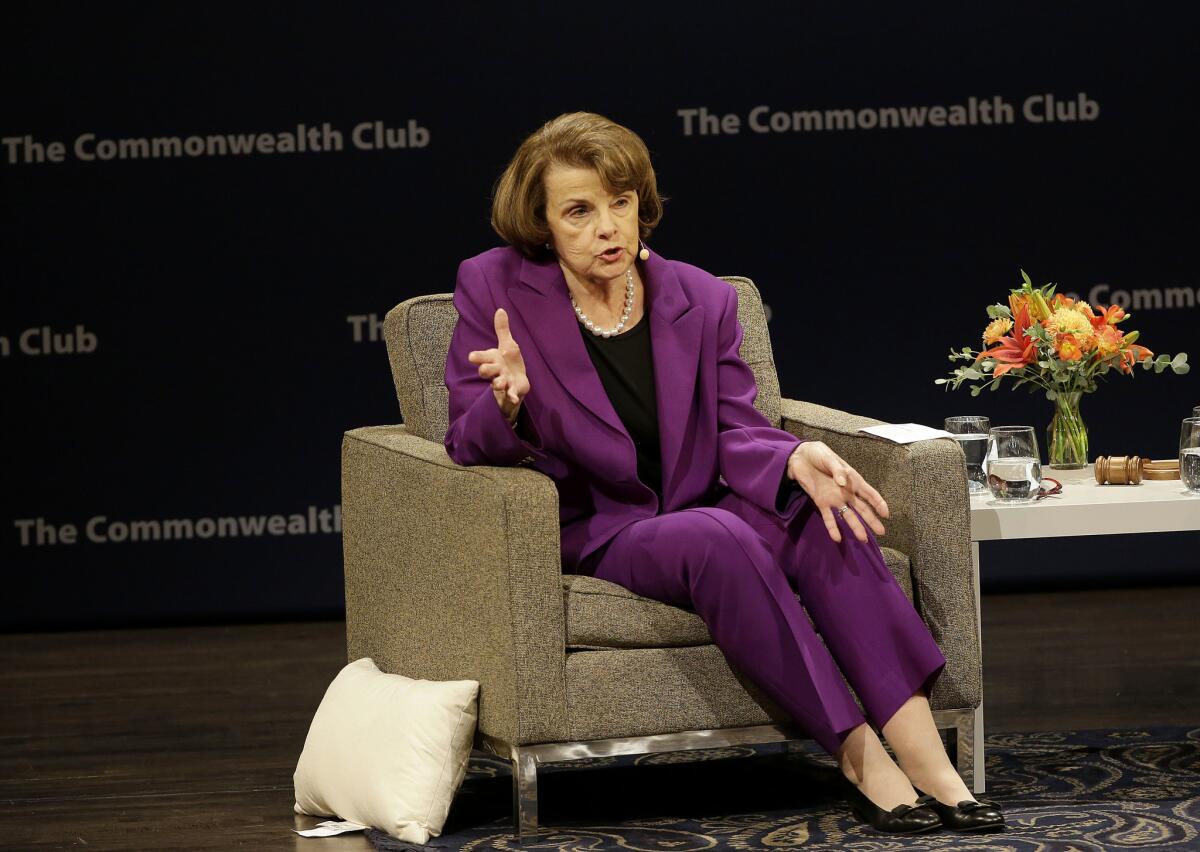
The leader of California’s state Senate on Wednesday sharply criticized a call from Sen. Dianne Feinstein for “patience” with President Trump, suggesting it was tantamount to being “complicit” in his behavior.
The comments by Senate President Pro Tem Kevin de León (D-Los Angeles) offer a glimpse into the vastly different approaches by two leading California Democrats to Trump’s first few months in office.
“It is the responsibility of Congress to hold him accountable — especially Democrats, not be complicit in his reckless behavior,” de León said in a written statement, first reported by San Francisco’s KQED public radio.
Feinstein, who spoke Tuesday night at the Commonwealth Club in San Francisco, was booed by the crowd after saying she still thinks he can be a “good president.” She went on to suggest a pause before passing judgment in the wake of how Trump will have to handle Hurricane Harvey
“This is his first big American emergency. I think we have to have some patience. I do,” she said.
The reply from de León, who is termed out of office next year and is rumored as a future candidate for governor or U.S. Senate, raised a litany of issues on which Democrats disagree with the president, including the environment and the possible deportation of young immigrants without legal residency status.
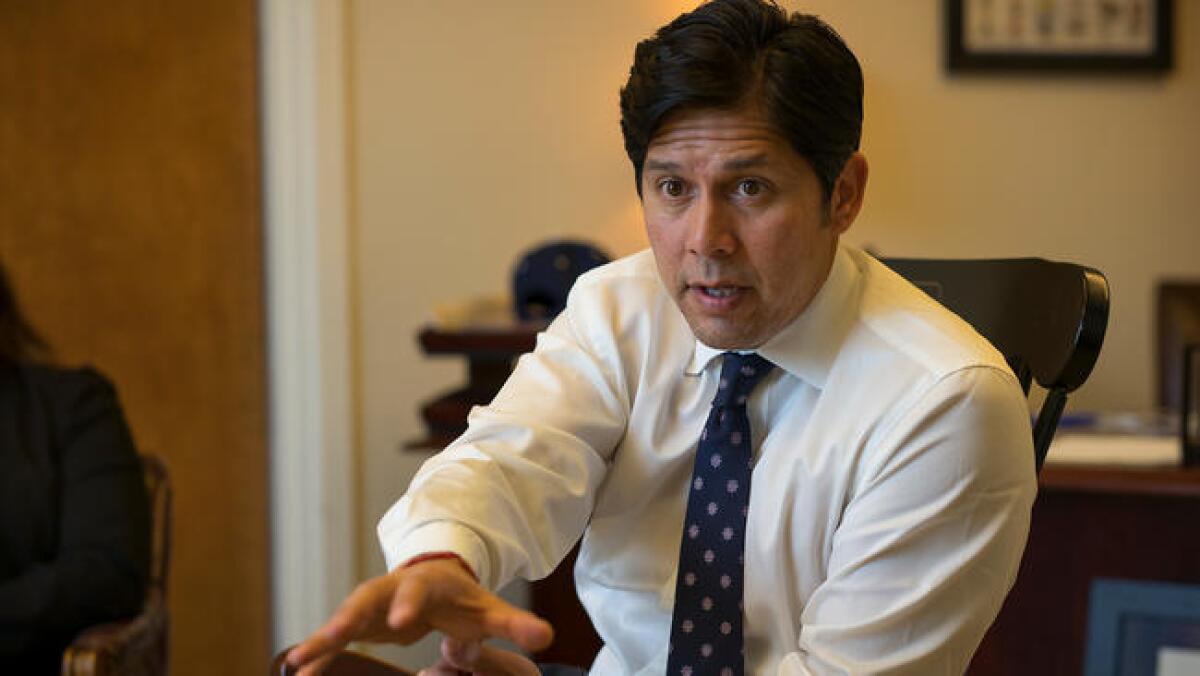
“I don’t think children who breathe dirty air can afford patience,” he said. “The LGBT worker or woman losing their rights by the day or the black student who could be assaulted on the street, they can’t afford patience. DREAMers who are unsure of their fate in this country can’t afford patience. Even a Trump voter who is still out of work can’t afford to be patient.”
De León also said that “this president has not shown any capacity to learn and proven he is not fit for office.”
After news reports of her comments at the event, Feinstein issued a statement Wednesday seeking to clarify her stance.
“The duty of the American president is to bring people together, not cater to one segment of a political base; to solve problems, not campaign constantly,” Feinstein said. “While I’m under no illusion that it’s likely to happen and will continue to oppose his policies, I want President Trump to change for the good of the country.”
Sen. Dianne Feinstein laments that Trump hasn’t brought the nation together
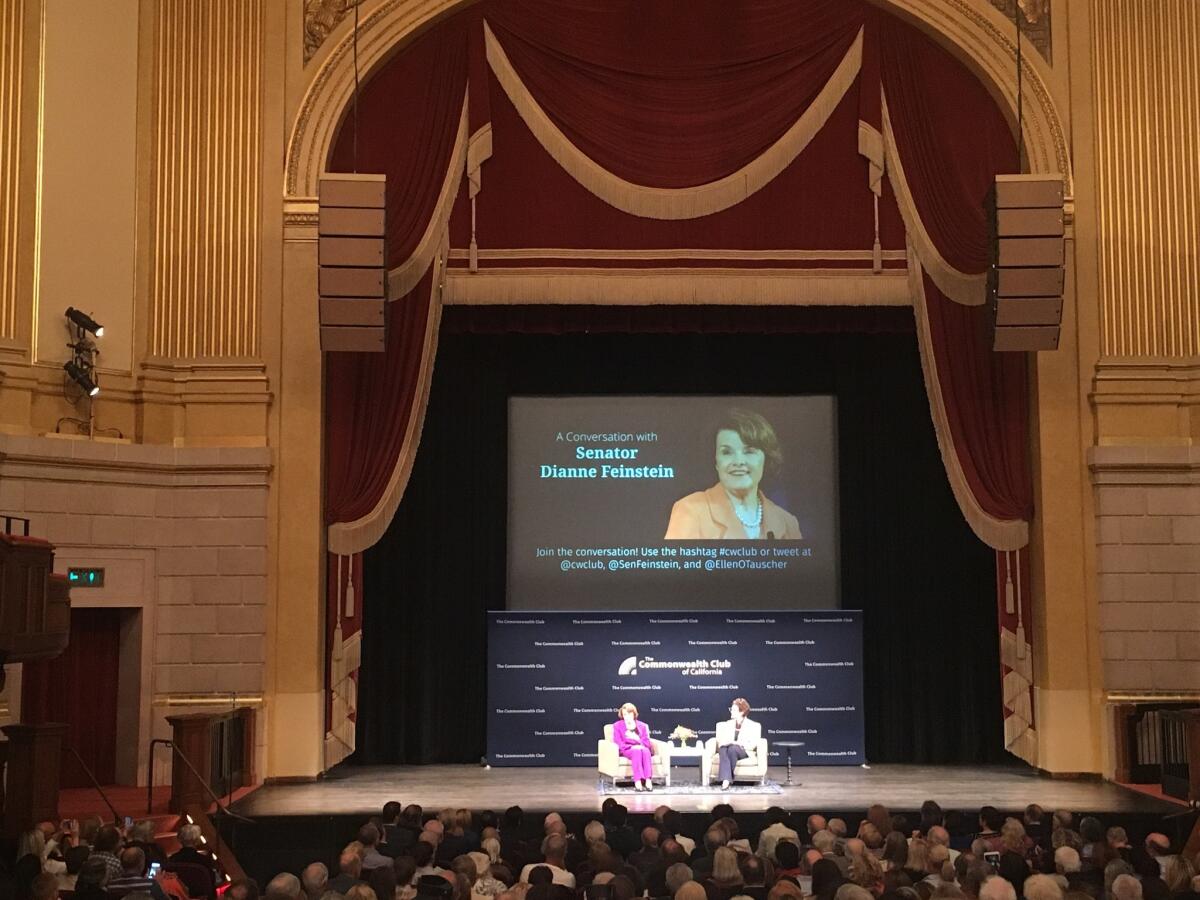
Sen. Dianne Feinstein on Tuesday said now more than ever President Trump should work to unite and heal the country.
“The one thing he needs to do, in my view, is bring this nation together, and he hasn’t done that,” Feinstein said at a Commonwealth Club event in San Francisco.
Feinstein, a Democrat, talked about her support for the Deferred Action for Childhood Arrivals program for people brought to the country illegally as children. She called on Trump, who is considering rescinding the program, to allow these immigrants to stay.
“These young people so want to be Americans, and they want to work and be part of this country,” she said.
She also offered a moment of silence for victims of Tropical Storm Harvey.
The crowd showed its political leanings when asking her about efforts in Congress to impeach Trump.
The senator said the president is likely to be in office for the next few years, adding that she hopes he will learn and change.
Several audience members booed and shouted, “No!”
Feinstein had her own critics at the scene.
Members of Indivisible SF demonstrated outside the theater as they objected to the fact Feinstein had not hosted a town hall during the August congressional recess. Christine Wei, a spokeswoman for the grass-roots group, complained that anyone wanting to ask the senator a question at this forum would have needed to pay $40 to $65 for a ticket.
Instead, Feinstein fielded questions from the audience read to her by Ellen Tauscher, a former congresswoman who represented the Central Valley and served as an undersecretary in the Obama administration. Most of the attendees were members of the Commonwealth Club.
Violence from white supremacist groups should be treated as terrorist acts, committee says
In response to the deadly rally in Charlottesville this month, the Senate Public Safety Committee on Tuesday approved two resolutions urging state and local law enforcement agencies to treat violent acts by white nationalists and neo-Nazi groups as terrorist attacks.
Sen. Nancy Skinner (D-Berkeley), chairwoman of the committee and author of the resolutions, has also amended a bill to expand the penal code related to hate crimes. If approved, protections under current state hate crime laws would extend to anyone acting in defense or support of those already covered, including minorities, the disabled and members of the LGBTQ community.
Before the committee on Tuesday, Skinner urged support for the legislation, saying state prosecutors and officers should be allowed to use terrorism and anti-hate crime laws to fully investigate and pursue charges against white nationalist and neo-Nazi hate groups.
The resolutions were unanimously approved with 7-0 votes. But following a weekend of protests in the Bay Area, including several violent clashes in Berkley instigated by members of the leftist group Antifa, one committee member questioned whether the list was too narrow.
Sen. Joel Anderson (R-Alpine), who asked to be added as a co-author, said his staff had suggestions for additional groups that should considered “given what was happening on college campuses.”
“The whole point is hate is hate,” he said. “It doesn’t matter where it originates, it is all wrong.”
Sen. Scott Wiener (D-San Francisco) said he had been critical of suppression of free speech in Berkeley in the past. But while the language in the resolutions could be massaged, he said, their message shouldn’t be diluted.
“When we talk about neo-Nazis and white supremacy, it goes beyond suppressing of free speech,” he said. “These are unique evils that deserve to be specifically called out.”
Democratic nurse and school board member announces bid against Republican Rep. Jeff Denham
Emergency room nurse Sue Zwahlen is joining the race to try to unseat Central Valley Republican Rep. Jeff Denham.
Zwahlen, a 63-year-old Democrat, has been elected twice to the Modesto City Schools Board of Education.
“I’m a homegrown candidate; I have a lot of experience in bringing people together to solve problems, especially when it comes to healthcare and education,” she said.
Zwahlen was born in Modesto and attended nursing school at the Samuel Merritt Hospital School of Nursing in Oakland. She’s been an emergency room nurse for more than 40 years. She is the second nurse who has signed up to run against Denham.
“We need someone, I believe, with my experience and knowledge and intimate experience with patients and the challenges they face every day,” she said.
All of California’s Republican members voted for the House GOP healthcare plan to replace the Affordable Care Act, and Democrats are using the vote as a campaign issue.
Democrats have repeatedly targeted the 10th Congressional District, where Denham won reelection in 2016 by less than 5 percentage points. At least 10 people have filed to challenge him in 2018.
Democrats lack votes to pass key California housing bill
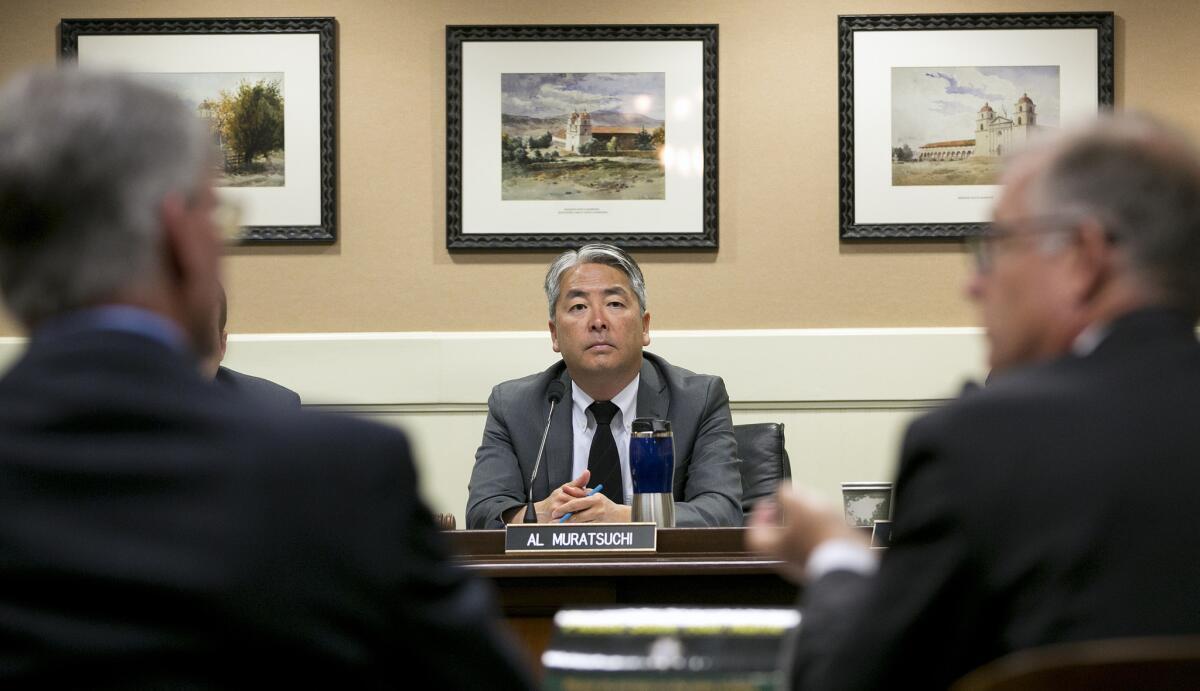
State Democrats remain short of the votes they need to pass a key part of the package of legislation aimed at addressing California’s housing crisis.
Three Democrats in the Assembly told the Los Angeles Times on Tuesday afternoon they remained undecided on Senate Bill 2, a measure that would add a $75 fee on many real estate transactions to fund low-income housing development.
SB 2 requires a two-thirds supermajority vote of the Assembly to pass. Assuming no support comes from Republican lawmakers, Assembly Democrats can’t afford to lose any members of their caucus.
“I’m still looking at it,” said Assemblyman Al Muratsuchi (D-Torrance). “My concern is that it looks and smells like a tax.”
The bill’s author, Sen. Toni Atkins (D-San Diego) pushed through changes to the measure Tuesday morning to give cities and counties more direct control over the money generated by the fee in an effort to gain enough support.
Democratic Assemblyman Tom Daly of Anaheim said he was still reading through the amendments and hadn’t made up his mind.
After Democratic lawmakers gathered for lunch Tuesday, Assemblywoman Jacqui Irwin of Thousand Oaks exited with Assemblyman David Chiu of San Francisco. Chiu, who leads the Assembly Housing and Community Development Committee, was talking through the housing bills with her.
“I’m considering it still,” Irwin told The Times of SB 2.
SB 2 passed the state Senate on a party-line vote with the entire supermajority of Democrats voting yes.
Legislative leaders are aiming for a vote on a full package of housing bills, which include a bond measure on the 2018 ballot and legislation to ease local development regulations, as early as Friday.
Sept. 1, 1:30 p.m., This post was corrected to reflect that Democrats can’t afford to lose any members on this vote. An earlier version incorrectly said they could lose one member.
L.A. Mayor Eric Garcetti, other top California mayors will be at the Capitol Wednesday to push for housing legislation
Voters are skeptical of a new state law that overhauls how Californians cast ballots
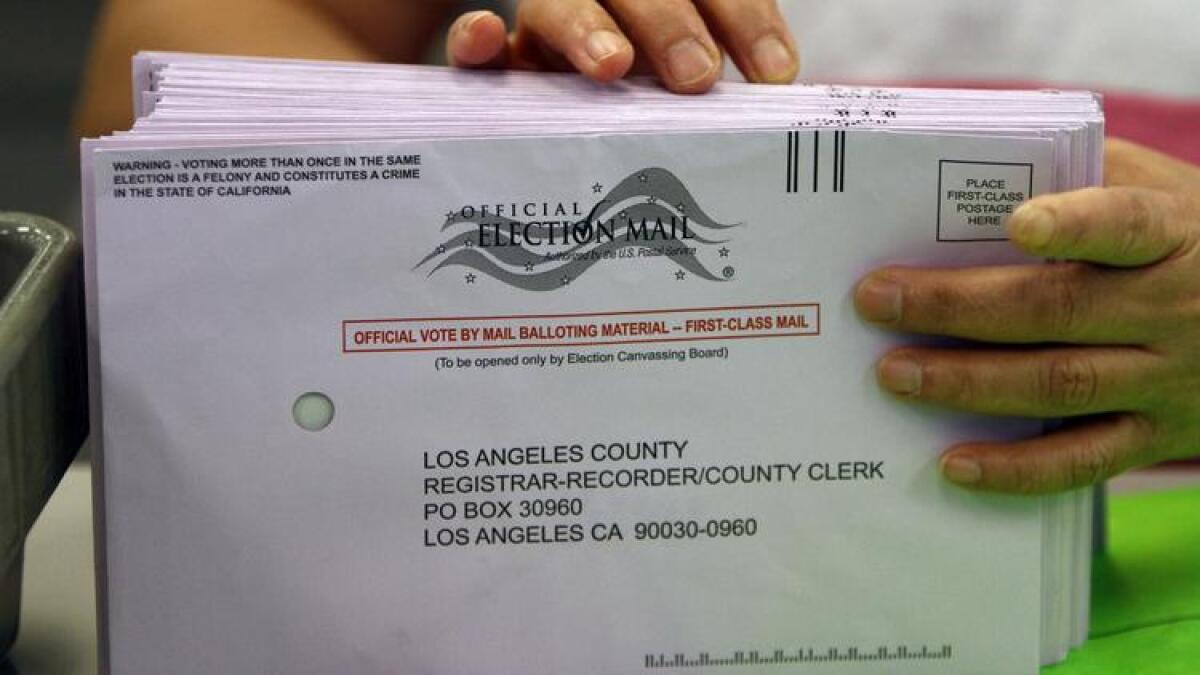
A new statewide poll shows widespread voter opposition to a California law that allows counties to close polling places and instead rely on absentee ballots and a limited number of multipurpose election centers.
Sixty-one percent of voters said they didn’t like the idea of switching to a system of “voter centers” and all-mail ballots, according to the poll released on Tuesday by UC Davis’ California Civic Engagement Project.
“Voters are not initially receptive to vote centers,” said Mindy Romero, the project’s founder, during a presentation in Sacramento.
There are 14 counties eligible to use the new rules in 2018, with all other California counties being able to join them and move away from neighborhood polling places two years later in 2020. So far, only a handful have agreed to the change.
Supporters have said the law simply builds on the trend toward voting by mail, while also allowing voters more access to a variety of election-related services -- including election day registration -- at locations conveniently placed throughout communities.
But the poll found substantial skepticism across a number of subgroups of voters, both by ethnicity and age. Eight in 10 of the voters surveyed said they typically travel 10 minutes or less to their polling place, a distance that could grow in the counties that switch to vote centers.
Romero said the poll’s findings show the importance of explaining the sweeping change in the counties that choose to change procedures under the new law, hopefully minimizing the risk that voters might be discouraged from casting ballots in 2018 and beyond.
“This is the most significant voting change we’ve seen in our state,” she said. “Education and outreach is going to be absolutely key.”
GOP healthcare vote inspires another challenger for California’s Rep. Jeff Denham
It was healthcare that inspired Riverbank small business owner Virginia Madueño to become the newest person to challenge Republican Rep. Jeff Denham in California’s Central Valley.
Madueño, 52, said she decided to run when Denham voted for the GOP bill to repeal the Affordable Care Act in May after initially saying he’d vote against it.
“That’s when it became personal for me,” she said.
After previously toying with the idea of running, she attended a local healthcare town hall and realized “not only did I have a story to share but I had a cause, if you will. I could relate.”
The Democrat said that before the Affordable Care Act passed in 2010, she struggled to find health insurance because of a preexisting condition stemming from a case of bacterial meningitis when she was an infant.
Born to Mexican immigrant farmworkers in Modesto, Madueño has a communications degree from Cal State Stanislaus. She said she can relate to the heavily agricultural community and its concerns about immigration policy.
“My family has gone through the whole immigration process. There was a time when immigration worked incredibly well, and it’s not working right now,” she said.
Madueño runs Imagen LLC, a communications firm she established in 2001. She served on the Riverbank City Council from 2005 to 2012, including a stint as mayor from 2009 to 2012. Gov. Jerry Brown appointed her to the Commission on Boating and Waterways in 2013. She ran unsuccessfully for the state Assembly in 2016.
Madueño plans to hold 10 town halls in the district over the next few months.
“I don’t believe that I have all of the answers, but I think that by learning more from the community … I’m going to be able to actually articulate and carry that voice forward,” she said.
At least 10 people have filed to run in 2018 against Denham, who won reelection by less than 5 percentage points in 2016 after Democrats sought to tie him to now-President Trump.
Immigrant advocates hold prayer service in Gov. Jerry Brown’s office to support ‘sanctuary state’ legislation
With negotiations heading down to the wire on California’s so-called “sanctuary state” legislation, more than a dozen faith leaders poured into Gov. Jerry Brown’s office Tuesday to show their support for immigrants who are in the country illegally.
In what they called “an act of civil disobedience,” members of the Interfaith Movement for Human Integrity peacefully occupied the space and held a prayer service. The group read Scriptures, sang songs and told stories of parishioners who they said were living in fear under the Trump administration’s expanded deportation orders.
“Gov. Brown, join our service,” said Sarah Lee, an organizer with Interfaith Movement. “We are here to stand with you in courage.”
Several California Highway Patrol troopers and staffers at first scrambled to respond, but the group brought along a police liaison, and no one intervened.
People without an appointment were not allowed into the governor’s office. Some who did have a meeting scheduled were asked to wait outside.
Group leaders said they held the service in an attempt to meet with Brown and urge him not to amend SB 54. The legislation, introduced by Senate leader Kevin de León (D-Los Angeles), is the centerpiece proposal in a legislative package filed by Democrats to protect immigrants under increased immigration enforcement actions. It would prohibit police and sheriff’s agencies from using resources to enforce federal immigration laws.
But it has raised loud opposition from Republican lawmakers and many sheriffs, who say they have been in discussions with Brown in hopes of amending the bill. A different group of faith leaders met with Brown in his office last week.
Among those present was Leslie Takahashi, the daughter of a Japanese internment camp survivor and a lead minister with the Mount Diablo Unitarian Universalist Church in Walnut Creek.
She said she and other church leaders have been working for years to make California a place of sanctuary for immigrants without legal status. She called the legislation crucial at a time when the president has pardoned former Arizona Sheriff Joe Arpaio and is threatening to end a federal program that provides temporary immigration relief to children illegally brought into the country.
“What we see going on is an effort to reduce the effectiveness and the statement that we are trying to make,” Takahashi said of the push to amend the legislation.
2:15 p.m. This article was updated with comments from immigrant advocates.
This article was originally published at 1:30 p.m.
California state senators want big bucks for cleaner trucks and buses
A cadre of Democratic state senators are pushing to spend nearly $1 billion over the next year to replace diesel trucks, buses and other vehicles with cleaner versions.
A chunk of the money would come from California’s cap-and-trade program, which lawmakers agreed to extend last month. The program requires companies to buy permits to release greenhouse gases, and the state can use the revenue on initiatives that further reduce emissions.
“You are looking definitely at California’s future,” Sen. Ricardo Lara (D-Bell Gardens) said at a Tuesday news conference as nine trucks and buses, some powered only by electricity, lined up behind him outside the Capitol.
The proposal builds on an idea outlined by Senate President Pro Tem Kevin de León (D-Los Angeles) earlier this month.
The senators described diesel exhaust as a public health crisis in congested areas of California, especially highway corridors near international ports.
Sen. Nancy Skinner (D-Berkeley) held a canister holding pollution equivalent to 80 miles of exhaust from an 18-wheeler.
“It’s time to ditch diesel,” she said.
The senators aren’t the only ones with their eye on cap-and-trade funding. Assemblyman Phil Ting (D-San Francisco) wants to use some of the money to expand incentives for drivers to buy electric cars.
Los Angeles Rep. Karen Bass endorses Antonio Villaraigosa in governor’s race
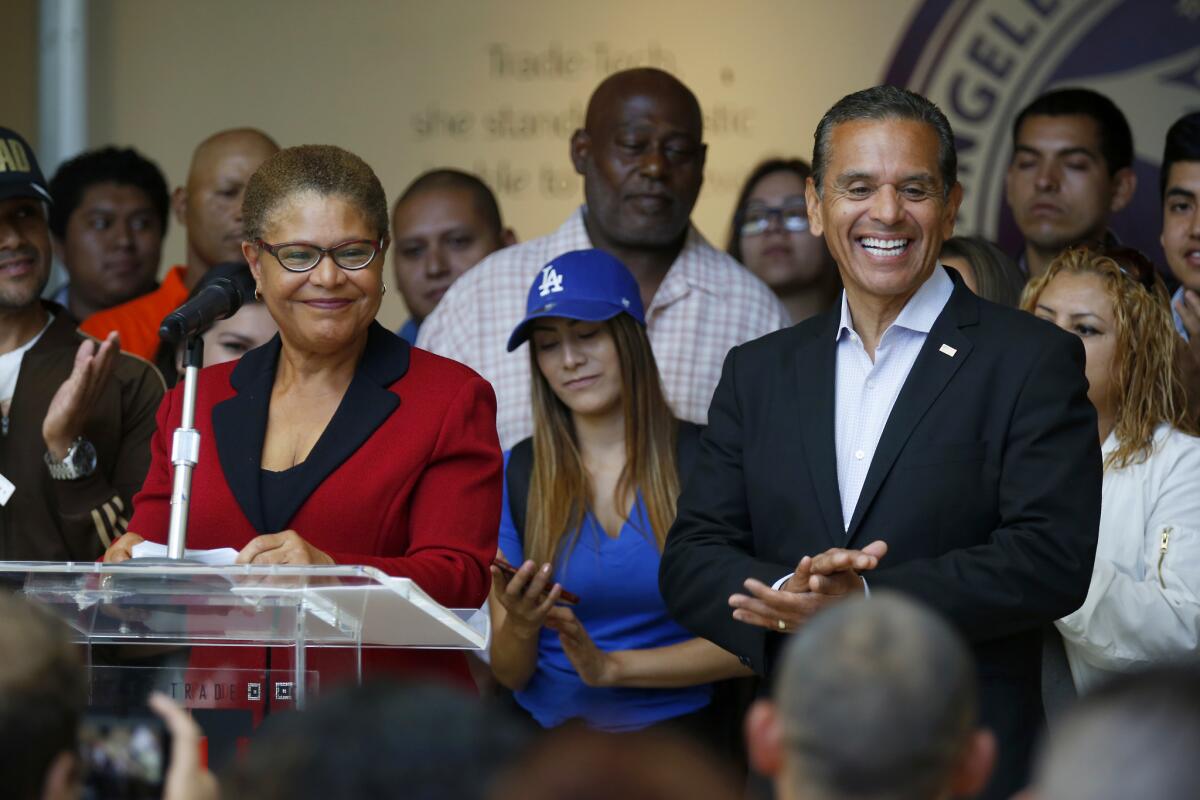
U.S. Rep. Karen Bass (D-Los Angeles) endorsed Antonio Villaraigosa’s gubernatorial bid on Tuesday, arguing that his record of fighting for equal rights over the four decades she has known him demonstrates he would be the best candidate in the 2018 race to lead all Californians.
“What a governor he will be,” Bass said. “Antonio is working to lift up this state so everyone everywhere has equal opportunities. So good jobs are not just for people in Silicon Valley or Silicon Beach, but for everyone. So good schools are not just in wealthy neighborhoods, but for everyone, everywhere. So we are not a wealthy coast and a struggling inland, but one California [where] every single one of us has a chance to learn and earn.”
Bass is the third former Assembly speaker to endorse Villaraigosa, who also held that post before he was elected mayor of Los Angeles. The current speaker, Anthony Rendon, has backed Treasurer John Chiang for governor.
Bass is also among the most prominent African Americans to endorse in the race. Black voters make up about 6.5% of the state’s population, according to the 2015 U.S. Census Bureau estimate. That’s far less than the fast-growing populations of Latino and Asian American voters. But black voters have historically been a powerful force in Democratic politics. Villaraigosa’s support in the African American community is among the reasons he won the 2005 mayor’s race four years after losing.
“He has built bridges with the African American community for decades,” Bass said, pointing to Villaraigosa’s work on education, criminal justice reform and inequity. “Go to church with him and see the support that he has, the recognition that he has, the affection that people feel.”
Bass and Villaraigosa appeared together at Los Angeles Trade Technical College, where they emphasized the nation’s need for more skilled workers with higher education degrees, as well as training in fields such as nursing and welding. It’s personal for the pair, who both attended community colleges before transferring to four-year universities.
“I know what education can do to change the lives of people,” Villaraigosa said, noting that he was raised in a home where domestic violence and alcoholism were present and that he had disciplinary issues in high school before teachers and his mother helped him find his way.
They spoke in front of several students who were brought to the country illegally when they were children. President Trump is considering whether to phase out Obama-era protections for younger undocumented immigrants.
“I want to make absolutely clear that here in California, we’re going to mark our own path. We’re going to stand up for the immigrants and the poor,” Villaraigosa said, pledging to try to use the courts to block Trump if he rolls back the protections in the Deferred Action for Childhood Arrivals program.
Changes to key housing bill will give local governments in California more control over the money
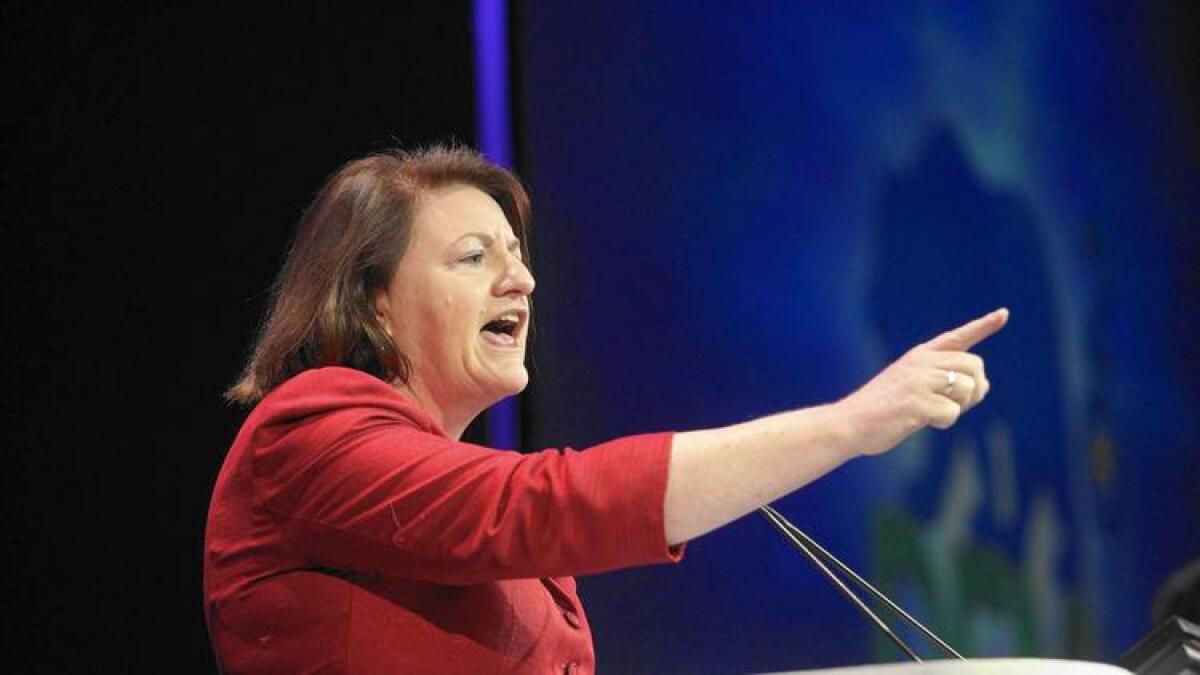
Cities and counties will have more control over money designed to help the state combat its housing affordability crisis under amendments to key legislation unveiled Tuesday.
SB 2 from state Sen. Toni Atkins (D-San Diego) would charge a $75 fee on mortgage refinances and other real estate transactions and funnel the money to housing subsides. The fee, which would raise roughly $250 million a year, wouldn’t be charged on home or commercial property sales.
Under the changes made to the bill Tuesday, local governments will receive half the money in the first year to update blueprints that guide neighborhood development to speed up community planning. The state Department of Housing and Community Development would receive the remainder to fund homeless housing efforts. In later years, the state would award most of the dollars to cities and counties to finance the construction of low-income housing development.
The changes are designed to address concerns from some skeptical Democrats in the Assembly about raising fees on homeowners. The measure requires a two-thirds supermajority vote to pass and is considered the most fragile of the main bills in a package of legislation aimed at addressing the state’s housing problems.
At a news conference Monday before the amendments were released, Atkins said she had not yet secured enough support for her bill but was working on changes. The state’s housing problems, she said, required lawmakers to act now.
“If we don’t get started in a serious way with each and every one of these pieces of legislation, we will have more than a crisis on our hands,” Atkins said. “We will have a humanitarian crisis of proportions you have never seen.”
Changes to other bills in the housing package also were released Tuesday morning. They were memorialized in a deal announced Monday evening between Gov. Jerry Brown and legislative leaders to support a $4-billion bond on the 2018 ballot to fund low-income housing projects and subsidize home loans for veterans. There also were minor changes to a bill designed to ease local regulations on home building.
Lawmakers could take up all the housing bills as soon as Friday. But Brown and top lawmakers have not announced they’ve reached an agreement on an entire package, nor that they’ve secured the votes for it to pass.
California Supreme Court: Local tax hikes should be treated differently when citizens propose them
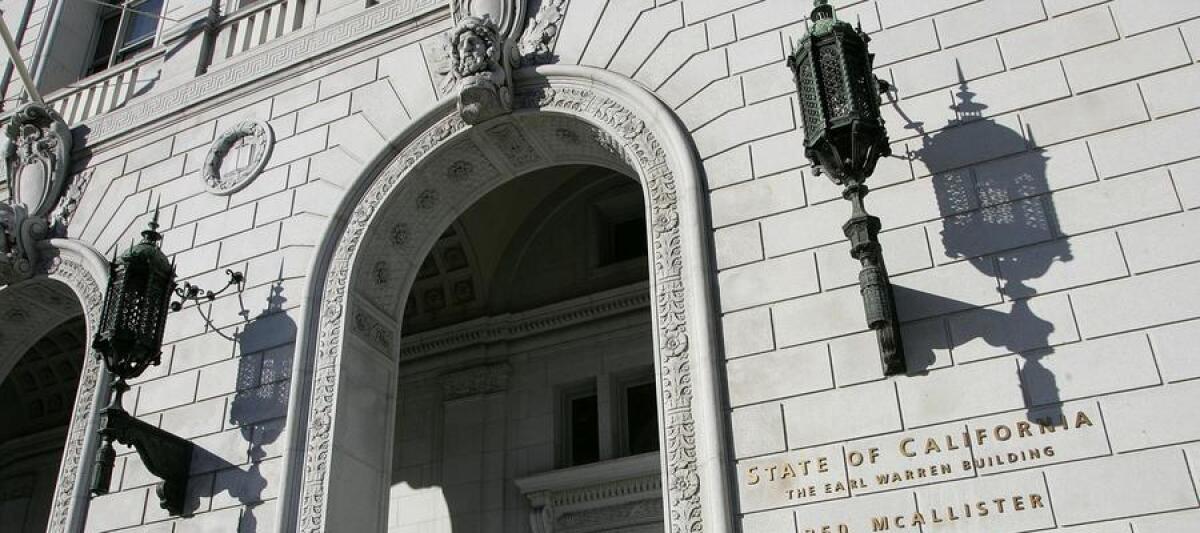
For decades in California, local tax increases to finance school, transit, road and other specific improvements have needed to clear a high bar: a two-thirds super-majority of voters.
But a California Supreme Court ruling on Monday has led some to argue that’s changed, making tax hikes easier to pass. The court decided that local tax proposals from citizen groups put on the ballot via initiative should be treated differently than those pitched by local elected officials. By that logic, the two-thirds threshold may no longer apply to tax initiatives, which now could possibly pass with a simple majority.
No consensus has emerged yet, however, on if the ruling is that far-reaching. The attorney who won the case said the voter threshold for tax increases has not changed.
Schwarzenegger props up Mayes after lawmaker’s support of cap-and-trade costs him GOP leadership post
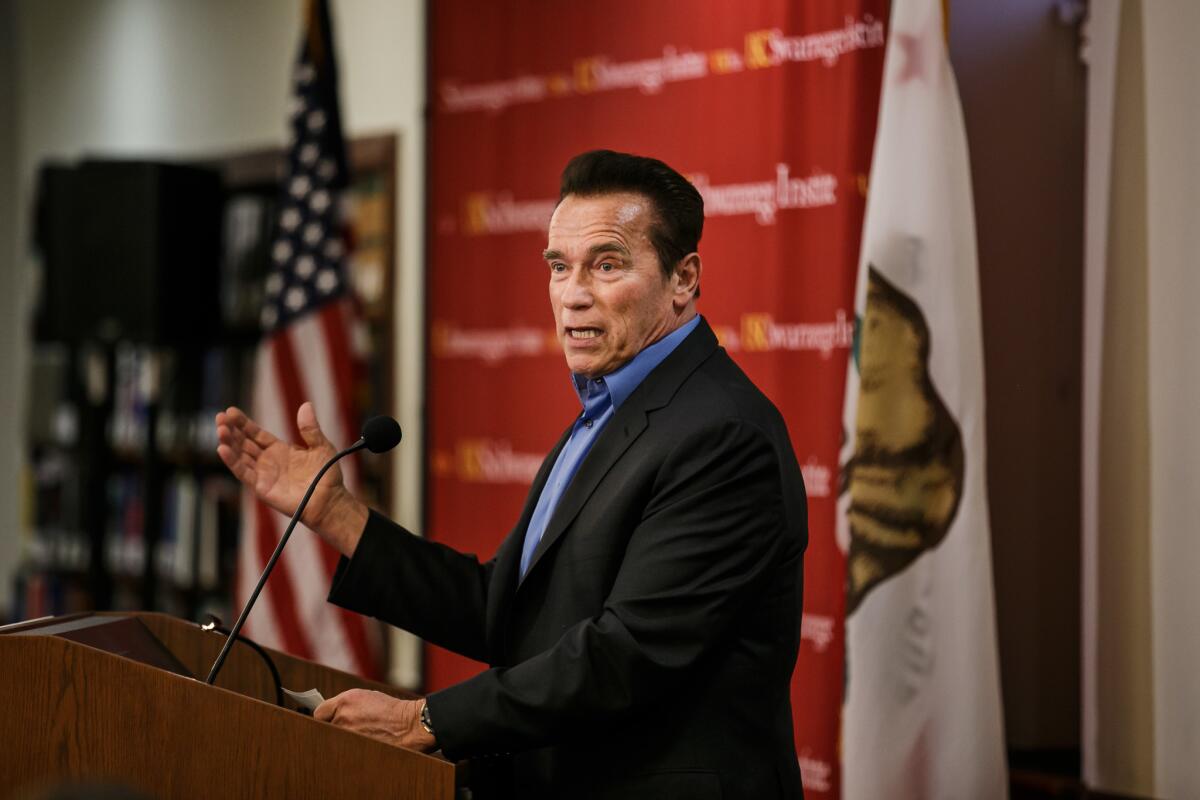
Former Gov. Arnold Schwarzenegger on Monday offered support for Assemblyman Chad Mayes, who recently lost his Republican leadership post because of his support for the cap-and-trade climate change program championed by Democrats.
Schwarzenegger, a longtime proponent of such efforts to fight climate change, used FaceTime to call in and laud Mayes at a Sacramento fundraiser, according to a source familiar with the former governor’s remarks.
He “really pumped him up,” said the person, who requested anonymity to speak candidly about Schwarzenegger’s remarks. The former governor “said [Mayes] is the type of Republican California needs.”
The moment was notable, but not surprising.
Mayes was forced to announce last week that he was stepping aside as the Assembly minority leader after weeks of tumult prompted by his support for an extension of the state’s cap-and-trade program through 2030. The program, which requires oil refineries, power plants and other facilities to buy permits to emit greenhouse gases, had been slated to expire in 2020.
Mayes was one of eight GOP legislators who voted for the legislation, but his support drew particular scorn from conservative activists because of his role in party leadership.
They argued that Mayes was betraying their values and providing cover for Democrats in swing districts who voted against the measure. Mayes countered that his vote was recognition of the concerns of the state’s voters.
When Schwarzenegger was governor, he passed the foundation for the state’s cap-and-trade program with only one GOP vote. That bill is among the reasons his party shunned him before he left office in 2011.
In the aftermath of the July cap-and-trade vote, Schwarzenegger offered his immediate support to Mayes, tweeting that the assemblyman was “following in the footsteps of great Republicans like Teddy Roosevelt and Ronald Reagan.”
Mayes thanked the former governor for his friendship and called him a “change agent” who “paved the way for others seeking to make our world a better place to live.”
Brad Sherman: ‘I can only imagine what Trump would do if he thought there was absolutely no risk of impeachment’
Rep. Brad Sherman, the L.A.-area congressman who bucked Democratic Party leadership to file articles of impeachment against President Trump based on allegations of obstruction of justice, met Monday with the Los Angeles Times editorial board and members of the newsroom. The Porter Ranch resident talked about his reasons for formally pushing impeachment, the country’s divisions, and why California Democrats don’t work more with the state’s Republican leaders. Here are portions of the discussion, edited for length and clarity. You can listen to the interview in full above.
Sherman thinks people are leery of impeachment, but filing for it has an effect
The actual filing of articles tangibilitizes what so many other people are saying and even Republicans are warning. … It’s funny, the word impeachment. I’ve had all these people come up to me in my district and thank me for everything I was doing and not mention the word impeachment. It’s a word that people stay away from and I analogize it to abortion. When I go out there I support Planned Parenthood, you don’t want to mention the particular word.
If it had any beneficial effects short-term, it was to get people in the White House to say, “Mr. President, you’ve got to clean up your act a bit.” … I can only imagine what Trump would do if he thought there was absolutely no risk of impeachment but firing [Department of Justice Special Counsel Robert] Mueller is the first thing he would do.
Is tangibilitize a word?
Jerry Brown invented it.
Is Sherman concerned most people haven’t jumped onto the impeachment train with him? Nope
Somebody actually had to say the word and produce the articles. I’m kind of surprised that it’s me, but I felt it was time to go forward.
He doesn’t think much of talk about using the 25th Amendment to remove Trump for incompetence
To me that is much more insulting of Trump and maybe even his supporters than to say, “Look, he violated obstruction of justice statutes.” To say he violated one statute … is considerably less insulting than to say he falls below [a] competency standard.
If Democrats get trapped in an effort to make Trump a one-term president, Sherman says it won’t be the impeachment effort’s fault, it’ll be the party’s message
For Brad Sherman to file articles of impeachment, [that] sends that message out with 20 decibels. If Nancy Pelosi were to do it that would be 100 decibels. That’s why I haven’t gone to Nancy and said, ‘You need to do this.’ ...
We’re going to need a more specific economic plan. … We haven’t fleshed it out enough. … The thing is that it’s not news that a political party is in favor of better jobs, better wages and a better future for Americans. My guess is Republicans are in favor of that, too, or at least say so.
Sherman thinks relationships in Congress are better and more honest ‘in a way’
Republicans can talk to me. … If I had a press conference to tell you what Ed Royce [Republican of Fullerton] told me in the gym, you wouldn’t believe it and you’d certainly believe his denial … or was it Dana Rohrabacher [Republican of Costa Mesa]?” They’re loyal to their issues, they’re embarrassed by their president.
Trump could be more boring to hold onto his unenthusiastic voters, Sherman suggests
His future’s in his hands. … He can barely meet the low bar of: “Can you give a speech showing sympathy to people in Texas without saying that Ted Cruz’s father was part of the Kennedy assassination?” … Pick the most boring president in the last 100 years. If he could just meet that standard. If he could rise to the level of Calvin Coolidge, could be [Warren] Harding, whatever.
Trump’s divisiveness is encouraging extremes, which Sherman calls ‘Trump Derangement Syndrome’
Thank God he didn’t put out a message on Mother’s Day because there would have been pressure on me to come out against Mother’s Day. … If Trump takes a position, then you must take an equally extreme and opposite position. He’s for Mother’s Day, you must be against Mother’s Day. He’s for a wall, you have to be for unlimited immigration from all places.
He says the relationship between California Democrats and House Majority Leader Kevin McCarthy, also a Californian, is not that productive
The politics are that you get elected for being loyal to your ideology rather than being loyal to your state. … You’d think we’d get together and fight for California and we do a little bit, and I think a little less than other states.
California lawmakers reach deal on affordable housing bond
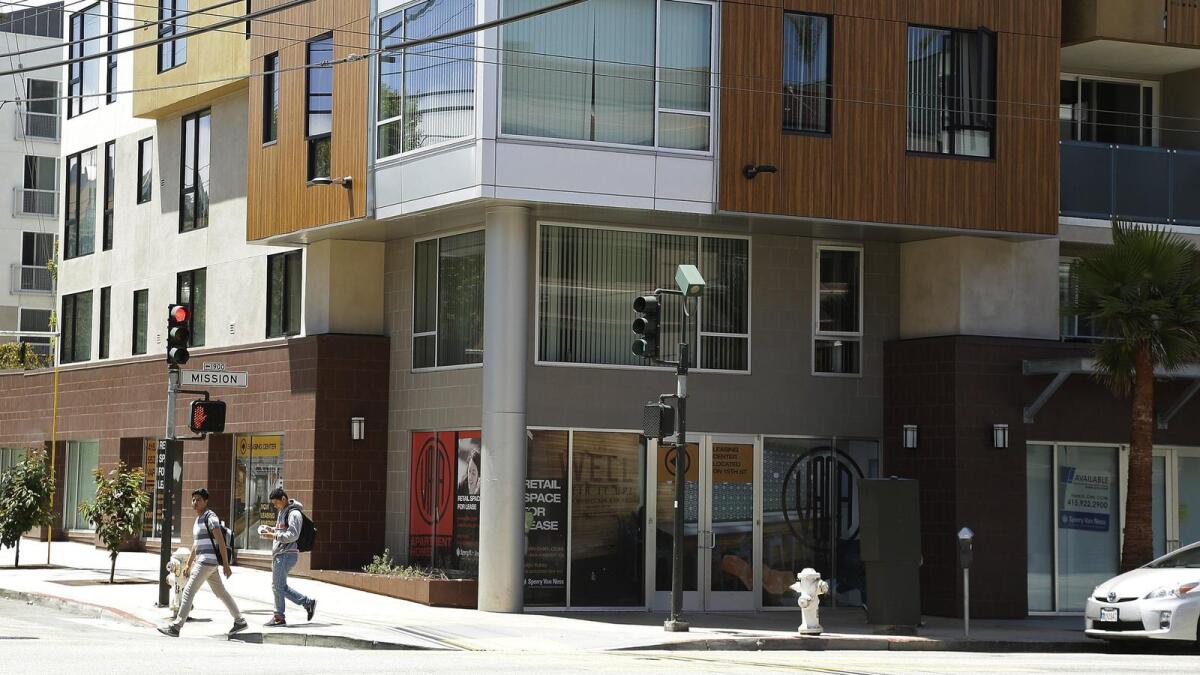
Gov. Jerry Brown and legislative leaders agreed late Monday to a $4-billion bond aimed at the 2018 ballot that would fund low-income housing developments and subsidize home loans for California veterans.
“The bond agreement we have reached provides badly needed funding to help Californians, including our veterans, find safe, affordable housing,” Assembly Speaker Anthony Rendon (D-Paramount) said in a statement announcing the deal.
The decision comes as the Legislature considers a package of legislation designed to address the state’s spiraling housing affordability crisis. The bond measure, Senate Bill 3, is one of three key bills designed to increase state spending on low-income housing and ease local restrictions on home building.
SB 3 originally would have authorized $3 billion to support construction of new homes for low-income residents. Changes to the bill announced Monday evening added $1 billion for homeownership subsides for veterans through a program that would otherwise run out of money next year.
Monday’s decision is another step toward an agreement between the governor and lawmakers on a final housing deal. Senate Bill 2, which would add a $75 fee on mortgage refinancing and other real estate transactions to fund low-income home building, has been eyed skeptically by some Democrats in the Assembly. Changes to that measure are also expected.
Rendon and Senate President Pro Tem Kevin de León (D-Los Angeles) are also negotiating a 2018 bond measure to fund improvements to water and parks infrastructure.
SB 2 and 3 and a water and parks bond all need two-thirds supermajority approval in both houses of the Legislature. The deadline for all bills to pass this year is Sept. 15.
Judge invalidates law that would have allowed public financing of political campaigns in California
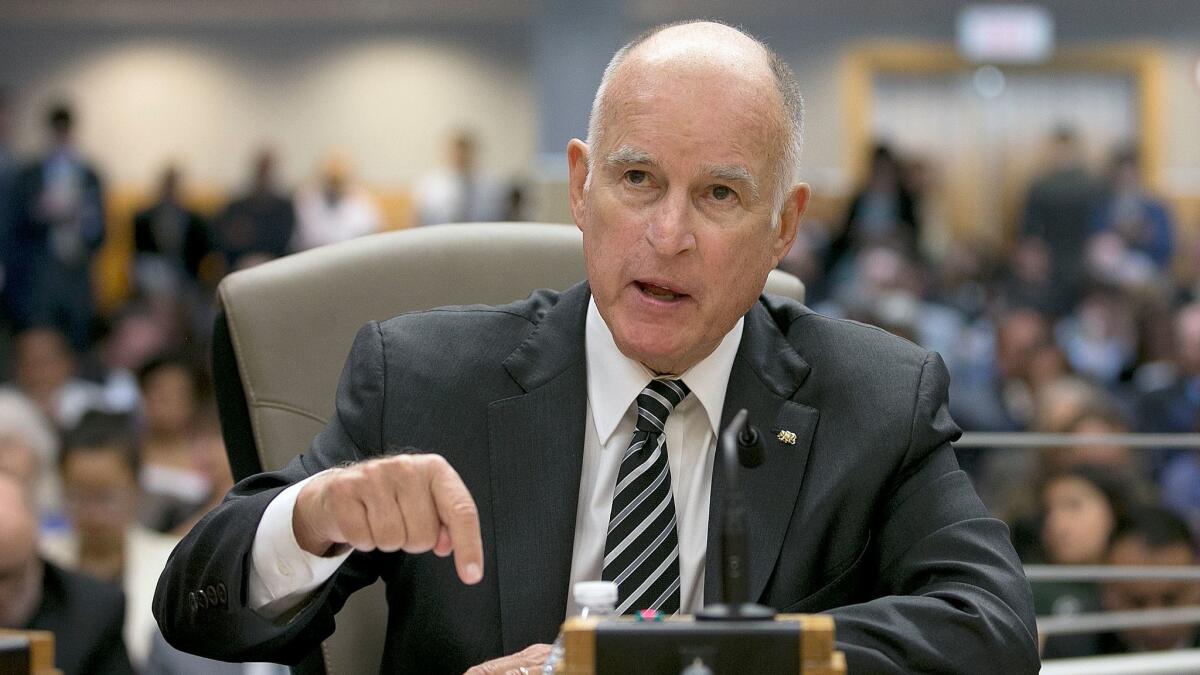
A Superior Court judge has struck down a new law signed by Gov. Jerry Brown that would have allowed cities, counties and the state to provide public financing of political campaigns, ruling that it violates a ban on that use of taxpayer dollars established nearly 30 years ago, officials said Monday.
Judge Timothy M. Frawley in Sacramento ruled that the financing law, which was signed last September, “directly contradicts” Proposition 73, an initiative approved by voters in 1988 that bans use of public money for campaigns.
The judge ruled the new law did not “further the purpose” of Proposition 73, which is the only means in which the Legislature can amend a law passed by the voters.
“We are very pleased with the decision,” said Jon Coupal, president of the Howard Jarvis Taxpayers Assn., which filed the lawsuit against Brown.
“It’s a misuse of taxpayer dollars when taxpayer dollars are limited,” Coupal added. “And you are in a situation where the government is picking winners and losers, because how do you decide who gets it [money] and who doesn’t?”
Sen. Ben Allen (D-Santa Monica), who wrote the legislation, said he will urge the state Attorney General to appeal the decision. “The judge’s ruling is a disappointing setback to communities that rightfully want to reduce the influence of special interest money in campaigns,” Allen said in a statement.
5:21 pm: Story updated to include comment from Sen. Allen.
Comedian Cheech Marin honored on the California Senate floor for his work to develop Chicano art center in Riverside
Lawmakers are poised to enact new disclosure rules for donors to California ballot measure campaigns
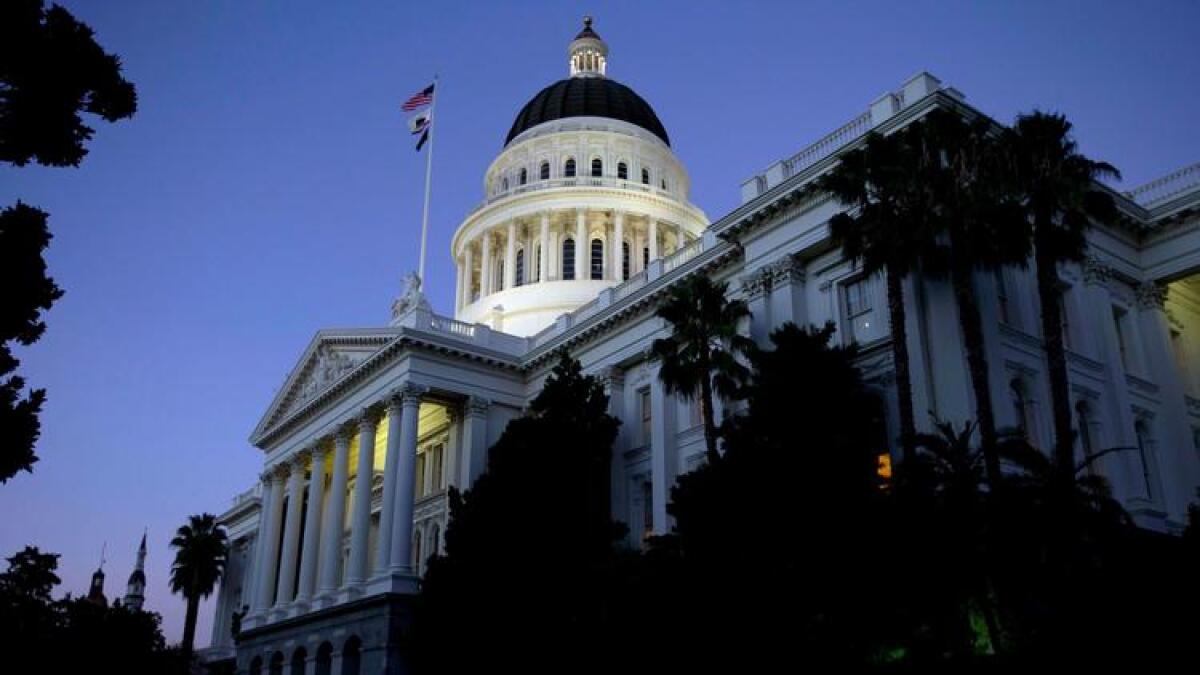
More than six years of state Capitol wrangling over how to improve disclosure of big donors in California political campaigns comes down to a crucial vote this week.
And in many ways, the effort to shine a brighter light on money in politics is really a fight over the fine print.
The basic elements of the “California Disclose Act” have been kicking around Sacramento since 2012. In short, it seeks to ensure that voters have more information about donors who increasingly use a series of bland-sounding political committees and groups to remove any fingerprints from the cash they’re spending.
Rep. Duncan Hunter gives President Trump a profane compliment
Rep. Duncan Hunter, one of President Trump’s first allies in Congress, described the president in profane terms to a group of Republicans on Friday, but also touted Trump as their champion.
“He’s just like he is on TV,” Hunter (R-Alpine) told the group. “He’s an asshole, but he’s our asshole.”
Hunter’s salty assessment was recounted by four people who were present when the congressman spoke at a Riverside County Young Republicans meeting in a Murrieta sports bar. Three spoke on the record with attribution, while one source spoke on the condition of anonymity. Others who were there made posts about Hunter’s comments on social media as well.
Hunter’s chief of staff did not respond to emails for comment.
The debate over single-payer healthcare in California isn’t going away. Here’s why
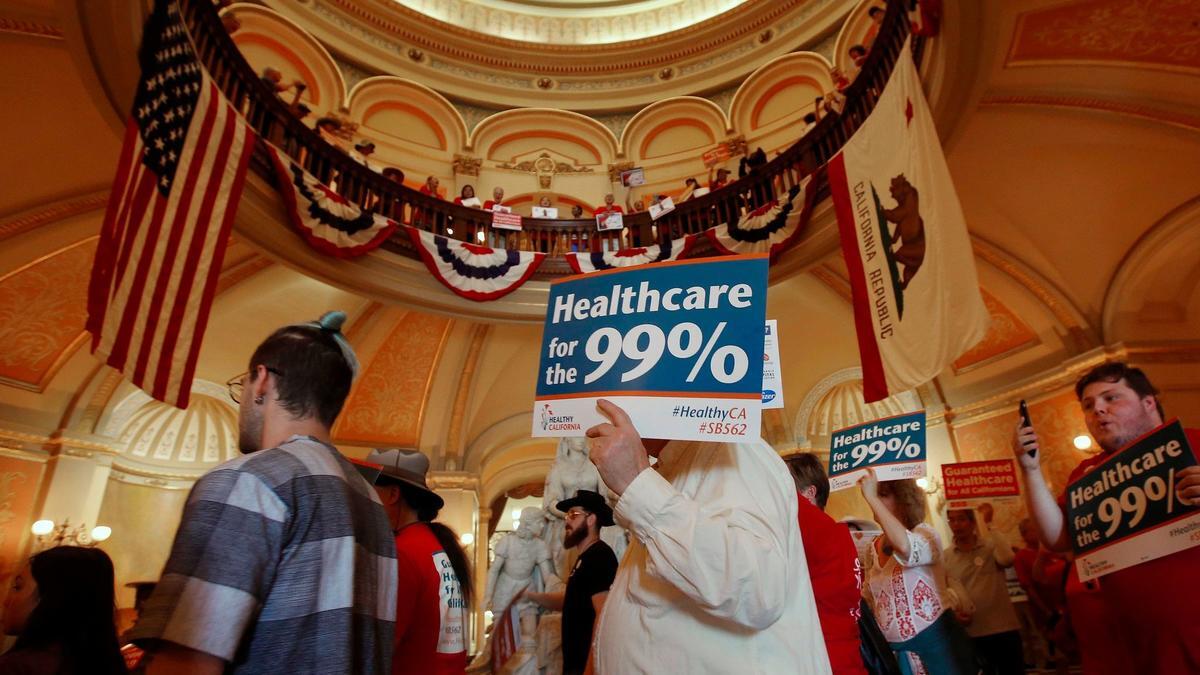
A bill to establish single-payer healthcare screeched to an abrupt halt earlier this summer — but that hasn’t blunted its continuing influence on California politics.
Calls for a sea change in the state’s healthcare system have proved remarkably durable, even after Assembly Speaker Anthony Rendon (D-Paramount) shelved a measure in June that would have made the state responsible for paying all of its residents’ medical costs.
A recently filed ballot initiative, budding campaigns against sitting lawmakers — including a recall effort against Rendon — and new plans for legislators to wrestle with how to achieve universal healthcare have taken shape in recent weeks, and the conversation is poised to take on national heft as U.S. Sen. Bernie Sanders (I-Vt.) prepares to introduce a “Medicare for all” measure in the fall.
It all sets the stage for a combustible coming election year, in which questions about the viability of single payer will be posed to gubernatorial candidates, incumbent lawmakers and new entrants to politics galvanized by the healthcare debate.
California still knows little about a device that intercepts cellphone data, despite state law to boost transparency
California lawmakers have sought to shed light on the StingRay, a powerful surveillance device that imitates the function of a cell tower and captures the signals of nearby phones, allowing law enforcement officers to sweep through hundreds of messages, conversations and call logs.
A 2015 state law now requires law enforcement agencies to seek permission at public meetings to buy the devices, and post rules for their use online.
But a Los Angeles Times review of records from 20 of the state’s largest police and sheriff’s departments, plus the Alameda County district attorney’s office, found that California still does not have a clear picture of which agencies are using the device, how wide a net the surveillance tools cast or what kind of data they gather.
California Supreme Court makes ruling on tax hikes
Scenes from rapper Common’s day at the California Capitol as he lobbied for justice reform
Rapper, actor and activist Common last week made the rounds in Sacramento, meeting with lawmakers and Gov. Jerry Brown, in an effort to promote bills meant to continue the reversal of tough-on-crime policies in California.
As part of the weeklong push by criminal justice reform groups, Common attended several events, had one-on-one meetings with political leaders and performed on the Capitol mall grounds during a free concert that brought together poets, activists and other music artists, including J.Cole, Goapele and Los Rakas.
At the center of attention were several juvenile justice bills meant to extend protections for minors entangled in criminal charges — and a legislative package that would have overhauled the way courts award offenders bail while their cases are pending.
It’s hard to say if Common swayed minds.
One of those bail bills stalled in the Assembly in June, and Brown put the other on hold through fall, a move that opponents applauded, while supporters hailed the governor’s commitment to the issue.
In a statement Friday, Brown pledged to continue working on the bail legislation with its authors and Chief Justice Tani Cantil-Sakauye, who last year appointed the Pretrial Detention Reform Work Group to study the effects of California’s bail system.
At least one of Devin Nunes’ challengers is making the Russia investigation a major campaign issue
Fresno County Deputy Dist. Atty. Andrew Janz put the Russia investigation front and center at a backyard barbecue Sunday as he made his case for running against Rep. Devin Nunes.
Janz took Nunes to task for his role in the investigation, spending a good portion of his remarks giving a play-by-play of the complex story of Nunes’ involvement.
Nunes, a Republican from Tulare, has over $3 million in the bank and was reelected last year with nearly 68% of the vote. Nonetheless, the reliably Republican seat has drawn the attention of national Democrats, who are hoping voters will be put off by a House ethics investigation into whether Nunes mishandled classified information as part of the Russia election meddling investigation.
Nunes has been sticking his head in the sand and not speaking to constituents since he stepped aside from the investigation in April, Janz said.
“He wants all of us to forget sort of what happened over the last six months,” Janz said. “If we educate the voters of the district, we’re going to have pretty good results next year.”
Two other Democrats have announced plans to run against Nunes.
There was a cardboard cutout at Duncan Hunter’s ‘empty chair’ town hall, but no Duncan Hunter
Republican Rep. Duncan Hunter of Alpine wasn’t there, but a picture of his face pasted on a cardboard cutout of President Trump’s body was.
More than 150 people gathered at Cuyamaca College in El Cajon on Saturday for an event billed by liberal activist groups as an “empty chair” town hall when Hunter didn’t respond to their invite.
The event featured a mock trial of Hunter on allegations that he misused campaign funds, as well as speeches about healthcare, climate change and immigration.
Nancy Roy, 66, of Ramona said she wasn’t really expecting Hunter to be there, but she was hopeful.
“I was disappointed that our representative was not there,” Roy said. “It’s very disappointing that someone who is supposed to represent our community never shows up, is not accessible, doesn’t answer phone calls or emails.”
“Empty chair” town halls have become a frequent tactic of liberal groups looking to unseat congressional Republicans. Hunter had several other public appearances during the August recess, but not a town hall. His last town hall was in March. Hunter didn’t immediately respond to a request for comment on Saturday’s event.
The ongoing FBI investigation into Hunter’s campaign spending came up repeatedly throughout the afternoon, including the now-infamous expenditure to fly the Hunter family rabbit on a plane. (Before the event began, a man in a rabbit costume collected donations to help pay for the space.)
One of the speakers, attorney Judi Sanzo, discussed the details of the investigation, including the recently reported FBI raid of Hunter’s treasurer’s office. She said the investigation has made Hunter “irrelevant, even if he hasn’t become indicted yet.”
Hunter has repaid $62,000 to his campaign and his attorney has said the congressman is cooperating with the investigation.
Despite winning his suburban San Diego seat by nearly 27 percentage points in November, Hunter is one of the California Republicans whom Democrats are hoping to topple in 2018. He’s drawn more than half a dozen opponents so far, including two Republicans. At least two of his challengers were at Saturday’s event.
Though the event was pitched as a town hall, those who attended didn’t get to ask the speakers questions.
La Mesa resident Jennifer Bergovoy, 61, said she wasn’t very politically engaged before the 2016 election and she was hoping to hear more about Democrats’ plans for the 50th District.
“I wanted to hear what the Democrats had to say, what their position is on issues. We all know why we are against Hunter so I really wasn’t here to hear more about that, but I did get an earful of that,” she said.
Salud Carbajal and Xavier Becerra headline Santa Barbara town hall
Santa Barbara voters on Saturday got a one-stop-shop town hall with a well-stocked Democratic lineup: State Atty. Gen. Xavier Becerra was joined by freshman U.S. Rep. Salud Carbajal, state Sen. Hannah-Beth Jackson and Assemblywoman Monique Limón.
The forum at Santa Barbara City College auditorium was free of the protesters and drama that have marked many town halls this year.
One attendee asked the panelists where they stood on universal healthcare legislation — a question pointedly aimed at Limón.
The first-term legislator took some heat from activists this summer for supporting Assembly Speaker Anthony Rendon’s move to shelve a bill that would have established a single-payer healthcare system.
“We understand — I understand — this is a pressing issue. This matters. It is important,” she said. “We are committed to move forward as a state to identify what our pathway is.”
Carbajal, too, moved delicately around the question of expanding access to healthcare, which has caused rancor among some Democrats and has already become a sensitive issue as the 2018 midterm elections approach.
Carbajal said that it was worth working to achieve “healthcare for all someday” but the priority for the Democratic minority in Congress is to prevent the repeal of President Obama’s Affordable Care Act.
“I am committed to, from an aspirational stand point, someday getting there but I think we first and foremost need to fight for the gains that we made for the Affordable Care Act,” he said. “The fight to save our healthcare gains is not over.”
National Republicans have said unseating Carbajal is among their goals for the 2018 midterm elections.
Carbajal defeated Republican Justin Fareed by 6 percentage points last year after an expensive race for the open Central Coast seat vacated by former Rep. Lois Capps.
Fareed recently filed papers to run again in 2018 and Carbajal isn’t taking any chances: he has more than $867,000 in the bank for 2018.
Becerra also had some sharp words for President Trump, saying that while he respected the institution of the presidency, “Donald Trump has not earned my respect.”
He specifically slammed Trump for pardoning former Arizona sheriff Joe Arpaio, who was convicted in July of criminal contempt for violating a federal court order to stop racially profiling Latinos.
“It is hard for me to respect a man like that,” he said.
California Politics Podcast: Republicans seek a reset in picking a new Assembly leader
Republicans in the state Assembly chose a new leader this week, but it’s unclear whether their vote will end the rancor of the last few weeks or reopen old wounds about GOP relevance in a state where its ranks have consistently thinned.
On this week’s California Politics Podcast, we look at the broader political takeaway from the decision to oust Assembly Republican Leader Chad Mayes (R-Yucca Valley). And on the Democratic side of the aisle, old battles also resurfaced with news that the Assembly speaker wants a fresh look at ideas on universal healthcare in California.
We also review the California Supreme Court’s ruling that keeps in place — but modifies — a voter mandate to speed up prisoner executions. And we discuss the prominent role California’s congressional Democrats seem to be playing in efforts to stir the pot for President Trump’s removal from office.
I’m joined by Times staff writer Melanie Mason and Marisa Lagos of KQED News.
Proposed California ballot measure could decriminalize hallucinogenic mushrooms
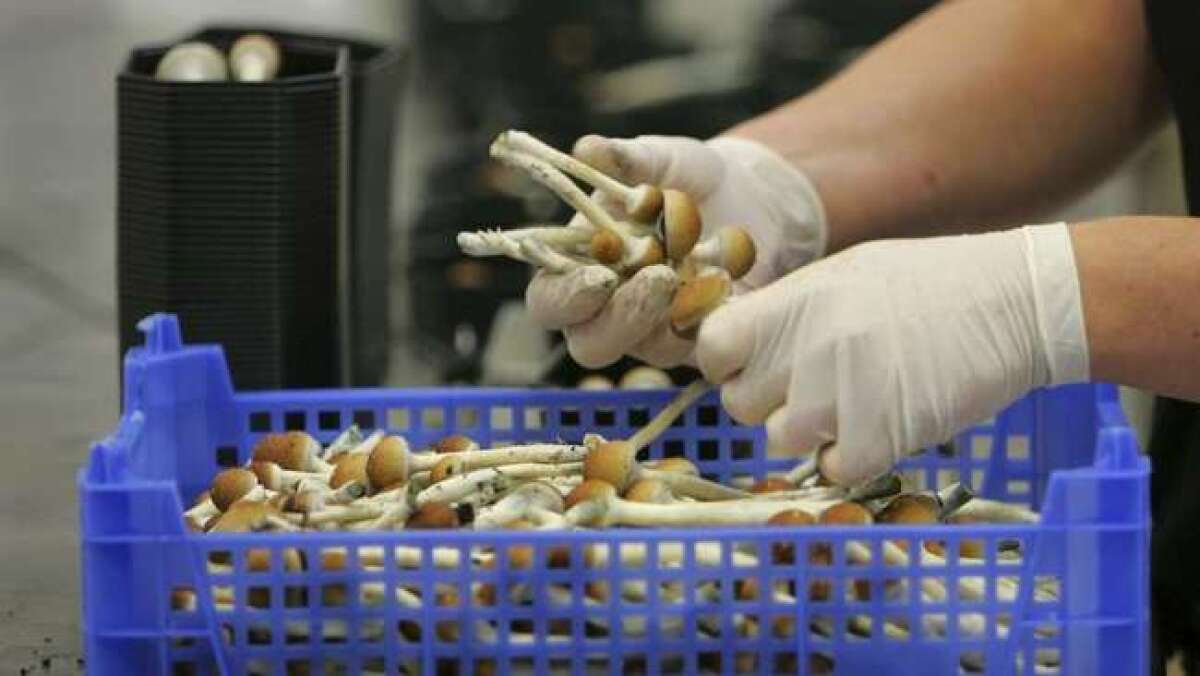
California voters could decide whether the state should decriminalize the use of hallucinogenic mushrooms by adults in 2018. A ballot measure was filed Friday with the state Attorney General’s office.
The measure would exempt adults 21 and older from penalties of possessing, selling, transporting, or cultivating psilocybins.
At least 365,880 valid signatures are needed to place the measure on the 2018 statewide ballot.
Kevin Saunders, a mayoral candidate in the town of Marina, near Monterey, is behind the push.
Saunders said using mushrooms helped him stop using heroin 15 years ago.
“I think we’re seeing something that could literally heal our brothers and sisters,” he said. “We’re talking about real cutting-edge stuff.”
Saunders said he hopes voters will be mature and have a serious, robust conversation about the use of mushrooms.
“It’s a natural progression from marijuana legalization,” he said. “I think that we are having an opportunity to lead the discussion.”
Californians voted to legalize recreational marijuana use in November through Proposition 64.
Psilocybin is considered a Schedule I drug by the California Controlled Substances Act and the U.S. Drug Enforcement Agency.
These drugs have no accepted medical use and a high potential for dependence and abuse, according to the DEA. Heroin, LSD, and marijuana are in the same category.
Two 2016 studies found a dosage of psilocybin helped ease anxiety and depression for some cancer patients.
Assembly GOP leader-elect Brian Dahle looks to end Democratic supermajority in 2018
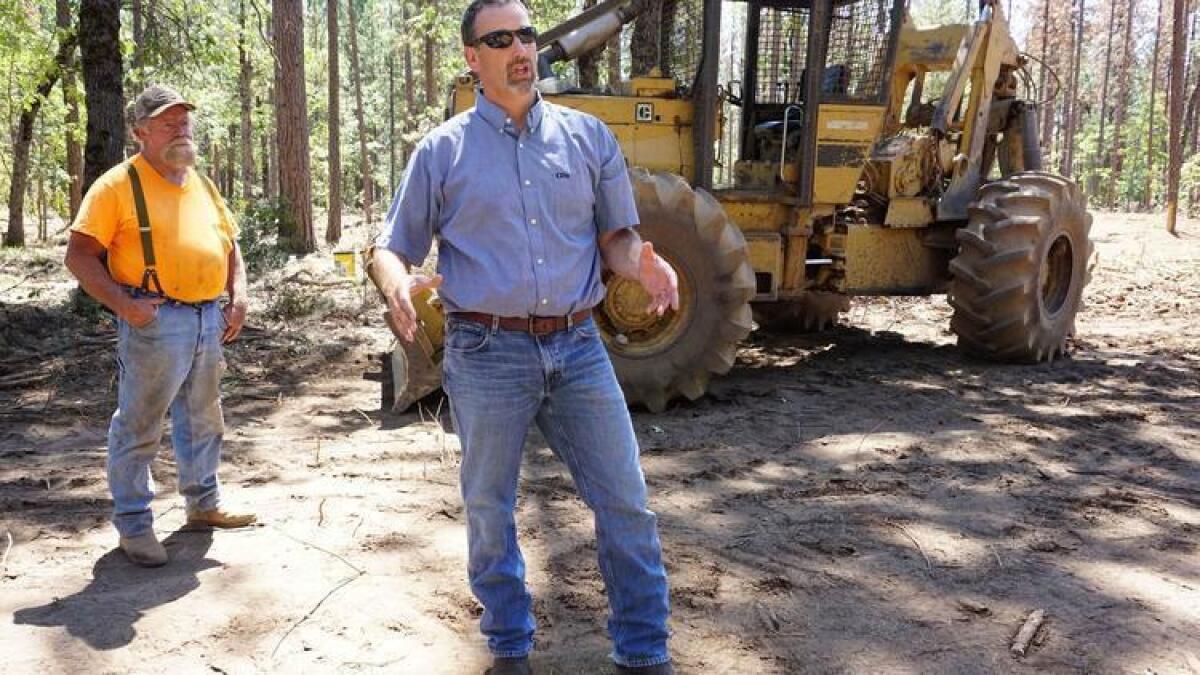
With the turmoil over the cap-and-trade debate behind him, newly elected Assembly Republican leader Brian Dahle said Friday he is looking ahead to the 2018 elections and his party’s efforts to end the Assembly’s Democratic supermajority.
The passage of controversial gas tax increases has already led to one recall campaign against a Democrat, and Dahle believes it will help Republican candidates running against Democratic incumbents who voted for the tax hikes.
“I know when I go to the gas pump it hurts,” Dahle said. “So I am assuming for everybody else who is going to the pump, it’s going to hurt. If we can communicate that story I think it will be to our advantage.”
Republicans will probably have to win two seats from Democrats to end the Assembly supermajority in 2018, a difficult challenge, but one Dahle said is a realistic goal. He noted that Republicans did it in 2014, when they won three seats back.
“It can happen,” he said. “I will be raising resources to help tell the story of my colleagues, to save our existing seats and expand our caucus.”
Dahle was elected minority leader by the Assembly Republican Caucus on Thursday to replace Chad Mayes, who drew the ire of many Republicans for voting to extend the state’s landmark climate change program, known as cap and trade, which requires polluters to buy carbon emission credits to pay for programs to mitigate climate change.
Gov. Jerry Brown asks Trump to keep DACA program for people illegally brought to country as children
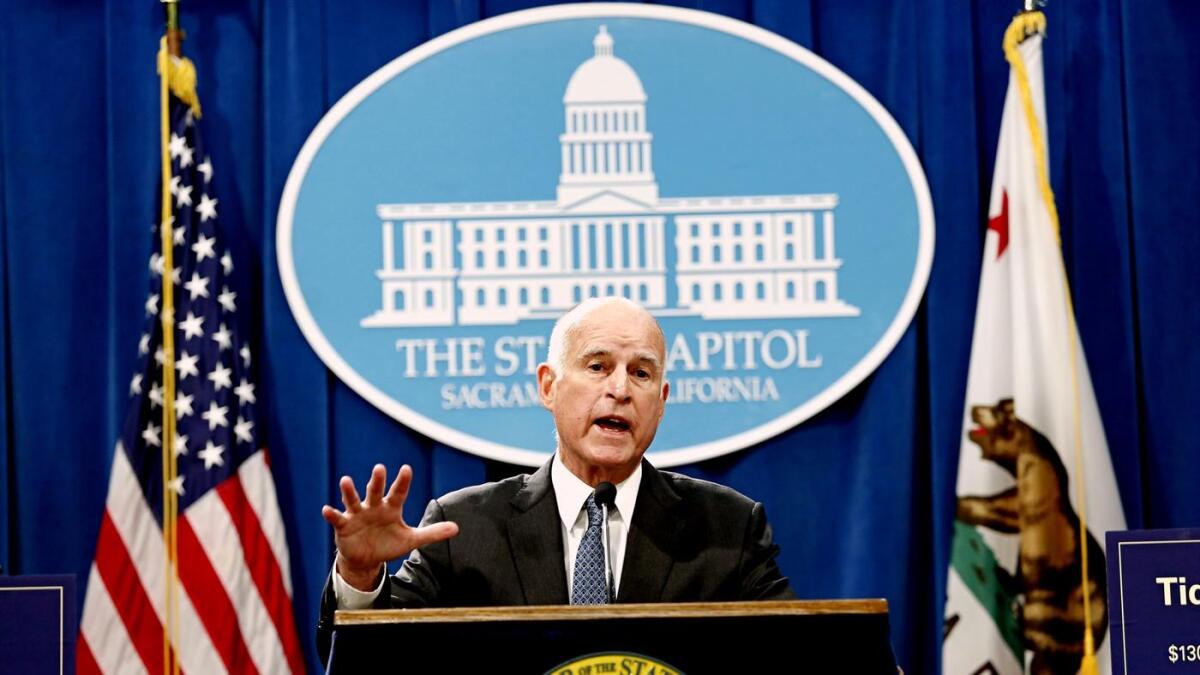
California Gov. Jerry Brown urged President Trump on Friday to keep a federal deportation protection program for people brought to the country illegally as children.
“To uproot these young people from the only country they have known as home is to turn our back on the future,” Brown wrote in the letter. “It is cruel and it runs counter to the ideals this country was founded on.”
Trump is considering whether to end the five year old Deferred Action for Childhood Arrivals program that has allowed some people brought to the country illegally to stay.
About a quarter of the more than 750,000 people in the DACA program live in California, a fact Brown noted in the letter.
Trump has sent mixed messages on whether he would continue the program since the Republican took office in January. But Republican attorneys general for Texas and nine other states have given the Trump administration an early September deadline to end the program or be sued.
Brown also urged the president to work with Congress to pass the DREAM Act, a bipartisan bill that would provide a path to citizenship for DACA recipients.
Facebook focuses on attempts to influence elections
Facebook security chief Alex Stamos says the social media network has massively expanded its team to target the threats of cyberwarfare that trickle down from countries like Russia and China.
But it is increasingly focused on the subtle ways in which attackers can manipulate digital propaganda and misinformation to affect the outcome of elections around the world — a new risk that requires little or no traditional expertise on information security.
“We talk about the U.S. and Russia a lot, but the truth is there is lots of places in the world where the same kind of activity is being seen on a smaller scale,” he said this week in San Francisco during the Enigma Interviews, a series of cybersecurity conversations hosted by the Advanced Computing Systems Association, or USENIX.
In emerging democracies where violence often erupts after elections, he said, the manipulation of media can contribute to a death toll.
Since the election of President Trump in November, Facebook, Google and Twitter have found themselves under fire from critics who say they helped peddle the fake news that some media experts believe influenced American voters. As a special prosecutor’s investigation continues into Russian involvement in the U.S. presidential election, U.S. intelligence experts have testified that the spread of false information, through social media trolls, was among the tools Russian President Vladimir Putin used to sway ballot box results.
Facebook since has published a white paper on its effort to spot fake accounts and aberrations in content, and devoted $1 million in funding for defensive research. It also is the founding sponsor of the Defending Digital Democracy Project.
The initiative, hosted at Harvard University’s Belfer Center, is led by former managers for the presidential campaigns of Democrat Hillary Clinton and Republican Mitt Romney, both targets of foreign hackers.
The bipartisan project aims to bring together political operatives and cyber and national security leaders to develop strategies, threat-response tactics and “practical playbooks” to improve the cybersecurity of campaigns and elections agencies.
“Our goal is for these groups to assist each other and share information directly to build greater resiliency into our elections,” Stamos said.
Assemblyman calls on Congress to reject proposals that would allow protesters to bring in weapons from other states
With potentially hundreds of activists from other states coming to California for rallies and protests, a state lawmaker called Friday on federal officials to reject proposals that would allow people with concealed weapon permits in other states to bring their weapons to the Golden State.
State Assemblyman Miguel Santiago (D-Los Angeles) introduced a resolution in the state Legislature in response to two measures in Congress that he said would allow out-of-state gun owners with concealed carry permits to bring their weapons into California and ignore this state’s tougher permit laws.
He said he was alarmed by news footage of the violence at the Unite the Right rally earlier this month in Charlottesville, Va., where white nationalists openly carried firearms, including assault rifles.
“I’m not willing to throw away the progress we have made on gun safety or put our communities at risk because some backward politician in D.C. thinks they know what’s better for California than we do,” Santiago said in a statement. “Californians expect that the gun control laws that they have supported and instituted in the name of public health and safety will hold -- regardless of who is carrying that gun or where he or she is from.”
The congressional measures will not be acted on before a pair of Bay Area rallies this weekend which authorities fear could be marred by violence between white nationalists and counter-protesters.
The National Park Service permit for that rally prohibits those in attendance from possessing guns, explosives and “weapons of any kind.”
Santiago’s resolution, which may be voted on next week, was supported Friday by Wendy Wheatcroft, a leader of the California chapter of Moms Demand Action for Gun Sense in America who said the National Rifle Assn. was behind the proposals.
“Rather than create a national standard for who can carry guns in public across our country, the NRA’s longtime top policy priority would override each state’s standards, and force states like California to accept the concealed carry permitting standards of every other state, no matter how weak, or even nonexistent, another state’s standards may be,” Wheatcroft said.
Gov. Jerry Brown postpones negotiations over legislation to overhaul the bail system in California
Gov. Jerry Brown on Friday stalled an ambitious bill that sought to overhaul how courts award criminal defendants bail while their cases are pending, saying he and the authors of the legislation will continue negotiations through the fall and revisit the issue early next year.
“I believe that inequities exist in California’s bail system, and I look forward to working this fall on ways to reform the system in a cost-effective and fair manner, considering public safety as well as the rights of the accused,” Brown said in a statement.
The announcement came after days of rallies and heavy lobbying efforts by supporters of the bill, including a free concert by music artist and activist Common in Sacramento. Behind the scenes, bail agencies and lobbyists for prosecutors and law enforcement associations were raising concerns about its cost and the strain on resources it could place on its agencies.
Assemblyman Rob Bonta (D-Oakland) and state Sen. Bob Hertzberg (D-Van Nuys) combined forces in December to unveil the California Bail Reform Act of 2017, as calls for action and legal challenges have spurred momentum for bail reform nationwide. The pair of identical bills would eliminate the use of bail fee systems and require counties to establish their own pretrial services agencies.
But Bonta’s proposal hit a hurdle in the Assembly in June over concerns about its costs and implementation.
In his announcement Friday, Brown said he would be working on the legislation with Bonta, Hertzberg and Chief Justice Tani Cantil-Sakauye, who last year appointed the Pretrial Detention Reform Work Group to study the issue.
“I look forward to sharing these recommendations with the Governor and Legislature as we work together to improve our bail system,” Cantil-Sakauye said in a statement.
Hertzberg and Bonta said they welcomed working further on the issue, saying the additional time will give them an opportunity to study the bail markets and work with members from all three branches of government.
Hertzberg said bail reform is “imminent” and that he is considering holding legislative hearings and filing legislation to regulate the bail insurance agencies in the coming weeks.
Criminal justice reform advocates and civil rights lawyers applauded the governor’s commitment to the issue. Opponents lauded his move to continue the negotiations through the fall.
Groups on all sides of the debate — including bail agents, police and prosecutors and criminal justice reform advocates — have all expressed concerns over the disparities in the state’s current bail system. But while Senate Bill 10 opponents say they will continue to lead the charge to preserve surety bail, its supporters want to eliminate or limit its use as much as possible.
“For years, California’s bail system has failed to achieve its intended purpose of promoting public safety and court appearance, instead leading to the unjust detention of countless Californians who simply could not afford to buy their freedom,” Zachary Norris, executive director for the Ella Baker Center for Human Rights, said in a statement.
2:24 p.m.: This article was updated to include additional comments from Hertzberg and opponents and supporters of the legislation.
11:31 a.m.: This article was updated to include a statement from Hertzberg.
This article was originally published at 11:13 a.m.
DNC leaders congratulate the new head of the California Democratic Party, and take a swipe at his rival
Storm over cap-and-trade vote results in Chad Mayes’ ceding Assembly Republican leader post to Brian Dahle
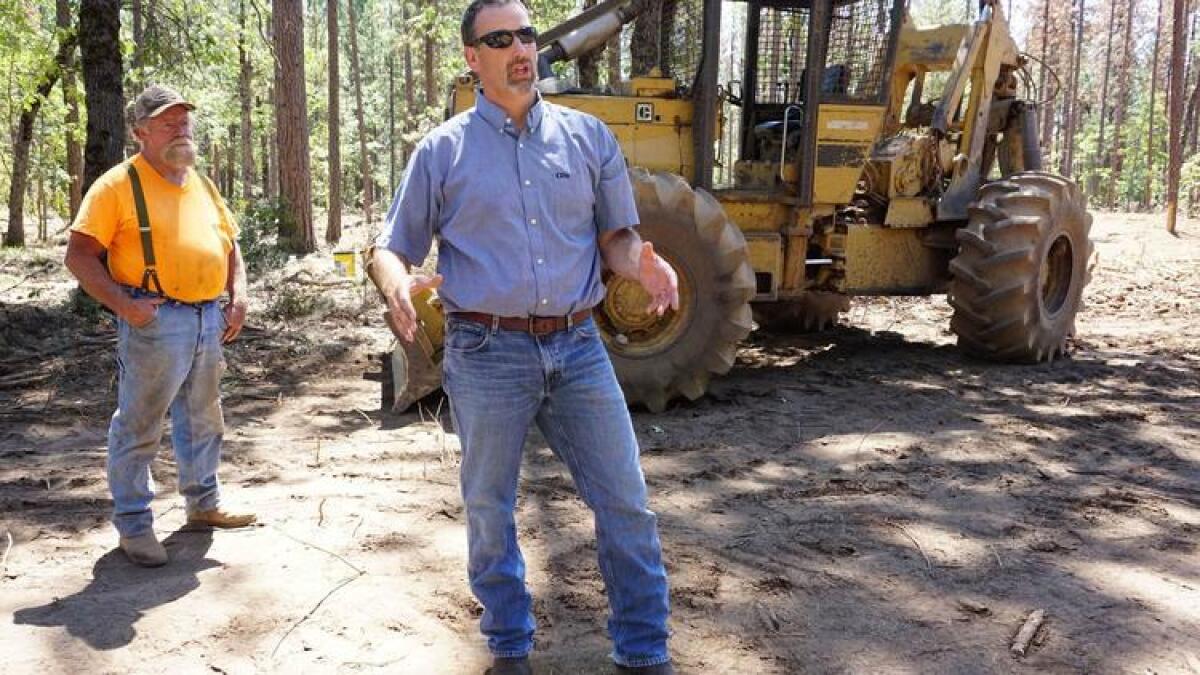
Six weeks after helping Democrats revamp California’s landmark climate change policy and facing a torrent of anger from conservative critics, the Republican leader of the state Assembly agreed Thursday to step down and allow a rural Northern California lawmaker to lead the GOP’s fractured caucus.
The shuffle, which saw Chad Mayes replaced by Assemblyman Brian Dahle (R-Bieber) as leader, comes as the California Republican Party’s numbers continue to shrink among registered voters and in elected office. Republicans make up just over a quarter of the state’s total voters, while Democrats in the last election won supermajorities in both houses of the Legislature.
At GOP Rep. Tom McClintock’s remote town hall, Trump is never far
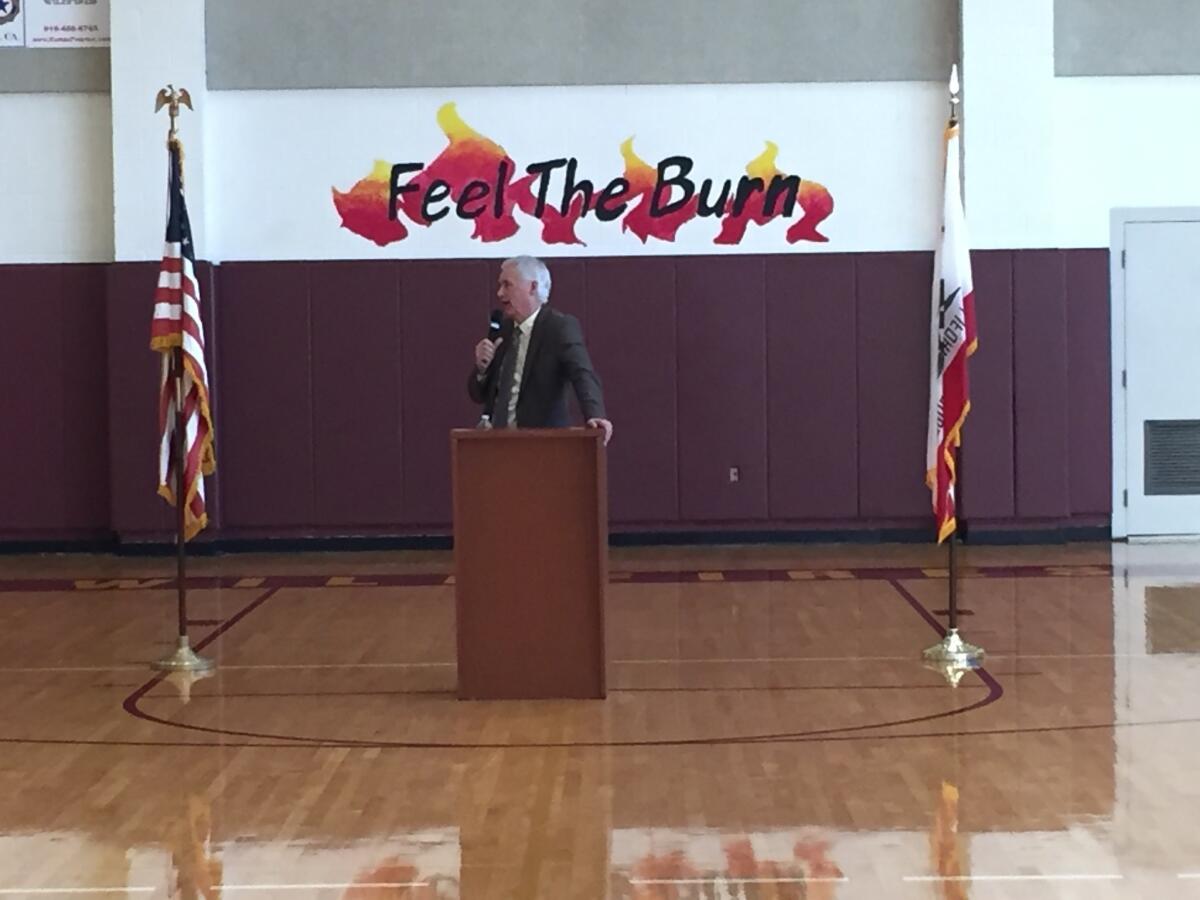
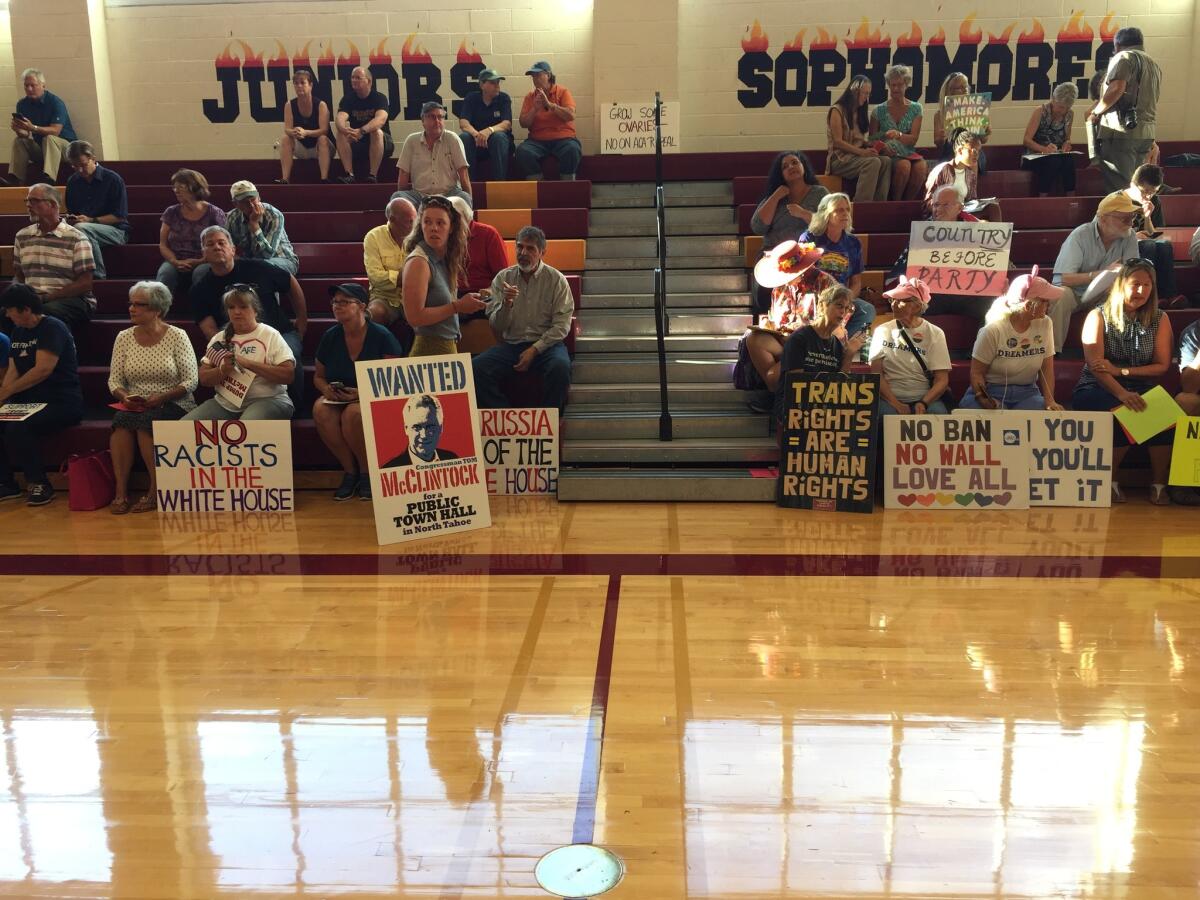
Rep. Tom McClintock (R-Elk Grove), who has faced rowdy protesters and sharp barbs at town halls this year, received a kinder if not exactly warm response in a remote town in the Sierra foothills Thursday evening.
Most of the hostility from the crowd inside the Foresthill High School gym focused on McClintock’s support for President Trump.
The congressman faced multiple questions on Trump’s controversial comments about the deadly white supremacist rally in Charlottesville, Va., on Aug. 12, prompting McClintock to disavow the hate groups and defend the president.
“There’s no such thing as a fine person who marches with the Ku Klux Klan or the Nazis,” McClintock said, a clear repudiation of Trump’s assertion that there were “very fine people on both sides.”
McClintock received a round of applause, but that quickly turned to boos when he added: “And the president made that pretty clear.”
A five-term House member who represents the 4th Congressional District, McClintock has earned a reputation as an anti-tax conservative who is a strong supporter of gun rights and Trump’s effort to build a massive wall along the U.S.-Mexico border.
Unlike many Republican House members from California, McClintock hasn’t shied away from holding town halls.
The hundreds sitting in the gym bleachers in tiny Foresthill included members of the liberal activist group Indivisible of Auburn, as well as conservative tea party activists and advocates for cleaving California’s northern section into a new state.
“I’ve always been a big supporter of Tom,” said Leah Cavanaugh, 75, a retired schoolteacher and tea party member from Foresthill. “People have been so rude to him at his other town halls. That’s not right.”
At a raucous town hall in Roseville in February, police escorted McClintock out of a packed theater as participants grew testy amid a debate about the future of the Affordable Care Act, with hundreds of protesters chanting, “Vote him out.”
On Thursday night, McClintock also took criticism for supporting the president amid an inquiry into whether his presidential campaign colluded with Russia to meddle in the 2016 election, a matter being investigated by Department of Justice special counsel Robert S. Mueller III.
“This has been used as one of the excuses for Hillary Clinton’s defeat,” McClintock responded, triggering a round of catcalls. The congressman defended the president, saying there’s no evidence of wrongdoing so far.
Still, he reminded the crowd that he supported appointing a special prosecutor to investigate Russian meddling after Trump fired former FBI Director James B. Comey, and said evidence could persuade him to consider whether congressional action against Trump is warranted.
While one man at the town hall encouraged McClintock to push to punish “sanctuary cities” such as Los Angeles and San Francisco that refuse to cooperate with federal immigration authorities, another asked McClintock for immigration help.
Tomas Evangelista, 27, of Auburn, who said he was 2 years old when his mother brought him into the county illegally, asked McClintock to support legislation to protect “Dreamers,” people brought into the county illegally as children who can currently seek deportation protection under the Deferred Action for Childhood Arrivals program.
Two of McClintock’s California GOP colleagues on Thursday urged Trump, who hasn’t made a decision on the future of the program, to preserve it.
But McClintock said, “Not now ... not until the border is secure. Not until the border wall is completed.”
McClintock’s district stretches from Lake Tahoe down to Yosemite along the spine of the Sierra and includes the towns of Roseville, Auburn and mountain towns east of Fresno.
McClintock, in response to several questions about land use, reminded the crowd that he’s been a longtime supporter of increasing access to federal lands for recreation and timber harvesting, and believes that restrictive national forestry policy has increased the danger of deadly wildfires in the region.
McClintock’s district is considered to be mostly Republican, but he’s being challenged in 2018 by a handful of Democrats including Regina Bateson, a former U.S. State Department foreign service officer and assistant professor of political science at Massachusetts Institute of Technology.
After the town hall, Bateson, who recently moved back to her hometown of Roseville, stood outside the gym doors hanging campaign fliers.
FOR THE RECORD
8:33 a.m.: A previous version of this story incorrectly reported that Elk Grove, where the congressman lives, is included in his congressional district. Elk Grove is not part of McClintock’s 4th Congressional District.
Rep. Nanette Barragán got a friendly crowd at her Los Angeles town hall
FOR THE RECORD
The headline on this post misspelled the first name of Rep. Nanette Barragán.
A lawsuit claims California absentee ballots were wrongly rejected because of ‘penmanship’ problems
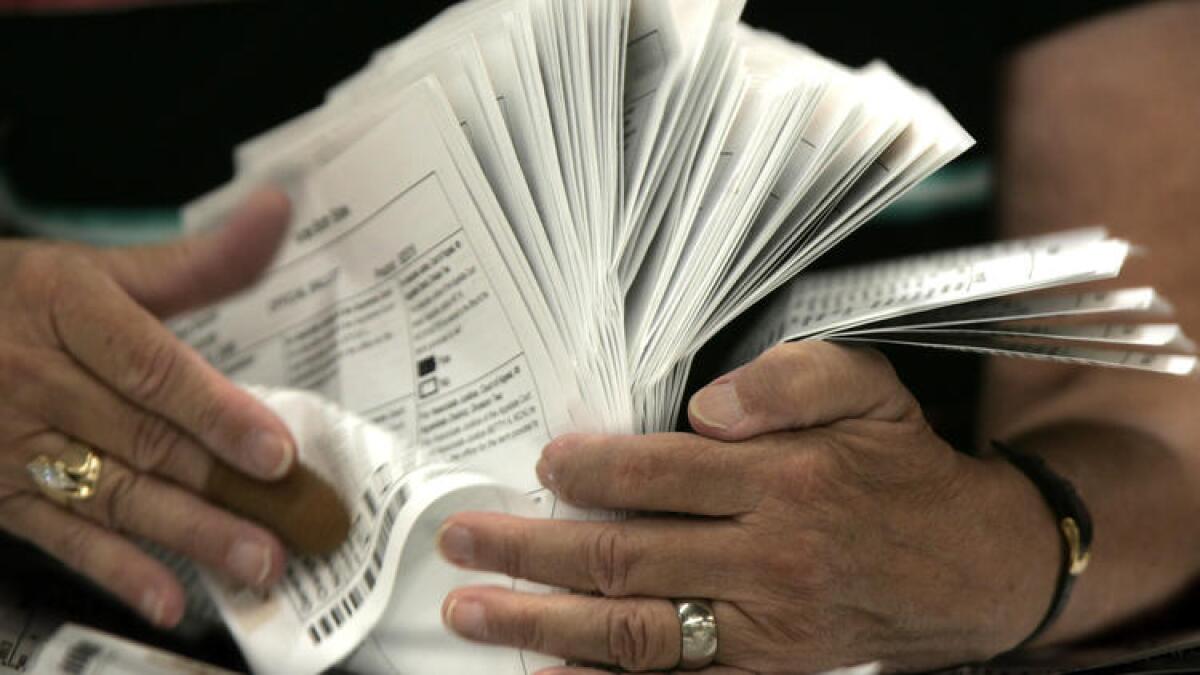
A lawsuit filed in a California appeals court on Thursday alleges the ballots of as many as 45,000 voters weren’t counted in November because of the state’s flawed rules for verifying the signatures of those who vote by mail.
The lawsuit was filed by the American Civil Liberties Union of Northern California on behalf of a Sonoma County voter who said his ballot wasn’t counted after his signature on the ballot envelope was deemed to not match the one that elections officials had on file.
“People should not be denied their right to vote because a government official doesn’t like their penmanship, but that’s exactly what is happening in California,” said Michael Risher, an ACLU staff attorney, in a written statement.
The legal action comes as a number of counties have been given permission under a new state law to close neighborhood polling places in 2018 and instead send all voters a ballot in the mail.
State election law requires county officials to reject a ballot if the signatures aren’t believed to be a match. But, the lawsuit said, existing law “does not prescribe how elections officials should make this determination or require officials to have training in handwriting identification or comparison.”
A spokesman for Secretary of State Alex Padilla said that 99.3% of absentee ballots in the state were accepted and counted in the November 2016 election. Padilla has sponsored legislation pending in Sacramento to help voters who forget to sign the ballot envelope.
But that change wouldn’t solve the allegations contained in the lawsuit, given that existing law forbids the counting of a ballot if an elections official thinks the signatures “do not compare.”
The lawsuit says that the plaintiff, Peter La Follette, would have worked to resolve the signature mismatch had he been notified by Sonoma County elections officials before the final vote tally was certified.
In October, a Florida judge ordered changes to that state’s rules regarding signature checking on absentee ballots.
California lawmakers ask Gov. Jerry Brown to bar the marketing of pot edibles to minors

Just months before shops can begin selling marijuana for recreational use, state lawmakers on Thursday sent the governor a bill aimed at preventing the drug from being marketed to minors.
The measure approved by the state Senate prohibits packaging and labeling of marijuana products that show “pot edibles” such as cookies and candy bars. The bill by Sen. Jim Nielsen (R-Chico) also bars packaging that mimics the name or packaging of non-marijuana candies, snacks and drinks.
“Studies have shown the dangers that accidental marijuana ingestion poses to young children,” Nielsen said in a statement. “This measure will prevent marijuana from being packaged to attract children.”
The state will begin issuing licenses to grow and sell marijuana for recreational use on Jan. 2, a change approved last November by California voters.
The bill was supported by law enforcement officials, including Placer County Sheriff Devon Bell.
“This law will reduce any ambiguity in current child safety measures in relation to marijuana,” Bell said.
UC’s new payroll system will cost at least $200 million more than expected
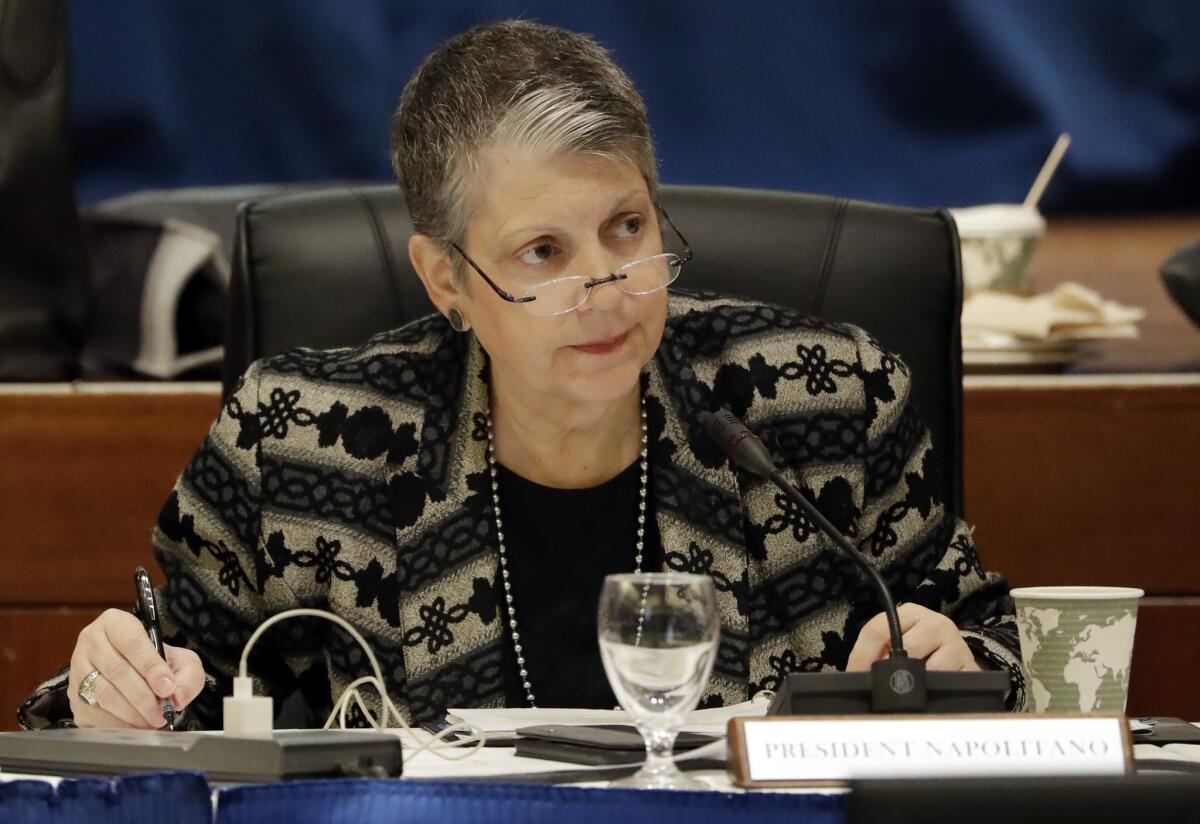
The University of California president’s office has failed to keep a proposed new payroll system on budget and on schedule, and original estimates of its cost savings are unlikely to be realized, a state audit concluded Thursday.
The Office of the President originally estimated in 2011 that the UCPath payroll system would be implemented by 2014, cost $306 million and save the university $753 million, mostly from staff reductions.
But current estimates put the cost at $504 million and it won’t be done until 2019. University officials now estimate it will cost hundreds of millions of dollars more to operate, so the projected savings won’t happen, California State Auditor Elaine Howle wrote to Gov. Jerry Brown on Thursday.
UC President Janet Napolitano said the complex project began before she became head of the system but has improved over time.
The audit made recommendations to improve the cost of the project, and Napolitano responded that “the recommendations are helpful and constructive, and align with our proactive efforts to continually improve UC’s operations, policies and transparency to the Legislature and the public at large.”
Thursday’s audit is the third this year that has been critical of Napolitano’s office. One audit accused the president’s office of failing to properly report the existence of tens of millions of dollars in uncommitted funds and of approving excessive salaries and perks for university managers.
As she did in that stinging audit earlier this year, Howle on Thursday accused the president’s office of leaving the UC Board of Regents in the dark on the problems.
In 2014, the payroll project’s director told the regents that the estimate for the project was $220 million, but internal records from a month earlier showed the project would cost $345 million, the audit found.
Another effort by Democrats to revamp California’s recall elections is signed by Gov. Jerry Brown
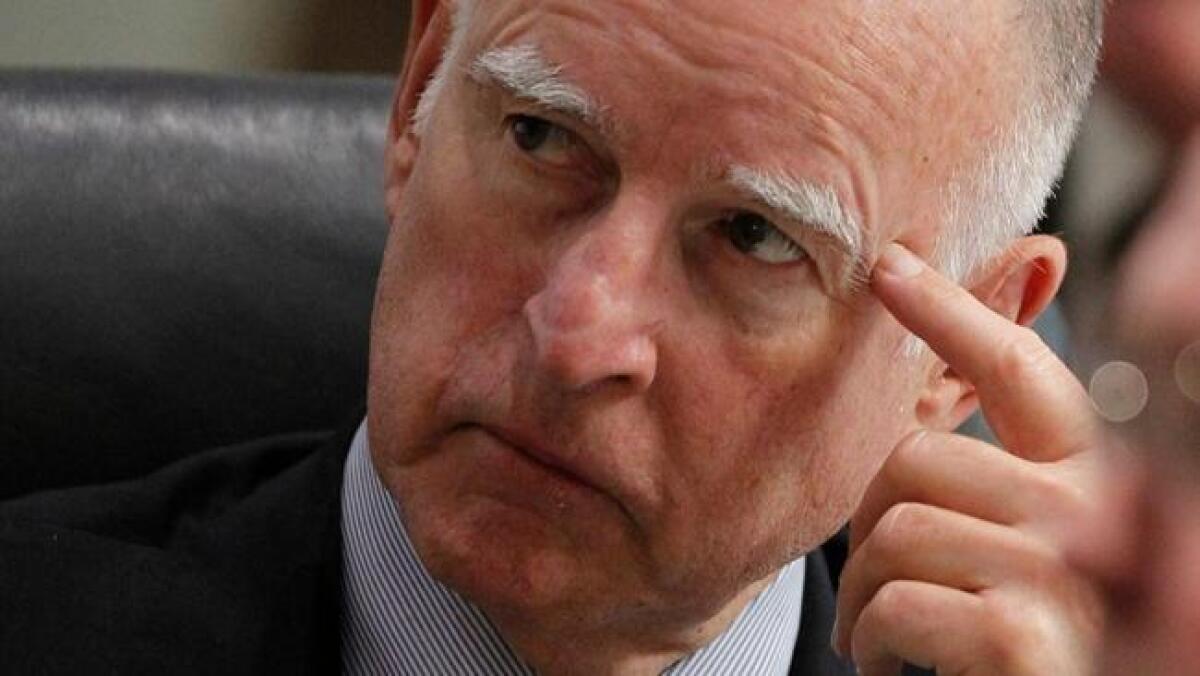
Gov. Jerry Brown on Thursday signed a second version of new rules governing California recall elections, one passed hours earlier by Democrats seeking to stop the removal of an Orange County state senator.
The bill, introduced in the Legislature just three days ago, would impose new waiting periods before a special recall election is held. Democrats insist the change is needed so voters who sign a recall petition have time to remove their names from the list if they change their minds.
But the law would also apply to the current effort at a recall election for state Sen. Josh Newman (D-Fullerton), whom Republicans hope to remove from office after his springtime vote for a $52-billion transportation plan. That law will raise gas taxes and vehicle fees. The additional time for signature tallies and fiscal analysis of election costs would likely delay any special election in the Newman effort until 2018.
“I’m real frustrated by the gamesmanship,” said state Sen. John Moorlach (R-Costa Mesa) during Thursday’s Senate debate on the bill. On the verification of election costs, Moorlach said, “Some of this stuff could be done in three hours.”
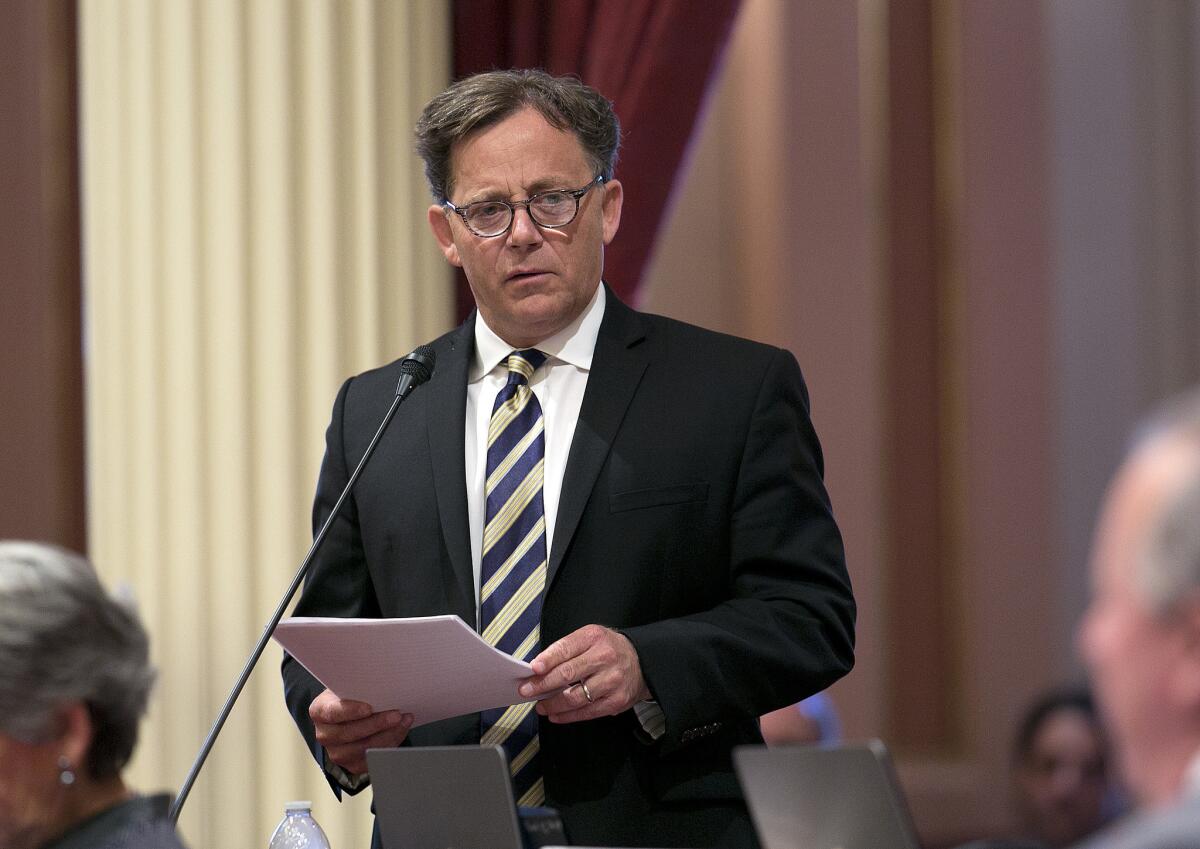
Democrats repeated their criticism of the GOP-funded effort to gather signatures in Newman’s district, claiming voters were told they were signing petitions to repeal the new gas taxes.
“Let’s protect that democratic right of the person who learns they’ve been deceived,” said state Sen. Bill Monning (D-Carmel).
Brown signed the first effort to change the recall election rules in June, but that legislation was initially blocked by a state appeals court. Opponents of Newman have already turned in more than enough signatures to force a recall election. Absent the law signed by the governor on Thursday, that election could have been held as soon as the end of October.
California Republicans are urging Trump to support DACA
Reps. Jeff Denham and David Valadao joined four other Republicans Thursday to urge President Trump to leave in place deportation protections for some people who were brought to the country illegally as children.
Trump’s mixed messages on whether he would continue the 5-year-old Deferred Action for Childhood Arrivals program has been a source of consternation since the Republican took office in January.
California is home to an estimated one-third of the 750,000 people who were granted work permits under the program. Republican attorneys general for Texas and nine other states have given the Trump administration an early September deadline to end the program or be sued.
In a letter to Trump, the representatives encouraged the president to focus on deporting criminals and to allow the program to continue until Congress can find a permanent legislative solution for the people who qualify for the program.
Denham of Turlock and Valadao of Hanford each represent agricultural districts in the Central Valley with large Latino populations, and each face potentially tough battles with Democrats in 2018.
“We have violent criminals preying on our communities, and our resources should be going toward their deportation instead of being directed toward the young men and women protected through DACA, who are working toward a better future,” Denham said in a statement.
Assembly Speaker Anthony Rendon, who shelved single-payer measure, announces hearings to study universal coverage
Nearly two months after shelving a single-payer healthcare measure earlier this summer — stirring activists’ rage and a fledgling recall effort against him — Assembly Speaker Anthony Rendon (D-Paramount) announced plans Thursday to hold hearings to discuss universal healthcare in California.
The hearings, which will be held during the legislative interim that begins after Sept. 15, mark an attempt to redirect the energy around healthcare overhaul from a single bill, SB 562, to a broader conversation about ways to expand healthcare coverage in the state.
“A lot of the vocabulary, a lot of the nomenclature, is confusing to a lot of people,” Rendon told reporters Thursday. “There’s a lot of different variants, a lot of different models of single payer, for example.”
The hearings will be chaired by Democratic Assembly members Jim Wood of Healdsburg and Joaquin Arambula of Fresno.
Rendon did not explicitly say whether the hearings are meant to result in a bill that could establish universal healthcare in the state.
“This is an attempt to have an honest discussion,” he said. “I don’t think we’ve had at all anything close to approaching an honest discussion about single payer, however we define that, about SB 562.”
Rendon has been harshly critical of the measure, by state Sens. Ricardo Lara (D-Bell Gardens) and Toni Atkins (D-San Diego), which passed the Senate in June but did not spell out how to pay for such a sweeping change to the healthcare system, in which the state would cover the medical expenses of all residents.
But by blocking the measure once it reached the Assembly, Rendon unleashed a wave of pushback from single-payer supporters, including the California Nurses Assn., the bill’s sponsor. With rallies at the Capitol and an incipient effort to recall the Assembly speaker, SB 562 supporters have continued to press for the bill to advance in the current legislative year.
The nurses union made clear Thursday they were not satisfied with Rendon’s call for hearings, instead urging the speaker to let their bill move forward.
“Nurses have serious concerns that the decision to avoid an actual single payer bill with a select committee is an effort to promote insurance industry alternatives to single payer that will do little to address the substantial shortfall that exists for patients in the present system,” said Bonnie Castillo, the group’s associate executive director.
Rendon said his embrace of hearings on universal coverage shouldn’t be seen as yielding to his detractors.
“A lot of the people who have been critical of me — they want single payer and single payer only,” Rendon said. “I don’t think I’m necessarily covering my ... as much as I’m trying to be thoughtful about this.”
Lara, in a statement, said he was “glad the Assembly is joining the conversation about universal healthcare that started in the Senate this year” with his bill.
“The conversations I have had with my friend Speaker Anthony Rendon show he is committed to healthcare for all, and the Select Committee is a tangible product of that commitment,” Lara said. “Having more legislators involved in hearing the healthcare stories of Californians will move this important debate forward. We also need to hear the direct experience of other nations including Japan, Australia, Canada and Germany with universal healthcare.”
UPDATE 2:41 p.m.: This post was updated to include reaction from the California Nurses Assn.
This post was originally published at 11:45 a.m.
California might formally support censure of Trump over Charlottesville comments
California could become the first state to support a censure of President Trump for his response to violence at a protest over a Confederate statue in Charlottesville, Va.
Assemblyman Tony Thurmond, a Richmond Democrat, introduced a measure that would support efforts by some in Congress to formally disapprove of the president’s response and urge other state legislatures to support it.
Thurmond said Trump’s response “failed California” and wants the president to apologize for what he says was racist and bigoted behavior.
Days after the Aug. 12 rally and the death of counter-protester Heather Heyer, Trump said there was blame on “many sides” for the violence that culminated when a “Unite the Right” rallier ran over counter-protesters with a car.
Trump later denounced the Ku Klux Klan and neo-Nazis, but maintained that “both sides” were to blame.
Equivocating neo-Nazis and white supremacists who attended the rally with counter-protesters does not represent California or the moral leadership citizens want from Trump, Thurmond said.
“In legitimizing groups like the KKK and neo-Nazis whose only association is with terror, hate, and death, the President has emboldened those who seek to divide us and inject fear into our communities,” Thurmond said in a statement.
U.S. House Minority Leader Nancy Pelosi, a San Francisco Democrat, introduced a resolution for a congressional censure Friday.
A congressional censure does not remove a president from office, and they are rare. The last president to be censured was Andrew Jackson in 1834.
Brian Dahle will replace Chad Mayes as Assembly Republican leader
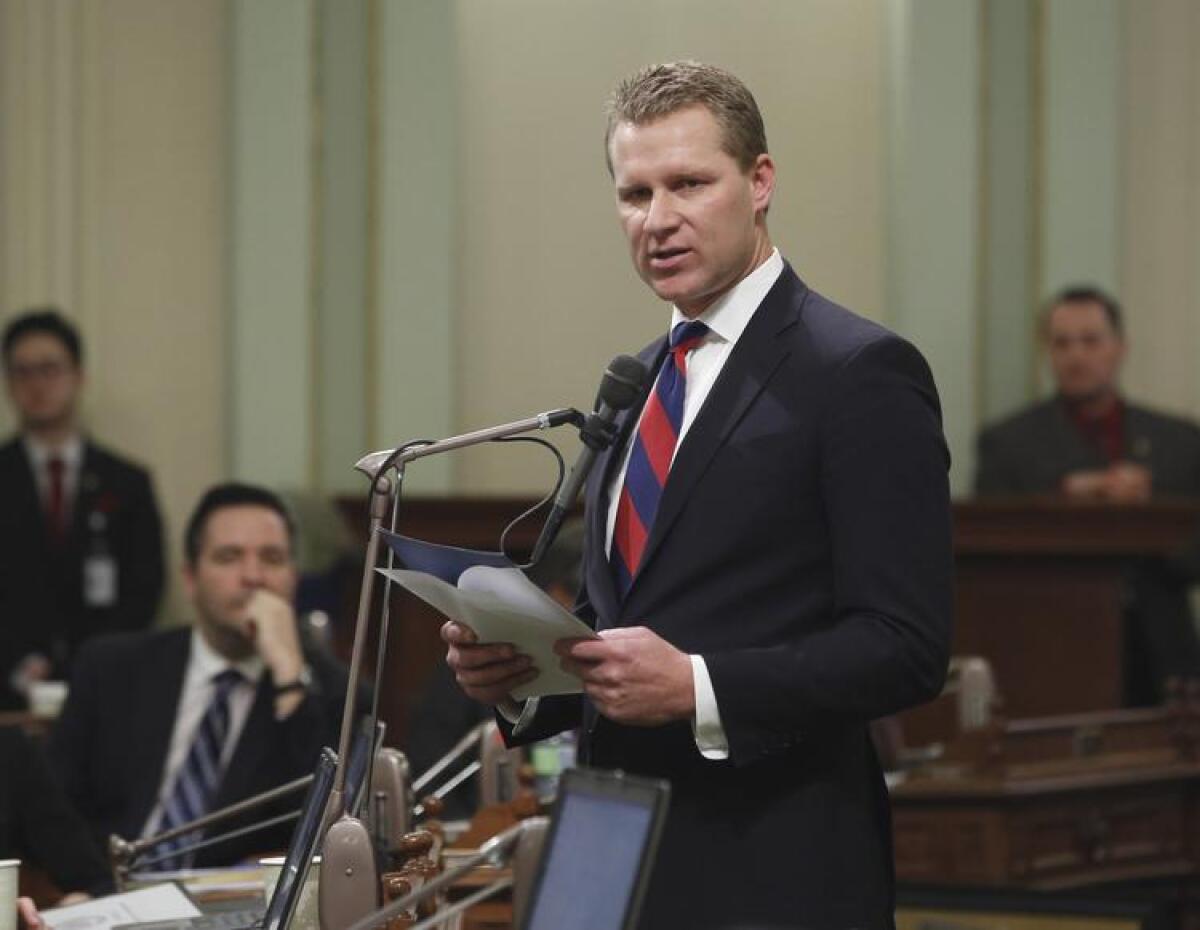
Assembly Republicans announced new leadership on Thursday morning after weeks of tumult stemming from support from some caucus members for California’s climate change policies.
Assembyman Chad Mayes of Yucca Valley told lawmakers during a floor session that he will step down as caucus leader and that Assemblyman Brian Dahle of Bieber will succeed him before the end of the legislative session next month.
Mayes has been trying to fend off challenges to his leadership after he supported extending the state’s cap-and-trade program. He survived a vote on Monday, and another vote had been set for next Tuesday.
However, Republicans caucused Thursday morning before the announcement.
“You’re going to see a transition . . . to another leader who a lot of people respect,” said Assemblyman Rocky Chavez of Oceanside.
Dahle is one of four members of the caucus who have sought to replace Mayes at various points after July’s cap-and-trade vote.
UPDATES
10 a.m. This article was updated with information about the Republicans’ Thursday meeting.
9:42 a.m. This article was updated to reflect comments made on the Assembly floor.
9:15 a.m.: This article was updated with additional details about Assemblyman Chad Mayes.
This article was originally published at 8:51 a.m.
Democrats beat Republicans in legislative soccer match in Sacramento

Democratic lawmakers defeated their Republican colleagues, 3-1, in the first Capitol Cup soccer match Wednesday night in Sacramento.
Proceeds from the hourlong game went to Saint John’s Program for Real Change. The nonprofit provides mothers housing, job training and other services to help them escape poverty, homelessness or abuse.
The game raised more than $35,000 for the nonprofit, said Greg Hayes, a lobbyist who helped organize the event.
Assemblyman Miguel Santiago (D-Los Angeles) said the match helped lawmakers build relationships and morale that would carry through to the end of the legislative session.
“It’s no secret that legislation is tough to do, but I think this helps us to set up good relationships and work on good things that are good for California,” he said.
No one scored in the first half, but the game kicked up in the second half when Assemblyman Rob Bonta (D-Oakland) scored the first goal. Assemblyman Jordan Cunningham (R-San Luis Obispo) answered minutes later with a goal.
Rep. Ian Calderon (D-Whittier) scored the second goal with an assist from Sen. Henry Stern (D-Canoga Park).
Bonta scored the team’s third goal minutes before the game ended.
Field of lawmakers seeking to unseat Chad Mayes as Assembly Republican leader gets crowded
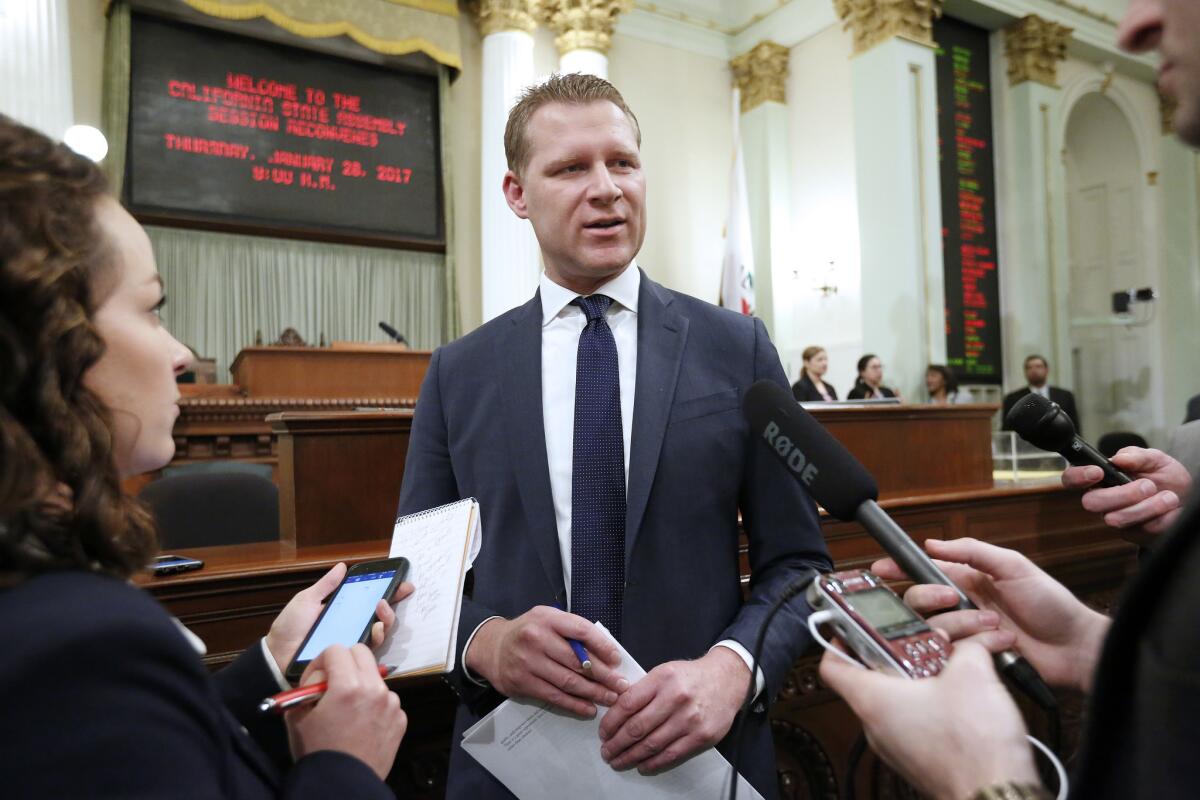
The number of candidates vying to unseat Chad Mayes of Yucca Valley as Assembly Republican leader doubled to four on Wednesday.
Assemblymen Brian Dahle of Bieber, in Lassen County, and Vince Fong of Bakersfield said they will contend along with previously announced competitors Melissa Melendez of Lake Elsinore and Jay Obernolte of Big Bear Lake.
The 25-member Assembly Republican Caucus has scheduled a vote for Tuesday in which one of the challengers will have to win a majority 13 votes to become the new leader.
Mayes has been under fire from other Republicans for voting last month with the Democrats on an extension of the state’s cap-and-trade program to combat climate change, which requires companies to buy permits to pollute. State party officials have called for Mayes to step down, but he has refused.
At a meeting Monday, only 10 caucus members voted to remove Mayes as leader, and he said afterward he has the votes to hold on to the post. He defended his vote on cap and trade, saying his party needs to adapt to reverse a decline in its power in Sacramento.
Proposed Clippers arena could get perks from California lawmakers

Supporters of a plan to build a new area in Inglewood for the Los Angeles Clippers are hoping for a last-minute deal in the state Legislature to make the project easier to build.
The backers want California to ease regulations under its premier law governing development for the project, according to a preliminary draft of the proposal obtained by the Los Angeles Times.
The Clippers say the proposed legislation would be similar to measures passed in recent years to benefit a variety of stadium and arena plans. No bill has been formally introduced.
Immigrant rights advocates urge Gov. Jerry Brown not to change ‘sanctuary state’ legislation
Immigrant rights advocates on Wednesday urged Gov. Jerry Brown not to change state legislation that would expand laws to keep local and state law enforcement agencies from arresting, questioning and holding immigrants for federal agents.
As part of lobbying efforts on immigration and bail reform legislation, eight members with PICO California, a faith-based policy advocacy organization, said they met with Brown to discuss the need for so-called “sanctuary state” legislation.
Senate Bill 54, which was introduced by Senate leader Kevin de León (D-Los Angeles), is the centerpiece proposal in a legislative package filed by Democrats to protect immigrants under Trump’s expanded deportation orders. It would prohibit police and sheriff agencies from using resources to enforce federal immigration laws.
But it has raised loud opposition from Republican lawmakers and many sheriffs, who say they have been in discussions with Brown in hopes of amending the bill.
Some organizers said they left the meeting with Brown “cautiously optimistic” that the governor would take the lead on immigration as he has done with climate change and criminal justice policy.
“We told the governor that the whole country is looking to California, to his leadership,” said Joseph Tomás McKellar, co-director of PICO California. “We are in a new unprecedented moment in attacks on our communities, and it requires a new boldness, a new courage on [his] part.’”
In an interview on NBC’s “Meet the Press” earlier this month, Brown expressed reservations about signing the bill. He said it needed further changes, but has declined to comment on how he’d like to see the legislation amended.
Immigrant rights advocates gathered in the Capitol basement Wednesday at a rally dubbed the “People’s Hearing,” where they expressed their concerns that Brown would bend too far to the address complaints from sheriff and police department officials opposed to the bill.
Several said the proposed amendments to the sanctuary state bill align too closely with state laws already in place that they believe don’t do enough to protect immigrants in the current national climate. The changes would eliminate most of the provisions limiting communication and the transfer of immigrant detainees between local and federal law enforcement agencies.
The Rev. Brendan Bussee, an associate pastor at Dolores Mission Catholic Church in Los Angeles and a PICO member who met with Brown, said the governor could be moving in the wrong direction as trust between communities and law enforcement continues to decline under the Trump administration.
“I am living with a community that is feeling much more fear and insecurity than ever before,” he said.
An Ed Royce challenger puts out ad slamming the congressman’s healthcare votes
Felons in California prisons would be able to vote under proposed ballot initiative
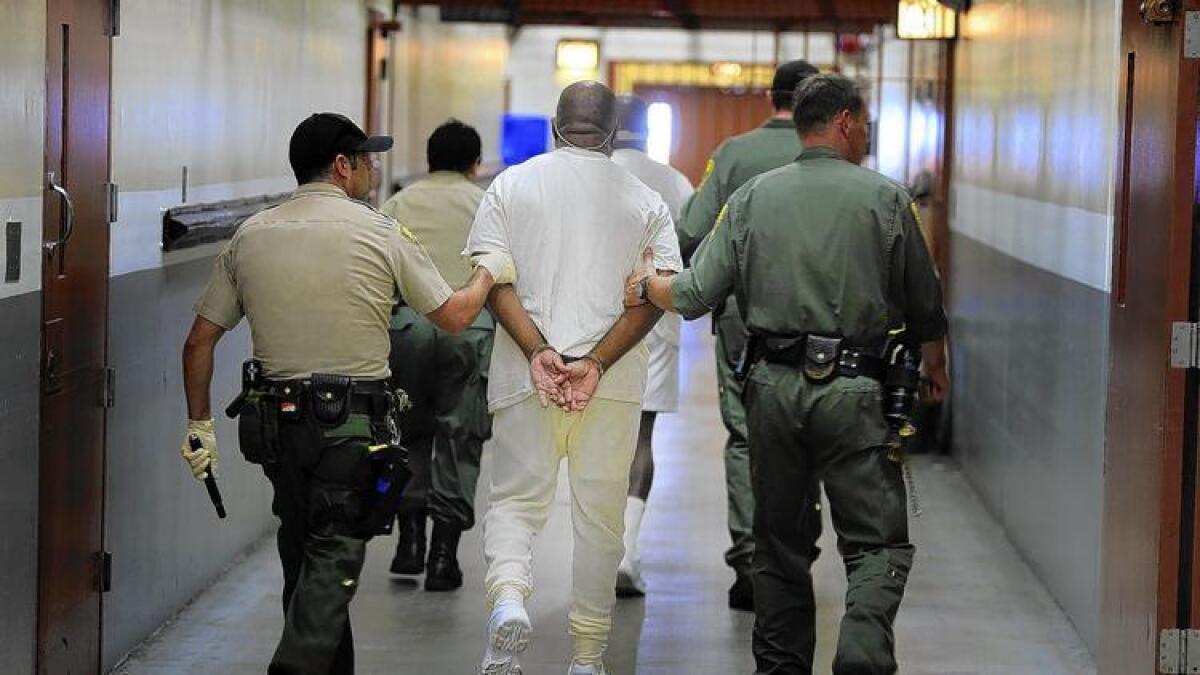
Felons in state prison would be allowed to vote in California elections under a ballot measure proposed Wednesday by a group representing prisoners, their families and supporters.
The constitutional amendment was filed on Wednesday by Initiate Justice, an Oakland-based group that seeks criminal justice system changes for inmates, including the group’s 2,500 members behind bars. The group has 1,000 supporters on the outside, according to founder and executive director Taina Vargas-Edmond.
“They [prisoners] don’t lose their citizenship when they become arrested,” Vargas-Edmond said. “I don’t believe they should lose their access to their democracy.”
The group needs 585,407 valid voter signatures to qualify the measure for the ballot, a difficult task for a largely grass-roots effort.
The proposal comes less than a year after the Legislature and Gov. Jerry Brown approved a law that allows felons serving sentences in county jails to vote in California elections, as part of an effort to speed their transition back into society.
California’s Jackie Speier is urging Trump’s removal with the 25th Amendment because ‘he has shown a mental instability’
California Rep. Jackie Speier is continuing to point to President Trump’s comments on North Korea and the violence in Charlottesville, Va., as evidence he’s unfit and should be removed from office under the 25th Amendment.
“There’s actually a growing mountain of evidence that the president has been very erratic, has shown a mental instability,” Speier, a Bay Area Democrat, told CNN on Tuesday evening. “There has been a lot of people behind the scenes talking about his instability, in Congress, for some time now.”
The section of the 25th Amendment in the Constitution that Speier cited has never been used. It allows the vice president and president’s Cabinet to inform Congress that a president is “unable to discharge the powers and duties of his office” and should be removed. A two-thirds vote from Congress would be needed to confirm the Cabinet’s judgment if the president does not agree with the Cabinet’s recommendation.
CNN’s Jim Sciutto questioned Speier on whether Trump’s behavior rises to the level of mental instability.
“It’s really in the court of the vice president and the majority of those members of the Cabinet to make that determination at this point, whether that incapacity is preventing him from doing his job,” Speier responded.
Speier is a member of the House Select intelligence Committee, which is investigating Russian attempts to influence the 2016 election and what the Trump campaign may have known about it.
Speier has been talking about using the 25th Amendment to remove Trump since at least February, when she told CNN that it is “there to provide a backstop” and that the president was not acing presidential.
Last week, she tweeted it was “time to invoke” the amendment.
Many Democrats have questioned the president’s fitness to serve, but few besides Speier have mentioned the 25th Amendment as an option for removing him from office.
Several members of Congress have talked openly about impeachment, which is another way for Congress to try to remove the president.
Rep. Brad Sherman of Sherman Oaks actually filed articles of impeachment against Democratic leaders’ wishes, saying Trump is guilty of obstruction of justice.
But Democratic Rep. Adam Schiff of Burbank told CNN on Sunday it is too early to start talking about the 25th Amendment as an option.
“We’re still far from concluding that that’s the case, even though we find, many of us, his conduct anathema,” Schiff said. “I don’t think we’re at a point of thinking about the 25th Amendment.”
Speier was not immediately available for comment.
More attack ads target Republicans for their votes to loosen banking regulations
Backers of the successful Proposition 51 school bond urge the governor to start spending the money on repairs
Former Sen. Barbara Boxer’s PAC takes on Darrell Issa and Trump with bobbleheads
Former California Democratic U.S. Sen. Barbara Boxer is taking on Rep. Darrell Issa (R-Vista) over his healthcare vote in an ad for her super PAC aimed at electing Democrats.
The online ad, titled “Darrell-iction,” aimed at people in Issa’s district, began running Wednesday. It is the first in the super PAC’s campaign targeting House Republicans who voted to repeal the Affordable Care Act. All 14 Republicans in California’s delegation voted for the GOP effort to repeal the healthcare law in May.
The ad shows a bobblehead doll of Issa on the dashboard of a car driven by an actor with reddish blonde hair who appears to be portraying President Trump. A bobblehead of Trump appears on the dashboard halfway through.
Issa narrowly won reelection in November over Democrat Doug Applegate, and a majority of voters in his district picked Hillary Clinton for president. He is considered one of the more vulnerable incumbents in Congress, and Democrats have sought to play up his support for the Trump administration.
The ad ends with the car locking and the alarm system saying “Step away from the congressman” — a reference to Issa’s famous voice recording for the Viper car alarm system, in which he says “Please step away from the car.” Sales of the system helped make him the richest man in Congress.
Boxer, who served in the Senate for 24 years, founded the super PAC after retiring in January. Issa’s first bid for higher public office was when he sought the GOP nomination to take on Boxer for the Senate in 1998.
Democrats launch website skewering Rep. Dana Rohrabacher for his ties to Russia
Orange County GOP Rep. Dana Rohrabacher has long been an unapologetic supporter of improving relations between the U.S. and Russia, and it’s a fact Democrats are hoping to seize on in 2018.
On Wednesday, the Democratic Congressional Campaign Committee launched a website detailing the ties between the 15-term Republican and various current and former Russian lobbyists.
The website, presented as a bulletin board, features the pinned-up faces of Rohrabacher, and the likes of Russian attorney Natalia Veselnitskaya and former Soviet counterintelligence officer Rinat Akhmetshin, who are at the center of a controversy over a meeting with President Trump’s eldest son, Donald Trump Jr. Both figures met with Rohrabacher during a 2016 trip to Moscow, according to a Politico report. Rohrabacher has called the accusations a “nothing burger.”
In a tongue-in-cheek move, the committee is advertising the new site with Google ads in English and Russian.
The site also highlights links between the congressman and Chuck C. Johnson, a far-right blogger who helped arrange a recent meeting between Rohrabacher and WikiLeaks founder Julian Assange. It also points out his connection to disgraced lobbyist Jack Abramoff.
In an email, Rohrabacher spokesman Ken Grubbs said the DCCC “has joined the conspiracy theory carnival,” likening the group to “conspiracy theorists of Red Scare days, when guilt-by-association was the preferred mode of analysis.”
The site is the first such effort in California this cycle, and is in line with the DCCC’s approach as it continues to target Republican-held seats in California as part of a larger attempt to regain control of the House. With ten months to go until the California primary and dozens of Democratic challengers stepping up to run, the group has been singularly focused on attacking incumbents as it waits to see how the races shake out.
UPDATE:
10:23 a.m.: This post was updated with a response from Rohrabacher’s spokesman.
This article was originally published at 12:01 a.m.
California’s chief justice says immigration enforcement at courthouses continues ‘in full force’
California Chief Justice Tani G. Cantil-Sakauye on Tuesday said federal immigration officers have continued to detain immigrants at courthouses across the country “in full force” since January, reversing years of work by judges to ensure equal access to justice.
“This is a national concern and deserves more attention in some respects because we are seeing people not come into court, not reporting to court, not reporting for services, not coming to testify,” Cantil-Sakauye said in a public discussion with state Sen. Hannah-Beth Jackson (D-Santa Barbara) at the Capitol.
The event, hosted by the National Assn. of Women Judges, came as immigrant rights advocates and lawyers are ramping up their lobbying efforts in California this week in support of bills that would increase legal counsel and protections for immigrants. The measures were introduced by Democrats in an effort to counter President Trump’s expanded immigration enforcement actions.
One of those bills, sent to Gov. Jerry Brown on Monday, would prohibit law enforcement officers from detaining crime victims or witnesses on immigration violations. The most far-reaching proposal still pending would prevent police and sheriffs from detaining, questioning or arresting immigrants without serious or violent offenses in their criminal histories.
Cantil-Sakauye, a former prosecutor who owes her appointments to a series of Republican governors, is one of the few judges speaking out against immigration arrests at courthouses.
At the Capitol on Tuesday, she said there was no data on how many or how often immigrants have been detained or need of legal services. But she pointed to calls made to her office, anecdotes reported by her judicial officers and heated discussions on immigration enforcement at a judicial conference in Pennsylvania.
The conference was attended by all 50 U.S. state chief justices.
“Courts like Nebraska, Ohio and New Jersey and Connecticut and Massachusetts were all experiencing similar kinds of crises to those in our courts,” Cantil-Sakauye said.
At courthouses where probation offices fall under their control, she said, federal immigration agents were demanding to see the daily list of probationers due to appear “to check all the foreign-sounding names.” Agents at one courthouse were said to have picked up domestic violence victims requesting restraining orders against their abusers.
“This is happening without people talking and reporting,” Cantil-Sakauye said. “No one wants to give names.”
California sees strong results from cap-and-trade auction after program extension

A breakdown of the cap and trade program.
California saw strong results from its latest cap-and-trade auction this month: Every pollution permit offered for sale was purchased.
The auction was California’s first since Gov. Jerry Brown signed legislation extending cap and trade until 2030, erasing some of the political and legal uncertainty that had dogged the program.
“It’s a strong vote of confidence in the long-term certainty of the system,” said Chris Busch, the research director at Energy Innovation, a San Francisco-based think tank.
The cap-and-trade program requires companies to obtain permits to release greenhouse gas emissions into the atmosphere, a key part of the state’s battle against global warming.
The latest auction could generate roughly $640 million in revenue, Busch calculated.
Auction revenue is spent by the state on projects intended to reduce emissions, such as mass transit and electric vehicle rebates. It’s also being used by Brown to build the bullet train from Los Angeles to San Francisco.
This post has been updated with more details on the auction.
University of California system didn’t follow its own contracting rules, state audit finds

The University of California broke the rules that govern when it is allowed to replace full time employees with contract workers, according to a state audit released on Tuesday.
The second audit of the university’s Office of the President this year also found some of its campuses cut corners in awarding some contracts.
Auditors said two contracts they reviewed that resulted in the replacement of full time employees with contract workers did not fully adhere to the employee replacement guidelines in either contract.
In one case, UC San Francisco entered into a contract to outsource some information technology services, which it estimated would save $30 million over five years by displacing 40 full-time employees and 12 contract workers.
The campus made the Office of the President aware of its plans, but did not provide the required paperwork with analysis justifying its decision.
UC Davis also failed to get a review from the Office of the President for a housekeeping services contract that replaced 12 full-time employees with contract workers.
UC President Janet Napolitano noted in a letter to State Auditor Elaine Howle that auditors cited some contracts in which the UC complied with policy, but added that the university “will focus on your recommendations as we work diligently to further shore up our procedures.” She also said work is underway to develop a better contract system and that responsible contracting is necessary to reduce costs.
Claire Doan, a spokeswoman for the UC president, noted that 30 other services contracts were looked at by auditors who found they “generally adhered to the Office of the President’s contracting policy.”
Napolitano has been under fire after an audit released four months ago found she failed to disclose tens of millions of dollars in unallocated funds and that her office provided excessive salaries and perks to managers. As a result, the Legislature recently voted to take more control of her budget.
The latest audit also found problems with the contracting itself. Auditors found that some campuses avoided competitive bidding on contracts by repeatedly extending the contract’s expiration or increasing its value. For example, auditors said UC Davis amended its contract with a food service vendor 24 times, extending the contract’s term from seven years to 19 years, and increasing its value from $71 million to $237 million.
ACLU campaign highlights the positions of California district attorneys on crime and punishment ballot measures
Nearly 60% of California voters approved a ballot measure that reduced some drug and theft crimes to misdemeanors. But only two district attorneys out of all 58 counties across the state supported the measure.
Nearly 65% of voters supported another ballot initiative to overhaul the state’s parole system. But only one district attorney out of 58 supported that proposition.
The American Civil Liberties Union of California plans to point out those discrepancies in a new campaign Tuesday that highlights the positions of district attorneys, elected officials who advocates say wield tremendous power over the criminal justice system.
“We have made great strides in changing policies and reforming the laws, but we aren’t seeing the same thing happen within law enforcement,” said Ana Zamora, criminal justice policy director for the ACLU of Northern California. “District attorneys continue to oppose these policy changes even when constituents have approved them.”
The website, which features a video introduction by music artist John Legend, provides profiles of all of the state’s 58 district attorneys and their positions on the four most recent crime and punishment measures approved by voters. It also provides an email platform allowing visitors to the site to directly communicate with top prosecutors and provide their views on issues such bail reform, pot legalization and immigration enforcement.
The campaign comes as prosecutors have been among the loudest opponents to Proposition 57, which has expanded the power of the Board of Parole Hearings over thousands more prisoners.
A joint legislative committee is expected to hear an update on the ballot measure Tuesday.
With a handful of protesters outside, Rep. Lou Correa holds a sedate town hall on veterans’ issues
Common and J.Cole to take the stage at ‘Imagine Justice’ concert in support of bail, juvenile justice reform
Rapper, actor and activist Common on Monday is expected to draw up to 30,000 people to the Capitol Mall in Sacramento for a free concert in support of state legislation to overhaul California’s bail system and ensure the rights of young people under juvenile detention.
At Monday’s “Imagine Justice” concert, former youth offenders shared their stories and activist Byronn Bain performed spoken word poetry. Musical guests on the bill included J.Cole, Goapele and Los Rakas.
The event was part of several advocacy and outreach efforts organized this week by Common and a coalition of criminal justice organizations, as lawmakers weigh a number of legislative proposals meant to advance the state’s shift away from tough-on-crime policies.
One of the most significant bills pending would drastically change the way most courts assign bail to offenders. Others would prohibit authorities from incarcerating children 11 and younger, mandate that judges cannot sentence juveniles to life in prison without parole and end the collection of costly court and administrative detention fees against their families.
Organizers said California’s laws have led to overflowing prisons and jails, and a disproportionate number of people of color behind bars.
“We need to stop incarcerating our children, reform the criminal justice system, raise our voices and educate the public,” said Michael Mendoza, an organizer with the Anti-Recidivism Coalition.
Common, who co-starred in the movie “Selma” and won an Academy Award for the Best Original Song, “Glory,” from that film, is expected to meet with Gov. Jerry Brown and lawmakers Tuesday. He will later perform at Folsom State Prison as part of his Hope and Redemption Tour.
“I believe it is my duty to lend my voice to the voiceless and stand with the men and women in prison who have been silenced for so long,” Common said in a statement. “We need a justice system that is a tool for rehabilitation rather than a weapon for punishment.”
Assembly Republican leader Chad Mayes is still in charge after caucus meeting — but another vote is on the way
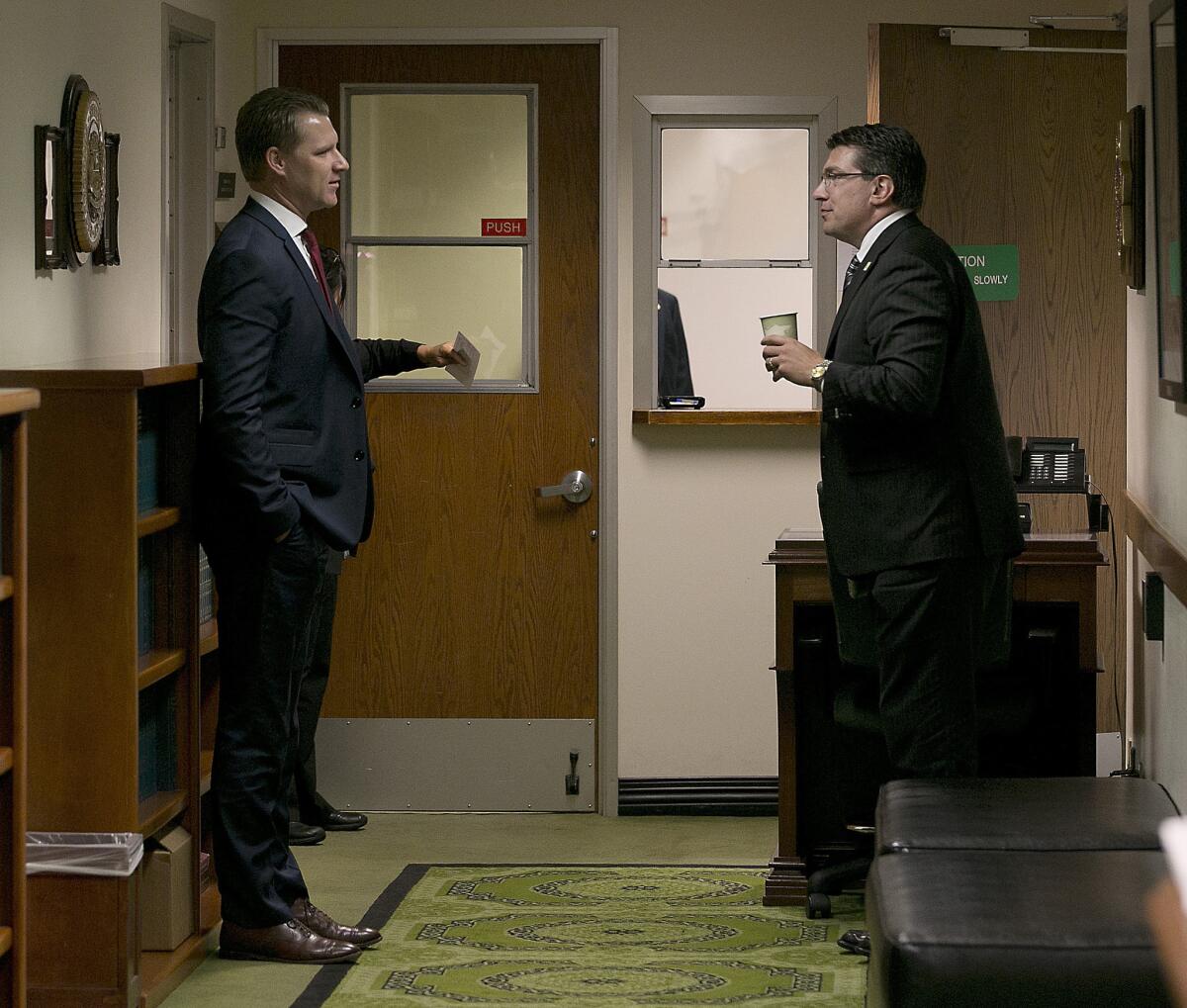
An attempt to oust Chad Mayes as Assembly Republican leader fell short Monday, but another vote is scheduled for next week.
Mayes (R-Yucca Valley) has been facing calls for his ouster after he worked with Democrats to extend California’s cap-and-trade program, the state’s key initiative for fighting climate change.
The 25-member Assembly Republican caucus met for two hours Monday, three days after state party officials called on Mayes to step down or be replaced.
But opponents could muster only 10 votes against him — three short of the threshold.
The next meeting will be held Aug. 29.
“The caucus made a decision, and the decision was we are all going to get together next Tuesday and we’re going to vote,” said Mayes, who does not plan to step down.
Before the vote, Mayes told reporters that he viewed the leadership struggle as an important juncture for California Republicans. He said his party, which has suffered from declining power in Sacramento and dwindling voter registration, needs to adapt.
“You can either convert folks to believe in the things you believe in, or you can go out and begin to reflect Californians,” he said. “The party hasn’t done a good job of converting folks. In fact, we’ve done a good job of repelling individuals. And we haven’t done a good job of reflecting Californians.”
But his plans have been resisted by conservative critics.
“Local Republicans and my constituents are speaking loud and clear that they’d like to see a change in leadership, and I also believe that a new direction is the best course of action for our party,” Assemblyman Randy Voepel (R-Santee) said.
California bill to extend protections for immigrant witnesses heads to Gov. Jerry Brown
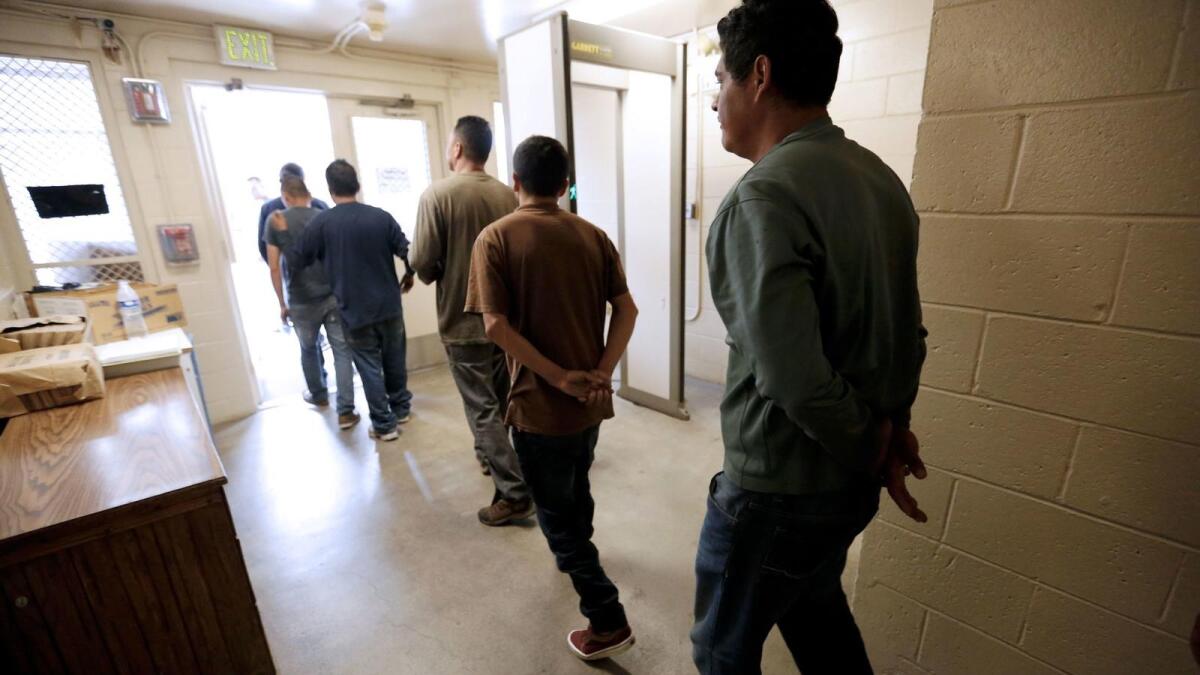
California law enforcement officers will be prohibited from detaining crime victims or witnesses on immigration violations under a state bill headed to Gov. Jerry Brown for his signature.
The legislation, filed by Assemblyman Reggie Jones-Sawyer (D-Los Angeles), would keep officers from holding a crime victim or witness solely for an immigration violation unless they acquire a judicial warrant. It was approved by the state Assembly on Monday with a 64-15 vote.
Brown has until Oct. 15 to sign or veto the bill.
State law currently prevents officers from detaining witnesses to a hate crime on immigration violations or charges. It also prohibits officers from turning over or reporting hate crime witnesses to federal immigration authorities.
The legislation is one of several bills that Democratic lawmakers have filed this legislative session in an attempt to counter the effects of expanded immigration enforcement under the Trump administration. Fear of deportation keeps crime victims and witnesses from coming forward to authorities, the lawmakers say, making neighborhoods less safe.
“It is in the best interest of the state to establish firm connections with those in the community and to protect the public from crime and violence by encouraging all persons — victims, witnesses or anyone who provides evidence to assist in a criminal investigation — to cooperate with state and local law enforcement and not be penalized on account of their immigration status,” Jones-Sawyer said in a statement.
State Senate leader Kevin de Léon calls for healing after Charlottesville, makes no mention of Trump
California state senators began their return to legislative work on a somber note Monday, with a remembrance of the victims of violence in Charlottesville, Va., and Barcelona Spain, and an appeal by Senate leader Kevin de Léon (D-Los Angeles) to reject the white nationalist ideology on display in Virginia.
De Léon began the floor session with a warning of a “rising tide of hate and intolerance threatening to once again tear us apart.”
Regardless of political party, De Léon said he believed all of his fellow senators “would stand up and speak out against fascism, white supremacy and hate if it threatened our own community.”
“It’s incumbent on all of us to remember our history and not repeat our past sins,” he added. “We have to come together to heal, to move forward and to hold ourselves to a much higher standard.”
De Léon notably did not mention President Trump, whose response to the melee between white supremacists and counter-demonstrators was widely panned.
He did announce two specific actions the Senate will take in response to the Charlottesville violence: a series of public hearings to examine California’s preparedness for future neo-Nazi rallies, and informational hearings to examine the rise of white supremacist organizations in California.
Democrats are again trying to change rules for the recall election of an embattled California state senator
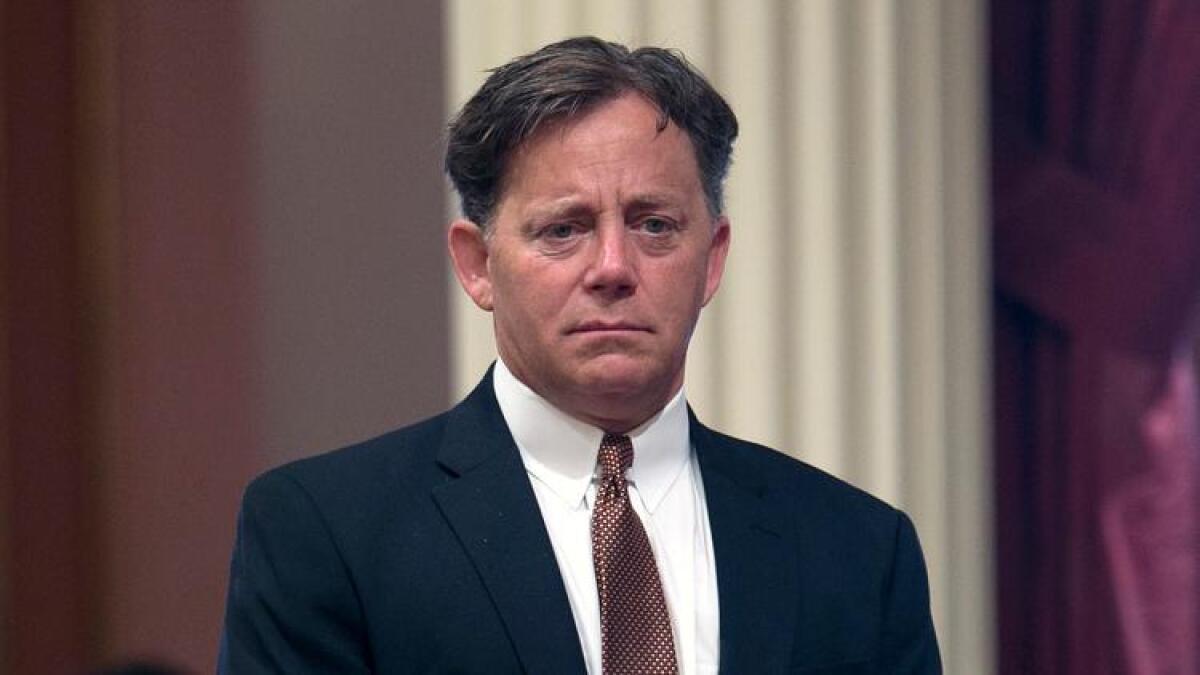
Democrats in the California Legislature pushed again Monday to revamp the rules covering recall elections, their second attempt to potentially delay an effort aimed at removing an Orange County state senator.
The new legislation comes on the heels of an appeals court temporarily blocking a law enacted in June. It was introduced just days after local elections officials reported more than enough signatures for a recall election against state Sen. Josh Newman (D-Fullerton) this fall.
The proposal, written as a budget-related “trailer bill,” would ban elections officials from verifying voter signatures on recall petitions through a random sampling process. It would, instead, require every signature to be validated.
And like the law placed in limbo by an appeals court, it would create a new time period for voters to remove their signatures from the Newman recall petition.
Democrats have insisted many of those voters were told they were signing a petition to repeal a gas-tax increase slated to take effect in November.
“It remains in the overwhelming public interest to safeguard the integrity of California’s recall process and to ensure that recall petitions are not being signed under false and fraudulent pretenses – which is what clearly and blatantly occurred in the 29th Senate District,” said Jonathan Underland, a spokesman for Senate President Pro Tem Kevin de León (D-Los Angeles).
With new allies and approaches, California lawmakers try again to confront high prescription drug prices
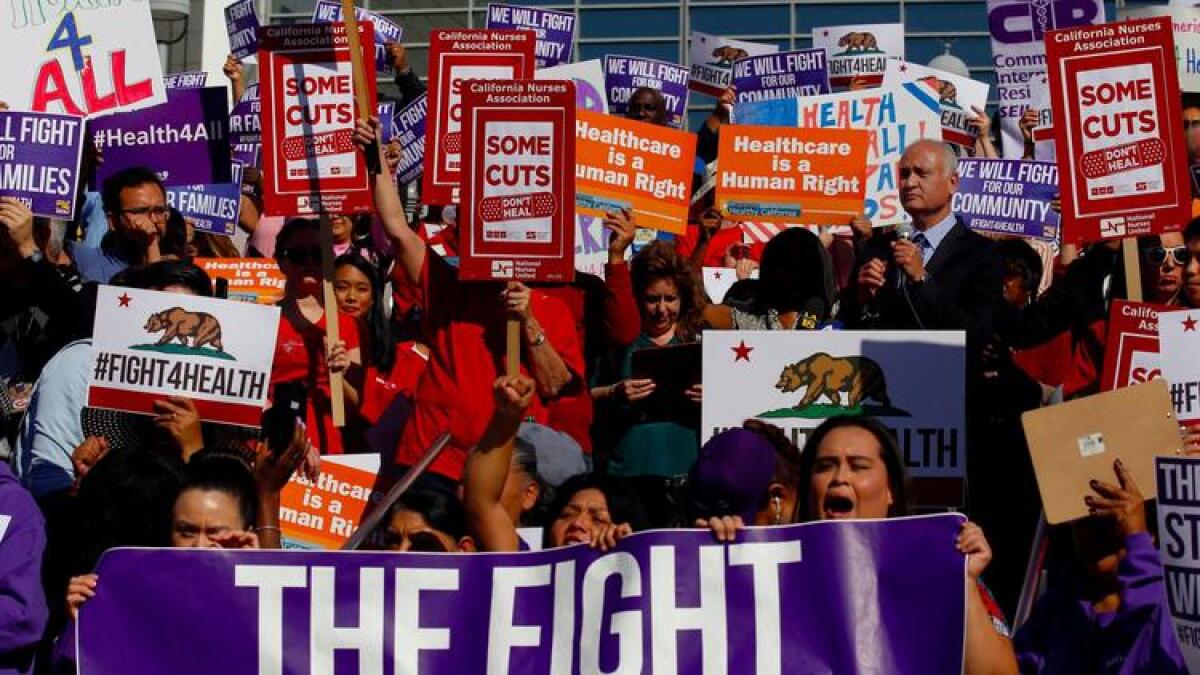
Less rowdy than the sputtered push for single-payer healthcare and less fraught than the battle over Obamacare’s future, the concern over the cost of prescription drug prices has been overshadowed for the past year by the marquee healthcare battles gripping Sacramento and Washington D.C.
That’s not likely to be the case much longer. The effort to rein in pharmaceutical costs is poised for a major showdown as state lawmakers enter their final month of the legislative year.
The debate conjures déjà vu. Much of the action centers on legislation that recalls a failed 2016 bill to require more disclosure around prescription prices, with lobbying efforts tracing familiar battle lines — labor unions, health plans and consumer groups facing off against drug manufacturers.
But several new factors this year have made proponents bullish about their prospects. The price disclosure bill, SB 17 by state Sen. Ed Hernandez (D-Azusa), is now one of five measures that have been proposed to tackle prescription costs, forcing the drug industry to fend off multiple threats. Supporters have picked up new allies on the left, including deep-pocketed Democratic activist Tom Steyer, and on the right, with “aye” votes cast by a handful of GOP lawmakers.
California lawmakers awed by the solar eclipse
California Senate leader eyes cap-and-trade funding for cleaner tractors, trucks and cars
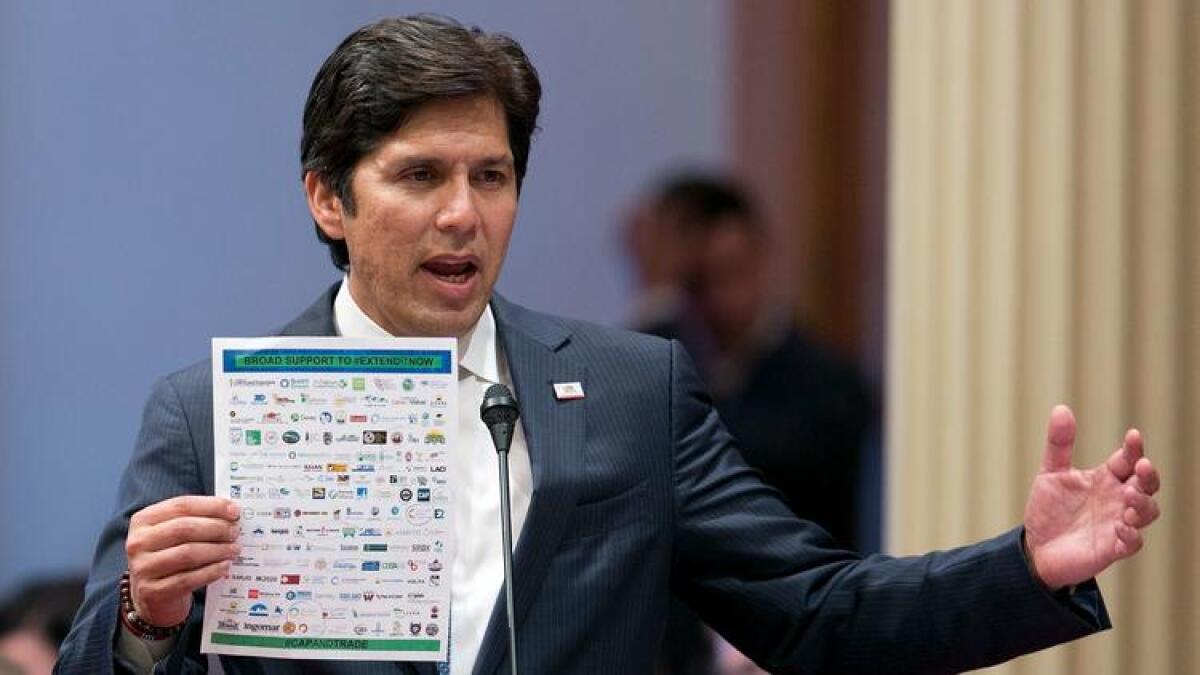
Now that lawmakers have extended the cap-and-trade program, it’s time for them to divvy up the money generated by the sale of pollution permits.
Most of the revenue is already being routed to affordable housing, mass transit and building the bullet train. But there’s still at least $1.4 billion available, which includes some money left over from the last fiscal year and more cash expected to roll in over the next one.
Senate leader Kevin de León (D-Los Angeles) wants to spend roughly $1 billion to replace old, dirty engines. In an interview, he suggested it’s a plan with potentially broad appeal: new tractors in rural areas, better trucks for middle class workers and incentives for drivers to buy electric vehicles.
“We have a historic opportunity to bring businesses, conservatives and liberals alike together on the issue of clean air,” De León said.
There are many details left to work out, starting with the specific price tag and how the money would be doled out, but the proposal is designed to alleviate one of California’s most significant environmental challenges. Pollution from cars and trucks are a health hazard around the state, and they’re the single largest source of greenhouse gas emissions that contribute to climate change.
De León said the state needs to make a bigger investment to chip away at the problem.
“The free market forces by themselves will not correct these gross inequities,” he said. “They must be driven by policies.”
Kimberly Ellis says ‘all options are on the table’ after California Democratic Party rules she lost race for chair

Bay Area Democratic activist Kimberly Ellis, who narrowly lost her bid to become the new California Democratic Party leader, said “all options are on the table” now that the party on Sunday rejected her final appeal challenging the election results.
“Today was yet another missed opportunity for us to get the Democratic Party back on track. As we’ve said from the onset, we were committed to going through the internal process before deciding what’s next. We’re now soliciting feedback from key supporters and deciding where we go from here,” Ellis said in a statement released Sunday afternoon.
Ellis said from the outset that she expected her challenge to the election of Eric Bauman as party chairman to be dismissed, saying the process was biased in favor of her rival. She’s also indicated her next step may be to take her case to court.
“As of now, all options are on the table — with some feeling more inevitable than ever,” Ellis said in the statement.
California Democratic Party rejects final appeal from Kimberly Ellis
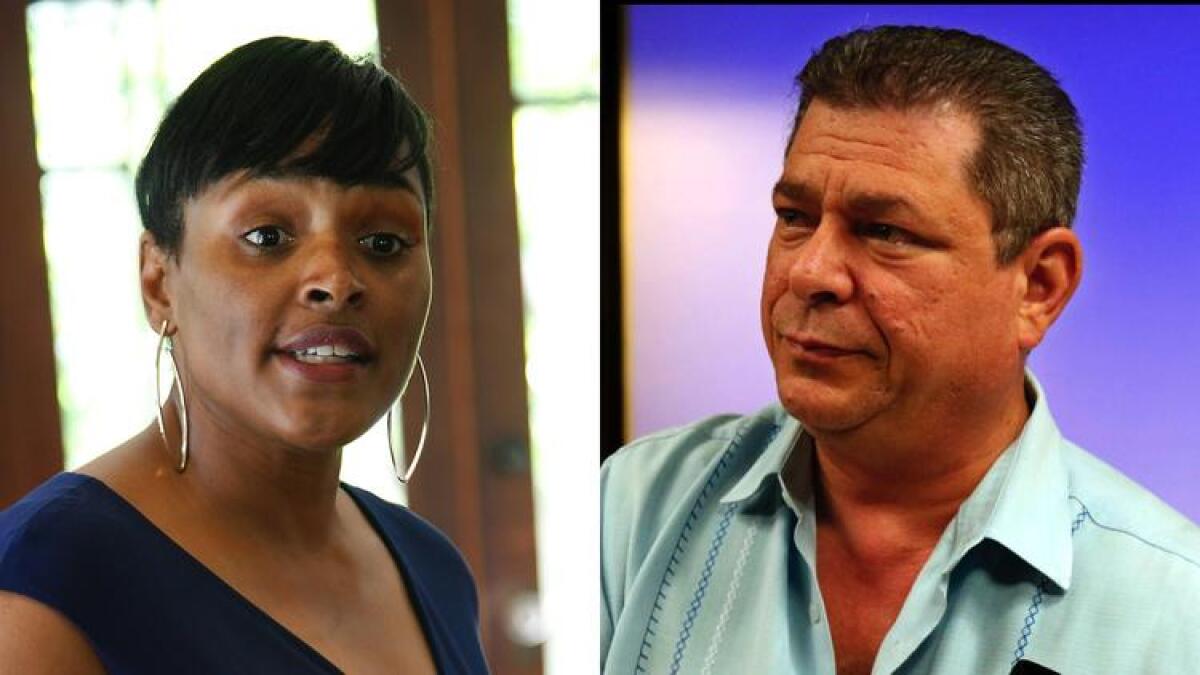
The California Democratic Party on Sunday rejected a last-ditch appeal contesting the election of the party’s new leader, setting up a strong possibility of a court challenge.
Bay Area Democratic activist Kimberly Ellis, who narrowly lost the race for new party chair to Eric Bauman in May, appealed a party committee’s affirmation of the election results in July. On Sunday, the party’s credentials committee dismissed the appeal.
“With the conclusion of the Credentials Committee hearing today, it is my hope that our entire California Democratic Party family can move forward on making progress on these urgent and pressing issues, free from the distraction of costly litigation and needless division,” Bauman said in a statement Sunday afternoon.
Bauman, the longtime chairman of the Los Angeles County Democratic Party, was declared the winner at the state party’s annual convention. Ellis’ campaign has repeatedly contested the results, reviewed every ballot cast and called into question the validity of hundreds of votes.
The bitter, internal party fracas has exposed schisms in the state Democratic Party that mirror the divide between Hillary Clinton’s and Bernie Sanders’ supporters during the 2016 presidential primary.
Some of the state’s top Democratic Party leaders worry the internal feud may divide the party, which dominates California politics, and undercut the state’s strong role in opposing the policies of President Trump and the Republican Congress.
In July, the party’s compliance review commission held an all-day hearing in Sacramento to determine the fate of 355 convention ballots that were deemed questionable. In the end, 47 votes were invalidated — 25 for Bauman and 22 for Ellis. That action did not change the outcome of the election, which Bauman won by 1.9%
Ellis called that review an “inherently biased process,” alleging that the six-member commission included several Bauman supporters. The members were appointed by former chairman John Burton.
Earlier this month, Ellis called on the party to enter binding arbitration to end the dispute and avoid litigation.
Mike Roth, a state party spokesman, dismissed that suggestion as a “Hail Mary pass.”
Rep. Ami Bera sees cause to censure President Trump
Rep. Ami Bera (D-Elk Grove) said at a town hall meeting Saturday that President Trump’s actions and comments in response to racist violence in Virginia are embarrassing and that a case could be made for censuring the president.
“I think given his actions, his words post-Charlottesville, you can very well make the case, and we are starting to talk about that, of censuring the president,” Bera said to strong applause. “We can’t do that without Republicans finding the political courage to join with us.”
Bera said Trump has divided the U.S. with his comments and actions and hurt the country’s image in the world.
“I, at this particular point, am embarrassed by our president and some of his actions, some of his words,” Bera told some 300 people who attended the town hall at Cordova High Performing Arts Center in Rancho Cordova, east of Sacramento.
The congressman also was asked by audience members about the possibility of the president being impeached.
“I think things are moving in that direction,” Bera said. “I think the special counsel, Robert Mueller, is accelerating the investigation.”
Bera has won two competitive reelections to Congress and has faced tough crowds before, but the audience Saturday was polite and supportive with its applause.
Bernie Brown and other audience members said they want Bera, a physician, to support a Medicare-for-all system of healthcare. “It would be more efficient,” Brown said.
Bera said his preference is to stabilize the Affordable Care Act system, sign up the remaining uninsured population and then consider the best financial model, which he said could involve allowing more people to sign up for Medicare.
California Politics Podcast: Lawmakers return to Sacramento with a full plate
National events and internal party politics are likely to dominate the activities of lawmakers when they return to Sacramento on Monday.
On this week’s California Politics Podcast, we discuss how the state’s political leaders are reacting to the deadly violence in Charlottesville, Va. We also catch up on the rancor inside the ranks of Assembly Republicans.
And we take stock of efforts to recall a Democratic state senator, a movement that cleared two major hurdles within the past week.
I’m joined by Times staff writer Melanie Mason and Marisa Lagos of KQED News.
The man who wanted to split California into six states now wants to make it into three
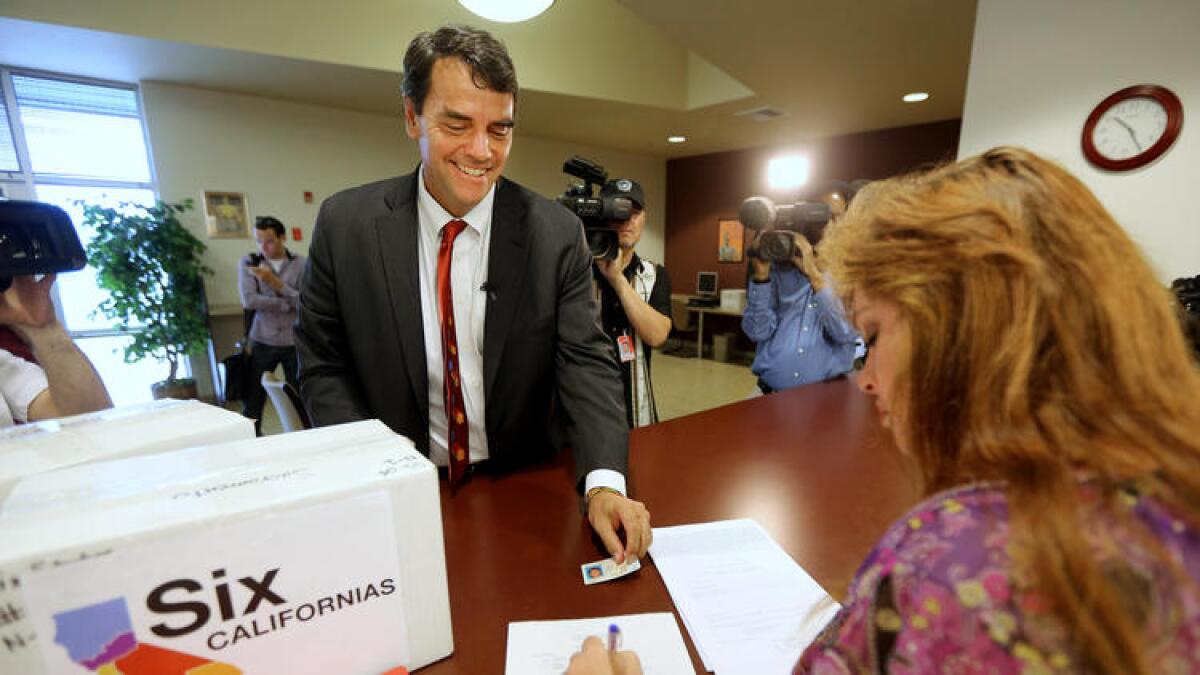
A Silicon Valley venture capitalist whose saw his dream to carve California into six separate states fizzle has returned with a slimmed down idea: this time, three states.
Tim Draper filed his proposed 2018 ballot initiative on Friday asking voters to split California into three new states: Northern California, California and Southern California.
“The citizens of the whole state would be better served by three smaller state governments while preserving the historical boundaries of the various counties, cities, and towns,” Draper wrote in the initiative’s statement of findings. He did not immediately respond to emails sent seeking comment.
Draper’s plan would draw the northernmost dividing line from Santa Cruz County eastward to Mariposa County. The middle state, which would retain the name California, would be closer aligned to the coast and would place Los Angeles and Orange counties into separate states. The state of Southern California would run from Orange County to Mono County in the north and down to the border with Mexico.
The wealthy political tinkerer’s 2014 plan would have created six separate states. Draper spent $4.9 million of his own money to collect signatures on the proposal, only to find too few of them were valid to qualify for the ballot before that year’s deadline. In 2015, he promised to bankroll less ambitious ideas of others at reforming California’s system of government. State campaign finance records show no contributions from Draper to any efforts that year.
There have been hundreds of efforts to dissolve California’s long-standing borders since the state’s inception in 1849. None, including Draper’s new effort, spell out the complicated choices on water rights, economic benefits or border disputes.
Draper’s new effort comes on the heels of a renewed campaign to allow California to secede from the United States. Its backers must also gather the needed signatures for voters to consider the proposal next November.
California Republicans tell Assembly GOP leader Chad Mayes to step down
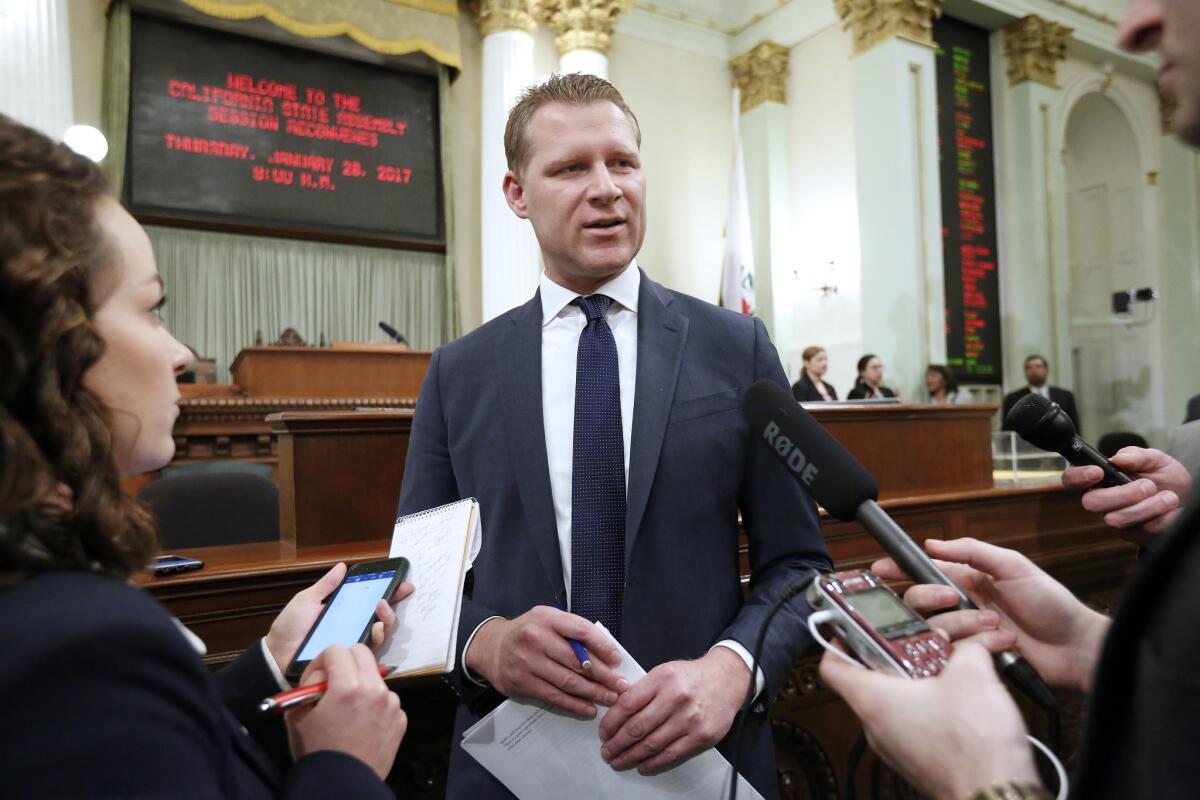
The California Republican Party’s board voted Friday evening to urge Chad Mayes to step down from his position as leader of the party’s Assembly caucus, continuing the bitter fallout over last month’s vote to extend the state cap-and-trade program.
Mayes was one of eight Republicans, seven of them in the Assembly, who helped extend California’s premier program on climate change. He defended his decision as a necessary step to increase support for Republicans in a state where voters overwhelmingly back taking action against global warming, but he angered conservative members of the party who viewed the legislation as bad policy and bad politics.
Harmeet Dhillon, one of two of the state’s representatives to the Republican National Committee, said Mayes had failed to protect “the integrity of the party’s position on taxation and overregulation in California.”
Thirteen members of the party board, including Chairman Jim Brulte, voted in favor of the motion calling on the Yucca Valley Republican to resign as caucus leader. Seven voted against, and there was one abstention.
Mayes said he has no intention of stepping down, and he believes he has enough support to remain in his position.
“I am not going to capitulate,” he said. “I’m going to continue to keep pushing forward.”
While Mayes can be removed from his post only by a vote of his caucus, Friday night’s decision by the state board continues an extraordinary rift between party leadership and one of its top lawmakers over the politics of climate change.
Party officials in two dozen counties have already taken similar steps, representing a groundswell of opposition to Mayes.
The Assembly Republican caucus could meet as early as Monday, when lawmakers return from their summer recess. Assemblywoman Melissa Melendez (R-Lake Elsinore) announced her candidacy on Thursday, and Assemblyman Jim Obernolte (R-Big Bear Lake) has privately expressed interest.
Most of the 25 caucus members contacted by The Times did not respond to questions about the leadership struggle, making it difficult to determine the level of support for Mayes or his challengers.
Before Friday night’s vote, Mayes made a presentation to the state party board saying his decision helped prevent worse regulations on California businesses and could even undermine the bullet train, a priority of Gov. Jerry Brown that’s opposed by Republicans The final deal on cap and trade, which requires companies to pay to pollute, included a proposal for next year’s ballot that would allow Republicans to gain more control over how the program’s revenue is spent.
Mayes has also insisted that reaching out to non-Republican voters is important in California if the party is going to return to power in the Legislature.
“Change is not an option,” his presentation said. “It is an imperative.”
Enough signatures have been collected to force a recall election against state Sen. Josh Newman

Elections officials on Friday reported more than enough voter signatures to force a recall election of an Orange County legislator before the end of the year.
Signatures verified by officials in Orange, Los Angeles and San Bernardino counties would require a special election for voters to consider removing state Sen. Josh Newman (D-Fullerton) less than a year into his four-year term in office.
The three counties reported a total of 66,597 signatures had been verified — more than the 63,593 needed to place the issue in front of Newman’s constituents.
A spokesman for Secretary of State Alex Padilla had no update on the tally Friday. Signatures are verified in county elections offices and then reported to Padilla’s office.
Jim Brulte, the chairman of the California Republican Party, said the process shouldn’t take long.
“All Alex Padilla needs is 30 seconds and a calculator,” Brulte said.
Newman, who won a close contest last November in a district formerly represented by a Republican, has been under fire from conservative activists since voting in April for a $52-billion transportation plan that raises gas taxes and imposes a new annual vehicle fee.
On Monday, a state appeals court placed a hold on a new law that would have delayed the final certification of the recall election. That law would have also allowed time for voters to remove their names from the recall petition. Democrats have accused recall supporters of promising voters that they were signing petitions to repeal the new gas tax, not to remove Newman from office.
“Thousands of voters have asked to have their names removed from the petition after learning they’d been lied to,” Newman said in a statement released by his campaign. “The Registrar’s signature count reflects nothing more than a massive flaw in the recall system that has allowed paid, out-of-district special interests to trick voters into signing an intentionally misleading petition.”
State law gives Padilla 10 days to certify the signature count. Gov. Jerry Brown must then call a special election for Newman’s seat within 80 days of the certification, which means an election would be held by mid-November.
San Diego County physician to challenge Democratic Rep. Scott Peters
La Jolla physician James Veltmeyer plans to officially announce his challenge to Rep. Scott Peters (D-San Diego) over the weekend.
Veltmeyer, a Republican, was born in Ecuador and immigrated to the United States when he was 11. He is the head of family medicine at Sharp Grossmont Hospital in La Mesa.
He has called Obamacare a failure and recently wrote an op-ed in local publication Pomerado News promoting a membership-based model for healthcare.
Veltmeyer ran last year in the neighboring 53rd Congressional District, narrowly advancing from the primary and losing to incumbent Rep. Susan Davis (D-San Diego) by a margin of 67% to 33% in November.
Other candidates running in the 52nd Congressional District include Republicans Omar Qudrat and Daniel Casara, who announced Thursday that he was switching districts to run against Peters, one of four Democrats the National Republican Congressional Committee is hoping to unseat in 2018.
Vice President Mike Pence is heading to California to raise money with Kevin McCarthy
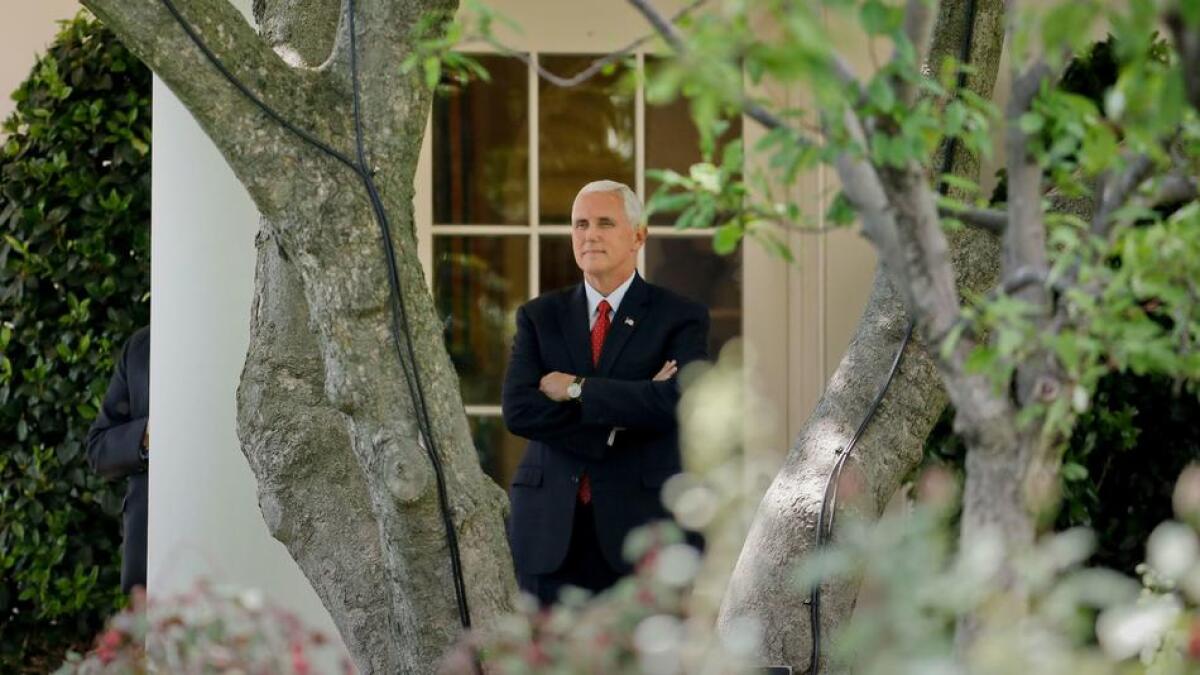
Vice President Mike Pence and House Majority Leader Kevin McCarthy (R-Bakersfield) are hosting a series of high-dollar fundraisers in California in September in an attempt to bolster the state’s vulnerable GOP members of Congress, according to invitations obtained by The Times.
Pence and McCarthy will headline a reception and dinner in Beverly Hills on Sept. 14. The following day, the pair will raise money at a breakfast in Bakersfield, a luncheon in Newport Beach and a reception and dinner in Sacramento.
Donation levels vary. For the kickoff event at the Beverly Hilton, $100,000 gets a donor the title of co-chair, a cocktail reception, a photo, a private roundtable and dinner for two. The least expensive ticket is $2,700, for entry to the cocktail party.
The fundraisers benefit California Victory 2018, a joint fundraising committee that benefits Pence’s and McCarthy’s political action committees, the National Republican Congressional Committee and the congressional campaign accounts of McCarthy, Darrel Issa of Vista, Dana Rohrabacher of Costa Mesa, Mimi Walters of Irvine, Ed Royce of Fullerton, Steve Knight of Palmdale, David Valadao of Hanford, Jeff Denham of Turlock.
Aside from McCarthy, the other seven members of Congress are being targeted in the midterm elections by Democrats because they represent districts won by Hillary Clinton in the 2016 presidential election. Flipping those seats is key to Democrats’ effort to retake control of the House of Representatives in 2018.
Pence’s visit to California also comes shortly after he vehemently pushed back at rumors that he is laying the groundwork for a 2020 presidential run if President Trump does not seek a second term.
California Gov. Jerry Brown commutes the sentences of nine convicted felons
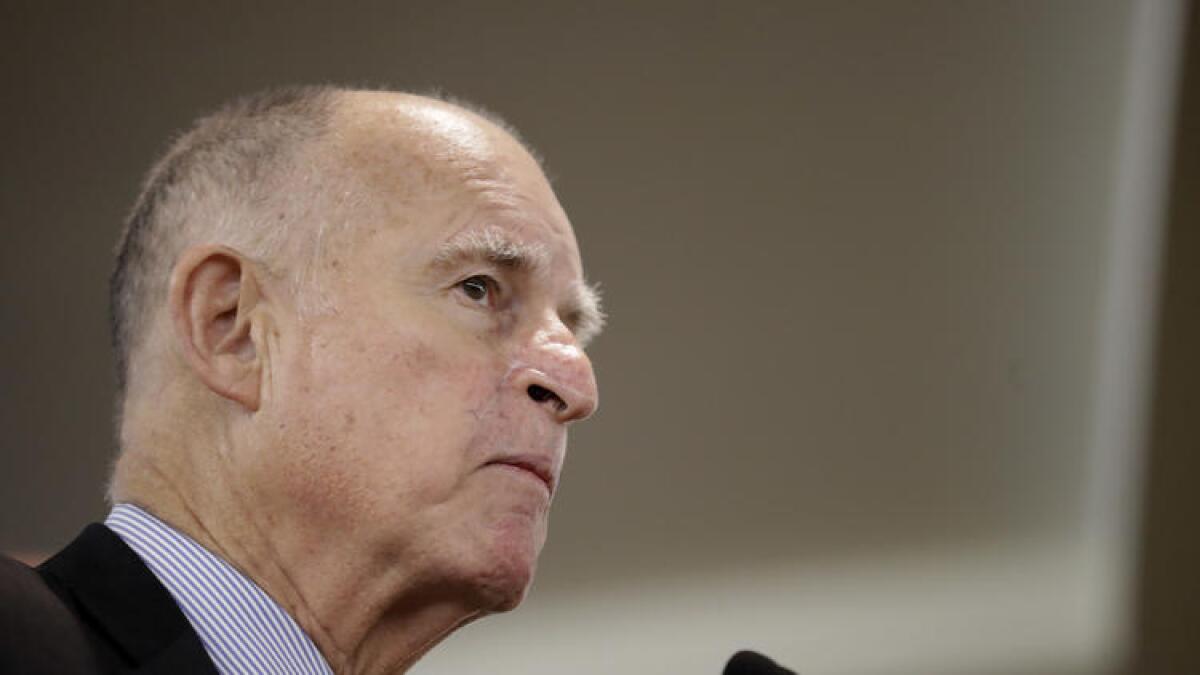
Gov. Jerry Brown on Friday commuted the prison sentences of nine felons who he said showed dedication to transforming their lives. Among them were five people serving sentences for murder.
As governor, Brown has shown a commitment to executive clemency that sets him apart from recent predecessors. He also has pushed to expand the discretion of the state parole board in the cases of more prisoners.
------------
FOR THE RECORD: A previous version of this post referred to pardons being granted. Brown granted sentence commutations, a reduction in sentence that leaves the conviction intact.
------------
Among the people granted clemency Friday was Florence Laurel Anderson, who served 16 years for murder and burglary after she and her pimp killed a man in April 2001. In her clemency application, she described her battle to overcome addiction and her history as a victim of abuse.
Hamid Bashir stopped associating with gangs and earned a high school equivalency diploma and a paralegal certificate while spending 17 years in prison. He was 18 in November 1998 when he and several friends planned a store robbery that took the life of a store manager.
Travielle Craig was also 18 when he and his friends assaulted and killed a man on the night of the verdict in the Rodney King beating trial in 1992. He spent 25 years in prison earning multiple degrees from a Bible college, undergoing self-help programs and mentoring young offenders.
“I have matured now, and I feel that I can be an asset to whatever community I am in,” he said in his application.
Melissa Melendez says she will seek to replace Chad Mayes as Assembly Republican leader
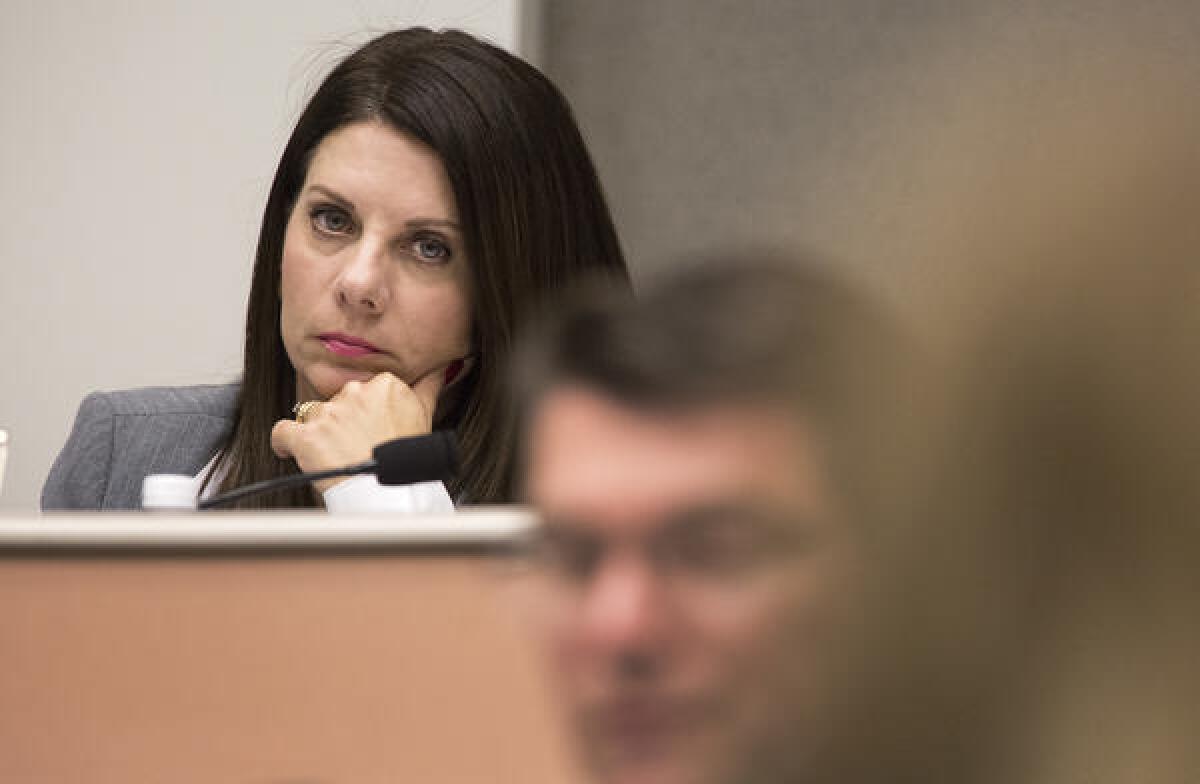
Assemblywoman Melissa Melendez said Thursday she will seek to replace Chad Mayes as Assembly Republican leader when the Legislature returns from summer recess Monday.
Melendez said Mayes’ vote for extending the state’s cap-and-trade program, which requires companies to buy permits to pollute, allowed the Democrats to win approval of a bad program that will lead to higher fuel and energy prices for Californians.
“I am ready and willing to be the type of leader you have been asking for, one who has principles,” Melendez said to applause at a meeting of the Riverside County Republican Party. “When the Assembly returns Monday, I will be throwing my name in the hat to run for Republican leader.”
Mayes, who is from Yucca Valley, has said his vote showed bipartisan cooperation to solve a problem.
Melendez, a resident of Lake Elsinore, said Republicans hurt their party in joining Democrats to vote for measures that raise costs for business and consumers.
“Republicans do not have to vote like Democrats to save the Republican Party,” Melendez said.
Assemblyman Jay Obernolte (R-Big Bear Lake) has also expressed interest in replacing Mayes should he decide to step down.
Rep. Darrell Issa calls for House hearing on white supremacists in aftermath of Charlottesville violence
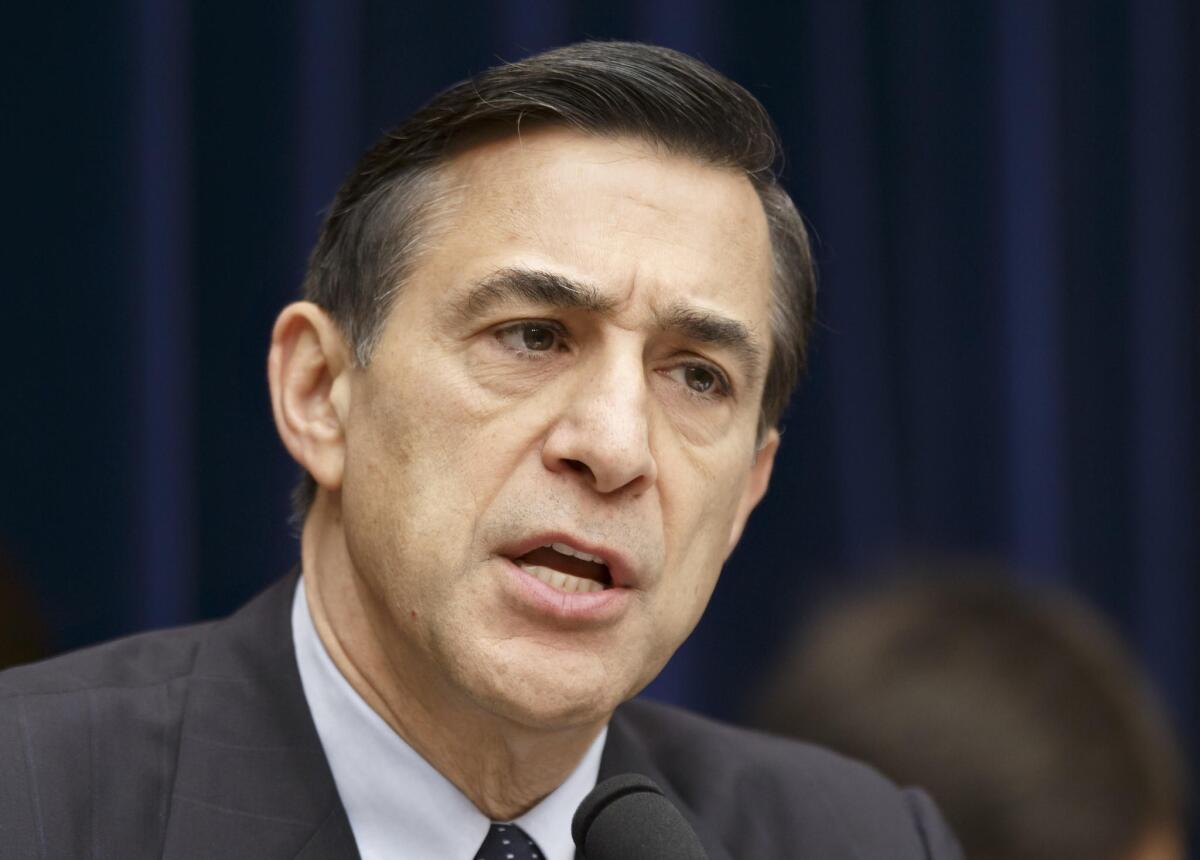
Rep. Darrell Issa (R-Vista) called Thursday for a House Judiciary Committee hearing on the impact of white supremacist groups on civil rights.
The move comes as party leaders are fretting over the political fallout from President Trump’s response to the violence spawned by white supremacists and neo-Nazis last weekend in Charlottesville, Va.
“As the nation grieves and heals from the scenes of this past weekend, we have a duty to more fully understand what led to these terrible events and the persistence of these hateful, extremist ideologies,” Issa said in a letter to House Judiciary Committee Chairman Bob Goodlatte (R-Va.).
Trump condemned the neo-Nazis and white supremacists whose protests against Charlottesville’s removal of a Confederate monument turned violent.
But earlier this week the president reversed course in his remarks on the violence, saying some “very fine people” marched alongside the extremists, and casting some blame on counter-protesters. On Thursday, Trump lamented the growing calls to take down Confederate monuments.
Issa, who narrowly won reelection last year, is one of California’s most vulnerable Republican incumbents in next year’s House elections. He has been trying to broaden his appeal among moderates in his coastal district, which straddles northern San Diego and southern Orange counties.
On Thursday, he bemoaned the “despicable display of bigotry and evil” by a “repulsive hate group,” saying a hearing should be held next month.
“While Congress cannot legislate respect, decency, or acceptance of others,” he said, “we have an obligation to use our platform to lead our country forward on these matters.”
Lin-Manuel Miranda appears with L.A. congressman: ‘It’s for you to tell the stories we haven’t heard yet’
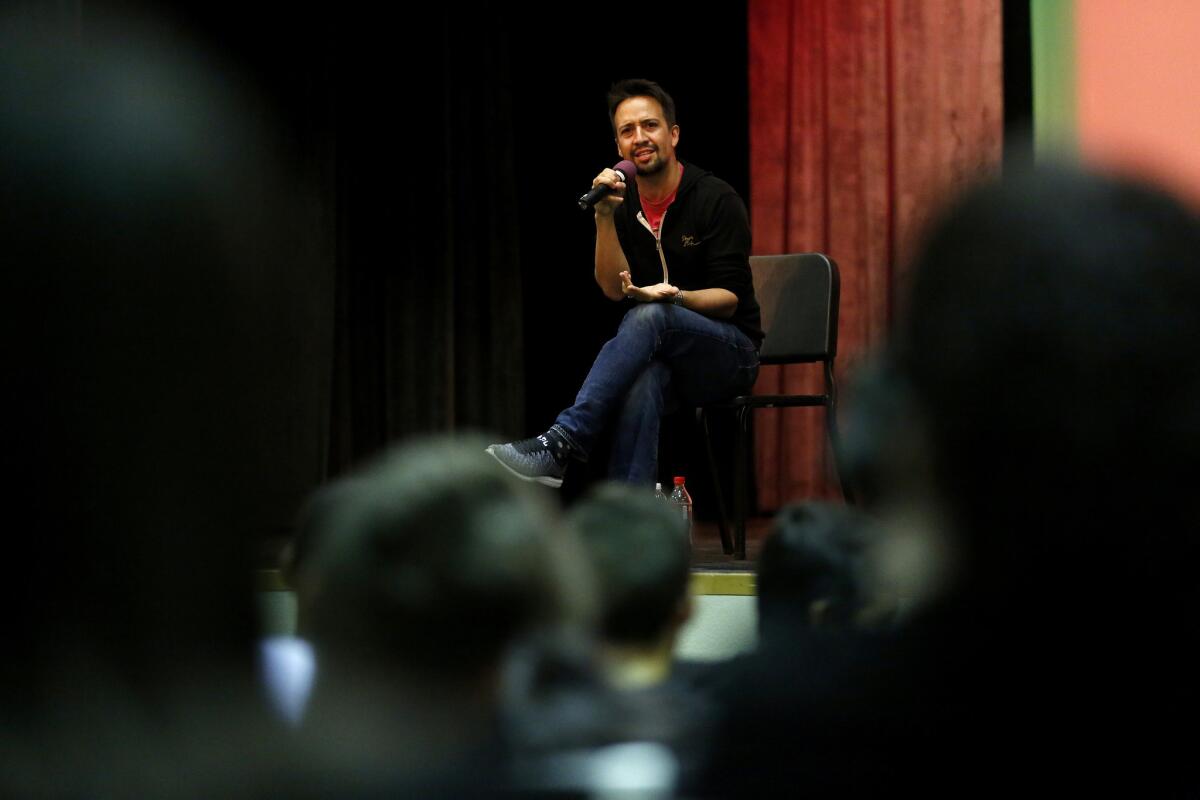
It’s not easy to get an auditorium full of hundreds of teenagers screaming with excitement on their first week back to school.
Lin-Manuel Miranda, the Tony Award- and Pulitzer Prize-winning creator of “Hamilton” did just that Thursday, as he spoke to nearly 1,000 students in Rep. Tony Cardenas’ San Fernando Valley district.
In a roughly 30-minute question-and-answer session at Panorama High School, Miranda flowed seamlessly between English and Spanish, speaking about his earliest memories with his abuelita and telling the young crowd, “Mi tiempo es tuya” -- “My time is yours.”
He also described history as “a canvas.”
“It’s for you to tell the stories we haven’t heard yet. And to lift those voices, those often marginalized voices, up, and I can’t wait to see what you create,” Miranda told the crowd of mostly high schoolers, many of them Latino.
He took turns answering lighthearted questions about his first job (working for $4.25 an hour at a Manhattan McDonald’s) and the one food he’d choose to eat for the rest of his life (a type of Puerto Rican lasagna).
But he also offered some tidbits of advice for the youngsters, telling them to “surround yourself and fill yourself up with the thing you’re chasing.”
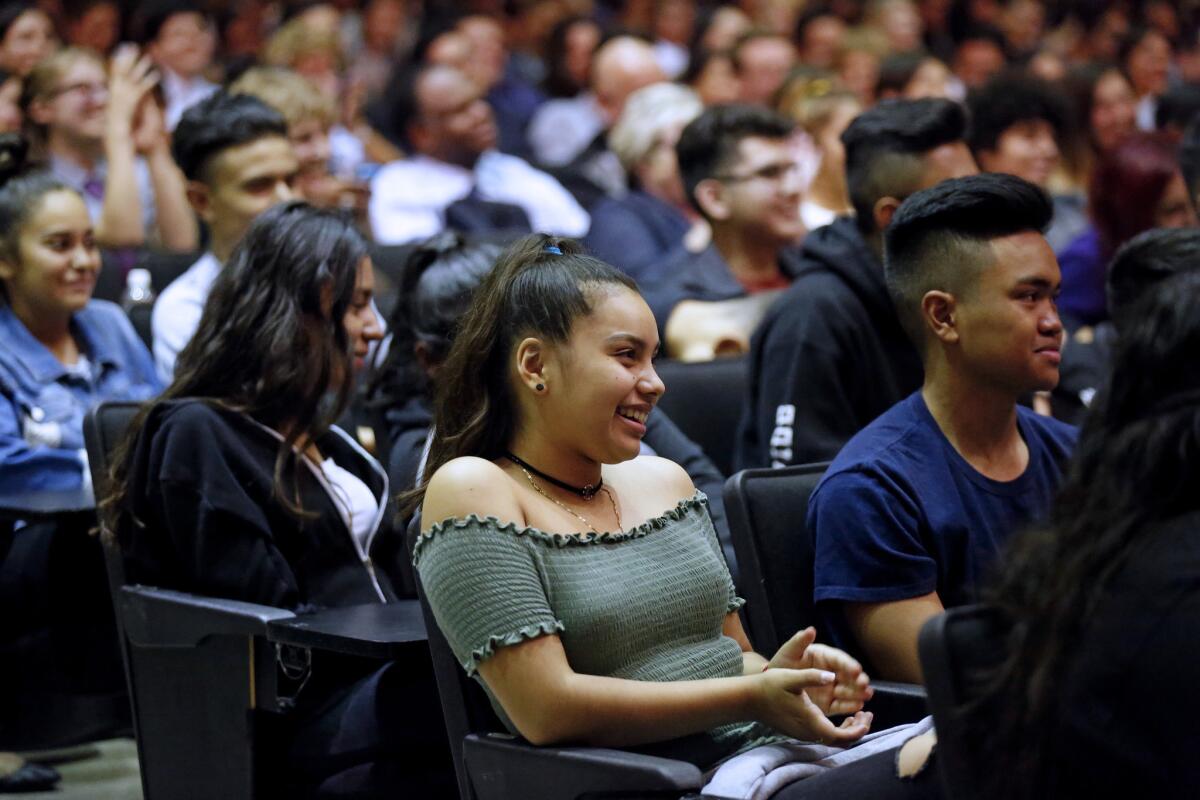
Responding to a question about being successful as a Latino, Miranda said, “You’ll face struggle. You will face people telling you you’ve got to look a certain way, you will face people telling you that you have to tell a specific story.” He added, “You could write a bad version of someone else’s story but only you can tell your story.”
Cardenas set up the event, billed as a “town hall” focused on civic engagement, after meeting Miranda’s father, political consultant Luis Miranda, and chatting with him over coffee about the need to expose Latino youth to role models who look like them. The elder Miranda brought his son onboard and was in the audience, along with Miranda’s mother, Dr. Luz Towns-Miranda, at the event on Thursday.
Cardenas’ 29th Congressional District is nearly 70% Latino and almost 45% of residents were born outside the United States.
“It’s about talking to 1,000 children, who many of them are scared,” Cardenas told reporters afterward. “It’s important for us to understand that examples like Lin-Manuel Miranda ... we don’t have to be angry voices.”
Miranda also addressed questions about the current political climate and the recent violence in Charlottesville, Va.
“As scary and tragic as the events of last week were, the outpouring of pushback has been heartening,” Miranda said. “If you’re a kid and you’re scared in this country, there’s a lot of adults who are working really hard and have your back.”
Schwarzenegger to Trump: ‘Send an unequivocal message that you won’t stand for hate’
In a three-minute video released on ATTN’s Facebook page, former California Gov. Arnold Schwarzenegger criticizes President Trump’s response to the recent violence in Charlottesville, Va.
“The only way to beat the loud, angry voices of hate is to meet them with louder, more reasonable voices. That includes you President Trump,” he said. “You have a moral responsibility to send an unequivocal message that you won’t stand for hate and racism.”
Schwarzenegger, who has had a longstanding feud with Trump, advises the president in his video that he should outright “reject the support of white supremacists” before turning his attention to neo-Nazis, white nationalists, and neo-Confederates.
“Your heroes are losers. You are supporting a lost cause,” he said. “Let’s terminate hate.”
In the aftermath of the Charlottesville violence, Schwarzenegger donated $100,000 to a Los Angeles-based anti-hate group, and encouraged others to act in similar charitable ways.
San Diego Democratic Rep. Scott Peters picks up another Republican challenger
Retired Army Sgt. Daniel Casara, who initially stepped up to challenge embattled Rep. Duncan Hunter (R-Alpine), on Thursday joined other Republicans seeking to oust Democratic Rep. Scott Peters from his 52nd Congressional District seat.
“Washington needs more patriots and less politicians,” Casara said in a statement. “Voters demand a representative who understand the needs of a strong national defense and will support the men and women who provide it.”
The Purple Heart medal recipient and 43-year-old motivational speaker originally launched a bid against Hunter, a six-term Republican under investigation by the FBI over alleged misuse of campaign funds. Hunter has at least one other Republican challenger.
Peters is one of the California Democrats that Republicans hope to defeat in 2018. Casara joins Republican candidates Omar Qudrat, an attorney; and James Veltmeyer, a physician, in the race for the seat.
Marc Troast, Casara’s campaign manager, said Casara respects Hunter, a fellow military serviceman.
“But there are some issues in his home district [Casara] wants to help solve,” Troast said. That was the main reason for the switch, he said.
Group files another ‘Calexit’ initiative in push for California’s independence
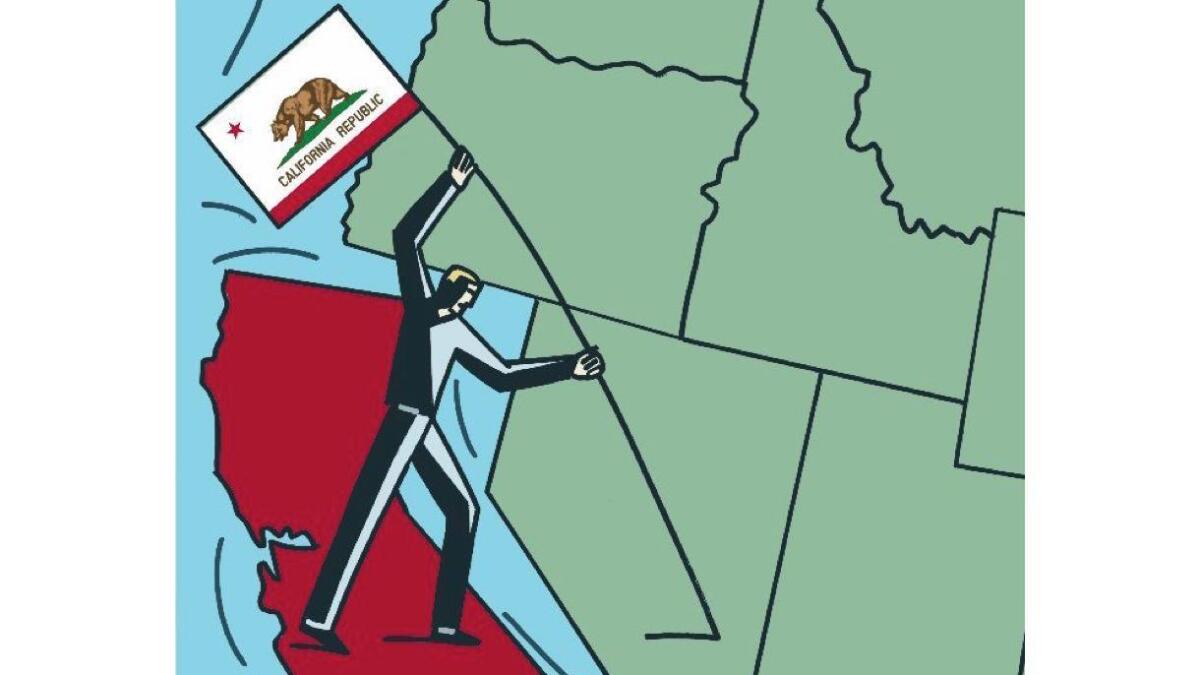
A new ballot initiative was submitted to state officials Thursday advocating for a federal constitutional convention that could lead to California’s independence.
The measure, similar to one already in circulation that is pushing for California’s secession from the union, would require the state Legislature to ask Congress to establish a new constitutional convention.
“We believe that justice for all requires constant vigilance and a thorough examination of laws and governmental actions that disproportionately impact diverse segments of society,” the initiative states. “These beliefs depend on resolutely defending these Californian values, which support every individual’s hopes and dreams for the future.”
The initiative has been submitted to Atty. Gen. Xavier Becerra for an official title and summary, a necessary step before supporters can collect signatures to put the measure on the 2018 ballot. Once that happens, backers would have to gather nearly 600,000 signatures in 180 days.
This is the third official effort this year to try to make California an independent state, a push known informally as “Calexit.” Supporters of another measure, which would direct California’s governor to negotiate more autonomy from the federal government, already have been cleared to collect signatures. A more aggressive measure to ask for independence immediately has been abandoned.
The group behind this most recent measure calls itself California Constitutional Convention Initiative Team. One of its backers is Marcus Ruiz Evans, who has been involved in California secessionist causes since 2012 and calls himself the founder of the Calexit movement.
Campaign finance agency lifts contribution limit to Democratic state Sen. Josh Newman as he fights off recall threat
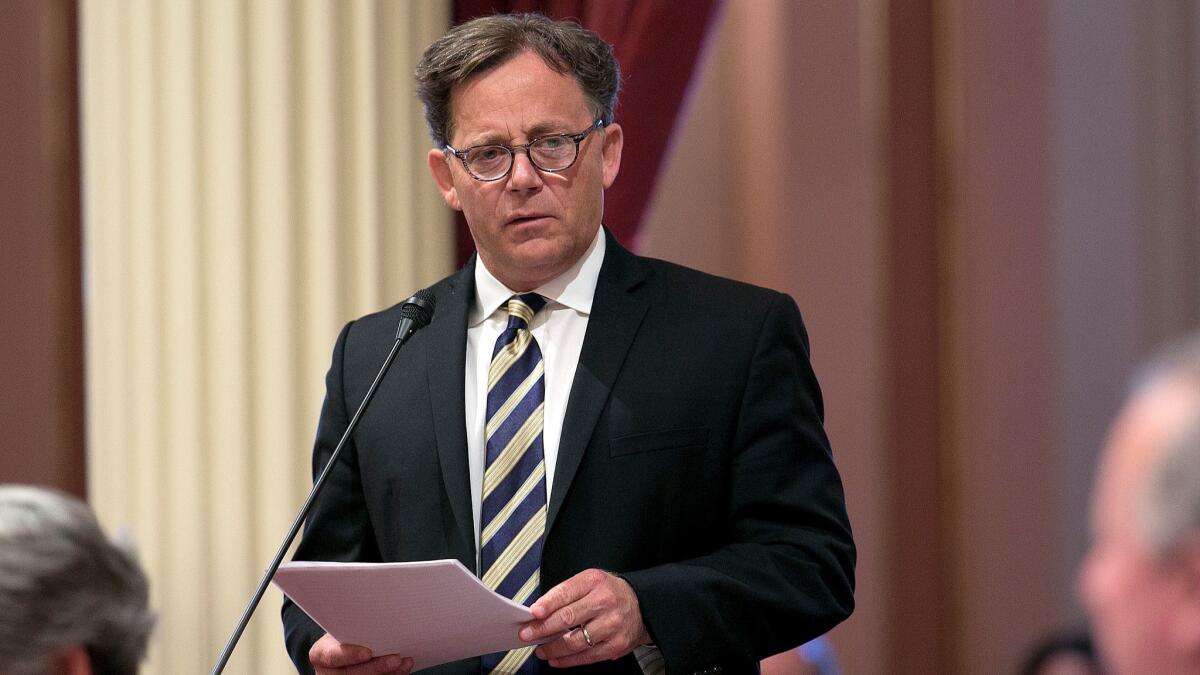
The state campaign watchdog agency voted Thursday to lift limits on contributions from elected officials to candidates facing recalls, boosting Sen. Josh Newman’s effort to fend off a campaign to remove him from office for voting for a gas-tax increase.
The 3-1 vote by the state Fair Political Practices Commission rejects an initial opinion by its attorneys that supported past advice letters declaring that legislators can give no more than $4,400 to colleagues fighting recalls.
The Democratic Senate Caucus, of which Newman, a Fullerton lawmaker, is a member, requested the change.
Approved after tense exchanges between commissioners, the new opinion takes effect immediately, and some predict a flood of new contributions to Newman from other legislators, even though elections officials are still counting signatures to see if a recall qualifies for the ballot.
Commissioner Allison Hayward said the limit on the contributions is not supported by regulations and is unfair because there is no limit on contributions to campaigns to recall officials.
“What we’ve got right now is a situation where there is a restriction on one side of an essentially bilateral battle ... that doesn’t apply to the other side,” Hayward said. “It’s pretty clear to me that, at least at the U.S. Supreme Court, such imbalances just can’t be tolerated.”
Chairwoman Jodi Remke cast the only vote against the change, noting the position that the contributions should be limited has been held by the panel since 2002 based on staff interpretations of the law. She said she was concerned about the timing as the Democratic senator faces a recall.
“I will be issuing a dissenting opinion,” Remke told the panel. “I believe this is the wrong time and wrong venue for us to reverse a longstanding commission interpretation of a statute.”
Remke disputed that the rule creates unfairness in the election, noting elected officials can already contribute unlimited amounts to fight a recall, as long as it does not go to a committee controlled by the candidate under threat.
The quick action on the Democrats’ request has drawn criticism from the California Republican Party, which has also complained that Commissioner Brian Hatch did not publicly disclose a meeting and text message exchange he had with Richard Rios, an attorney for the Democrats.
Commissioner Maria Audero disputed that the change was mishandled, or that it should be delayed because there is a pending recall.
“We answer to the people who come before us and ask us to do something. We don’t control when they come before us,” Audero said. “Our duty is to respond. Our duty is not to fabricate some nefarious intent to a reason why something is before us.”
Audero said the criticism that the decision is political because the supporters were all appointed by Democrats is “comical” because Audero and Hayward are Republicans.
Rohrabacher on meeting with WikiLeaks’ Assange: We talked about ‘what might be necessary to get him out’
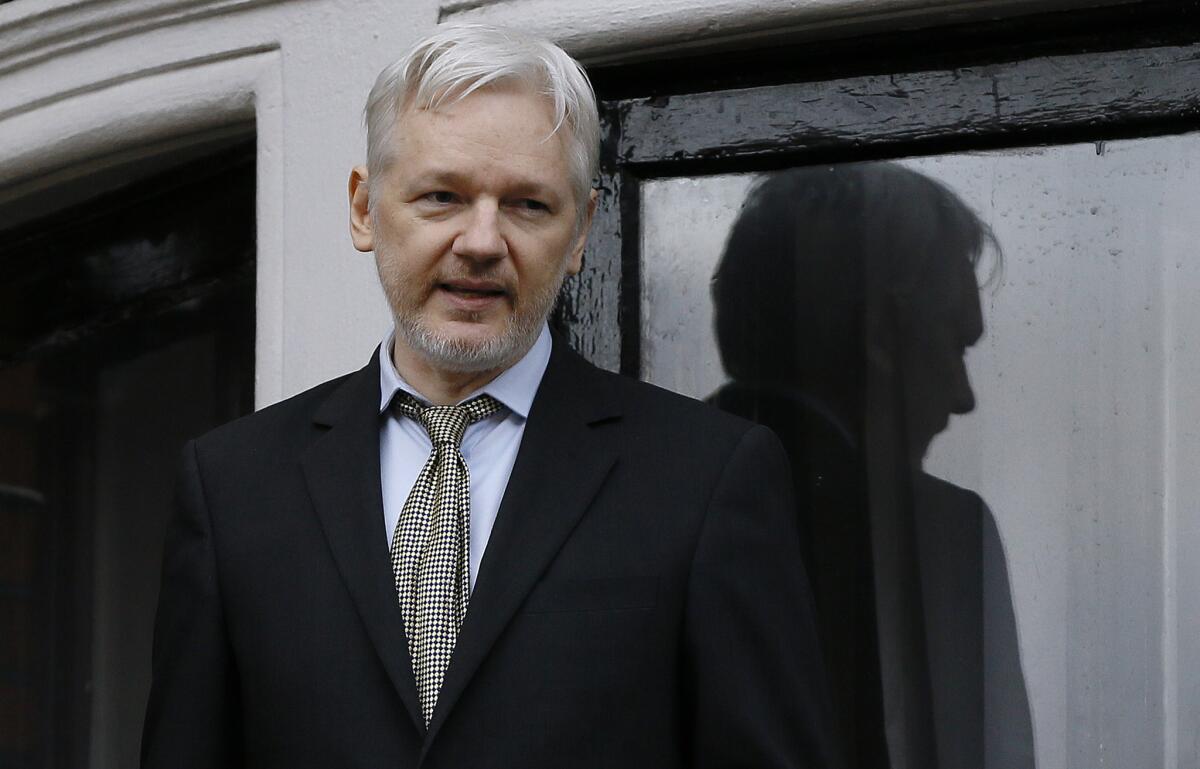
Far-right blogger and provocateur Chuck C. Johnson said on Thursday that he helped arrange a highly unusual meeting between Orange County GOP Rep. Dana Rohrabacher and WikiLeaks founder Julian Assange this week.
Rohrabacher said in a statement that he plans to bring information to President Trump from the three-hour meeting, which took place Wednesday in London at the Ecuadorian Embassy, where Assange has been living in asylum since 2012.
He would not detail that information to The Times, but in an interview Thursday morning with the Daily Caller, Rohrabacher was more explicit, saying he and Assange talked about “what might be necessary to get him out” and suggested they discussed a presidential pardon in exchange for information on the theft of emails from the Democratic National Committee, which were published by WikiLeaks before the 2016 presidential election.
“He has information that will be of dramatic importance to the United States and the people of our country as well as to our government,” Rohrabacher told the Daily Caller. “Thus if he comes up with that, you know he’s going to expect something in return. He can’t even leave the embassy to get out to Washington to talk to anybody if he doesn’t have a pardon.”
Johnson, who is known for being banned from Twitter after he asked users for help “taking out” a civil rights activist, said that he and Assange attorney Jennifer Robinson also were in the meeting.
Johnson wrote in an email to The Times that the meeting was the result of a “desire for ongoing communications” from both Rohrabacher and Assange. Rohrabacher spokesman Ken Grubbs said the congressman alerted the White House about his planned trip to visit Assange. The White House has not confirmed whether it was aware of the meeting ahead of time.
Rohrabacher’s office said that during the meeting, Assange repeated his claims that the Russian government was not involved in the theft of Democratic emails.
The release of the emails put Democratic candidate Hillary Clinton on the defensive and are among the incidents that led to investigations by the Justice Department and multiple House and Senate committees into potential ties between President Trump’s campaign and election meddling. Multiple U.S. intelligence agencies think Russia was involved in the theft of the emails.
In a statement, DNC spokeswoman Adrienne Watson said, “We’ll take the word of the U.S. intelligence community over Julian Assange and Putin’s favorite Congressman.”
Assange, who has been criticized by many U.S. officials for WikiLeaks’ alleged ties to Russia, remains in asylum at least in part because British authorities have threatened him with arrest for jumping bail after Sweden made sexual assault allegations against him. Those allegations since have been dropped, but Assange, who is Australian, also could face legal problems in the U.S. The Washington Post reported in April that federal prosecutors were weighing whether to bring charges against members of WikiLeaks, in part over information leaked by Chelsea Manning, the U.S. soldier convicted of handing over diplomatic cables to the organization.
Rohrabacher, who has long been criticized for his fondness for Russia, believes he is the only congressman who has visited Assange.
Shortly after the trip was revealed, the Democratic Congressional Campaign Committee called for Rohrabacher to step down from his post on the House Foreign Affairs Committee, where he chairs a subcommittee on Eurasian affairs.
Grubbs called the Democratic committee’s call “absurdly but predictably partisan.”
Grubbs also said Rohrabacher paid for the trip to London — which he took while many of his House colleagues are working and holding town hall meetings in their districts — with personal funds.
California Assembly Speaker: Housing spending this year is more important than water and parks
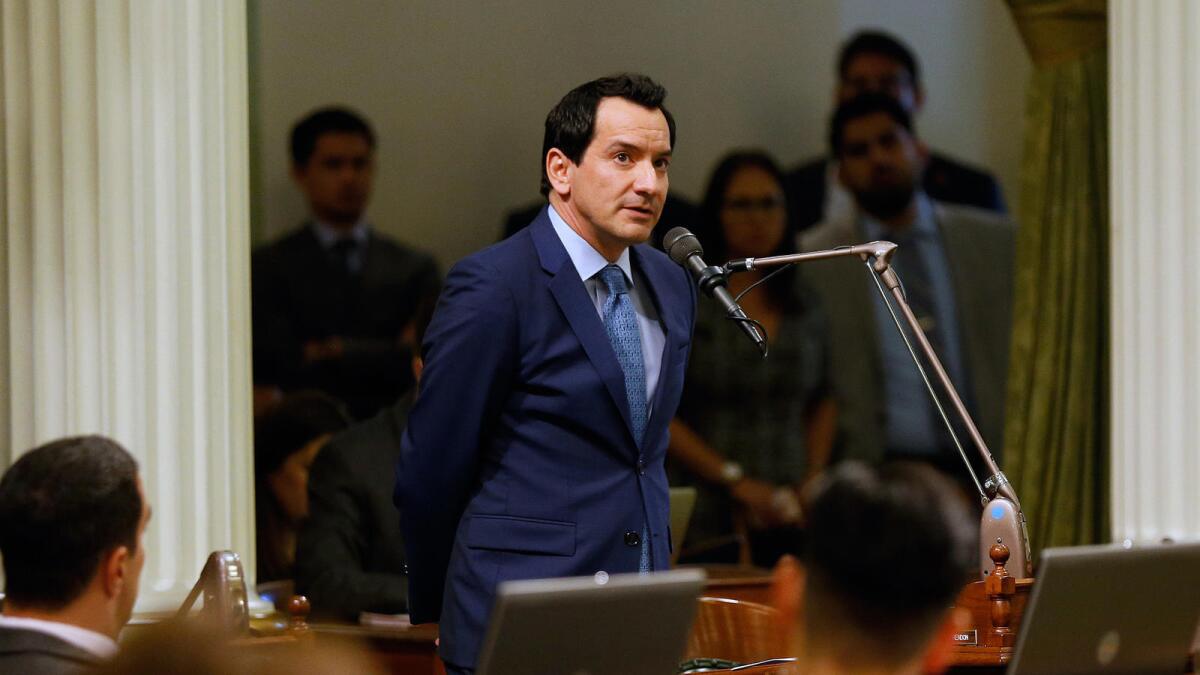
With Gov. Jerry Brown and lawmakers debating billions in new spending for a variety of projects on the 2018 ballot, Assembly Speaker Anthony Rendon (D-Paramount) said low-income housing will be the highest priority.
Brown is supporting bonds on the 2018 ballot that would finance new homes for low-income residents and those that would improve water and parks infrastructure. But the dollar amounts for each measure haven’t been settled.
“We’re going to negotiate for as high as we possibly can on housing,” Rendon said Thursday in a conference call with the Los Angeles Times Editorial Board. “We think it’s a more critical need.”
The housing proposal now pending in the Legislature calls for a $3-billion bond, but State Treasurer John Chiang joined Rendon on the conference call to argue for one as high as $9 billion. While a larger bond would lead to the construction of more homes, the state would still fall far short of the new home building needed to combat its housing affordability crisis.
Last month, Brown, Rendon and Senate President Pro Tem Kevin de León agreed to a housing bond and other legislation designed to ease housing problems. Rendon sounded less confident about the passage of another part of the housing package: a proposal to charge $75 on mortgage refinances and other real estate transactions. The fee would raise about $250 million a year and go toward building low-income housing.
That legislation, Senate Bill 2 by Sen. Toni Atkins (D-San Diego), requires two-thirds supermajority votes in both houses of the Legislature. Both moderate and liberal Democrats in the Assembly have raised red flags about increasing fees on homeowners.
Rendon said it was difficult to predict how the vote would pan out.
“A two-thirds vote is obviously always a very big lift,” he said. “In general, the members know that housing is a basic human need.”
California state senator introduces measure to crack down on sexual harassment in Silicon Valley
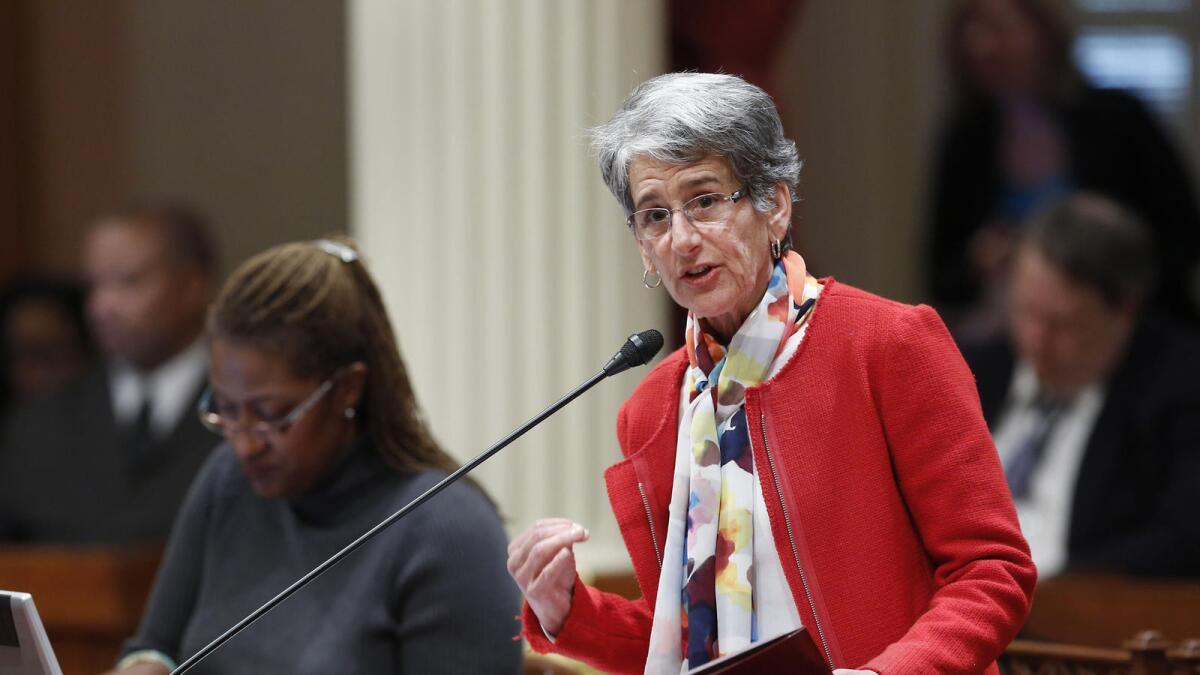
Following a flood of reports by female entrepreneurs detailing lewd remarks and unwanted sexual advances by male investors, a California lawmaker wants state law to explicitly prohibit such harassment.
State Sen. Hannah-Beth Jackson (D-Santa Barbara) announced Thursday she was introducing a measure to amend California’s Unruh Civil Right Act to expressly forbid sexual harassment between investors and entrepreneurs.
Jackson said she believes such behavior already is barred under existing law under a blanket prohibition in the Unruh Act, which outlaws discrimination based on sex, gender, ethnicity and other categories. But, she noted, the act also specifically names certain business relationships as being protected from such harassment. By naming the relationship between investors and start-up founders, she hopes that will provide additional clarity for women who have been harassed.
“Because there hasn’t been that clarity, I think women have been reluctant to step forward,” Jackson said in a call with reporters. “By including this specifically, it reaffirms and will hopefully provide the kind of incentive for women who have been victimized by this behavior to step forward because it will be specifically identified in the law.”
The proposal was prompted by a spate of reports from female tech entrepreneurs, who went public with stories of being asked on dates and experiencing unwanted physical contact when dealing with male venture capitalists, whose investments are crucial to getting fledgling start-ups off the ground.
“Their stories have peeled back a shroud of secrecy and exposed behaviors that are simply not acceptable in any industry,” Jackson said.
The disclosures have prompted a round of self-reflection in the tech industry, with some venture capitalists issuing public mea culpas, and others promising a crackdown on predatory behavior.
Noreen Farrell, executive director of Equal Rights Advocates, said Silicon Valley “understands it has to change,” but self-policing measures such as decency pledges “really won’t cut it.”
“The women that we talk to are tired of being treated by venture capitalists as sexual opportunities instead of investment opportunities,” Farrell said.
Jackson plans to insert her measure into an existing bill, SB 224, in a process known as a “gut-and-amend.” But with the Legislature slated to end its work for the year in less than a month, she said her bill will not be taken up until next January, when the new legislative year begins.
California corrections officials fail to ensure prisons monitor inmates at risk for suicide, state audit finds
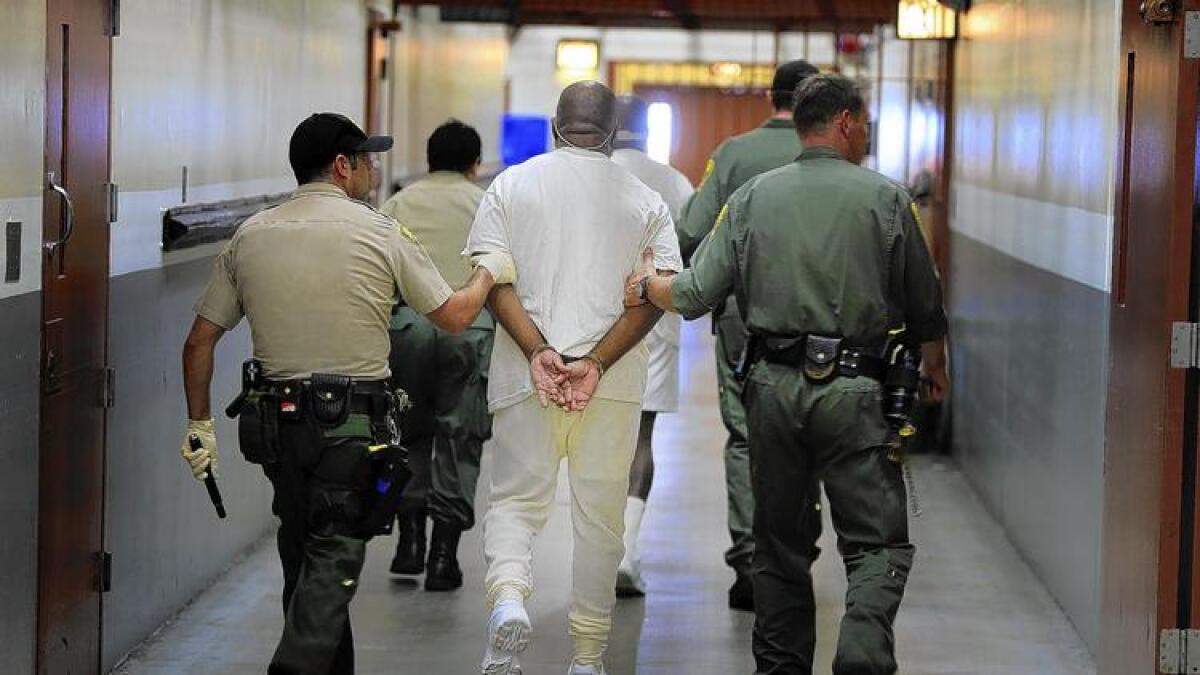
California corrections officials have failed to ensure prison staff members properly evaluate, treat and monitor inmates at risk of taking their own lives, according to a scathing state audit released Thursday.
The California State Auditor report, requested by a joint legislative audit committee, found state prisons failed to follow their own suicide prevention and response policies, while their average suicide rate was substantially higher than the average of U.S. state prisons — 22 per 100,000 inmates versus 15.66 per 100,000 inmates.
The state auditor’s office reviewed 40 files on prisoners who committed or attempted suicide at four state prisons. Thirty-six inmates required suicide-risk evaluations, but mental health staff failed to complete at least one required risk evaluation for 10 prisoners and completed inadequate risk evaluations for 26 others.
Prison staff members were said to have left some sections of these evaluations blank. They often didn’t appropriately justify determinations of suicide risk, or failed to develop adequate plans for treatment, the report said. Court-appointed mental health experts had alerted corrections officials to the problems for the past several years, it found.
Out of 25 inmates requiring treatment plans, prison staff members did not develop adequate approaches to care for 23 and failed to create any plans for two, the audit found. Staff at all four prisons insufficiently monitored inmates at risk of suicide, failing to check in on them at the required 15-minute intervals, auditors found.
The rates of women who have committed suicide in California state prisons soared, according to the report. From 2014 through 2016, women comprised about 4% of the total inmate population but accounted for roughly 11% of its inmate suicides. Almost all occurred at the California Institute for Women in San Bernardino.
Although drug involvement and domestic violence were among factors that could have contributed to the higher rate of female inmate suicides, state auditors said, state prisons had not made sure staff were trained on suicide prevention and response.
The California Department of Corrections and Rehabilitation provides mental healthcare to roughly 123,000 men and 5,800 women incarcerated at its facilities.
State auditors recommended that the state Legislature require corrections officials to properly train staff and continue to develop their oversight processes, including audits of prisons’ risk evaluations and treatment plans. The department should be required to report its progress each year, the report said.
Corrections officials said no suicides had been reported at the California Institute for Women this year, where new programs to help suicide prevention offer brief, discreet counseling services.
In a statement, state corrections secretary Scott Kernan said the department “has made a great deal of progress implementing policies, training, and support for suicide prevention practices statewide, and acknowledges there is further progress to make.”
Get ready for lots of new spending on California’s 2018 ballot

When lawmakers return next week from their summer recess, one of the big items on their to-do list is approving billions in new spending to put on the 2018 ballot.
Gov. Jerry Brown and top legislative leaders have agreed to support bonds to finance the construction of new homes for low-income residents and improvements to water and parks infrastructure. But exactly how much money and what projects would receive the funding remain undecided and subject to furious debate over the next month.
Rep. Jeff Denham’s newest challenger isn’t old enough to be a congressman yet
The newest Democrat to announce a challenge against Republican incumbent Jeff Denham of Turlock is also one of the youngest congressional candidates in the state.
Mateo Morelos Bedolla, 24, of Tracy isn’t even old enough to be in Congress. If he manages to pull ahead in the crowded June primary in his long-shot bid to unseat the four-term congressman., he’ll meet the constitutionally required age of 25 before the November 2018 general election.
“I feel that I’m uniquely qualified based on the work that I’ve done,” said Bedolla, who left his job as a congressional aide for Rep. Jerry McNerney (D-Stockton) earlier this year.
Prior to working for McNerney, Bedolla said he worked in construction to help put himself through college.
In a statement announcing his run, Bedolla said he supports a Medicare-for-all model for healthcare and “debt-free education,” but said in an interview that he doesn’t want to be labeled a “Berniecrat,” a name used by some candidates who support an agenda promoted by Vermont Sen. Bernie Sanders, the former Democratic presidential candidate.
“I’m trying to address basic issues that would apply to everybody,” said Bedolla, who said he voted for Sanders in last year’s presidential primary.
Bedolla formed a campaign committee in May and reported raising $114 in the second quarter of 2017. He joins at least seven other candidates who are hoping to unseat Denham.
‘Hamilton’ creator Lin-Manuel Miranda is speaking to students with an L.A. congressman today but we can’t tell you where

“Hamilton” creator Lin-Manuel Miranda will be talking with high school students in the San Fernando Valley Thursday, a day after the hit Broadway musical opened at Hollywood’s Pantages Theatre.
The appearance alongside Rep. Tony Cárdenas (D-Los Angeles) is being billed as a “town hall” on civic engagement and Miranda is expected to take questions from the students.
About 1,000 high schoolers from across Cárdenas’ 29th Congressional District have been invited to participate, according to the congressman’s spokeswoman. His staff has asked The Times not to disclose the exact location of the event until shortly before it begins due to concerns that hundreds of screaming fans might descend on the school.
So why, exactly, did Miranda decide to visit Cárdenas’ district? Cardenas’ spokeswoman said the congressman met up with Miranda’s father, Luis Miranda, a political consultant, after months of hearing from mutual friends that they should meet.
They talked over coffee about the need to promote and empower Latino youth to engage them in the political process.
“From the congressman’s perspective, so many young Latinos just don’t have faith in themselves and the confidence to get involved, so it was something that they’re both very passionate about,” said spokeswoman Francesca Amodeo.
Cardenas then floated an idea to the senior Miranda: Students in his heavily Latino district don’t often get to meet Latino “superstars” in person, and a visit from the “Hamilton” star would be inspiring.
Lin-Manuel Miranda was immediately interested and found a time to make it work while he was in California for the musical’s opening, Amodeo said.
The “Hamilton” creator has been making a series of appearances as the musical makes its debut in L.A. — he gave a mini-concert on the sidewalk outside the Pantages on Wednesday.
Today’s event is expected to begin around 1 p.m. Follow me on Twitter for the latest.
Rep. Dana Rohrabacher meets with WikiLeaks founder Julian Assange, plans to tell Trump what he heard
Orange County GOP Rep. Dana Rohrabacher confirmed that he met Wednesday with WikiLeaks founder Julian Assange, who is still living in asylum at the Ecuadorean Embassy in London.
In a statement, Rohrabacher’s office said the Australian fugitive “emphatically stated that the Russians were not involved” in the theft of Democratic National Committee emails during the 2016 presidential campaign. The emails, which were published by WikiLeaks, put Democratic candidate Hillary Clinton on the defensive.
The conversation between Rohrabacher and Assange, which was first reported by the Daily Caller, “ranged over many topics,” according to the statement. The statement didn’t reveal much more, but said “the congressman plans to divulge more of what he found directly to President Trump.”
Multiple U.S. intelligence agencies have agreed Russia was involved in the theft of Democratic Party emails and tried to influence the 2016 election to benefit Trump.
The Justice Department, along with multiple House and Senate committees, are investigating potential ties between Trump’s campaign and election meddling.
Rohrabacher, who has long been criticized for his fondness for Russia, believes he is the only congressman who has visited Assange. Rohrabacher’s name has repeatedly come up in discussions of the investigation into Russian interference.
His spokesman did not respond to requests for additional comment, including questions about how the trip was funded and whether the White House was aware of the trip.
Assange has been hiding out in the Ecuadorean Embassy since 2012 to avoid sexual assault allegations against him in Sweden. That investigation was dropped this year, but British authorities have said he could still be arrested for jumping bail if he leaves the embassy.
In April, CIA Director Mike Pompeo dismissed Assange as a “narcissist” and called WikiLeaks a “non-state hostile intelligence service often abetted by state actors like Russia.” House Speaker Paul Ryan has criticized Assange as a “sycophant for Russia.”
Trump himself has expressed an affinity for Assange in the past, tweeting praise for the fugitive.
The Washington Post reported in April that federal prosecutors were weighing whether to bring charges against members of WikiLeaks, in part over information leaked by Chelsea Manning, the U.S. soldier convicted of handing over diplomatic cables to the organization.
The Democratic Congressional Campaign Committee is demanding that Rohrabacher resign from his seat on the House Foreign Affairs Committee.
“Democrats and Republicans alike agree that Julian Assange is a threat to America’s national security and has aligned with the Kremlin to undermine our elections,” said DCCC spokesman Drew Godinich, who called Rohrabacher’s behavior “completely shocking.”
Rohrabacher is one of the top Republican incumbents California Democrats are hoping to topple in 2018. He has already attracted nine challengers, most of them Democrats, including real estate broker Harley Rouda, who released a campaign ad criticizing the 15-term Republican for his repeated defense of Russia.
Rohrabacher, who once worked for the Orange County Register, told The Hill that he also planned to convey a request from Assange to Trump for a WikiLeaks seat inside the White House press room.
“Julian passionately argued the case that WikiLeaks was vital to informing the public about controversial though necessary issues,” he told The Hill. “As a former newsman myself, I can’t see a reason why they shouldn’t be granted news status for official press conferences.”
House Republicans head to the Reagan Ranch to discuss tax reform, but talk of Trump’s woes isn’t far behind
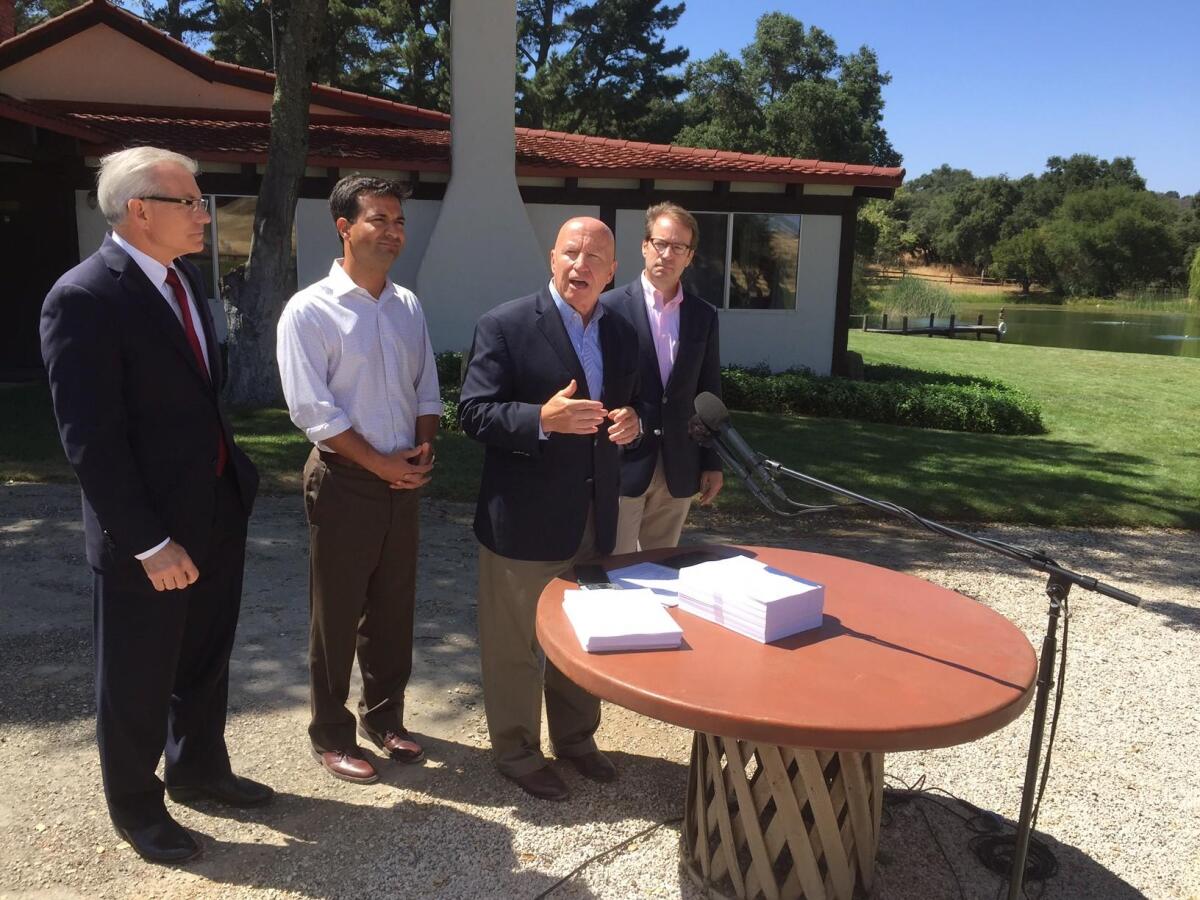
Hoping up to conjure up the same momentum that led to a 1986 tax overhaul under President Reagan, Republican leaders on the House Ways and Means Committee traveled to the Reagan Ranch on Wednesday to pitch an equally ambitious tax plan.
They were thousands of miles from Washington, but the congressmen couldn’t avoid commenting on President Trump’s remarks about the deadly violence at a white nationalist rally in Charlottesville, Va., last weekend.
They were peppered with questions from reporters about the incident, and asked if they remained confident in the Republican president.
One congressman said Trump’s latest controversy was distracting for the Republican agenda, including tax reform. But House Ways and Means Committee Chairman Kevin Brady of Texas said he believes the tax overhaul will stay on track, despite the distractions in the White House.
The 1986 legislation was a bipartisan effort hammered out by Reagan and a Senate controlled by Republicans and a House controlled by the Democrats. After Reagan took office in 1981, he won a 25% cut in personal income taxes and big tax breaks for businesses. The cuts were a catalyst for the tax reform package that passed five years later.
The proposals outlined Wednesday, however, are purely a Republican effort, with negotiations between Trump and GOP leaders in the House and Senate.
Brady promised to invite Democrats to the table, saying they have lots of good ideas and have just as much interest in creating jobs and keeping U.S. companies from moving overseas. But there is little evidence of bipartisan cooperation on the tax plan thus far in Washington.
“Whether you are a Democrat or a Republican, if you’re serious about delivering to pro-growth tax reform to the American people this year, we’re serious about working with you,” Brady said.
Brady was joined by three other GOP committee members at Reagan’s rustic former home, known as Rancho del Cielo and the Western White House, nestled in the Santa Ynez Mountains just north of Santa Barbara.
Their speeches, delivered not far from the stone front porch the former president built himself, were thin on specifics and thick with praise about Reagan’s years as America’s 40th president.
The staging of the news conference was planned to mimic the scene when Reagan signed legislation enacting the tax cuts in 1981, which he did at a table in front of the ranch home. The congressmen on Wednesday stood behind a replica of the table used by Reagan, complete with a stack of papers resembling a tax bill piled on top.
“The Reagan reforms were all about the American people, about workers and middle-class families and Main Street businesses. It was focused on fairness. Closing special interest loopholes,” Brady said. “I think President Reagan would be pretty disappointed with the tax code we have today. Fairness has been replaced with favoritism for Washington special interests.”
Brady indicated that the tax overhaul, which has yet to materialize in an actual bill, would “continue to reward homeownership,” a possible indication that some form of the mortgage tax deduction would remain in place.
He also said there is support to reduce taxes even if it means a short-term increase in the national deficit, as long as the cuts stoke the U.S. economy and job creation.
Brady condemned those behind the deadly mayhem in Charlottesville last weekend, but did not address Trump’s comments suggesting an equivalence between those protesting the white supremacists and the white supremacists responsible for the violence.
He said he doubts that this and other controversies surrounding the Trump administration will derail efforts to pass the tax overhaul this year.
But Ways and Means Committee member Rep. Carlos Curbelo (R-Fla.) was more pointed in his words about the president. He said that it’s crucial for Trump to lead the effort to overhaul the tax system, and that it and other policy work in Washington is endangered by his actions.
“It’s horrific to put those protesting hate and those promoting hate on the same level,” Curbelo said. “Yes, it’s an unneeded distraction…. I hope he’ll stop. I’m not counting on it.”
Ross Johnson, a longtime California lawmaker and ethics agency chairman, dies at 77
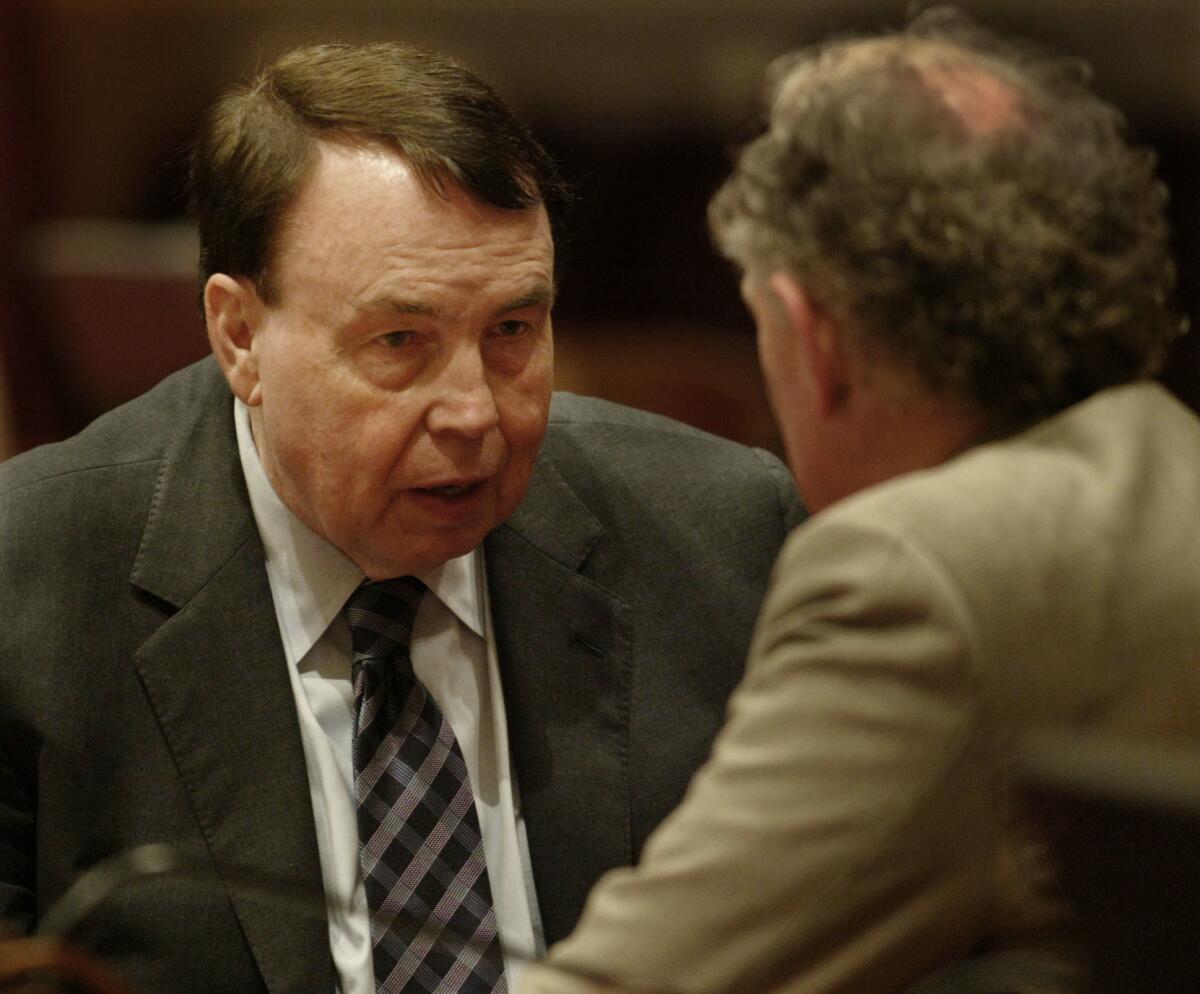
Ross Johnson, a former Republican legislative leader from Orange County who later served as chairman of the state ethics panel, died Wednesday in Sacramento after a fight with cancer. He was 77.
California Republican Party Chairman Jim Brulte said Johnson was a “principled conservative and a man of great integrity,” who also served as one of Brulte’s mentors when he was elected to the Assembly.
“While Ross had the courage of his convictions, he was always willing to listen to opposing points of view,” Brulte said in a statement. “He never took political disagreements personally; and was admired, respected, and loved by his colleagues on both sides of the aisle. Our prayers are with his wife Diane and his children as they grieve their loss.”
Johnson represented Orange County in the California Legislature for 26 years, first in the state Assembly from 1978 to 1995 and then in the state Senate from 1995 to 2004, while living in Irvine.
He was the first person to serve as a party leader in both the California Senate and Assembly, and authored legislation to improve campaign finance limits and disclosure. A member of the State Bar of California, he also authored a ballot measure in 1988 that put new limits on campaign contributions.
Republican Gov. Arnold Schwarzenegger called Johnson “a great advocate of political reform in California politics” when he appointed him in 2007 to be chairman of the state Fair Political Practices Commission, which oversees ethics and campaign finance laws. Johnson oversaw the adoption of policies to make political finances more transparent before he resigned in 2010 for health reasons.
He said at the time that he saw his job as “working to help ensure fair elections.”
Susie Swatt, a former legislative aide to Johnson, said he was “extremely principled,” and worked hard to improve his district, with accomplishments including the creation of the Chino Hills State Park.
Johnson, who moved to Sacramento after leaving office, is survived by his wife, Diane, daughters Susan and Molly, and seven grandchildren.
Hoping to talk about infrastructure, Minority Leader Nancy Pelosi is pressed to address Trump’s Charlottesville comments

House Democratic Leader Nancy Pelosi comments on Trump’s Charlottesville statements. (Video by Al Seib / Los Angeles Times)
On Wednesday morning, House Minority Leader Nancy Pelosi (D-San Francisco) had hoped to focus on Los Angeles County’s transportation needs as it prepares for the 2028 Olympics.
So in a discussion that included Rep. Jimmy Gomez (D-Los Angeles) and L.A. Mayor Eric Garcetti, Pelosi and local leaders gathered at Union Station to discuss the need for federal money to complete major road, highway, bridge and transit projects, and highlighted the fact that Trump has not unveiled his promised $1-trillion infrastructure investment plan.
But afterward, Pelosi was pressed by reporters mainly to respond to the president’s assertion that “there is blame on both sides” for the weekend violence that erupted during white nationalist protests in Charlottesville, Va.
“I was hoping we could focus first of all on infrastructure because that’s what we’re here to talk about,” the San Francisco resident said. “We haven’t seen an [infrastructure] initiative yet. We even thought we might see one yesterday, but we didn’t,” she continued, referring to Trump’s own planned remarks on infrastructure that veered off course Tuesday when he repeated explosive comments about the violent protests in Virginia.
“What we saw yesterday was the president clearly demonstrating that he doesn’t know right from wrong, true from false, American patriotism from white nationalism,” Pelosi said. “Very sad for our country.”
However, she added that she has not promoted the idea of impeaching Trump, and that not knowing right from wrong “is not necessarily grounds for impeachment.” Some Democratic representatives have called for impeachment, and on Tuesday night, Pelosi’s fellow Bay Area representative, Jackie Speier, called for Trump to be removed under the 25th Amendment.
“If he crosses the line in terms of obeying the law, then we’ll see,” Pelosi said.
Pelosi also commented on the fight over whether a rally organized by a conservative group that has featured white nationalist speakers in the past should go forward as scheduled in San Francisco on Aug. 26.
The minority leader, who has asked the National Park Service to reconsider a permit for the protest, said that Trump had “ginned up” far-right groups, including white nationalists, and that the United States is facing a “moment of truth” in terms of what is deemed acceptable public expression.
“The 1st Amendment is very important to us. ... It does not give you a constitutional right to yell, ‘Fire!’ in a crowded theater,” she said. “They are endangering people, and they must be stopped.”
Lt. Gov. Gavin Newsom courts Central Valley voters with talk of water, single-payer healthcare at Fresno meet-and-greet
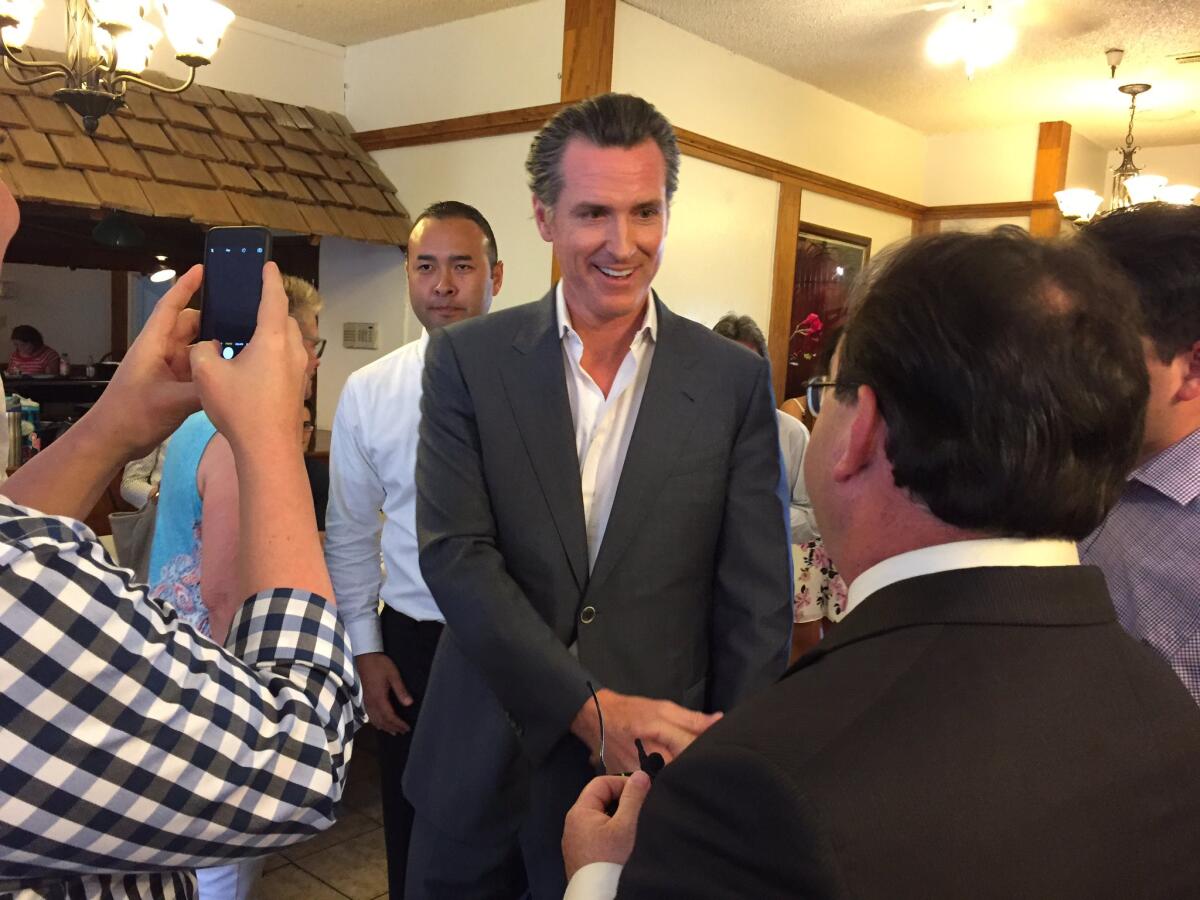
Lt. Gov. Gavin Newsom continued his swing through Central Valley for his 2018 bid for governor Tuesday, courting a packed hall of supporters and the merely curious with vocal support of water storage, single-payer healthcare and California’s bullet train.
Those issues resonate in this swath of inland California, a place still limping out of the recession where voters often complain of being ignored by Sacramento politicians except at election time.
Newsom ditched his microphone in favor of pacing up and down the aisles inside Tuolumne Hall in downtown Fresno. He took questions from the about 200 people for close to 90 minutes.
Near the opening of the event, Newsom addressed the weekend’s deadly violence in Charlottesville, Va., and President Trump’s comments blaming counter-protesters as well as white supremacist groups for the mayhem.
“That kind of bigotry, that kind of hatred, people that stoke that kind of fear — these aren’t dog whistles. These are racial provocateurs,” Newsom told the crowd, eliciting applause. “They have no place in America, let alone in this state.”
Newsom also fielded questions focused on proposals to strengthen the state’s water supply and healthcare system. In both cases, Newsom’s responses fell short of solid commitments.
The lieutenant governor said he was a strong backer of the $7.5-billion water bond approved by voters in 2014, including $2.7 billion for water storage. But he did not say for certain that he would support the proposed Temperance Flat Dam on the San Joaquin River, which would directly affect Central Valley farmers, or the proposal for the Sites Reservoir in the Sacramento Valley.
Newsom reminded the audience that the dams aren’t exactly popular in the Bay Area and that other options such as underground storage may also be viable. Still, he assured the audience that he doesn’t oppose the dam projects and indicated he would support the reservoirs if approved.
On healthcare, Newsom touted the fact that, as mayor of San Francisco, he helped establish a citywide universal healthcare program that predated President Obama’s Affordable Care Act.
“I do believe in Medicare for all. I do believe that it’s inevitable in this country,” Newsom said. “Eventually we’ll have some courage federally and we’ll get there. The question is how can we complement that debate here in California.”
Newsom said he was committed to continuing the debate over whether California can launch its own single-payer healthcare system, proposed in a bill shelved in the state Legislature this year. But he cautioned that it’s a difficult issue to tackle given the enormous cost and complexities involved.
“I’d be lying to you if I [told you I] had a detailed plan,” Newsom said.
Sally Garcia, 73, a retired secretary from Clovis, said she came to Tuesday’s event with her husband, Jess, so that they would start educating themselves about the candidates running for governor. Garcia, a Democrat, left impressed.
“He seem to say the right things for the group here,” she said. “He was talking to valley people.”
Newsom’s visit to Fresno is part of a broader Central Valley campaign swing, coming after stops in Placer County and Stockton. On Wednesday he heads to Bakersfield.
Mike Evans, chairman of the Fresno County Democratic Party, said Newsom’s main Democratic rivals – former Los Angeles Mayor Antonio Villaraigosa and state Treasurer John Chiang – have also been regular visitors to the Central Valley since they launched their bids.
Seth Smith, who runs a veteran-owned medical marijuana cultivation business in Watsonville, said he liked what he saw in Newsom, but needs to hear more details on his plan to create jobs and improve education in California.
He was impressed by Newsom’s defense of so-called sanctuary cities and his vow to protect immigrants, including those who entered the country illegally.
Smith was aware, of course, that Newsom was a major supporter of the successful November ballot initiative that will legalize the recreational use of marijuana in the state.
“That’s one of the reasons I know him,” said Smith, a Navy veteran and fourth-generation farmer who grew up in Fresno. “I don’t know who else is running. So if anyone else is, they haven’t made it plain yet.”
Contradicting Trump, Rep. Kevin McCarthy says Charlottesville violence was ‘a direct consequence’ of white supremacists
House Majority Leader Kevin McCarthy of Bakersfield was among Republicans nationwide who again tried to distance themselves from President Trump, who on Tuesday blamed “both sides” for the violence that erupted in Charlottesville, Va., over the weekend when neo-Nazis and white supremacists gathered.
Multiple California Republicans, including Reps. Darrell Issa, Ken Calvert and Steve Knight, renewed statements condemning white supremacy, Nazism and hate after the president on Tuesday repeated his weekend comments that all sides were responsible for the violence.
Fearing violence, California lawmakers ask National Park Service to rescind permit for San Francisco ‘alt-right’ rally
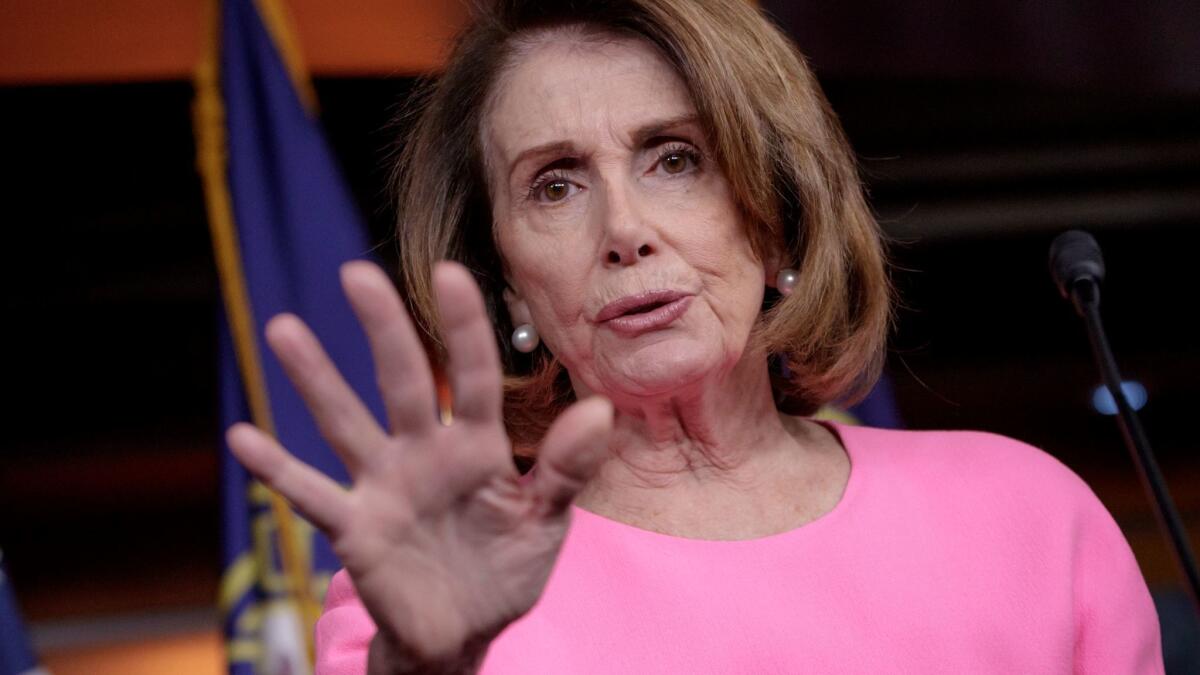
Citing concern over violent clashes at a Charlottesville rally of white nationalists last weekend, a group of California lawmakers called Tuesday for the National Park Service to rescind a permit issued for a pro-Trump rally scheduled for Aug. 26 in San Francisco.
The conservative Patriot Prayer rallies have been organized by blogger Joey Gibson. He says he condemns white supremacists. but members of the white nationalist movement have spoken at and attended the rallies.
The event is scheduled at Crissy Field, a park popular with families and tourists, wrote three San Francisco Democrats, state Sen. Scott Wiener and Assemblymen Phil Ting, and David Chiu in a letter to the service.
“Allowing a likely violent rally of White Supremacists so close to all of this is of deep concern to us,” the trio wrote. “While we believe in the right to free speech and free assembly, we believe the National Park Service does not have the capacity to safely control this situation and therefore should not be issuing a permit for this rally at Crissy Field.”
Three people died and 35 were injured in Virginia when a group of white nationalists clashed with dozens of counter-protesters.
House Democratic Leader Nancy Pelosi of San Francisco separately called Tuesday for the National Park Service to “reconsider” the permit for Crissy Field.
“San Francisco takes great pride in being a city of peace which cherishes free speech and the right to public dissent,” Pelosi said in a statement. “However, the National Park Service’s decision to permit a white supremacist rally at Crissy Field raises grave and ongoing concerns about public safety.”
Gibson railed against media outlets that referred to his rally as a racist gathering earlier Tuesday. He said the speakers at the planned San Francisco event include a black man and a transgender woman.
“The fact that [Pelosi] is calling it a white supremacist rally, it’s extremely dangerous that she’s doing that,” he said. “She’s giving people license to use violence against me.”
Pelosi also questioned whether the park service can protect the public, and asked how the decision was made to permit the rally.
“We must wonder, where is the decision to permit a white supremacist rally in a national park being made?” she said. “At the National Park Service? In the Department of the Interior? Or under guidance from the White House?”
7:55 p.m.: Updated to include comment from Joey Gibson.
This article was originally posted at 3:19 p.m.
A recall election for state Sen. Josh Newman could happen this fall after court freezes new rules

An embattled state senator could face a recall election as soon as this fall after an appeals court on Monday delayed enforcement of a law crafted by Democrats to slow down the process.
The new law was written with hopes of delaying a recall election for state Sen. Josh Newman (D-Fullerton) until next year, but his opponents have wanted a special election this year. They targeted the freshman lawmaker after his vote in favor of gas and vehicle taxes as part of a $52-billion transportation plan.
The new law, written by legislative Democrats and signed by Gov. Jerry Brown, added significant new steps to certifying a recall election. Newman’s opponents challenged the law in court last month, arguing that there is no legal justification for the new law to apply retroactively to pending recall efforts like the one against the senator.
Justice Vance W. Raye’s order issued Monday requires state elections officials to set aside the new law until the case is resolved in court. That delay would probably mean a recall election could be held in Newman’s Southern California district in November.
“We’re very pleased,” said Jon Coupal, president of the Howard Jarvis Taxpayers Assn., which is supporting the recall and filed the lawsuit against the new rules. “This was an inappropriate action by the Legislature.”
Recall backers have submitted more than 96,000 voter signatures to call a special election -- far more than the 63,593 valid signatures needed.
Democrats said Monday night that legislative action had been prompted by charges that voter signatures were being gathered through a promise to repeal the gas tax.
“It’s in the overwhelming public interest to safeguard the integrity of the recall process and to ensure that recall petitions are not being signed under false and fraudulent pretenses,” said Jonathan Underland, press secretary for Senate President Pro Tem Kevin de León (D-Los Angeles).
A spokesman for Secretary of State Alex Padilla said the court order is still being reviewed.
August 15, 9:10 a.m.: This story was updated with a quote from the Senate leader’s spokesman, who responded on behalf of Sen. Newman.
Schwarzenegger donates $100,000 to anti-hate group in aftermath of Charlottesville violence

Former California Gov. Arnold Schwarzenegger on Sunday donated $100,000 to help a Los Angeles-based group’s effort to fight hate, saying he was “horrified” by anti-Semitic and racist protests in Charlottesville, Va., over the weekend.
“While these so-called ‘white nationalists’ are lucky to live in a country that defends their right to voice their awful, incorrect, hateful opinions, the rest of us must use our voices and resources to condemn hate and teach tolerance at every opportunity,” he wrote on Facebook Sunday. “My message to them is simple: you will not win. Our voices are louder and stronger.”
Schwarzenegger announced the donation to the Simon Wiesenthal Center as President Trump was under fire for failing to quickly speak out against the racist and anti-Semitic protests that resulted in three deaths.
After two days of bipartisan criticism, Trump on Monday delivered a new statement that explicitly condemned white supremacists, Nazis and KKK members for the violence that shook the sleepy Virginia college town over the weekend.
Schwarzenegger and Trump have a long-simmering feud, but the former governor did not mention the president in his statement.
He also urged others to donate to anti-hate groups.
Rabbi Marvin Hier, founder of the Wiesenthal Center, said Schwarzenegger had been a supporter of the organization for more than 30 years.
“We’ve never been prouder of his leadership than when we saw his tweet last night challenging everyone to do more in the fight against hate,” Hier said.
Nancy Pelosi urges Trump to fire Stephen Bannon following white supremacist rally in Virgina
Houes Minority Leader Nancy Pelosi of San Francisco has called White House strategist Stephen K. Bannon a “white supremacist” previously.
Lawmaker says idea of early prison release for former Sen. Ron Calderon is an ‘insult’ to the public
A judge’s recommendation that former state Sen. Ronald Calderon be considered for early release from prison over a corruption case drew criticism Monday from one state legislator, while a federal prosecutor downplayed the action.
The possibility of early release for Calderon, sentenced in a bribery case, drew outrage from Assemblywoman Cristina Garcia (D-Bell Gardens), whose district overlapped with Calderon’s.
“Former California Sen. Ron Calderon needs to be kept in prison,” she said in a statement. “It’s bad enough that he walked away with a mere 42 month sentence when his crimes dictated 396 years. Granting his request for early release — after only serving seven months in a white-collar facility — is an added insult to my community and a void of justice in our democracy.”
Assistant U.S. Atty. Mack E. Jenkins, who leads the public corruption division of the U.S. Attorney’s Office in Los Angeles, called the defense motion that led to the judge’s recommendation “redundant.” He explained that the Bureau of Prisons would routinely evaluate an inmate for transfer to a halfway house before the last year of his sentence.
“Mr. Calderon will not receive any preferential treatment,” he said.
Federal judge recommends former state Sen. Ron Calderon get early release from prison
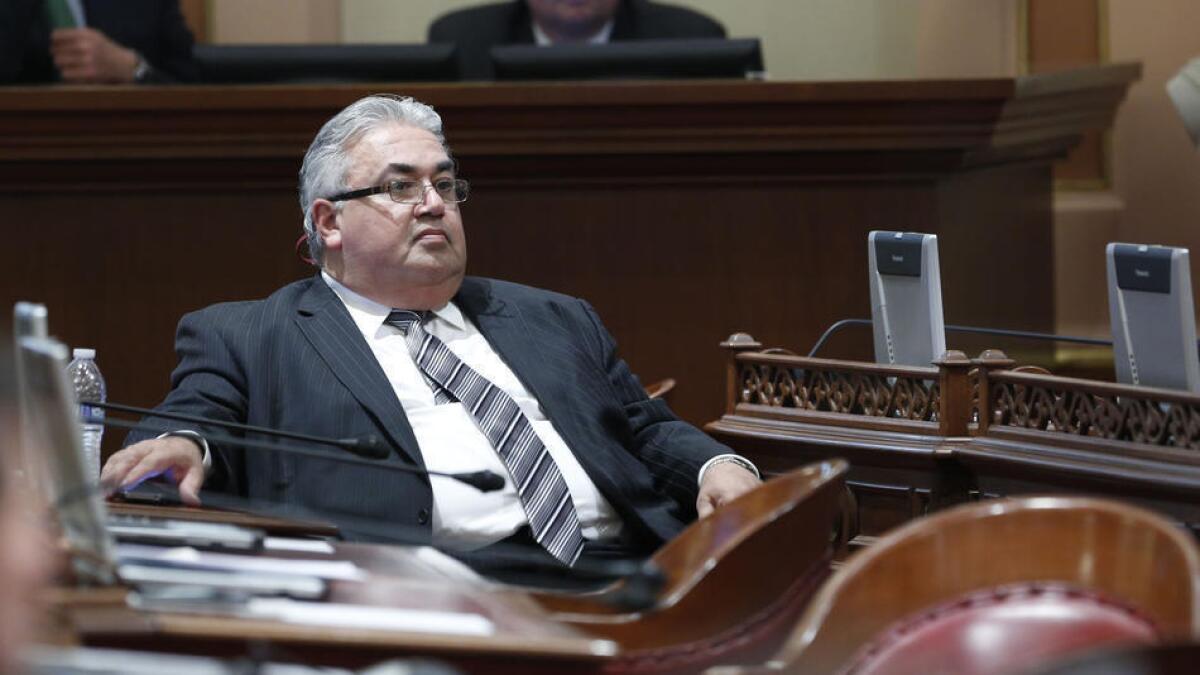
A federal judge recommended Monday that former state Sen. Ron Calderon, who is in federal prison on corruption charges, be considered for early release.
The recommendation is for a transfer to a community correctional facility and then home confinement.
In January, Calderon began a 42-month prison sentence after pleading guilty to accepting tens of thousands of dollars in bribes from undercover FBI agents and a hospital executive in return for official favors.
U.S. District Court Judge Christina A. Snyder on Monday agreed to recommend to the United States Bureau of Prisons that Calderon be considered for early release from prison as soon as next January under the Second Chance Act, which aims to ease reentry into the community for some felons.
“Mr. Calderon understands that such recommendation by Your Honor would not be binding on the BOP, but that the BOP would give it serious consideration,” wrote Mark Geragos, an attorney for Calderon, in a letter to the judge.
The law allows a move from prison to a community halfway house up to 12 months before a sentence is over. Calderon could then serve the last six months in home confinement, depending on what the bureau decides.
Snyder’s order says she granted the request from Calderon, a 59-year-old Democrat from Montebello. He is serving his sentence in the Federal Correctional Institution, Sheridan, a medium security prison in Oregon. He cited health problems in asking for a lesser sentence.
13 candidates — but no Republicans — file for race to replace Jimmy Gomez in Assembly
The candidate filing deadline in the race to replace former Assemblyman Jimmy Gomez in the 51st Assembly District was Thursday.
Gomez vacated the seat last month after being elected to Congress to replace Xavier Becerra, who became California’s attorney general.
California and San Francisco suing Trump administration over ‘sanctuary cities’ funding fight
California and San Francisco officials said Monday they are suing the Trump administration, alleging federal threats to withhold funding from “sanctuary cities” are unconstitutional and violate the rights of residents.
Atty. Gen. Xavier Becerra said the state and local jurisdictions in California this year received $28 million in law enforcement grants from the federal government, money that could be withheld in the future. He said President Trump’s push to end the funding is “bullying.”
“It’s a low blow to our men and women who wear the badge, for the federal government to threaten their crime-fighting resources in order to force them to do the work of the federal government when it comes to immigration enforcement,” the attorney general said at a San Francisco news conference.
A state lawsuit was filed. It will be coordinated with a similar lawsuit already filed by the city of San Francisco, Becerra said.
The lawsuits challenge as unlawful new conditions that would require cities to provide federal immigration officials access to local detention facilities to interrogate any immigrants suspected of being in the country illegally.
The lawsuits also challenge a condition that cities provide the Department of Homeland Security with 48 hours’ notice before releasing an individual identified by immigration officials.
“This is a back-door attempt to coerce states and local governments to carry out federal immigration enforcement,” said San Francisco City Atty. Dennis Herrera.
“Our police and deputies are focused on fighting crime, not breaking up hardworking families.”
The lawsuit says the conditions “do not appear in any federal statute, and they do not reflect the will of Congress in appropriating funds.”
“To the contrary, the new conditions are simply the latest attempt by the Trump Administration to coerce state and local jurisdictions into carrying out the federal government’s immigration enforcement priorities,” reads the lawsuit, which was filed against U.S. Atty. Gen. Jeff Sessions and the U.S. Department of Justice.
Federal law enforcement grants to the city would be jeopardized if it does not certify that its laws comply with federal requirements.
UPDATE
11:10 a.m.: This article was updated throughout with additional details from the news conference featuring Atty. Gen. Xavier Becerra and San Francisco City Atty. Dennis Herrera.
This article was originally published at 10:10 a.m.
Watch: California’s attorney general joins San Francisco in suing to block ‘sanctuary city’ punishment
Rep. Ted Lieu endorses state Treasurer John Chiang for California governor
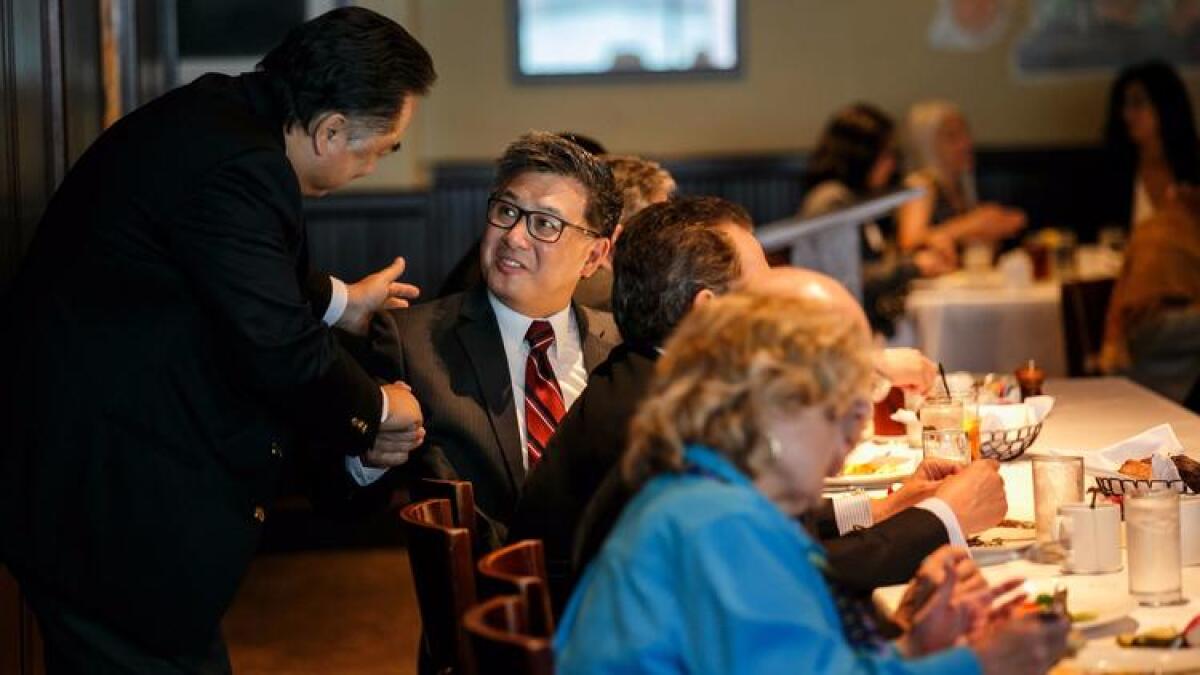
Rep. Ted Lieu (D-Torrance) endorsed John Chiang in the governor’s race on Sunday.
“John has a strong record of standing up for the common person, taking a different road and getting things done,” Lieu said in statement. “We need a candidate we can trust, one we can relate to, one with the courage to hold others accountable. The future is uncertain but we have an opportunity to leave them in capable hands. We need new leadership that doesn’t add to the rhetoric but instead is resistant to policies that take us backwards in the progress we have made in this country.”
Lieu and Chiang, the state treasurer, spent the day campaigning in Southern California. The duo hosted a Facebook Live event in the morning, greeted voters on the Santa Monica Pier and attended a barbecue with state Democratic Party delegates in Westwood Park.
Lieu has gained prominence among California Democrats because of his vocal opposition to Trump.
Chiang is among the top Democrats in the race, but lags behind front-runner Gavin Newsom in fundraising and the polls, in part because he is largely unknown to voters.
While wooing California tea party, GOP candidates for governor pledge full support for President Trump
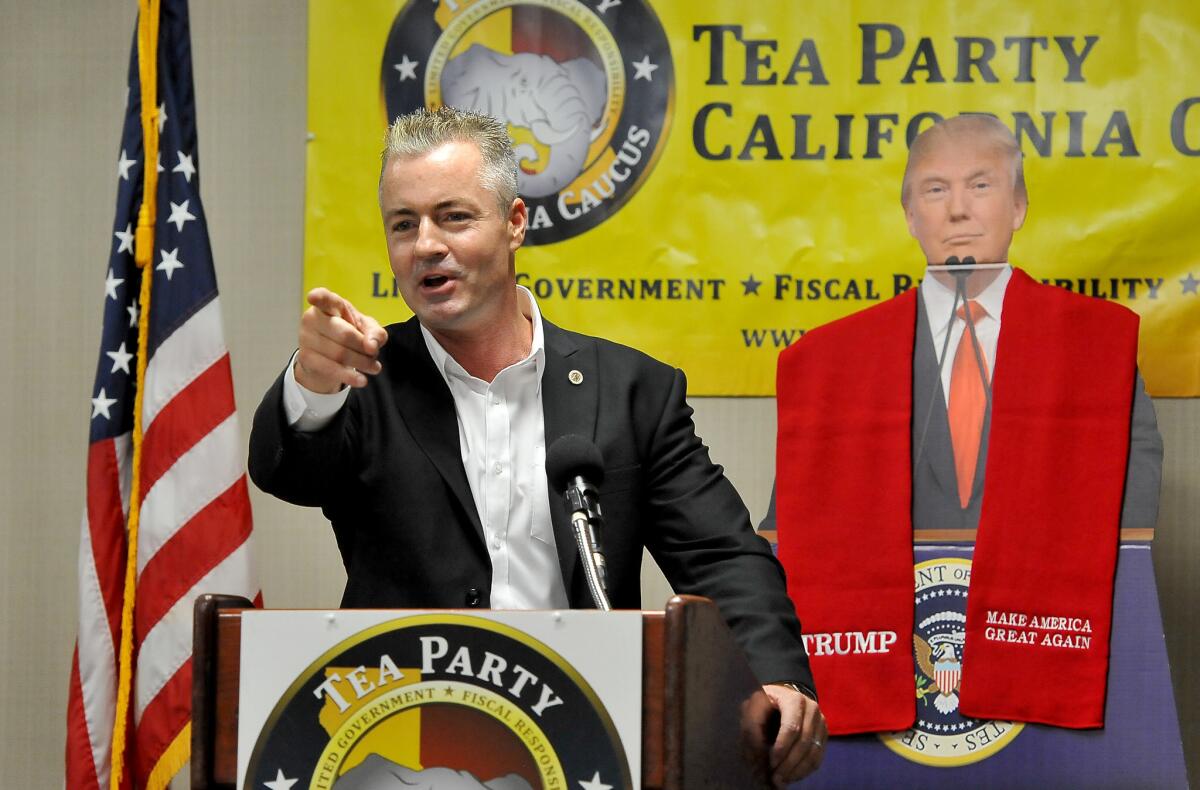
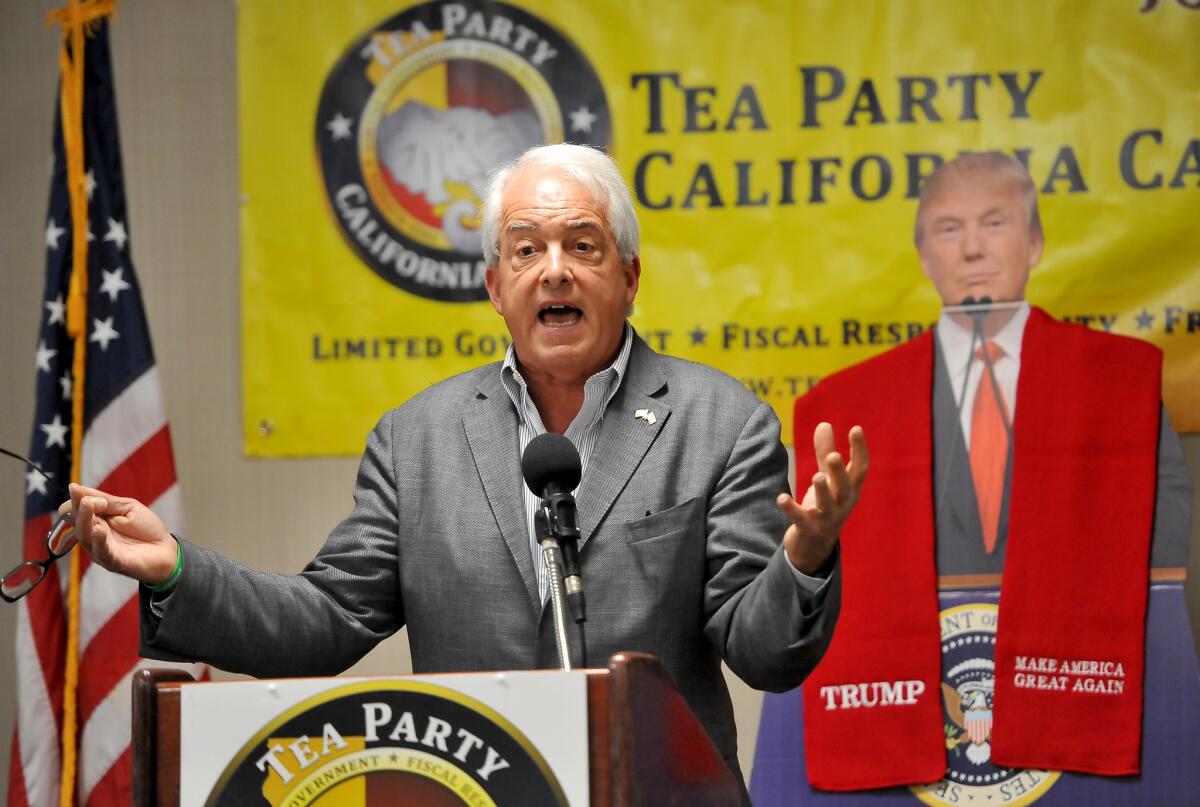
The two most prominent Republicans running for California governor swung through Fresno on Saturday, doing their best to woo riled-up tea party activists who spent two days there bashing the GOP establishment.
Both Huntington Beach Assemblyman Travis Allen and Rancho Santa Fe businessman John Cox professed their support and admiration for President Trump, a critical test if they hope to have any shot of winning over members of the conservative movement.
The candidates were speakers at the final day of the Tea Party California Caucus conference this weekend, an event that drew upward of 150 conservatives from throughout the state.
Both got some sideways glances when they talked about their work for moderate Republicans. Allen campaigned for GOP presidential candidate Mitt Romney in 2012. Cox is a member of the New Majority, a group founded primarily by Orange County executives to nudge the state party away from socially conservative issues.
“I’m not sure who I’ll support for governor,” said Mylinda Mason of Modesto, one of the tea party activists at the meeting.
But Cox and Allen were warmly received overall, especially with their vows to change how Sacramento works and help the GOP rise to power again in left-leaning California.
Still, when Cox and Allen were asked by the Los Angeles Times if they consider themselves tea party members, both pretty much sidestepped the question.
“I just consider myself a common-sense Californian,” Allen said.
Cox said he is campaigning across the spectrum of the Republican Party, including gay rights Log Cabin Republicans and the moderate New Majority.
“I’m out to unify all Republicans,” Cox said. “I am at heart a fiscal conservative.”
Cox and Allen were invited to the event with the proviso that they would speak only about the ballot initiatives they are sponsoring, though each spent time working the room and worked in ample plugs for their gubernatorial bids.
Allen is pushing for a ballot initiative to repeal the recently approved gas tax to fund statewide road repairs.
Cox is bankrolling a measure to overhaul Sacramento by establishing a “neighborhood legislature” that would add thousands of new “citizen legislators” to the 80 Assembly members and 40 senators who make up the Legislature.
Refusing to be left out, little-known candidate for governor Stasyi Barth of Lake Elsinore walked to the front of the conference hall after Cox and Allen were gone.
Barth yelled above the din as members starting drifting out, telling everyone that she has been a proud, longtime tea party member and was a Trump supporter from the beginning.
Rep. Maxine Waters mocked at California tea party conference

A fair number of politicians faced withering criticism and ridicule at the Tea Party California Caucus meeting in Fresno this weekend, including Gov. Jerry Brown, GOP Assembly Leader Chad Mayes and especially Los Angeles Democrat Rep. Maxine Waters.
An unflattering picture of Waters, obviously doctored, was flashed on a screen just after Rep. Tom McClintock (R-Elk Grove) delivered the keynote address Friday evening.
Woody Woodrum of the conservative activist group California Screaming Eagles told the crowd that it was Waters’ reaction when she heard McClintock was coming to speak to California tea party members, drawing a big laugh in the room.
“It was just a joke,” Woodrum said later.
Woodrum said it wasn’t meant to be mean-spirited. He said the photo has been floating around the Internet.
Waters has been one of Republican President Trump’s harshest and most vocal critics in Washington, making the 78-year-old congresswoman popular among young progressives.
The attention began when Waters refused to attend Trump’s presidential inauguration. She also skipped his first speech to Congress, telling the Los Angeles Times, “I don’t honor this president. I don’t respect this president. And I’m not joyful in the presence of this president.”
Waters, in her 14th term, also has not been a fan of the tea party, saying in 2011 that the members could go “straight to hell.”
Waters’ spokesperson has not yet responded to a requet for comment.
UPDATE
6:28 p.m.: Updated with information that Waters’ spokesperson has not yet responded.
This post was originally published at 9:28 a.m.
California tea party conservatives take shots at GOP establishment, sounding downright progressive
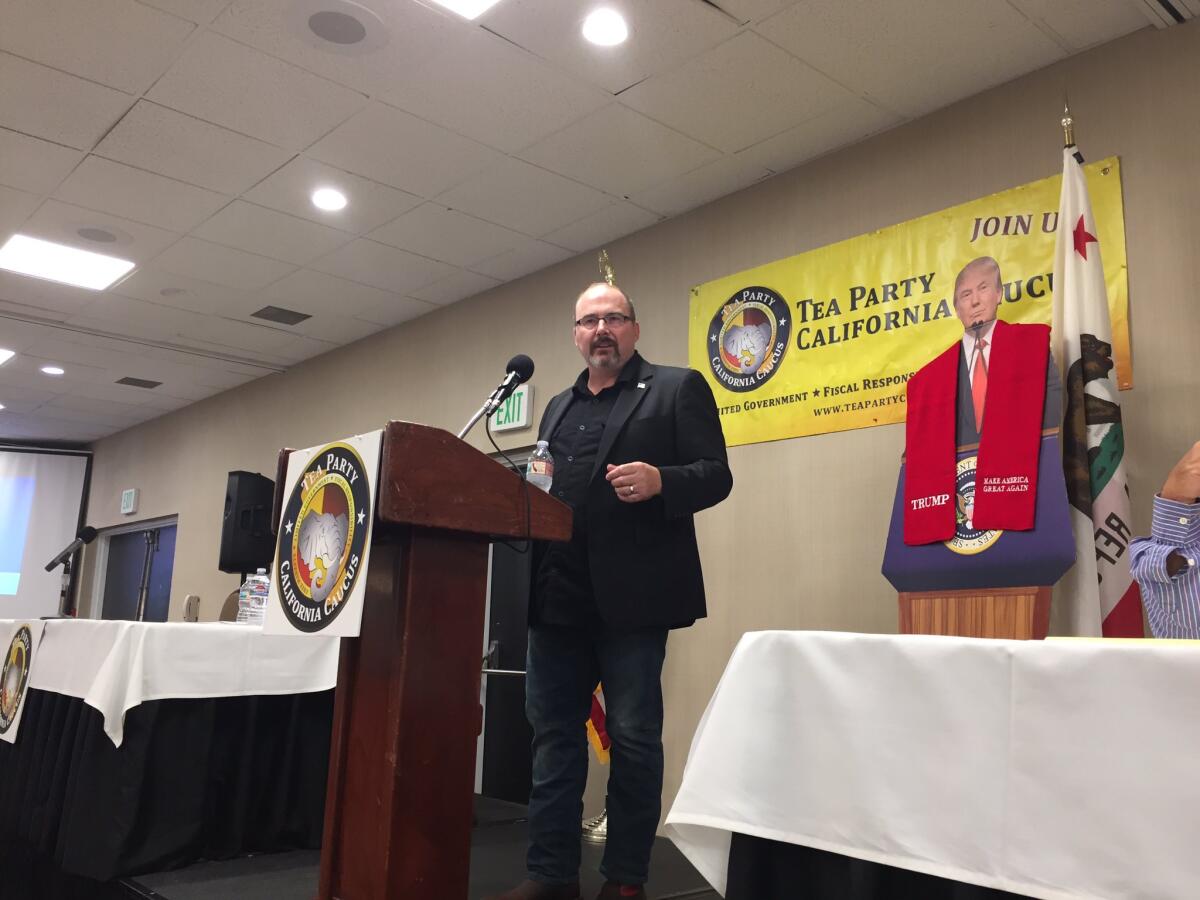
Democratic Gov. Jerry Brown took some lumps, but some of the biggest targets of the California tea party conservatives gathered in Fresno on Friday were members of the GOP.
At the top of the list was Assembly Republican leader Chad Mayes of Yucca Valley. Tea party speakers at the statewide meeting called for his ouster because of Mayes’ support for California’s climate change legislation extension. But he was not alone.
California Republican Party Chairman Jim Brulte was accused of allowing the party to be overrun by “big money,” namely from Republican mega-donor and businessman Charles Munger.
“I know how frustrated we all are. I know how terrible our Republican Party is here. And it is. It’s a nightmare in California,” said Randall Jordan, the chairman of the Tea Party California Caucus and chairman of the San Luis Obispo County GOP central committee. “It’s a good ol’ boy club. It’s run by big money. It’s basically … whoever holds the pocketbook.”
The attacks on California’s Republican establishment sounded quite similar to escalating attacks on state Democratic Party leaders by that party’s activist wing over the past few months.
Assembly Speaker Anthony Rendon sustained withering criticism, led by the California Nurses Assoc., after he delayed a vote on a proposed state single-payer healthcare system.
The California Democratic Party convention in May was overrun by hecklers, marches and recriminations from liberal activists who said the party had lost its way and become too moderate.
The tension was fed by lingering resentment from the Democratic presidential primary between Bernie Sanders and Hillary Clinton, and angst over President Trump’s actions since his term began.
But Trump’s election was a cause for celebration among California tea party members. Jordan said he and his wife cried tears of joy on election night. Instead, tea party discontentment in California seems to stem from the party’s weakness in the state, and the willingness of the state’s Republican leaders to cooperate with Democrats or ignore the ideals of fiscal discipline and limited government.
Former Assemblyman Tim Donnelly, who lost a bid for governor in 2014, called California’s GOP leadership “establishment hacks” and urged tea party members to go their own way. He said trying to change the party from within is not working.
“We don’t have a Republican Party anymore,” he said during an address to the group. “We didn’t win the first revolution by standing on the battlefield with the red coats.”
Donnelly wrapped up with a plea. He asked all Republicans in California to do everything they can to help unseat Mayes in the June primary and replace him with a tea party conservative.
Former GOP assemblyman to California tea party members: ‘We don’t have a Republican Party anymore’
California sues EPA for documents to determine whether Administrator Scott Pruitt has conflict of interest
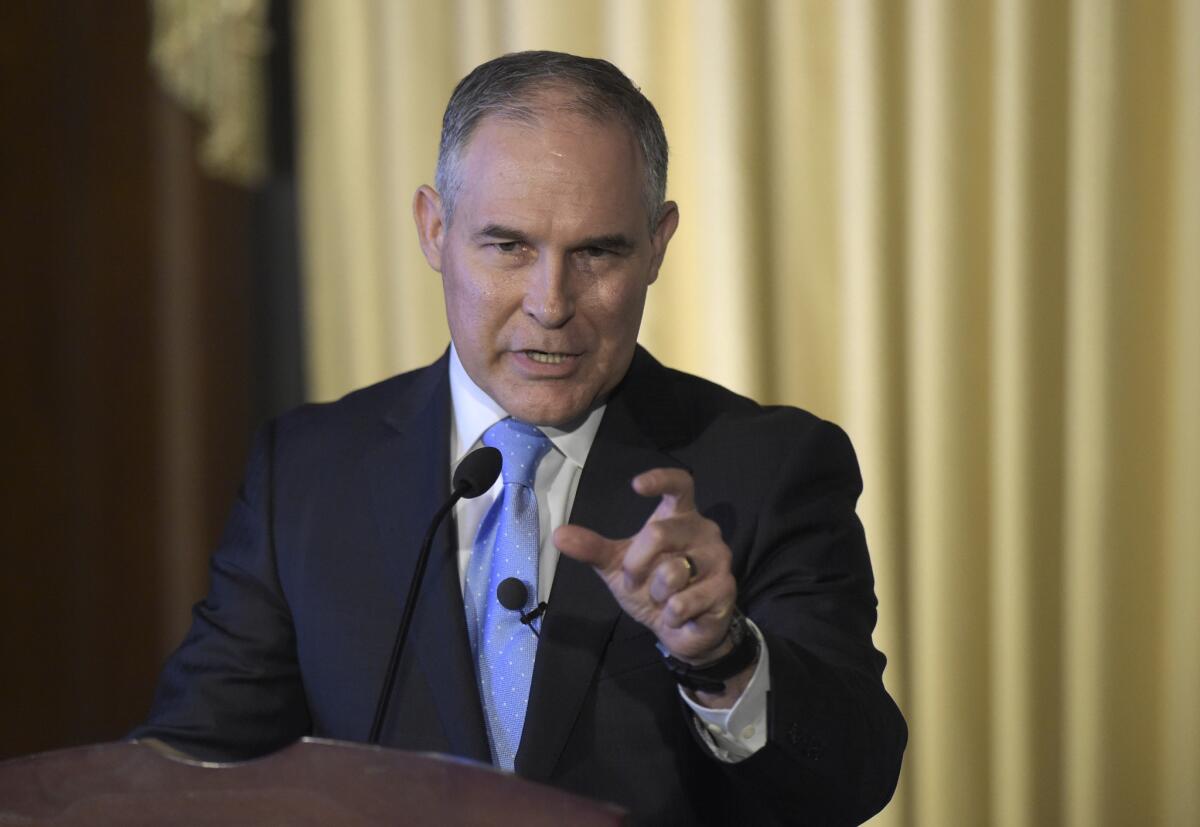
California Atty. Gen. Xavier Becerra on Friday filed a lawsuit against the U.S. Environmental Protection Agency, alleging it failed to comply with a request for documents that might indicate whether agency Administrator Scott Pruitt has a conflict of interest.
The lawsuit in federal court in Washington seeks an order to force the EPA to turn over the documents.
Pruitt has stated that he would recuse himself from some cases in which he had sued the EPA while serving as Oklahoma’s attorney general, but a memo released by the agency indicated that Pruitt might not abstain from EPA rulemaking on the same issues that are the subject of his litigation.
Becerra used the Freedom of Information Act to request documents involving the issues on which potential conflicts could exist, but said the papers have not been provided.
“Administrator Pruitt and the Trump Administration are not above the law,” Becerra said in a statement. “The public has a right to know whether Administrator Pruitt and the EPA have complied with federal ethics laws.”
The agency recognizes Freedom of Information Act as an important tool for the public to find out what is going on inside the government, and its staff is working “as quickly as possible” to respond to the many public requests for documents they have received, said EPA spokeswoman Liz Bowman.
She said the staff has twice told Becerra’s office that they are working on the expansive request.
“It’s unfortunate that California is suing the Agency, draining resources that could be better spent protecting human health and the environment — rather than working with EPA’s career staff, as they can gather all the information requested,” Bowman said.
Becerra said a close examination of Pruitt is justified, “now that he has taken a direct role in initiating review of numerous EPA regulations he sought to undo while serving as Oklahoma’s Attorney General for six years.”
3:10 pm This article was updated to include a response from EPA spokeswoman Liz Bowman.
This article was originally published at 1:21 p.m.
The California Legislature’s big housing deal isn’t going to put much of a dent in affordability problems
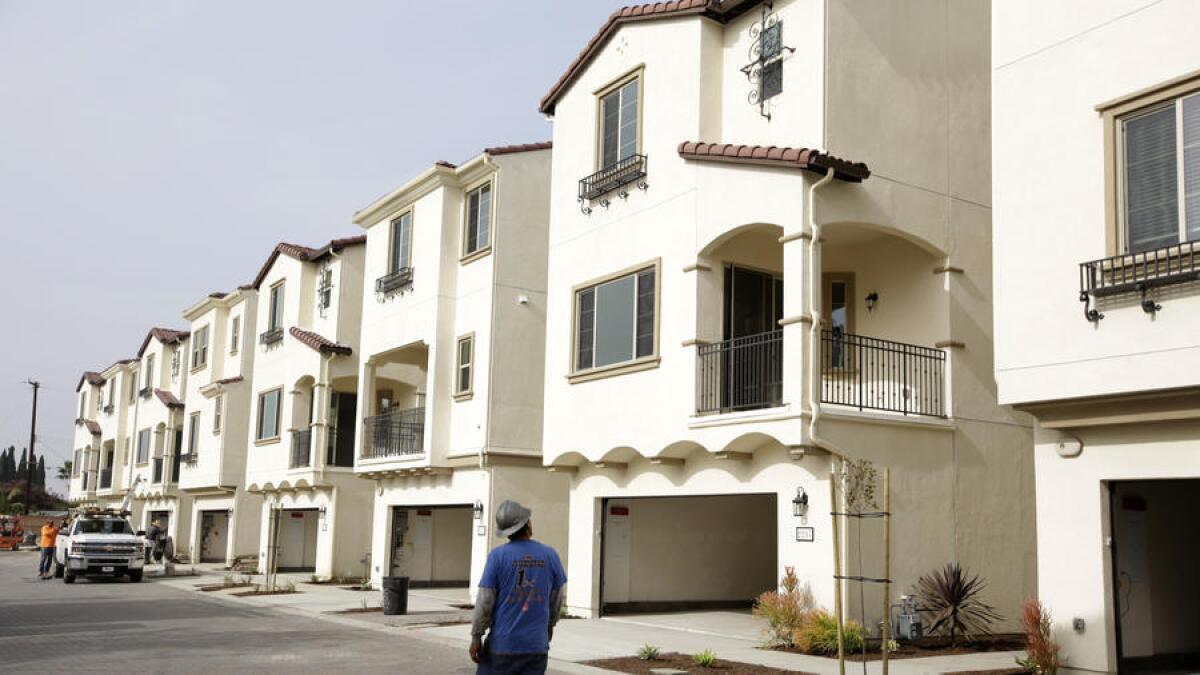
When lawmakers return from their summer recess later this month, at the top of their agenda will be the state’s housing affordability problems.
But the marquee housing measures currently under debate at the Capitol won’t move the needle much, according to analyses from state officials and housing advocates.
Even if those bills pass, the state will need to find another $10 billion a year to finance housing for its neediest residents. Also, developers would need to build tens of thousands of additional homes annually just to keep pace with projected population growth.
A new ad opposing California’s Rep. Jeff Denham has nothing to do with Trump
For many California Democrats hoping to defeat Republican incumbents in the House next year, the tone is shaping up to be pretty anti-President Trump, with some early ads tying GOP members to the president.
But Fight Back California, a political action committee headed by former congresswoman and Obama administration official Ellen Tauscher, is using a different tactic in its first ad against Rep. Jeff Denham (R-Turlock), one of seven GOP members the group is hoping to defeat.
The ad, titled “Jeff Denham Sold Us Out,” skewers the four-term Republican for his vote in favor of a measure that would loosen restrictions on the banking industry. The measure, known as the Financial Choice Act of 2017, would repeal key provisions of the Dodd-Frank banking reforms. It was passed along party lines in the House but is awaiting action in the Senate.
Denham’s Central Valley district was one of the hardest hit in the mortgage foreclosure crisis.
In a statement, Denham campaign strategist Dave Gilliard called the ad “false and misleading” and said that it “will not fool voters in the 10th district, who know Jeff Denham shares their values.”
Unlike many early ads being released against GOP incumbents, the ad doesn’t show or mention Trump. Katie Merrill, a political consultant who’s serving as Fight Back California’s strategist, said that’s deliberate.
“We’ve done very in-depth research into [Denham’s district] and what voters care about there are local issues,” Merrill said. “They’re very worried about the economy and jobs and water and crime. ... They’re not interested in Russia.”
Merrill said the video is part of a “significant” digital ad buy that includes other online ads, but did not disclose how much the group is spending. Fight Back California says it plans to spend $10 million in Republican-held districts, working out to about $1.4 million in each of the seven on which it’s focusing.
Other lawmakers the group hopes to help defeat are Reps. David Valadao (R-Hanford); Steve Knight (R-Palmdale); Ed Royce (R-Fullerton); Mimi Walters (R-Irvine); Dana Rohrabacher (R-Costa Mesa) and Darrell Issa (R-Vista).
Merrill said the group plans to tailor advertising and ground campaigns based on issues voters in each district care about.
Democratic candidate for House seat says on video she doesn’t want to talk about single-payer healthcare
California congressional candidate Katie Hill was sitting around a kitchen table with local activists last spring when one of the attendees asked her a question: Would she have to “soft pedal” her stance on any issues to unseat Republican Rep. Steve Knight in the 25th District?
“I shouldn’t go into the district and talk about single-payer, right? Like, that word by itself is going to be something that just immediately turns off a lot of people,” Hill told the group.
Video of the exchange, shared with the Los Angeles Times this week, shows the delicate line some Democratic candidates are walking as the national party goes after the more than 30 seats it needs to win back control of the House.
FBI seized computers and documents in investigation of Rep. Duncan Hunter’s campaign spending
FBI agents searched the office of Rep. Duncan Hunter’s campaign treasurer in February, seizing computer equipment and documents for their investigation into whether the Alpine Republican misused campaign funds.
The search warrant for Election CFO — the agency Hunter hired to ensure his campaign complied with campaign finance rules — reveals new information about the federal investigation into Hunter’s campaign spending.
The warrant, which was unsealed in March, said agents were looking for evidence showing whether Hunter’s campaign funds were used for personal reasons, whether there was a scheme to defraud a bank over video game purchases, and whether Hunter’s campaign finance reports were falsified to “impede or influence” FBI and House Ethics Committee inquiries into his use of campaign funds.
It was the more than $1,300 in video game purchases by Hunter’s campaign that first drew the attention of federal election officials and the San Diego Union-Tribune. Hunter blamed his son for the video game purchases, saying he had used the wrong credit card. Other unusual spending by Hunter’s campaign included a now-infamous airplane ride for the family rabbit and payments to nail salons, his children’s private school and a Phoenix resort.
In March, Hunter told Politico he did nothing wrong, but would not say who was responsible for the campaign expenses.
“I was not involved in any criminal action,” Hunter said. “Maybe I wasn’t attentive enough to my campaign. That’s not a crime.”
The FBI warrant also sought communications between Hunter, his wife Margaret Hunter (who had acted as his campaign manager), chief of staff Joe Kasper, former chief of staff Victoria Middleton and former scheduler and office manager Caroline DeBeikes, as well as Election CFO founder Christopher Marston and sole employee Brenda Hankins.
Attorneys for Hunter and Kasper did not immediately respond to requests for comment Wednesday morning after the unsealed warrant was discovered by Seamus Hughes of the George Washington University Program on Extremism and shared with The Times. A representative for Election CFO said Marston and Hankins are cooperating with the investigation.
Hunter has already reimbursed his campaign some $62,000 for payments of items such as oral surgery, a family trip to Italy and Disneyland gift shop purchases. And his most recent campaign finance reports show he has spent $336,664 with seven law firms this year, much of that since the House Ethics Committee announced it was stalling its investigation to avoid interfering with the FBI’s work.
Despite winning his suburban San Diego seat by nearly 27 percentage points in November, Hunter is one of nine California Republicans being targeted by Democrats in 2018, and he’s drawn more than half a dozen opponents so far, including two Republicans.
Several of them leapt to criticize Hunter on Wednesday, including Republican challenger Andrew Zelt who said on Twitter, “We need to bring Integrity back to the 50th District. We cannot stand for this!”
ALSO:
With FBI investigation looming, Rep. Duncan Hunter has spent $336,664 on lawyers
UPDATES
12:16 p.m.: This post was updated with comment from Hunter’s challengers and to note that his attorney has not responded to a request for comment.
11:28 a.m.: This post was updated with additional information about the search warrant and the investigation.
This post was originally published at 10:41 a.m.
While dialysis clinic battle brews at state Capitol, healthcare workers look to the ballot
Cracking down on clinics treating Californians with chronic kidney disease has been a top legislative priority this year for unions representing healthcare workers. Now, they’re opening a new front in their crusade against the dialysis industry: the ballot box.
Service Employees International Union-United Healthcare Workers filed two initiatives with the state attorney general on Wednesday that, if they qualify, would appear on the November 2018 ballot. The union is seeking to impose stricter rules at dialysis centers concerning staffing levels and how much they charge.
The proposals closely resemble pending bills that have thrust for-profit dialysis centers, which treat more than 63,000 Californians with end-stage renal disease, into the legislative fray. By dangling the prospect of a ballot measure as a backup plan, the union is following a well-worn path to spur legislative action.
“We see it as a two-pronged approach,” said Sean Wherley, spokesman for SEIU-UHW. “We want to be sure we have as many options available as possible.”
State and local elections officials spar with a conservative legal group over California’s ‘inactive’ voters
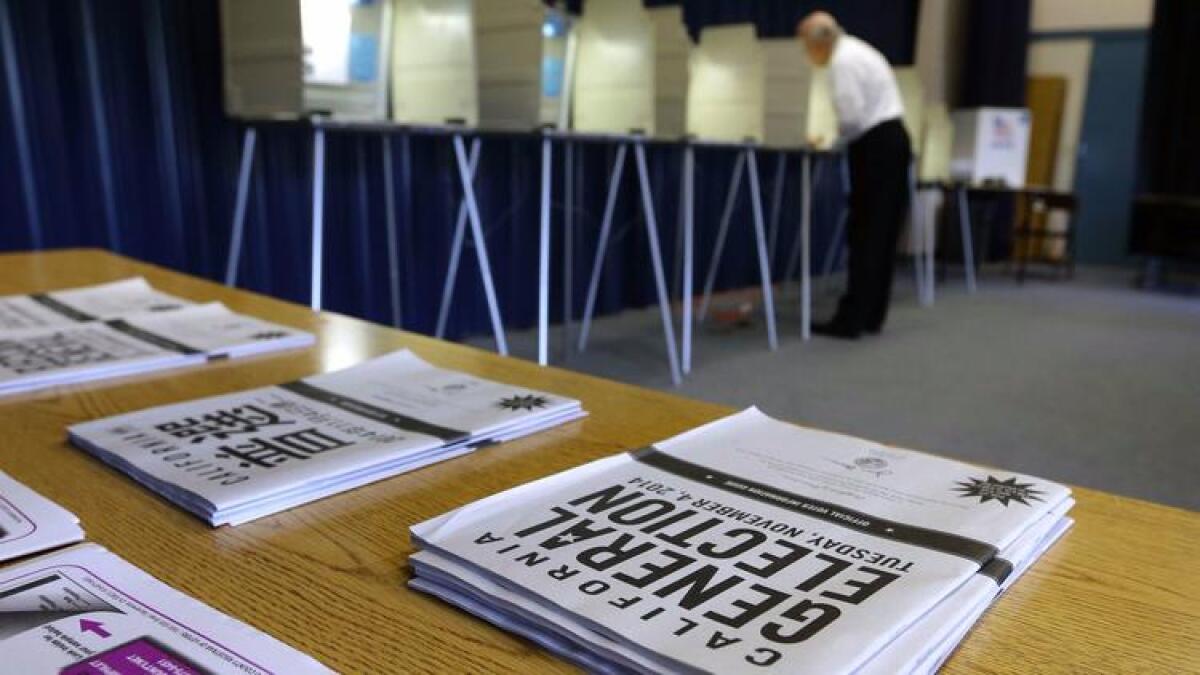
California’s top elections officer said on Tuesday he hasn’t decided whether to give a conservative legal group detailed information about the state’s voters, suggesting he’s skeptical of the motivations behind the request.
“To me, it’s clearly part of a concerted effort, a continued attack on voting rights and setting the stage for the Trump administration to roll back voting rights,” said Secretary of State Alex Padilla.
Padilla and registrars in 11 California counties received letters last week from Judicial Watch, a Washington, D.C.-based group, raising questions about the accuracy of voter registration records. The group’s attorney said the number of “inactive” voters in those counties push registration totals beyond the voting-eligible population. Elections officials dispute that analysis.
California Democratic Party calls Kimberly Ellis’ request for arbitration in election dispute a ‘Hail Mary pass’
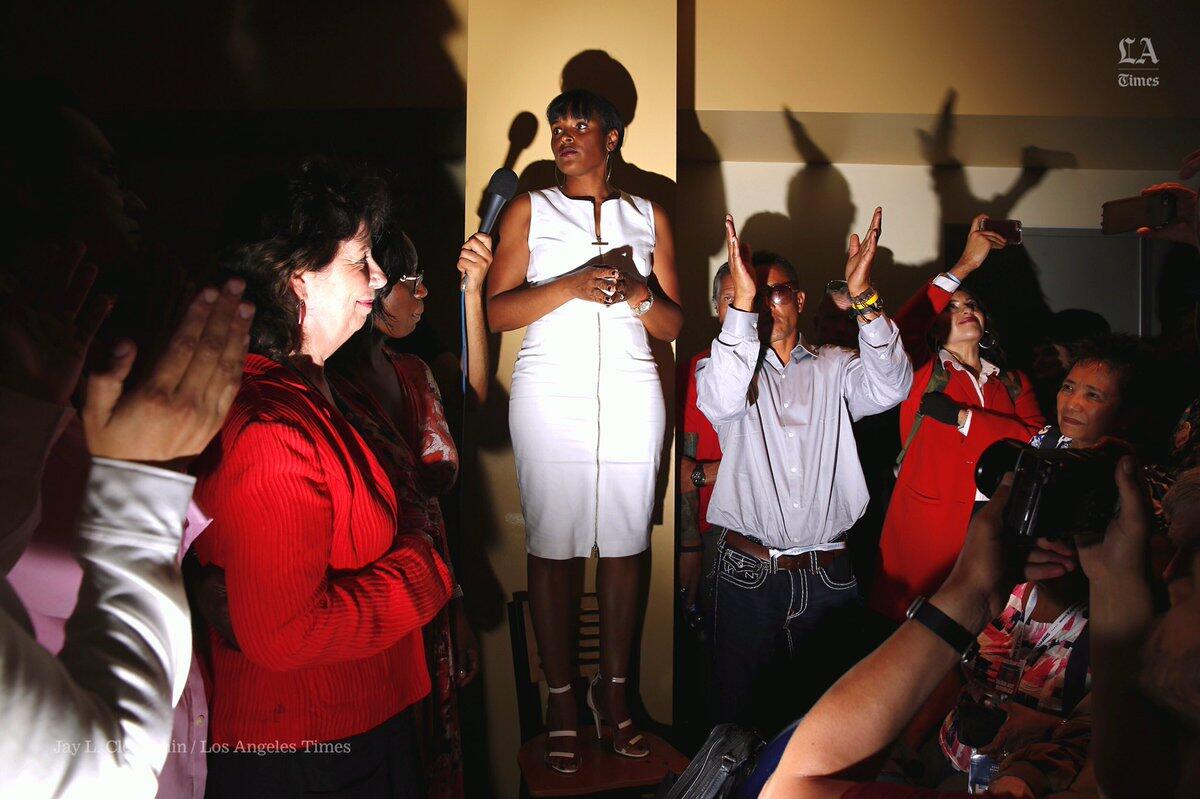
Kimberly Ellis, who has spent nearly three months contesting the results of the race for California Democratic Party chairperson, on Tuesday called on the party to enter binding arbitration to end the dispute.
“If their goal is to avoid a legal battle, here it is. The ball is in their court,” she said in a statement.
Mike Roth, a state party spokesman, said the party would follow its existing rules on electoral challenges rather than enter arbitration.
“Ms. Ellis is now deep in her own end zone and throwing a desperate Hail Mary pass in hopes of changing the outcome of an election that she lost fair and square,” Roth said.
Ellis, a progressive Bay Area organizer, narrowly lost the race to long-time party activist Eric Bauman during an election held during the state party’s annual convention in May in Sacramento. She never conceded the race, and her campaign has repeatedly and unsuccessfully contested the results, alleging ballot stuffing, bias and corruption on the part of the California Democratic Party.
Most recently, the party’s six-member compliance review commission in late July reviewed 355 ballots deemed questionable out of the roughly 3,000 cast, invalidated 47 of them, and affirmed Bauman’s victory in the contest. He won by 1.9%.
Two days later, Ellis announced her intention to appeal the decision, a move widely viewed as a precursor to a lawsuit. That appeal will be decided later this month by the party’s credentialing committee.
On Tuesday, she proposed binding arbitration as an alternate option.
“Between the public statements and back channel messages, we’re told the Party doesn’t want a lengthy and expensive legal battle. We agree — so here’s another approach,” Ellis wrote.
The bitter campaign between Bauman and Ellis exposed schisms in the state Democratic Party that echo the divide between supporters of Hillary Clinton and Bernie Sanders during the 2016 presidential primary. Some party leaders worry that the infighting will hobble the party, which dominates California politics and is at the center of the opposition to President Trump.
California sheriffs and Gov. Jerry Brown in talks over possible changes to ‘sanctuary state’ legislation
Members of the California State Sheriffs Assn. say they have been in discussions with Gov. Jerry Brown in hopes of amending a state Senate bill that seeks to keep local and state law enforcement agencies from enforcing federal immigration laws.
On a Tuesday conference call, Santa Barbara County Sheriff Bill Brown, president of the sheriffs association, said his organization wants to ensure that the legislation does not prevent local law enforcement officers from notifying federal immigration agents about the release of dangerous people from their jails.
In its current form, the bill “will provide sanctuary to criminals and endangers the public,” Brown said. “Many, many serious and violent criminals… would return to our communities and would prey on the immigrant community.”
Senate Bill 54, introduced by Senate leader Kevin de León (D-Los Angeles), would prohibit state and local law enforcement agencies from using resources to investigate, detain, report or arrest persons for the purposes of immigration enforcement.
De León has tried to address concerns from Republican lawmakers and sheriffs over the release of violent felons. The bill now allows officers to pass along information to U.S. Immigration and Customs Enforcement about inmates who have previously been deported for a violent felony, or are serving time on a misdemeanor or felony and have a prior serious or violent felony conviction.
Some law enforcement agencies, such as the Los Angeles County Sheriff’s Department, already make release dates publicly available on their websites.
But on Tuesday the sheriff’s group said not all agencies release that information. The bill’s exceptions for violent and serious felons remain too narrowly defined, they said, and would keep federal officers from picking up criminals at county jails, forcing them into neighborhoods where they could also arrest other immigrant bystanders.
Their proposed amendments would eliminate most of the provisions preventing communication between federal immigration agents and local and state officers about inmates or suspects who are detained or arrested.
The remarks come just days after Brown expressed reservations about the high-profile legislation during an interview on NBC’s “Meet the Press.” The governor said he was in discussions with De León about changes to the bill, but it was unclear what those changes will be.
GOP Rep. Doug LaMalfa calls investigation of Trump campaign’s ties to Russia a ‘bunch of crap’
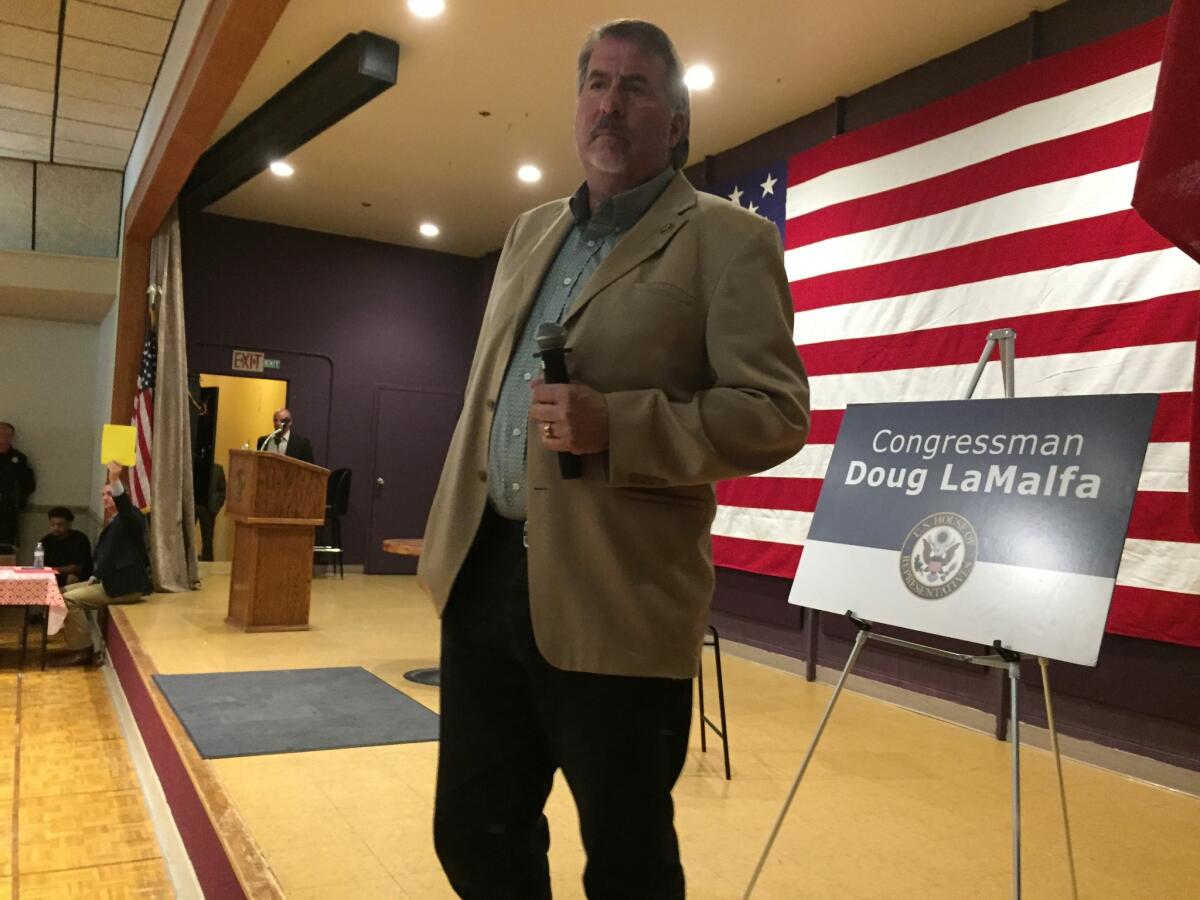
After hosting a raucous town hall in Chico on Monday, Republican Rep. Doug LaMalfa sat down with the Los Angeles Times for a brief conversation about President Trump and some of the most pressing issues in Washington.
LaMalfa, a fourth-generation rice farmer in his third term, represents one of the most Republican congressional districts in the state — a place where Trump trounced Hillary Clinton in November. The district is vast, covering California’s northwest corner along the Nevada and Oregon borders. Responses were edited for clarity and brevity.
Do you still support President Trump? Does he still have support from Republicans in Congress?
It’s going to be up and down because he’s a fiery figure. Some people are going to want to distance themselves. I just focus on what policies we’re making together. I think by and large with his appointments — to the Supreme Court and Interior secretary and other positions — those are people we can work with. [They] agree with the way I see the world and the way most of my colleagues see the world.
What about all the mayhem at the White House, including the staff changes and the president’s provocative tweets?
The press likes to cover the distractions rather than the policies. So you guys can do better on that. Every day the L.A. Times publishes another nasty about the president. You don’t report on what we’re actually doing. You report the fluff.
His tweeting is probably one of the components that the American people, in the way they were looking in who they wanted to vote for, say … here’s a guy who just comes and tells us what he’s thinking, instead of having people homogenize it. He’ll say what he thinks. People like that. If you look at my Twitter, I don’t do it the same way. But if that’s how he sees fit to do it and he can survive that way and get something done, then who am I to stop them?
What’s your reaction to allegations that the Trump campaign may have colluded with the Russians?
It’s a bunch of crap. … With all this time they’ve had to look at it, they still haven’t found anything they could put a finger on.
Will the Republican-led Congress pass a healthcare bill this year?
Guessing on Washington, D.C., is a fool’s errand.
The president said that the Affordable Care Act should be allowed to collapse. Do you agree?
That’s frustration. I think we can all say that out of frustration. But when we go back to our corner and see that American people are going to be hurt by letting ACA stand as is, that’s not a solution.
State Senate leader Kevin de León endorses labor leader to fill his seat in 2018
Los Angeles’ 2028 Olympic bid will get state financial support, Assembly leader says
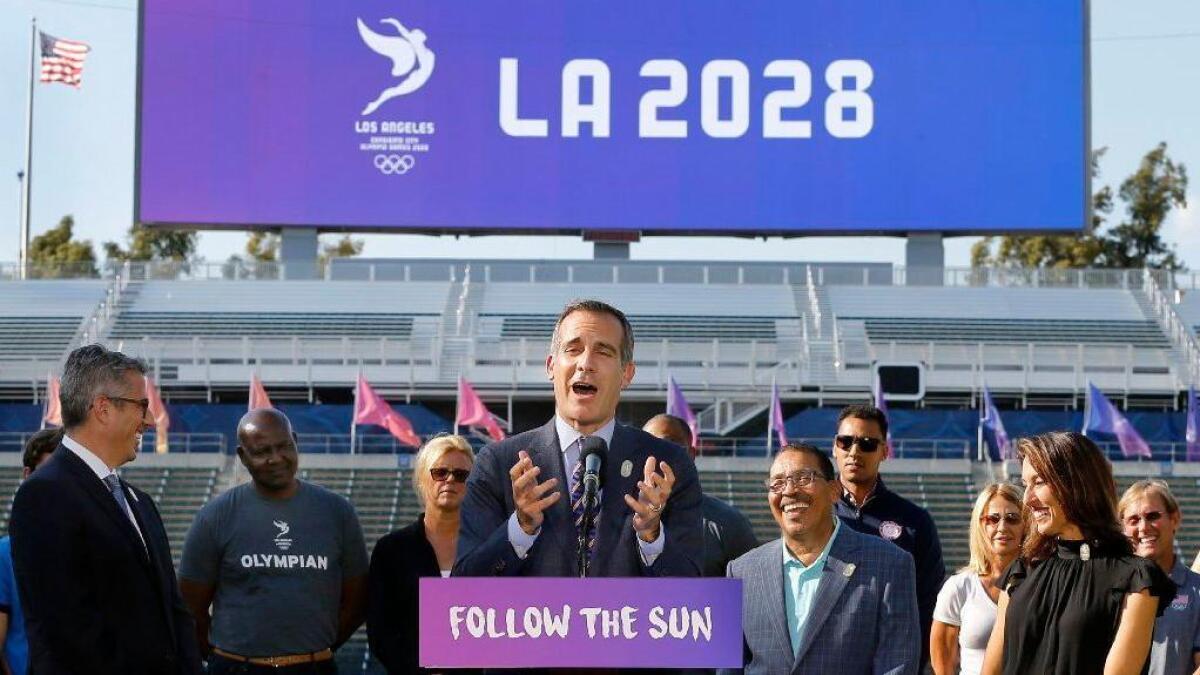
The city of Los Angeles’ bid to host the 2028 Olympics will receive financial support from the state, Assembly Speaker Anthony Rendon (D-Paramount) said in a letter to city officials Monday.
Rendon said he would work with Senate President Pro Tem Kevin de León (D-Los Angeles) and Gov. Jerry Brown to pass legislation providing state dollars to subsidize the effort if the city goes over budget.
“Securing the 2028 Games reflects a significant achievement,” Rendon said in the letter to Mayor Eric Garcetti and City Council President Herb Wesson. “It will benefit the city and the entire state as we showcase the best of Los Angeles and California — with the whole world watching.”
The new legislation, Rendon said, would mirror a bill passed last year that provided $250 million to support the city’s bid for the 2024 Olympics in case of cost overruns. That legislation, however, only authorized the money for the 2024 summer games, so a different measure will have to be considered. Last year’s bill passed with overwhelming backing of lawmakers.
Los Angeles City Council members debated state support at a hearing on the 2028 Olympics bid last week. City Councilman Paul Krekorian said the state should consider upping its contribution because of inflation.
“It occurs to me that as we’re talking to the Legislature, perhaps we should discuss with them a similar increase because of the additional cost,” Krekorian said.
A Rendon spokesman told The Times that the Assembly speaker hadn’t decided on the amount of state support because supporters of Los Angeles’ bid hadn’t formally asked yet.
Brown also expressed support for the Olympics.
“We are pleased to be hosting in 2028 and look forward to working with them on the issue,” Brown spokesman Gareth Lacy said.
The full City Council might vote on an agreement to host the games as soon as this week to meet deadlines set by the International Olympic Committee, even though the city doesn’t have a final budget or independent evaluation of the spending plan.
Times staff writer Dakota Smith contributed to this report.
A congressional candidate in Orange County is going decidedly anti-Trump in his first campaign ad
Democrat Dave Min is using a decidedly anti-President Trump angle in his first campaign ad in his bid to unseat GOP Rep. Mimi Walters of Irvine.
The digital ad, titled “Country of Immigrants,” highlights Min’s parents’ journey from Korea to the United States, where he was born.
“I’m profoundly concerned about my kids growing up in Donald Trump’s America,” Min says in the ad before criticizing Trump’s foreign travel ban and new proposed curbs on legal immigration. “This is not the America my parents came to.”
The ad also tries to tie Walters early on to Trump’s agenda, showing a clip of the congresswoman saying the president is “exceeding my expectations” and that she’s “very pleased” with what he’s done so far.
If that sounds familiar, that’s because it’s a playbook Democrats tried to use throughout California last year, and it mostly fizzled.
With the California primary still 10 months away, it’s not clear whether the dozens of Democratic challengers in California’s congressional races will rely primarily on the tactic of linking popular GOP incumbents to Trump.
Walters has already been the target of an ad by the Democratic Congressional Campaign Committee, which criticized her vote to repeal Obamacare and included images of her and Trump.
Six Democrats have already announced campaigns against Walters.
Big money troubles for retirees in tiny Northern California town that pulled out of CalPERS

In the tiny Sierra Valley town of Loyalton, the city’s four retired city employees became the first in California to see their pensions sliced by the California Public Employees’ Retirement System because the City Council defaulted on its payments to the fund.
For John Cussins, who ran the town’s water and sewer systems until a stroke forced him to retire in 2012, the cut in his monthly pension check may ruin him financially. Hundreds of other government retirees across the state may soon face a similar fate.
Local governments pay the most in Sacramento lobbying expenses
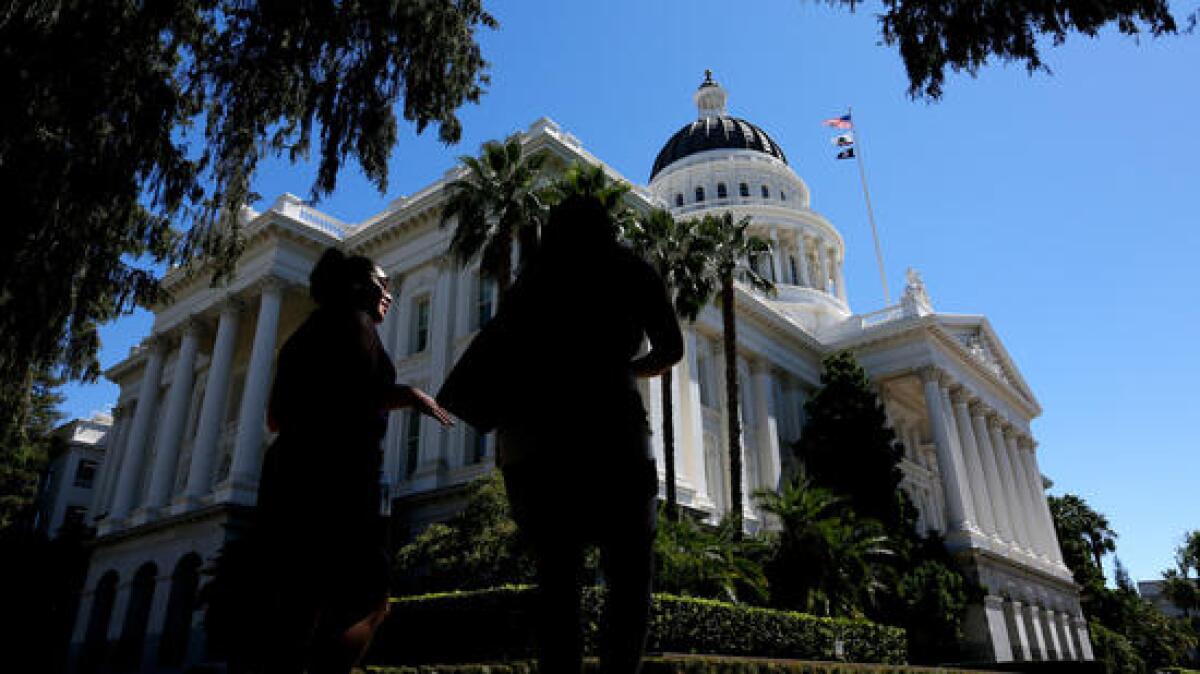
The stereotype of lobbying is that it’s the exclusive domain of corporations and organized labor, groups spending huge sums of money to quietly but firmly flex their political muscles in Sacramento.
But the data don’t bear that out. It’s California’s local governments — cities, counties and scores of other agencies — that spend the most of any sector to influence the outcome of events at the state Capitol.
‘May you die in pain’: California GOP congressman gets an earful at town hall
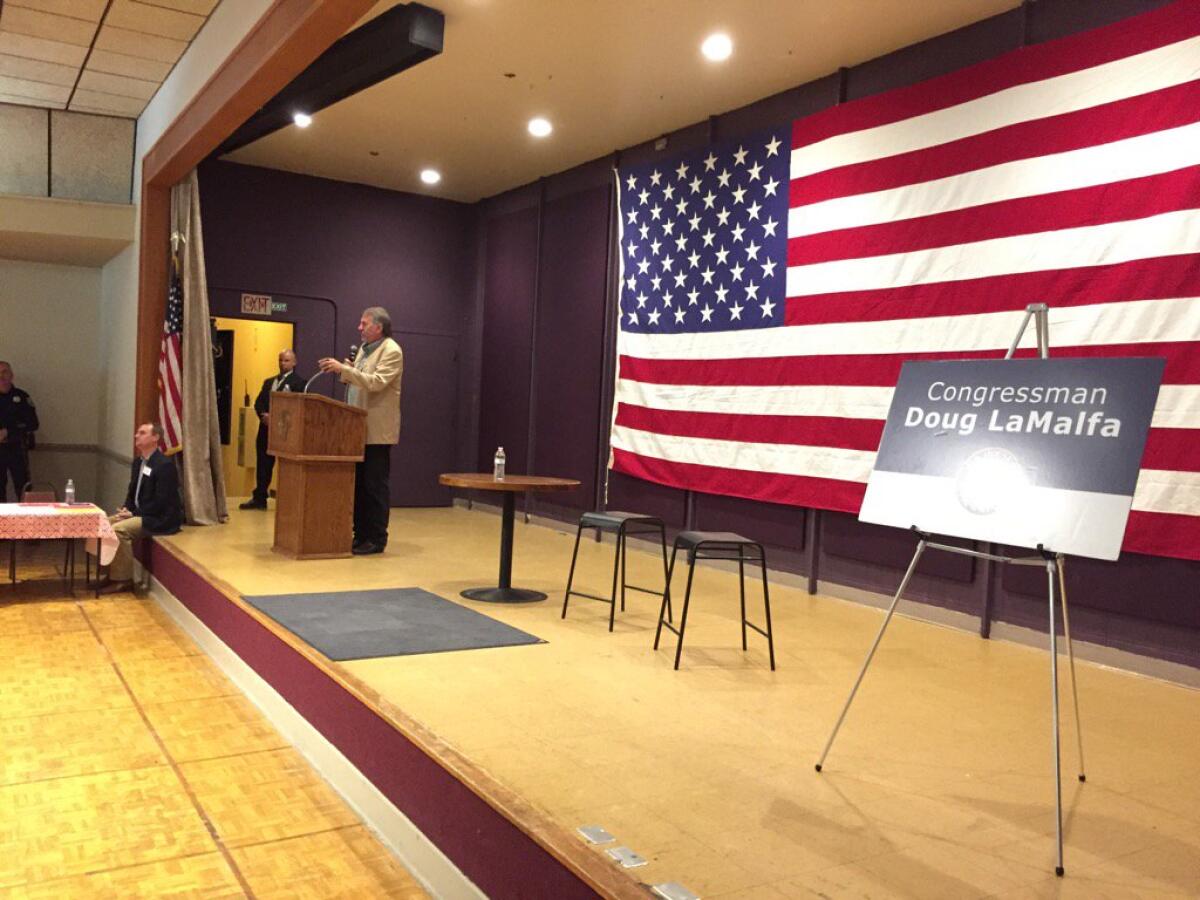
“May you die in pain.”
That was the nastiest moment of Republican Rep. Doug LaMalfa’s early morning town hall in the Northern California town of Chico on Monday.
The wish was uttered by an older man who criticized LaMalfa for voting for the House GOP plan to replace the Affordable Care Act. He was also holding a pink sign that read “Lackey for the Rich!”
ALSO: LaMalfa says the Russia investigation is ‘a bunch of crap’
The open hostility and intransigence inside the Chico Elks Lodge came as the political divide in the country has grown more inflamed, with Trump’s election unleashing a wave of both liberal activism and conservative empowerment.
As a result, Washington’s deeply partisan fights over issues such as health care, immigration and environmental protections have followed members of Congress home, turning once sedate town halls into in-your-face venting sessions that in left-leaning California have Republican House members on the defensive.
LaMalfa stood his ground on stage as person after person ripped into him for his votes and positions on healthcare and climate change, as well as for his unyielding support for President Trump.
A few speakers asked LaMalfa to resign, including one dressed up as the “Wicked Witch of the West Coast.”
Most comments and questions during the hour-long town hall were fairly cordial, although they were laced with plenty of boos and catcalls.
Norma Wilcox, a retired nurse who lives in Chico, also questioned LaMalfa’s healthcare vote. Wilcox told LaMalfa the House plan would take away healthcare for millions of Americans while providing tax breaks to the rich.
“I am open to new ideas,” LaMalfa told her, describing the House GOP bill as a placeholder that everyone expected to be improved during negotiations with the Senate. (The Senate’s healthcare efforts now appear dead.)
But the Richvale congressman, who represents California’s massive 1st Congressional District in the northeast corner of the state, said he will support only a new healthcare program that provides affordable coverage to middle-class Americans.
LaMalfa said Obamacare is quickly become unaffordable and unsustainable, with premium costs rising and the number of insurance companies offering coverage declining.
“People across the board are being hurt by this,” LaMalfa said.
When shouts and boos rained down on him, he chastised the crowd saying, “I have the mic folks. Yep, boo away.”
Ann Sisney of Chico told LaMalfa that her son, William, died of an opioid overdose two years ago. She held up a picture of the 19-year-old, asked the congressman to take it, and told him more people will die if GOP leadership in Congress gets its way on healthcare.
“These are life-and-death decisions that you are making,” Sisney told him.
LaMalfa assured her that Congress was working to find funds to address the nationwide opioid epidemic.
The Republican congressman also raised the ire of the crowd when he was asked about climate change and the degraded air quality in this stretch of Northern California.
“I don’t buy the idea that man-made activity is responsible,” LaMalfa said bluntly.
The crowd of several hundred did include some LaMalfa supporters, though most stayed silent.
Ron Jones, 67, of Paradise said he’s been to a few of LaMalfa’s town halls and all have been dominated by his critics.
“Most of the time people want to ... complain,” said Jones, a self-described conservative, after the event ended. “The people who support him are quietly in the background.”
LaMalfa does indeed have a lot of support in the district that also overwhelmingly voted for Trump over Hillary Clinton in last year’s presidential election. LaMalfa won his last election by almost 15%, and though he has attracted a few Democratic challengers, the district is not considered a battleground for 2018.
Unlike many California Republican members of Congress, LaMalfa hasn’t shied away from holding town halls, though it’s rarely a pleasant experience for him. He held one in Nevada City in March and another in April in Oroville. No other California Republicans are scheduled to hold town halls during their August recess.
Near the end of Monday’s town hall, a woman criticized LaMalfa for inviting only Christian pastors to provide invocations at his town halls and other events, and urged him to include religious leaders of all faiths.
“If you want to have your own town hall, you can invite whoever you like,” LaMalfa told her.
California lawmakers push small Bay Area city to approve big housing project

Tonight, the small Bay Area city of Brisbane will consider if it will support any housing on a 640-acre parcel of land bordering San Francisco.
A collection of state lawmakers are urging city leaders to say yes to housing development.
“The Bay Area and California are in this housing crisis for a long list of reasons, but the fundamental issue is that we simply do not have enough housing that our residents can afford,” said the joint statement from four Democratic legislators, Sen. Scott Wiener and Assemblymen David Chiu, Kevin Mullin and Phil Ting. “California got here as the result of thousands of decisions, like the one being considered by the Brisbane City Council tonight, where the question was should we build housing and, if so, how much should we build. Too often the answer has been to either build no housing, or to build very little of it.”
Wiener, Chiu and Ting represent San Francisco and Mullin represents Brisbane in San Mateo County.
The legislators are among many who don’t live in Brisbane encouraging the city to approve a 4,400-unit housing project proposed on the land.
But the city of 4,700 people has been reluctant. The Los Angeles Times reported last month:
“The project, Brisbane Baylands, reveals how few incentives local governments have to accept large developments — even as the state is pushing to lower housing costs and funnel growth toward existing cities and nearby mass transit to combat climate change. Brisbane residents are wary of a project that could triple the city’s population. Under California’s tax system, Brisbane also earns more money if it rejects the current plan in favor of potential alternatives with more hotel rooms and space for businesses — but no homes.”
Monday’s decision is expected to focus on whether the city wants to allow for any housing at all on the site. If the city does support housing, it will decide how much at a later date. Ultimately, city leaders plan to let residents decide on a final development plan through a ballot measure.
Here’s what the first month in Congress has been like for L.A.’s Rep. Jimmy Gomez
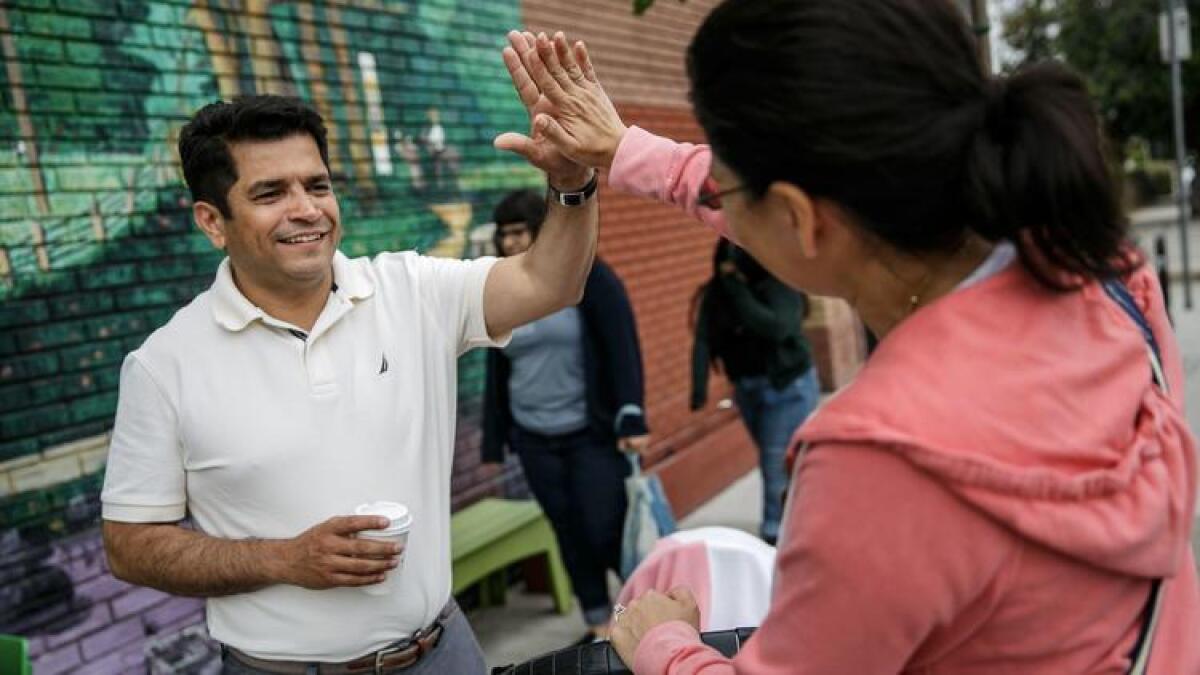
Los Angeles’ U.S. Rep. Jimmy Gomez has lost five pounds since coming to Washington a month ago.
“I don’t know if that’s from stress or just from walking,” he joked.
Since being sworn in June 11, the Democratic congressman has settled into the rhythm of life on Capitol Hill.
Northern California Rep. Doug LaMalfa says he ‘doesn’t buy’ man-made climate change
Democrats need more cleverness, strength and vision, Gov. Jerry Brown says
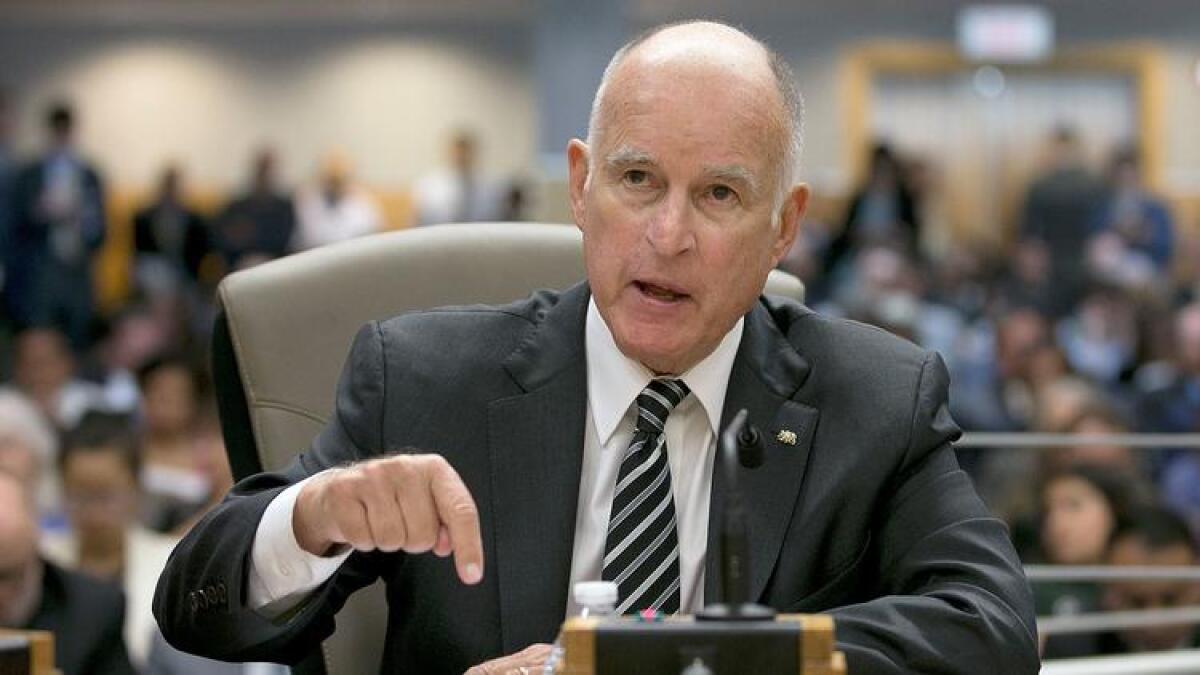
Democrats are tussling over whether support for abortion rights should be a prerequisite for the party’s candidates, but Gov. Jerry Brown thinks there should be a different standard.
“The litmus test should be intelligence, caring about, as Harry Truman or Roosevelt used to call it, the common man,” he told NBC’s “Meet the Press” in an interview that aired Sunday.
He added, “You can’t let these hot-button issues that work great in particular congressional districts one way or the other to be the guiding light for a national party that covers a very wide spectrum of belief.”
Besides talking about California’s approach to immigration policies, Brown waded into national political issues during the interview, including some thoughts on why his party’s power has waned.
“Democrats have been the champion of working people, and they haven’t been able to deliver in face of these global trends,” such as economic insecurity, he said. “And, yes, you’d have to say that leadership has not been clever enough, or strong enough, or perhaps visionary enough.”
Brown defended House Minority Leader Nancy Pelosi (D-San Francisco), who some party members believe should give up her leadership role. He said it wasn’t her fault that Democrats had fallen short in special elections this year.
“She’s really dedicated. She works very hard for this party,” Brown said. “And the answer is you’ve got to get good candidates.”
Asked why Hillary Clinton lost last year’s election, Brown said it’s rare for voters to choose a new president from the party that currently holds the White House.
“Those Democrats in Ohio and the Rust Belt in Pennsylvania, Wisconsin, they said, ‘You know, we’ve had Obama. Whatever he was doing, I still feel insecure. My pay is going down. My job is disappearing. So I’d better try this other guy. He’s really off the wall, but I’m desperate. I’m ready to try something,’” he said.
Brown also threw some cold water on the idea that states and cities can fully compensate for President Trump’s decision to step back from the fight against global warming and begin withdrawing from the Paris agreement.
Although efforts outside of Washington will have a “powerful impact,” Brown said, “We need the president. We need the federal government.”
California Politics Podcast: Donors are choosing sides in the 2018 governor’s race
Wealthy Californians who write checks to candidates and campaigns, particularly those involved in Democratic Party politics, face a dilemma in next year’s race for governor.
They not only have to choose a candidate to back, but they need to figure out what makes one person stand out compared with the others.
On this week’s California Politics Podcast, we look at the recent campaign fundraising reports with an eye toward what they say about each candidate’s broader strategy for the race.
In some cases, donors may see less of a distinction than the candidates are selling to voters.
I’m joined by Times staff writer Melanie Mason.
Questions over Russia and healthcare dominate Rep. Eric Swalwell’s town hall at a Livermore high school

Over the shouts of a lone heckler at a packed Livermore town hall, Northern California Rep. Eric Swalwell on Saturday once more called for the creation of an independent commission to investigate Russian interference in the 2016 election.
“If we do anything, we should make sure that the 2018 election is more secure than the 2016 election,” Swalwell said, drawing a round of applause from the audience.
Roughly 500 people filled the seats at the Granada High School gym, many of whom were attending a town hall for the first time amid concerns over what they said they view as a tense and divisive political climate in Washington. The event was organized to address questions from constituents about jobs, healthcare and what Swalwell called efforts to protect democracy.
It came days after special counsel Robert S. Mueller III convened a criminal grand jury to investigate the presidential election, focusing on Donald Trump Jr.’s meeting with a Russian lawyer who promised damaging information about Hillary Clinton.
Questions over the Russia probe and GOP efforts to kill the Affordable Care Act dominated the discussion.
Swalwell, a Democrat from Dublin who serves on the House Intelligence Committee, has started a Web page detailing the alleged Russian ties of Trump administration officials. He said Mueller’s investigation did not eliminate the need for an independent commission.
The congressman said there was no evidence Russian actors had changed votes. But intelligence reports had shown President Vladimir Putin influenced the election through “a multifaceted attack” that he said included hacked emails and the spread of fake news through social media trolls.
“What we know the Russians did do is that they went into a number of state election voter databases,” he said. “We don’t know why. You could speculate that they wanted to show that they could at least get in, and that it would sow discord or sow doubt when the result came out.”
The event was largely free of the protests and rambunctious tactics that have overtaken recent town halls in California. One man in the audience yelled at Swalwell as he spoke about Russian interference: “Get over it! He won!” But he was soon silenced by the audience.
Swalwell also fielded questions about his efforts to ease college debt and build the Future Forum, a group of young Democratic members of Congress focused on student loan debt and homeownership.
On healthcare, Swalwell called for a “Medicare for all” system, saying lawmakers needed to continue to expand access and reduce costs. Constituents quizzed him on who would pay for such a plan.
Gov. Brown wants to prevent ‘abuse of federal power’ on immigration, but expresses concerns about ‘sanctuary state’ bill
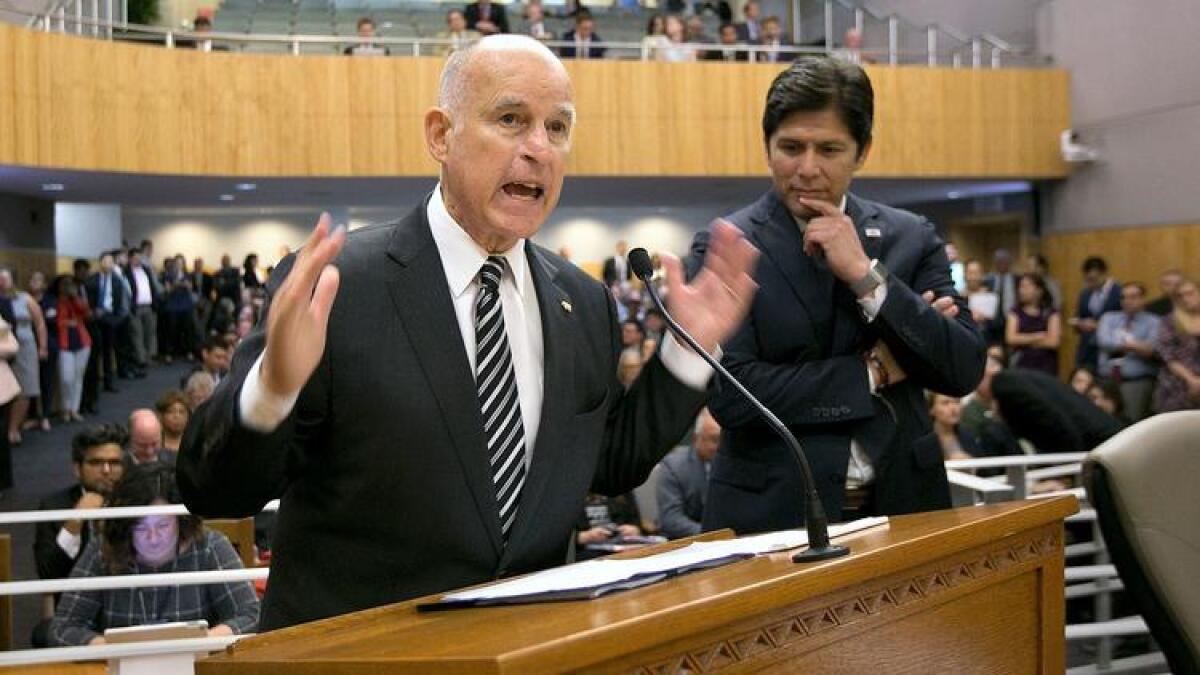
Gov. Jerry Brown described dealing with President Trump’s immigration policies as a balancing act during an interview to air Sunday on NBC’s “Meet the Press,” expressing concern about an “abuse of federal power.”
But he also shared reservations about high-profile legislation moving through the California Legislature that would increase limitations on how local law enforcement agencies can work with federal immigration authorities.
“We’re looking at it very carefully,” Brown said of SB 54, from state Senate President Pro Tem Kevin de León (D-Los Angeles). “We’re having discussions with the author. There are some changes that I think would be very important.”
Brown suggested that litigation from California Atty. Gen. Xavier Becerra and other states could be a good way to resolve disagreements between the state and the federal government on “sanctuary city” policies, which have been a political flash point.
The governor said people in the country illegally who have committed crimes “have no business in the United States,” but said he wants to help others who have contributed to California.
“We want to be very understanding of people who have come to our state, have worked in our economy, often for decades, picking our food, working in our restaurants, working in high-tech industries, the whole range of what constitutes the life of California has been contributed to by many of these immigrants that are not documented,” he said.
What we know about why Dana Rohrabacher’s name keeps coming up in the Russia investigation
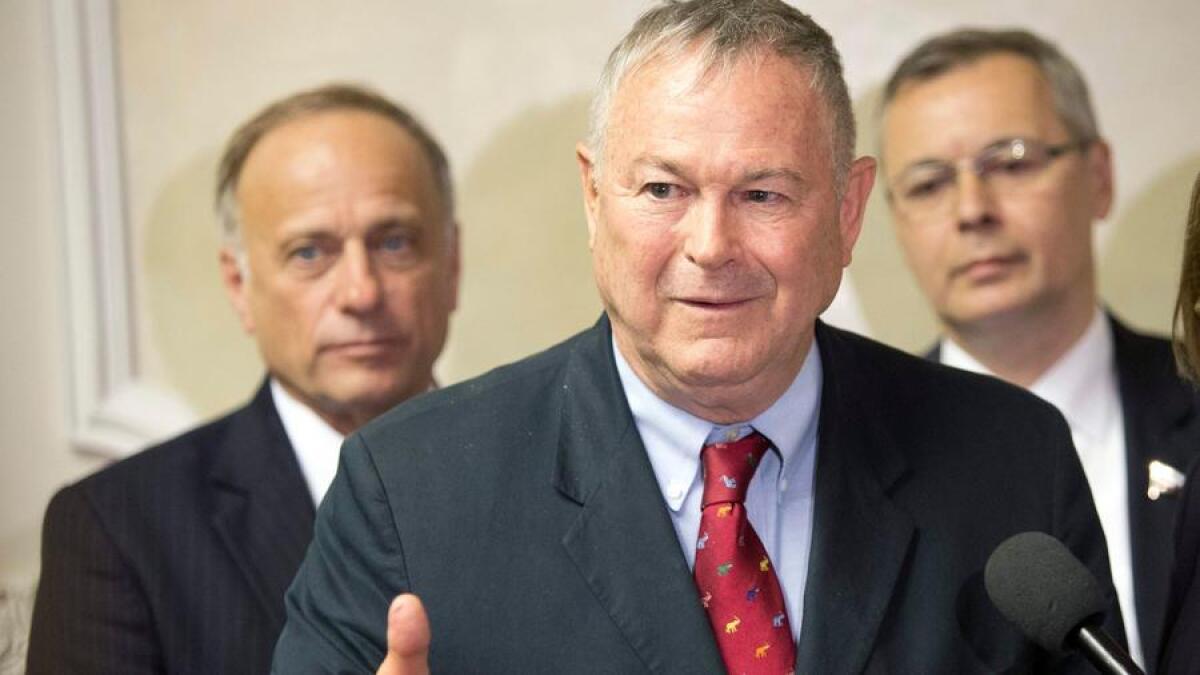
Rep. Dana Rohrabacher has never tried to hide his friendliness toward Russia, and has long said the United States needs a better relationship with the country.
But links between the Costa Mesa Republican and the country he’s bucked his party to extend a hand toward have raised new eyebrows because of the investigations into Russia’s attempts to undermine the 2016 election that Donald Trump won.
It’s a story that involves Russian tax fraud, foreign adoptions, dinner with a foreign agent and a meeting in Trump Tower with the soon-to-be president’s son. And much of it has just recently come to light.
Rep. Linda Sanchez takes ‘empty chair’ at town hall, talks strategy with those hoping to defeat Rep. Ed Royce
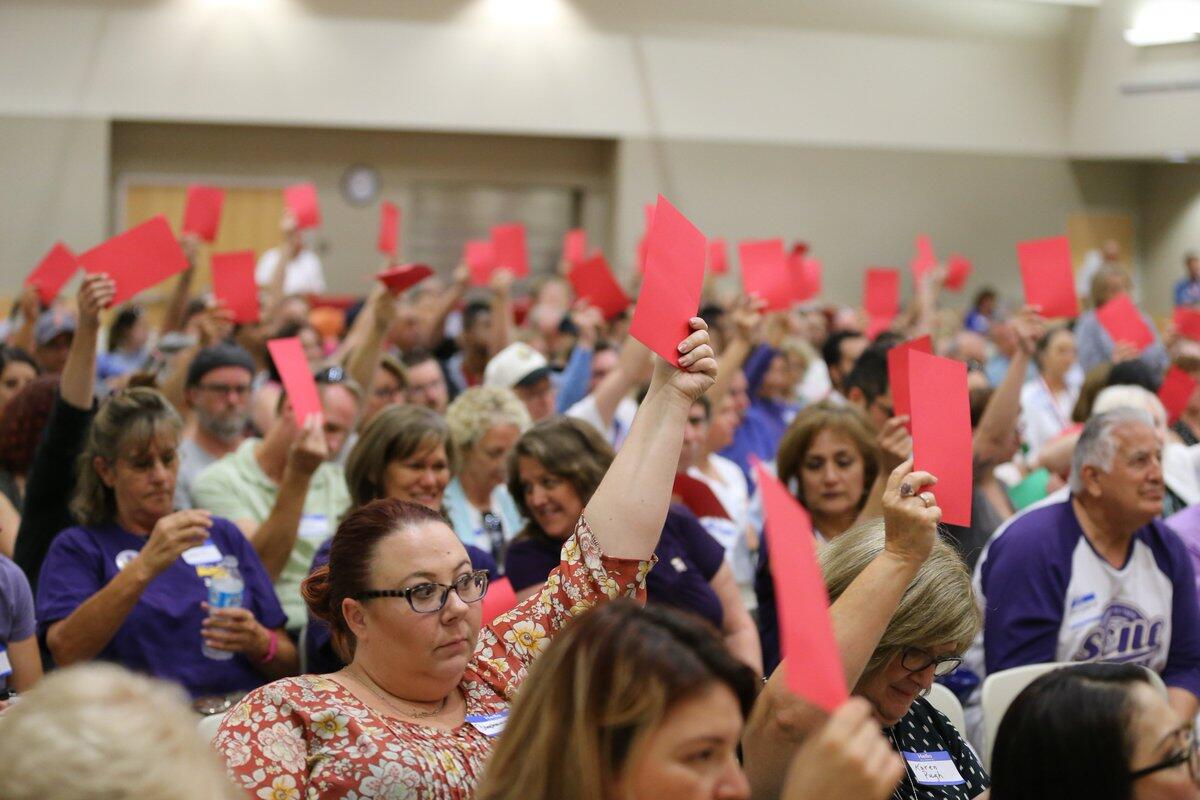
Rep. Linda Sanchez attended a town hall Thursday night, but it wasn’t on her home turf.
The Democrat appeared at a forum for constituents of Republican Rep. Ed Royce of Fullerton at the invitation of liberal groups working to oust him next year.
Royce was invited but declined to attend the event, the latest in a series of “empty chair” town halls organized by constituents clamoring for face-time with Republican members of Congress.
With most audience members in agreement with Sanchez’s left-leaning policy positions, the event unfolded more like a strategy session for liberal activists looking to take back the House in 2018.
Fielding questions on fighting efforts to repeal Obamacare, stopping deportations of immigrants in the country illegally and the investigation into Russian meddling in the 2016 election, Sanchez repeatedly circled back to the importance of the midterm elections next year.
“The only way we move a progressive agenda is if we get a majority back, that’s the first step,” Sanchez told a crowd of about 200 people in a Fullerton community center. “We have to be smart and think about how do we increase the number of members of Congress that ... can get us that run to win the ballgame and that’s what we need to focus on in the 2018 election cycle.”
Also in attendance were Assemblywoman Sharon Quirk-Silva (D-Fullerton), who represents part of Royce’s district, and several candidates hoping to unseat him, including Democrats Phil Janowicz, Mai Khanh Tran, Sam Jammal and Gil Cisneros and independent candidate Julio Castaneda. They were spotted shaking hands with attendees as they waited in line to enter and some posed questions to Sanchez and Quirk-Silva.
Royce spokesman Steven Smith said the congressman attended another event Thursday night, but Smith wouldn’t describe the nature of that meeting, citing security reasons. He said the congressman would be meeting one-on-one with local groups throughout August and that constituents can reach out to his office via email, letters and phone calls.
Dave Gilliard, Royce’s campaign consultant, said Democratic members of Congress would “be better served” staying in their own districts. “A member of Congress from another district that [voters] haven’t heard of isn’t going to help matters much.”
Sanchez is the latest Democrat in Congress to cross district lines and field questions at a nearby colleague’s town hall. On Tuesday, Rep. Ted Lieu received a hero’s welcome at a meeting organized by local activists hoping to unseat Rep. Dana Rohrabacher of Costa Mesa.
Earlier this year, New York Rep. Sean Patrick Maloney challenged his Democratic colleagues to go “into every district where a Republican who supported Trumpcare won’t hold a town hall meeting and do it for them.”
Rep. Judy Chu of Monterey Park attended a similar event in Rep. Steve Knight’s Los Angeles County district in June.
House Minority Leader Nancy Pelosi has quietly encouraged such efforts in private meetings, according to a congressional aide familiar with the meetings who asked not to be named because the aide is not permitted to speak to reporters. So far, Democratic lawmakers have participated in at least 13 “adopt-a-district” town hall meetings, according to Town Hall Project, a progressive group that tracks and publicizes town halls. There have been 96 empty-chair town halls without Republicans.
In an interview before Thursday’s forum, Sanchez said she thinks more Democrats should participate in town halls in neighboring districts if they’re invited. “Clearly there’s a hunger for information on the part of the public about how to be engaged politically,” said Sanchez, who represents the 38th Congressional District, which borders Royce’s district and includes Whittier and Lakewood.
Royce represents one of several Republican districts won by Hillary Clinton in last year’s presidential election, and is one of the Democrats’ top priorities for the midterms. Although political prognosticators generally regard Royce as fairly safe, the number of registered Democrats in the Orange County district has been increasing, and Republicans’ voter registration edge is now less than than 2%.
Advocacy groups want to reverse a state housing rule they say disrupts the schooling of migrant farmworkers’ children
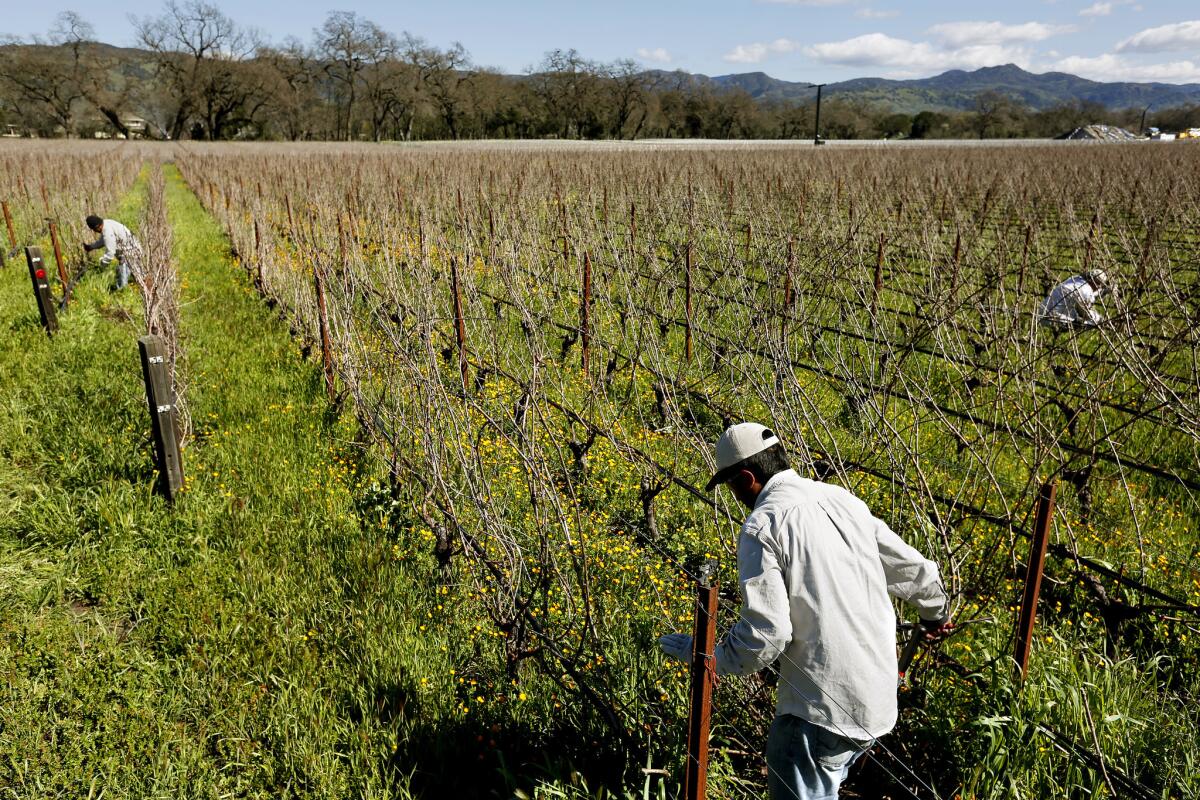
More than 30 community organizations and advocates are working to reverse a California state agency rule that requires migrant farmworkers to clear out of subsidized housing at the end of a growing season and move more than 50 miles away.
They say the outdated regulation from the California Department of Housing and Community Development, known as the “50-mile rule,” forces children to switch schools twice a year, causing most to fall behind and drop out. But state agency officials say support for the rule has been just as strong to regulate the limited supply of migrant farmworker housing.
The debate comes as California is struggling with a shortage of homes driving its affordability crisis, and a labor shortage in the fields that has brought new temporary guest workers to towns and cities along the state’s coastal agricultural belt.
Donations in the California governor’s race top $30 million
The governor’s race isn’t until next year, but donations to the six candidates vying to lead California have already topped $30 million.
The Times Data Team breaks down the money race, looking at how much the candidates have raised and where the money is flowing from.
How California officials aim to prevent racial profiling by police
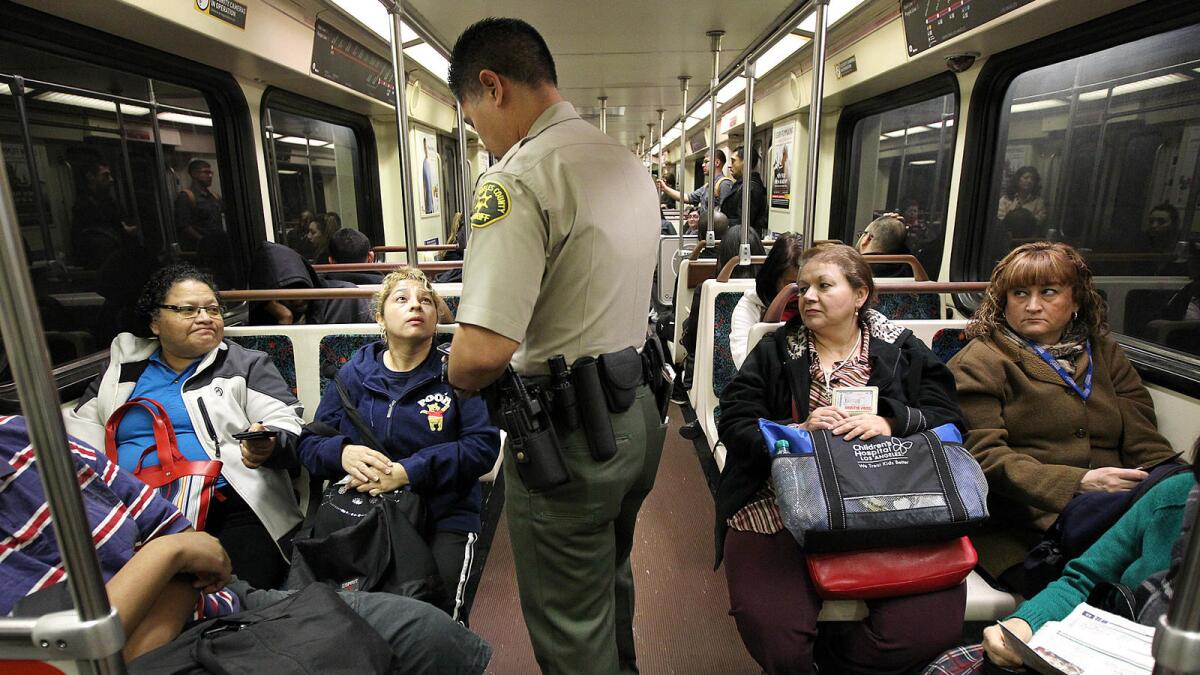
Soon police departments across California will begin tracking race and other demographic data every time officers pull someone over or otherwise detain them. State officials want to use the information to help prevent police racial profiling.
Exactly how officers are supposed to collect the data, though, has taken a long time to figure out. Atty. Gen. Xavier Becerra released revised regulations this week and could make more changes before the Los Angeles Police Department and other large agencies begin tracking the data in July 2018.
Conservative group talks up tax reform in Spanish in three California congressional districts
Republicans are targeting California Democrats over single-payer healthcare
Democrats are widely expected to make Republican incumbents’ efforts to overturn the Affordable Care Act a major issue in the 2018. Now Republicans are going after challengers for some Democrats’ support of a single-payer healthcare system.
The National Republican Congressional Committee is launching a digital ad Thursday morning targeting Democratic challengers on the issue.
The ad will run for two weeks and is specifically targeting Democratic candidates Bryan Caforio in the 25th District and Josh Harder in the 10th District, according to NRCC spokesman Jack Pandol.
The ad doesn’t mention either of them by name, though it prominently features Democratic House Minority Leader Nancy Pelosi throughout.
Pandol said Caforio and Harder are the targets of the ad because they “aren’t being up front with the progressive base and mainstream voters about their position on single-payer. They can’t escape taking a position on this forever.”
“Harder hasn’t made a statement on single-payer healthcare, but Caforio’s campaign manager recently told The Times he supports it and he has said in a fundraising pitch and a news release that he will fight for a “Medicare for all” approach.
Caforio and Harder are among several candidates running in each of their districts. They’ve also raised the most money among prospective challengers in their races, according to campaign finance reports.
State lawmakers have debated creating a single-payer system in California, but the effort has been put on hold and members of Congress aren’t directly involved.
The 58-second ad is targeted toward swing voters in the districts who are using Facebook on a mobile phone, Pandol said.
Both of the districts are among the seven in California that backed Democrat Hillary Clinton over Republican Donald Trump for president last year, but also sent their Republican Congress members back to Washington.
In the 10th District, Rep. Jeff Denham (Turlock) won in 2016 by 3.4%. In the 25th District, Rep. Steve Knight (Palmdale) won by 6.2%.
UPDATE
3:17 p.m.: This post has been updated with more information about Caforio’s statements.
Times staff writer Javier Panzar contributed to this report.
Money from the construction industry rolled in for Kevin de Léon after California’s road repair plan passed
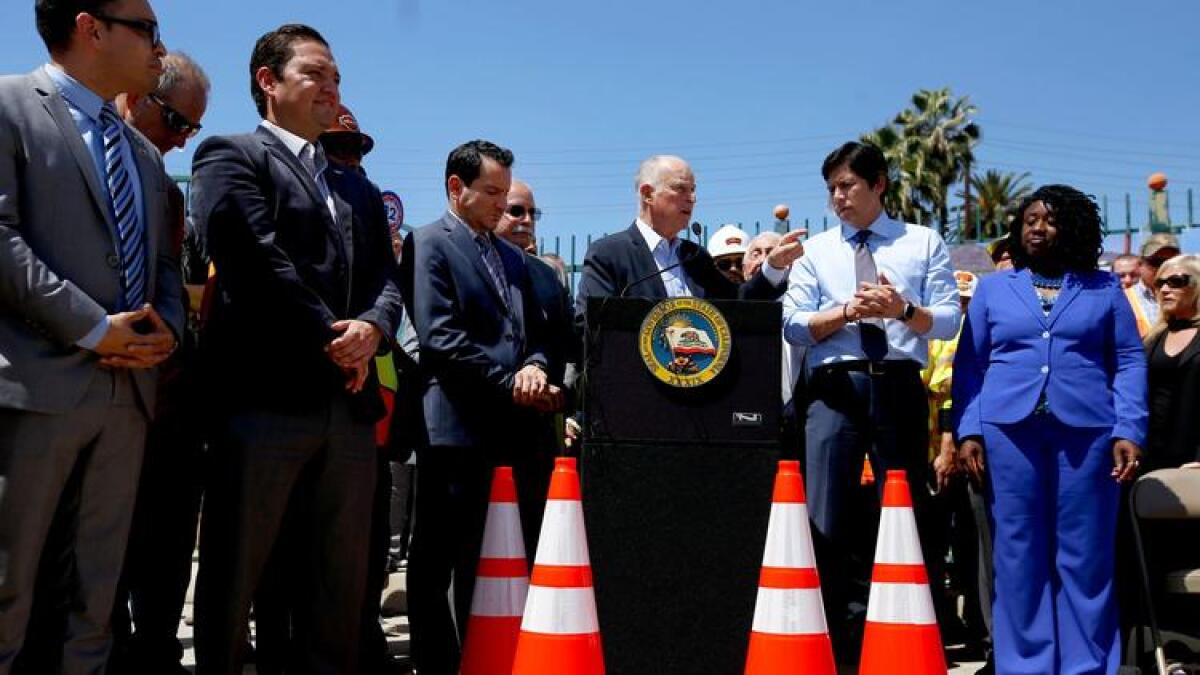
California Senate President Pro Tem Kevin de Léon has been coy about his future political plans, but not bashful when it comes to raising money for a future campaign.
That includes nearly $100,000 that flowed into his campaign account from construction and engineering firms just weeks after Gov. Jerry Brown and the state Legislature approved a $52 billion tax-and-fee plan to repair California’s roads.
De León (D-Los Angeles) will reach his term limit next year, and his future has long been the focus of speculation.
Though he has never declared his candidacy, he has a political committee set up for a 2018 campaign for California lieutenant governor, and that committee raked in $1.4 million in political contributions in 2017, a state campaign finance report shows.
That haul increased his committee’s cash-on-hand to $2.8 million — more than twice as much as any of the candidates who are actively campaigning to be the next lieutenant governor.
De León has said he hasn’t made a decision about whether he’ll run. But he has privately given his supporters a green light to endorse state Sen. Ed Hernandez (D-Azusa), a longtime political ally, in the race.
“He’s still deciding and exploring all options,” said Courtni Pugh, one of De Léon’s political consultants. “Everything is still on the table.”
Along with strong support from labor organizations, De León’s long list of donors includes Los Angeles philanthropists Eli and Edythe Broad, Planned Parenthood organizations, former Assembly Speaker Fabian Núñez and renewable energy companies.
After the road repair bill passed, De León also received close to $100,000 from construction and engineering companies in late April and early May. De León received $7,300 donations from the Engineering and Utility Contractors Assn., Granite Construction and a few other construction firms.
The contractors association was a major supporter of the roads bill and joined the governor, De León and other legislative leaders at a rally in support of the legislation.
Emily Cohen, a United Contractors vice president, said the organization has been a longtime supporter of De León. She said United Contractors organized a fundraiser for the senator and that he played no role in that effort.
“We’ve supported Kevin for years. We’ve supported a lot of legislators on both sides of the aisle,” she said. “We’ve supported Kevin before there was any kind of bill.”
Pugh also said the donations came from firms that have supported the senator in the past.
Trump reportedly considering two Southern California donors as ambassadors to Mexico and Slovenia
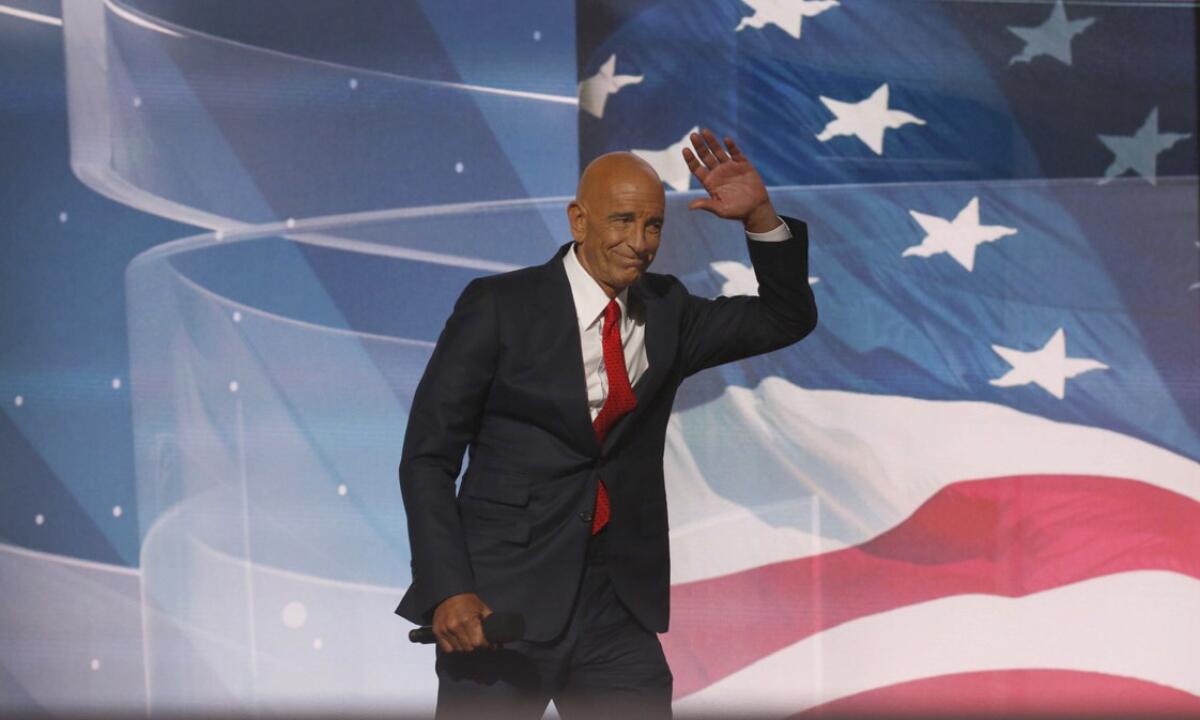
President Trump could be considering two wealthy Southern Californians and major GOP donors for ambassadorships.
In an interview with the Wall Street Journal, Trump said he is mulling over naming long-time friend Tom Barrack, an investor and former Hollywood studio head, as the U.S. ambassador to Mexico.
“I’m thinking about it. What do you think? Do you like him?” Trump said when a Journal reporter asked about Barrack as a potential candidate for the role. “Tom Barrack, yes? Call him up, tell him I’m giving it to him.”
Barrack hosted Trump’s first major fundraiser and raised tens of millions of dollars for a super PAC supporting Trump’s candidacy in 2016. He also spoke shortly before Trump accepted the GOP nomination at the Republican National Convention, and planned the president’s inauguration earlier this year.

Kelly Roberts, who owns the Mission Inn in Riverside with her husband, Duane Roberts, is being considered as the ambassador to Slovenia, the birthplace of First Lady Melania Trump, according to New York Magazine.
The couple has donated millions of dollars to Republican candidates and causes over the years.
Duane Roberts made his fortune in frozen burritos before buying and restoring the Mission Inn in 1992. The historic hotel has long had ties to GOP royalty — the Nixons married there and the Reagans honeymooned there.
If Barrack and Roberts are named ambassadors by Trump, their appointments would require Senate confirmation.
California Atty. Gen. Xavier Becerra accuses Trump of ‘sabotage’ and ‘extortion’ on Obamacare subsidies
California Atty. Gen. Xavier Becerra, newly empowered to defend Affordable Care Act subsidies in court, accused President Trump on Wednesday of “extortionist tactics” by threatening to undermine the healthcare law.
At a news conference, Becerra celebrated Tuesday’s decision by a U.S. appeals court to allow states to join the legal battle to defend cost-sharing subsidies, in which the federal government pays insurance companies to compensate for cheaper, out-of-pocket costs for low-income customers. Trump has denounced the payments as “bailouts” for insurance companies.
Becerra said uncertainty over the future of those subsidies had led to a 12.5% jump in projected premiums next year for plans on the Covered California insurance exchange.
“It shouldn’t surprise anyone that the Trump-generated instability, unpredictability, has made it difficult for insurance companies to determine what their rates will be for next year,” Becerra said. “It shouldn’t surprise anyone that they’re hedging for charging more for next year’s insurance plan than this year — just in case.”
“My friends, that’s the classic definition of sabotage,” he added.
Becerra, along with New York Atty. Gen. Eric Schneiderman and 16 other attorneys general, sought to intervene in the lawsuit regarding the subsidies in May. House Republicans challenged the payments in 2014 under the Obama administration; with the case now on appeal, the Trump administration had inherited the role of defending the subsidies, but it was unclear if it would continue the fight to protect them.
Now, with states able to join the case, Becerra said, “we’re ready to go. My team is ready to defend these subsidies in court.”
Becerra is not the only California official to press Trump on the subsidies. Insurance Commissioner Dave Jones, who is Becerra’s rival in the 2018 race for attorney general, touted on Tuesday his move to let insurers file two sets of rates for next year: one assuming the payments stay in place, the other if they go away. The result would be an additional 12.4% increase in prices on average should the subsidies be withheld.
The U.S. Senate, meanwhile, is exploring a bipartisan measure to stabilize the insurance market. Becerra urged his former colleagues on the Hill to continue working on such efforts.
“The quickest way to resolve some of these issues is to make sure there’s a statute that takes care of this directly. ... The most important thing is for Congress to get to work, to do its job,” he said.
A new California license could be on the way for Uber and Lyft drivers
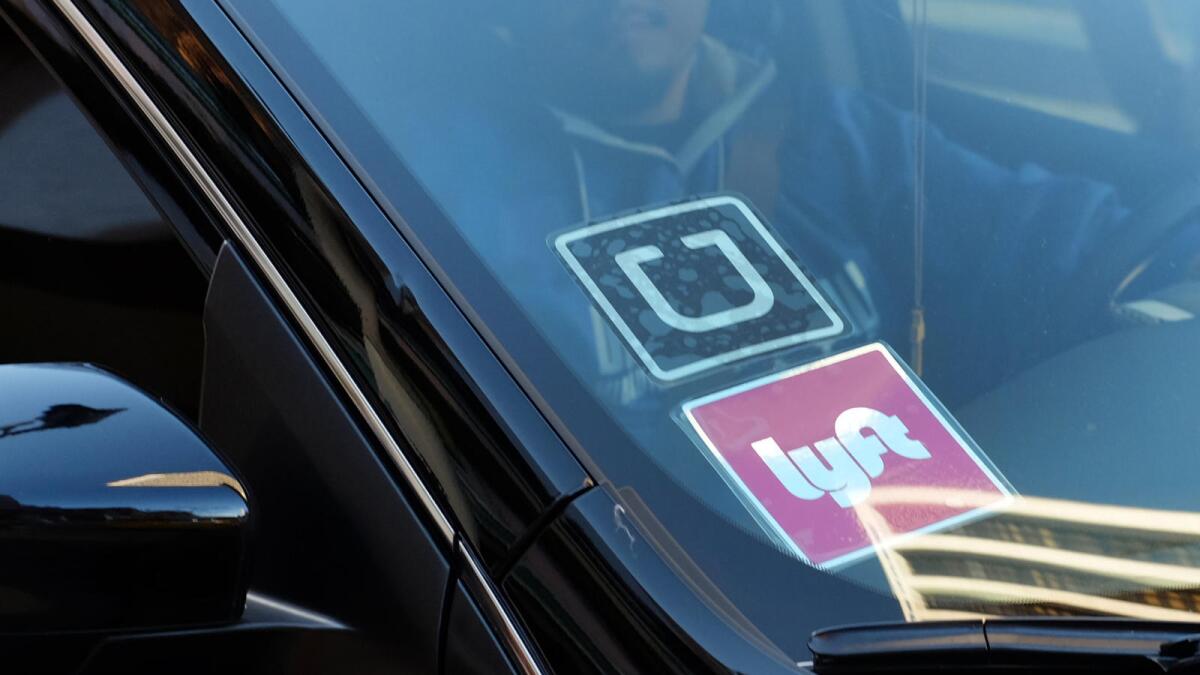
Uber and Lyft are pushing legislation at the state Capitol that would force their drivers to buy a new business license to work.
Why? To avoid drivers potentially needing dozens of licenses, one for every city where they pick up, drop off or pass through. But some cities, notably San Francisco, aren’t happy with the legislation because the bill could mean millions of dollars in lost revenue.
Rep. Ted Lieu speaks to activists working to oust GOP Rep. Dana Rohrabacher at ‘empty chair’ town hall
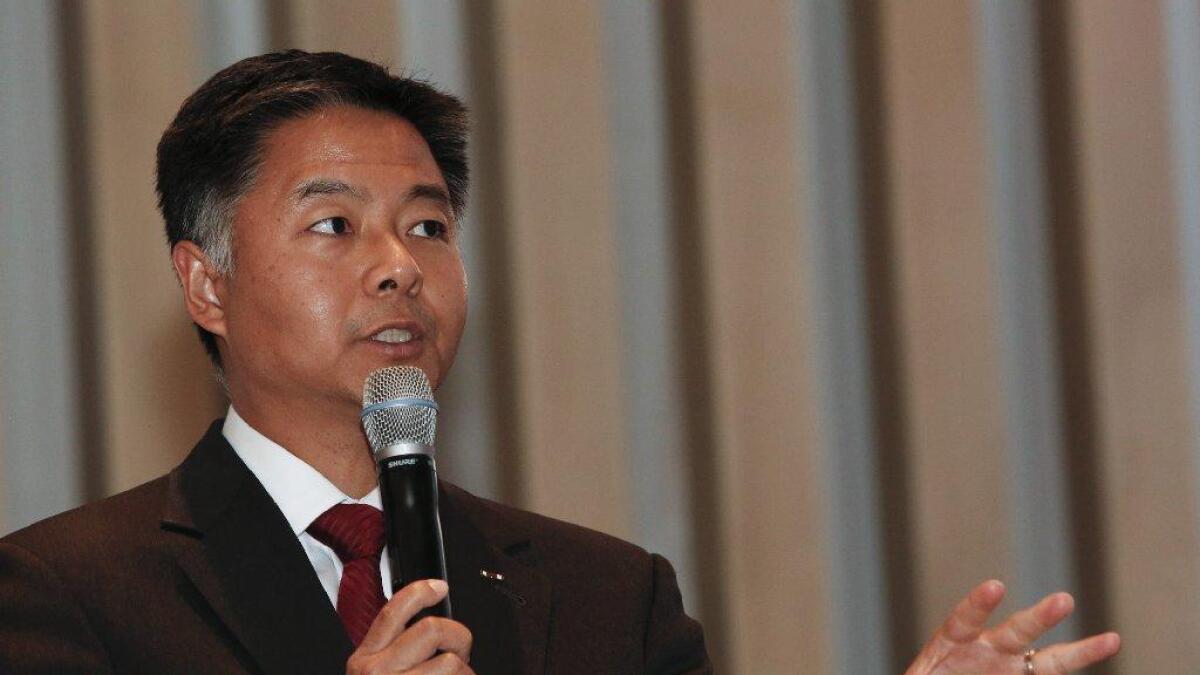
Rep. Ted Lieu (D-Torrance) got a rock star’s reception Tuesday night at an Aliso Viejo town hall organized by liberal activists in Orange County who are working to oust Rep. Dana Rohrabacher (R-Costa Mesa).
Activists invited Rohrabacher to speak but he declined.
The event instead served as a pep rally for activists and a networking event for the stable of Democratic candidates seeking to challenge Rohrabacher in 2018.
Rohrabacher’s seat has been rated a toss-up by political prognosticators, and some of his challengers have been raising money at a considerable clip despite being new to politics.
In recent months, Lieu has seen his profile raised among liberals thanks to his brash tweets challenging the Trump administration.
His appearance Tuesday was largely an opportunity to get local activists motived for the midterm election in 2018, when Democrats have put a special emphasis on capturing a handful of traditionally red seats in Orange County.
“It is your job to make sure people are excited next November as they are right now,” Lieu said.
“With your help, what we are going to see when Donald Trump gives his State of the Union address in January of 2019, we are going to see him and behind him we going to see Speaker Nancy Pelosi looking down on him.”
Activists from the local Indivisible group have gotten into confrontations with Rohrabacher’s district staff and picketed outside his home demanding he host a town hall.
When one member of the group theatrically “served” the congressman with an invitation to Tuesday’s town hall, Rohrabacher threw the envelope to the ground.
“Your organization acts like a bunch of fascists,” he said.
Kenneth Grubbs, a spokesman for Rohrabacher, said Tuesday the congressman would not attend the town hall.
“He has ample evidence that Indivisible is a partisan group created to disrupt and not serve the public discourse,” Grubbs said in an email. “Portrayals of its intentions to the contrary are disingenuous.”
Other Indivisible groups, working off a shared playbook, are hosting similar town halls with Democratic members of Congress in areas represented by Republicans who haven’t held town halls of their own.
Rep. Linda Sanchez (D-Whittier) is scheduled to host a town hall Thursday in Republican Rep. Ed Royce’s district at the Fullerton Community Center.
Lieu took questions from audience members about healthcare legislation, allegations of Russian meddling in the 2016 election and tensions with North Korea.
For much of the night candidates looking to replace Rohrabacher roamed the Aliso Niguel High School gym talking to voters.
Democrats Hans Keirstead, Michael Kotick, Omar Siddiqui and Tony Zarkades were in attendance, as well as Libertarian candidate Brandon Reiser. Democrat Dave Min, who is challenging Rep. Mimi Walters (R-Irvine) in a neighboring Orange County district, also showed up.
The number of candidates in Rohrabacher’s district both excites and worries Chris Halliwell, a 68-year-old semi-retired business consultant from Huntington Beach.
She and a group of her friends have started hosting candidates for fireside chats to get to know who is running.
But she said she hopes the many liberal activist groups that have proliferated after the election of Trump do not make endorsements of Democratic candidates before the June primary.
“I don’t want them to go negative on each other. We just need to make sure it is a blue seat,” she said. “We cannot splinter; we have to stay united and let the cream rise to the top.”
California Atty. Gen. Xavier Becerra revises rules for collecting data meant to prevent racial profiling
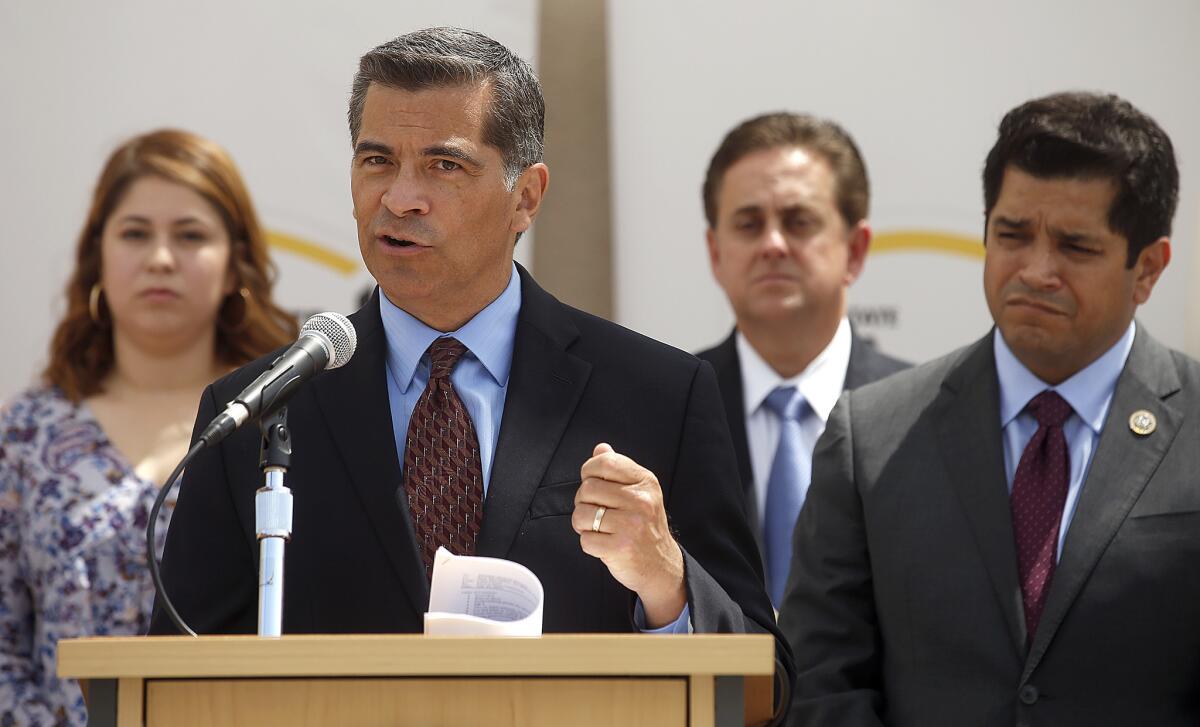
Atty. Gen. Xavier Becerra revised regulations Tuesday aimed at preventing racial profiling by police.
The rules, which will go into effect starting next year, require police officers statewide to track racial and other demographic data when conducting traffic and other stops.
“Racial and identity profiling are not acceptable policing practices and do not increase public trust between law enforcement and the communities they are sworn to protect,” Becerra said in a release.
The revisions Becerra released Tuesday aim to simplify the process for officers to input the data and exclude circumstances where collecting the information could be impractical, including when officers are investigating an active shooting.
“The revised regulations we posted today are vital to ensuring public safety and reflect critical input from law enforcement, community members and scholars,” Becerra said.
The Los Angeles police and sheriff’s departments and other agencies with 1,000 or more officers will begin collecting the data in July 2018 and release annual reports starting in April 2019.
Every year, more departments will be required to start collecting data. By 2023, all police agencies in California will be responsible for doing so.
Becerra’s office could further revise the regulations before they’re finalized.
Oil companies outspent environmentalists during California’s climate change negotiations

Oil companies spent $2.5 million lobbying during negotiations over California climate policies this summer, according to new disclosures.
They spent far more than major environmental groups, and more than the $369,791 from Democratic donor Tom Steyer’s NextGen Climate Action.
The reports cover April 1 to June 30 as lawmakers were debating the future of the state’s cap-and-trade program, which they ultimately decided to extend. It’s an incomplete picture because the reports don’t account for the final two weeks of negotiations during early July, which won’t be covered until the next quarterly report.
However, it seems unlikely that lobbying dollars from the Western States Petroleum Assn. will exceed the $6.75 million spent in one quarter of 2015.
Spending spiked during that time as lawmakers considered a measure to reduce oil consumption for transportation, a proposal that failed.
New challenger for Rep. Ed Royce kicks off race with a $2-million loan to his campaign
Villa Park health insurance executive Andy Thorburn is entering the 39th Congressional District race against Rep. Ed Royce, and he’s loaned his campaign $2 million to get started.
The Democrat’s $2-million personal loan gives him a war chest far greater than anyone else in the race, except for Royce, who had $3.1 million on hand at the end of last month.
“I’ve always been a loudmouth about politics,” Thorburn, 73, said in an interview. He said he’d thought about running a few times, but didn’t have time while juggling his business.
President Trump’s election changed that.
“You get to the point where you just get so frustrated you say what am I going to do,” he said.
Thorburn was raised in New Jersey and went to college in Pennsylvania. He taught English at a high school in Newark, N.J., then worked in leadership at the American Federation of Teachers.
He was sentenced to 30 days in jail for contempt of court during a strike for better teacher wages in 1970, something he cites as a life-changing moment in a campaign video accompanying his announcement.
Thorburn later left teaching for insurance. He is director of strategic planning at Orange County-based Global Benefits Group Inc., an international health insurance company in which he bought a controlling stake of in 2005.
He expects healthcare to be a prominent issue in the campaign, and he said he wants the country to keep the Affordable Care Act in place and to see it move toward single payer healthcare.
“I’ve been in the health insurance business since ’99 and I’ve seen it operate all around the world,” Thorburn said. “I can tell you from firsthand knowledge this system is not efficient.”
Thorburn was previously registered with his party affiliation as “decline to state.” He became a registered Democrat a month ago. He says he has always voted for Democrats.
The Villa Park address at which he’s registered was drawn into Rep. Mimi Walters’ district in 2010, four miles outside of Royce’s 39th District.
A handful of Democrats have announced bids against Royce, a 13-term Republican reelected in November with 57% of the vote. Hillary Clinton beat Trump in the district by more than nine points, and Democrats are hoping the heavily Asian and Latino district might be trending toward Democrats.
3:27 p.m.: This post was updated to reflect that Thorburn has changed his registration to Democrat from decline to state.
It was originally posted at 2:30 p.m.
In the race to be California’s next governor, Newsom raises more money than Villaraigosa, Chiang and Eastin combined
Gubernatorial candidate Lt. Gov. Gavin Newsom raised more money this year than his three top Democratic rivals combined, continuing his front-runner status in the money race.
According to campaign finance disclosures that cover the first six months of 2017, Newsom raised nearly $5.4 million since Jan. 1, and ended June with $13.1 million cash on hand. The bank balance reflects the fact that he entered the race in early 2015, far earlier than his rivals.
State Treasurer John Chiang, also a Democrat, raised nearly $2.7 million this year and has $5.7 million at his disposal.
Both men also have campaign committees linked to their current elected positions that each have roughly $3 million, most of which will be transferable to their gubernatorial efforts.
The other prominent Democrat in the race, former Los Angeles Mayor Antonio Villaraigosa, does not have that advantage; he entered the race in November and raised less than his other top challengers. Villaraigosa collected more than $2.3 million this year and has $4.5 million cash on hand.
Track the race for campaign cash >>
Delaine Eastin, a Democrat who previously served as the state schools’ chief, raised $321,000 and ended June with $107,000 in the bank.
The GOP field has two prominent candidates after San Diego Mayor Kevin Faulconer decided not to run and former state lawmaker David Hadley entered the race and dropped out two weeks later after deciding he could not win.
John Cox, a Rancho Santa Fe businessman, reported raising $3.2 million this year — nearly all self-funded — and ending June with $2.8 million cash on hand.
The fundraising potential of his main Republican rival, Assemblyman Travis Allen of Huntington Beach, is unclear because he entered the race about a week before the filing period closed June 30. During that brief period, he reported raising $78,400.
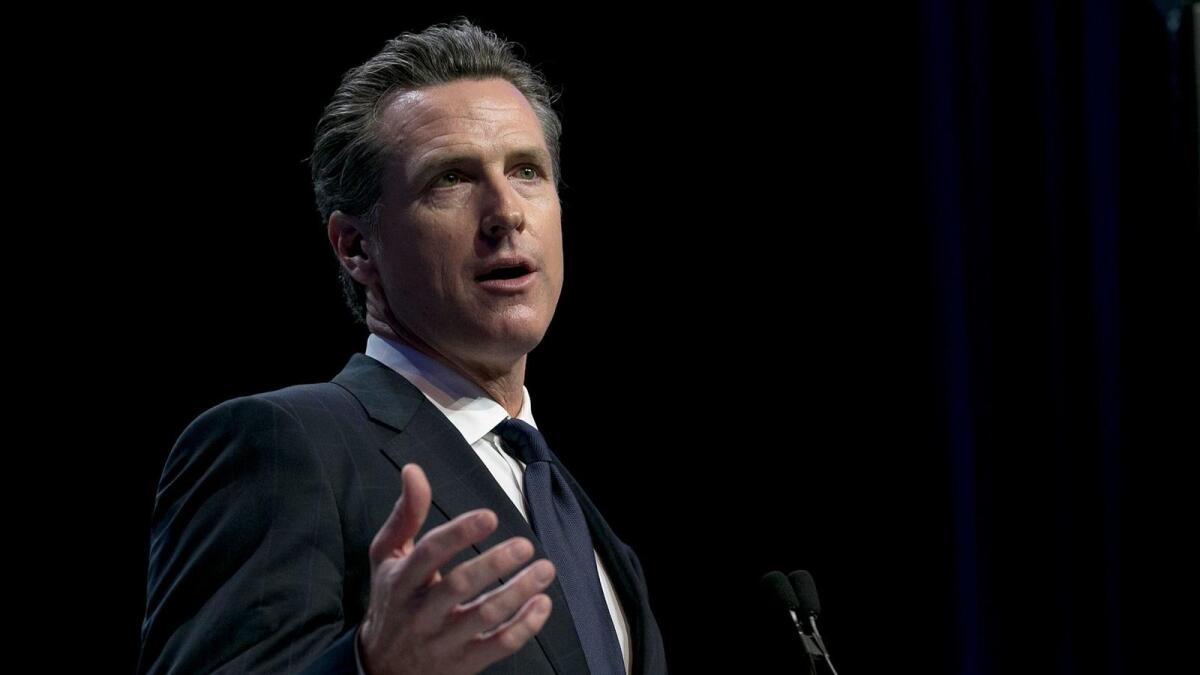
None of the candidates reported substantial debt.
Subscribe to our free politics newsletter >>
For a race that is just under a year away, it is awash in cash. The last time the governor was termed out and the seat was open was in 2010.
At this period of that race, then-Atty. Gen. Jerry Brown, who would go on to win the seat, was months away from entering the contest. Newsom, then the mayor of San Francisco, raised $1.7 million in the six-month period ending on June 30, 2009. He would later drop out of the race and successfully ran for lieutenant governor instead.
The real action came with the Republicans in the race. Two wealthy candidates were running for their party’s nomination at a time when the GOP still held power at the statewide level, and donors were willing to spend large sums on statewide races.
Former eBay chief Meg Whitman raised $10.8 million during that time period, $4 million of which she contributed to her campaign. Her main rival, Steve Poizner, who was then the state’s insurance commissioner, raised $4.6 million in the first six months of 2009, all but $400,000 of which came from his family trust.
The 2010 gubernatorial race would go onto to be the most expensive in the state’s history.
Trump presidency eases Gavin Newsom’s path in his second run for California governor »
Can California’s fractured GOP get it together to nominate a candidate for governor?
California’s race for lieutenant governor is attracting a lot of money
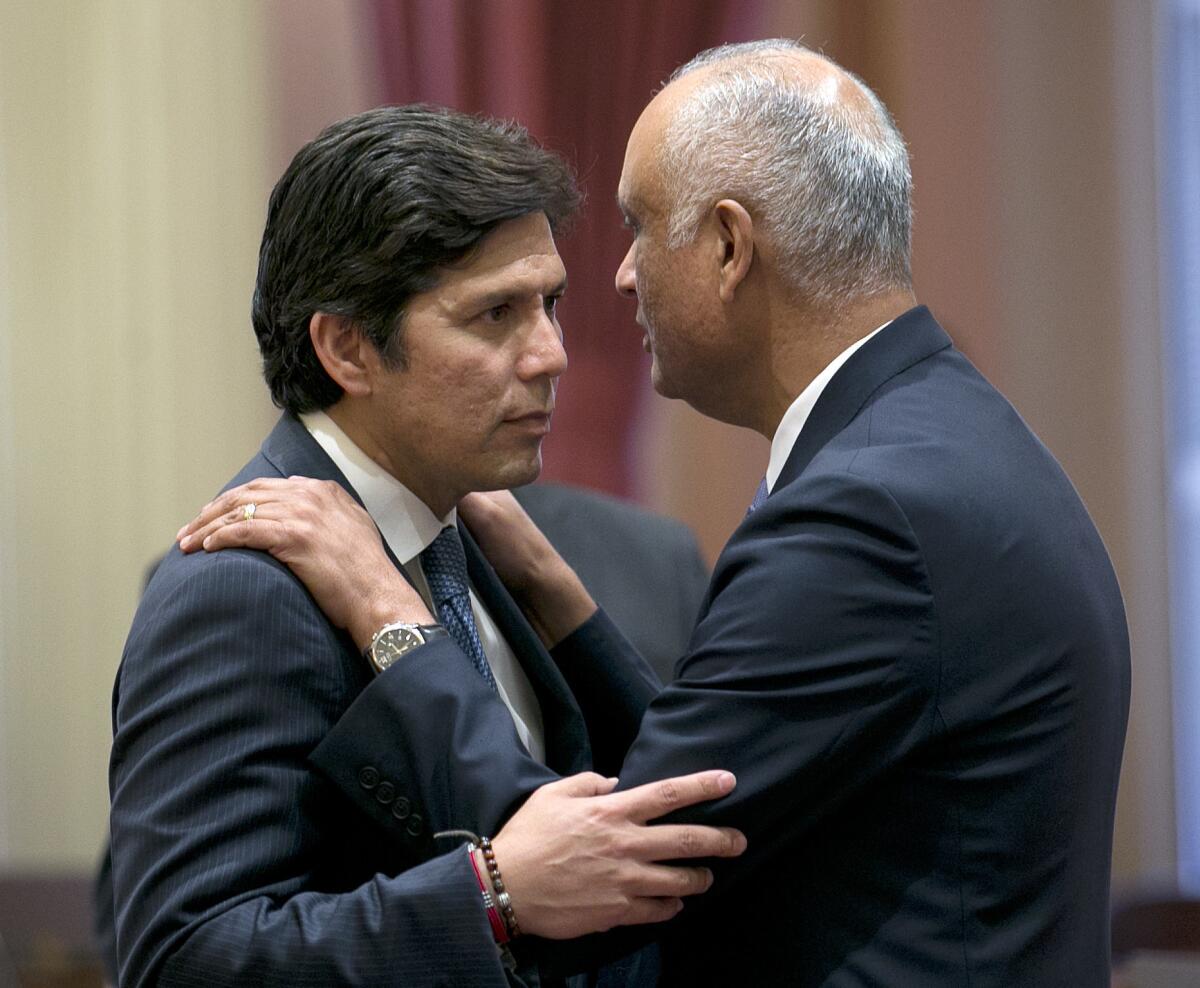
California’s 2018 race for lieutenant governor, likely to be lost in shadow of the governor’s race, could turn out to be a pretty competitive contest.
Money is pouring into the race for multiple candidates, according to a batch of campaign finance reports filed with the secretary of state this week. That’s interesting in part because the current lieutenant governor and gubernatorial candidate Gavin Newsom once dismissed the job as a “largely ceremonial post ... with no real authority.”
State Sen. Ed Hernandez (D-Azusa), the favorite of many establishment California Democrats, leads the field in total fundraising with nearly $1.6 million on hand in his campaign account as of June 30. Hernandez raised nearly $1.2 million in 2017.
Three of his Democratic rivals have never run for elected office before, but are proving they are not exactly newcomers to politics.
- Eleni Kounalakis of San Francisco, a former U.S. ambassador to Hungary and fundraiser for former presidential candidate Hillary Clinton, has topped the field when it comes to raising cash this year. Kounalakis raked in $1.5 million, which includes more than $500,000 she contributed to her own campaign. She had nearly $1.4 million cash on hand as of June 30.
- Los Angeles physician Asif Mahmood, who also helped raise money for Clinton’s presidential campaign, raised just over $1 million and has $846,996 cash on hand.
- San Francisco Bay Area attorney Jeff Bleich, a former U.S. ambassador to Australia and special counsel to President Obama, raised just shy of $660,000 and has most of it in the bank.
The biggest wild card in the race is Senate President Pro Tem Kevin de León (D-Los Angeles), who has stockpiled $2.8 million in a campaign committee for lieutenant governor. And that doesn’t include the $886,000 De León had socked way in his state senate campaign account.
De León has raised nearly $1.4 million for the race in 2017, which is noteworthy because it’s still unclear if he’s actually going to run for that office.
So far, no major Republican candidates are actively campaigning for lieutenant governor.
Brown vetoes a bill to make school districts consider ties between zero tolerance policies and suicide
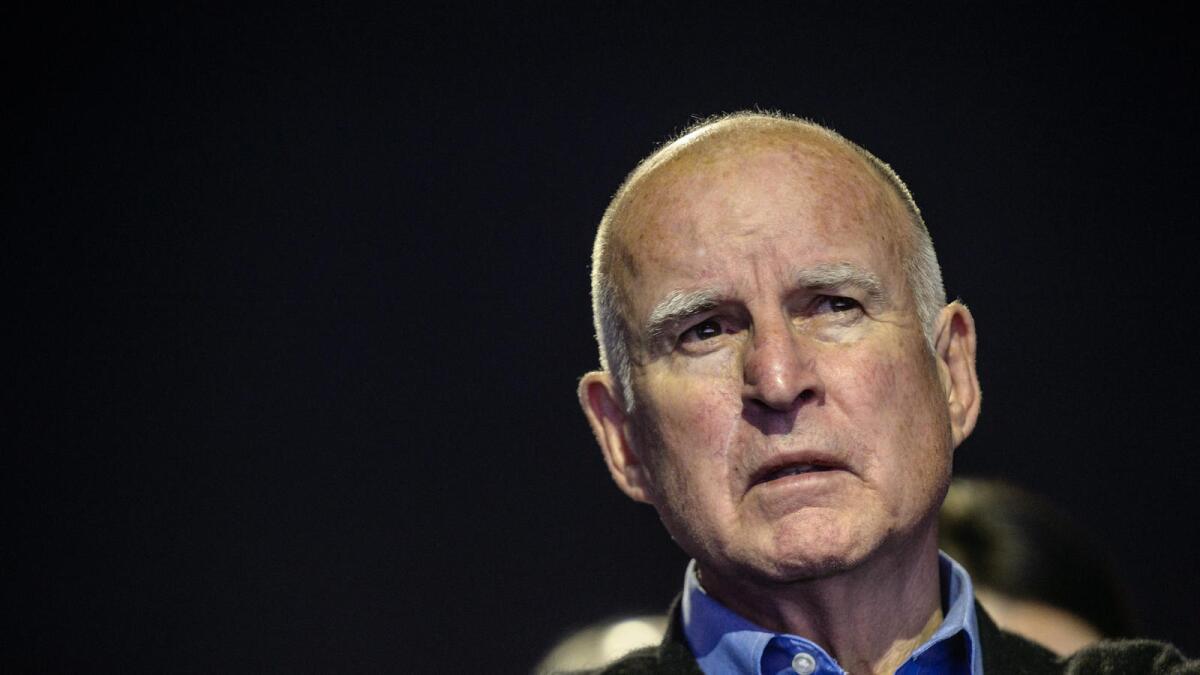
Gov. Jerry Brown vetoed a bill Monday that would have required school districts that have zero tolerance policies toward drugs or alcohol use to hold community-wide conversations on whether expulsions related to substance abuse deter students from seeking help for mental health problems.
California Senate leader Kevin de Léon heads delegation to Japan to talk climate, trade
How are California lawmakers spending their month-long summer break from legislative action? A contingent of state senators has jetted off to Japan to discuss trade and efforts to combat climate change with that country’s leaders.
Senate leader Kevin de Léon (D-Los Angeles), along with seven other Democratic senators, met Monday with Japanese Prime Minister Shinzo Abe and toured the National Diet of Japan, the country’s legislative body.
Among the items on the agenda, according to De Léon’s office, were trans-Pacific trade and fighting climate change. In an echo of Gov. Jerry Brown’s climate-focused trip to China in June, lawmakers sought to differentiate their efforts to confront global warming from the Trump administration, which pulled out of the Paris climate accord this spring.
On Tuesday, senators addressed the Japanese press corps at the Japan National Press Club in Tokyo. Lawmakers will also be meeting with officials working on Japan’s high-speed rail system and its universal health insurance system -- two politically charged topics in California. The trip will culminate with a visit to Hiroshima, where the United States dropped an atomic bomb at the close of World War II.
The week-long trip is funded through senators’ campaign accounts. This is the 17th official California state senate delegation to Japan. Its purpose, according to documents filed with the Senate Rules Committee, is to “further strengthen the positive ties between the two regions that span every sector: our economies, governments, cultures and education systems.”
In most of California’s statewide races for 2018, there’s still not a Republican interested in running
